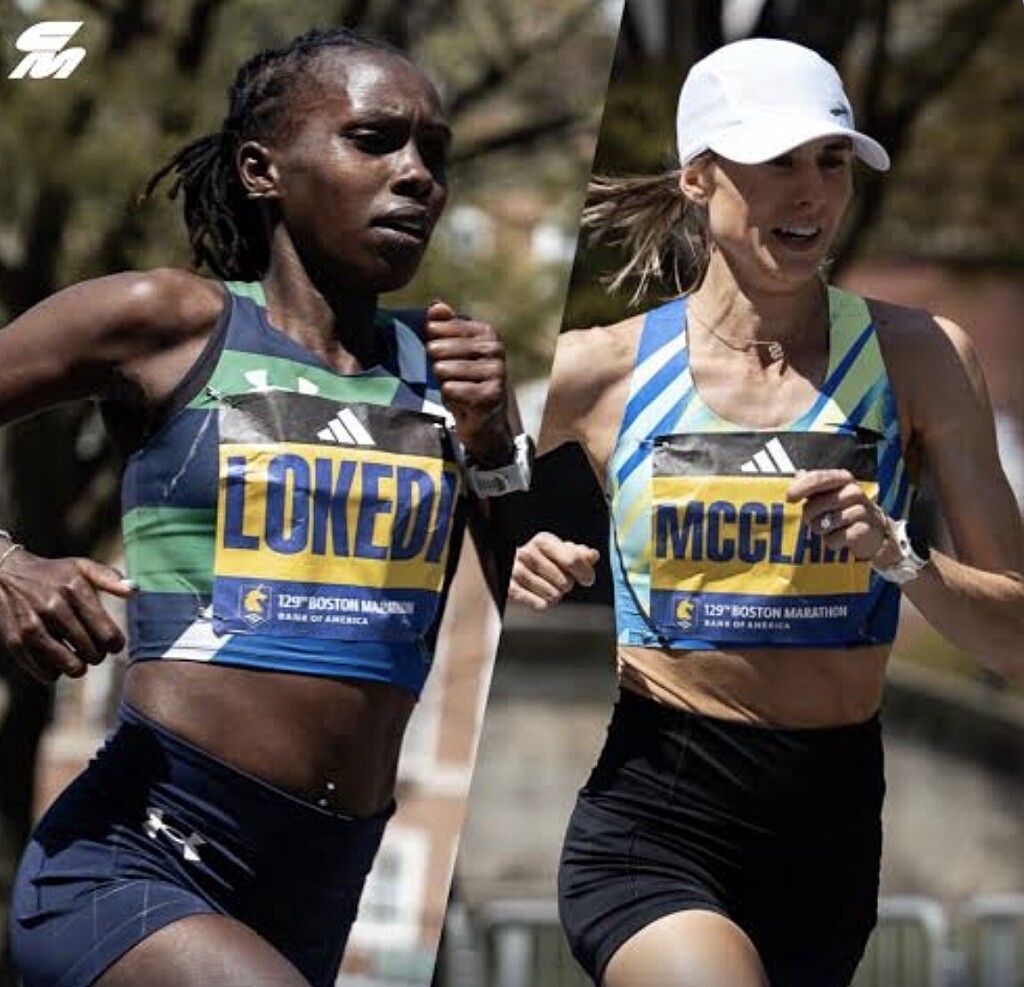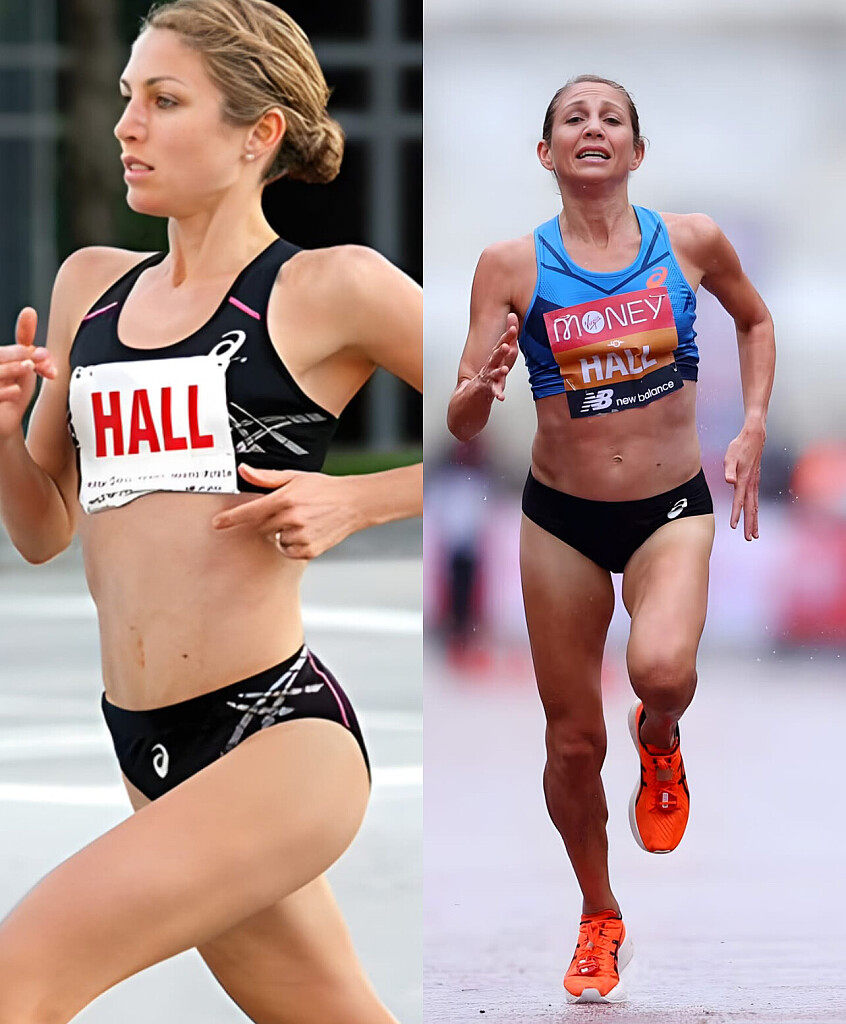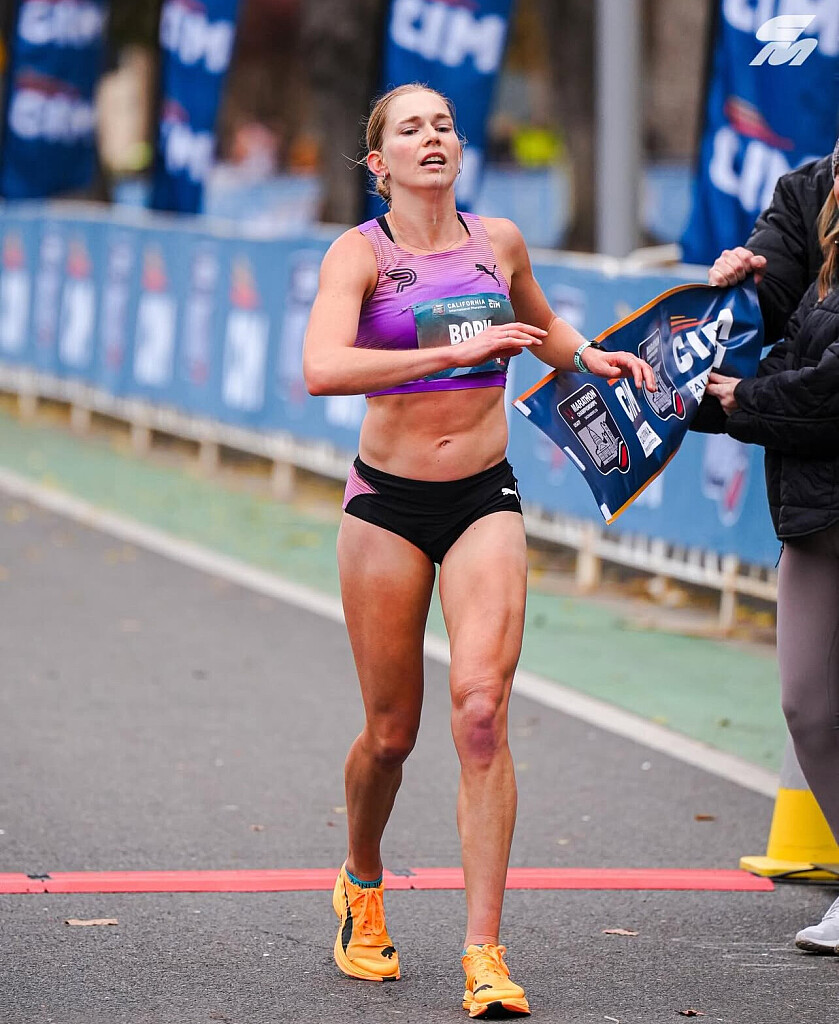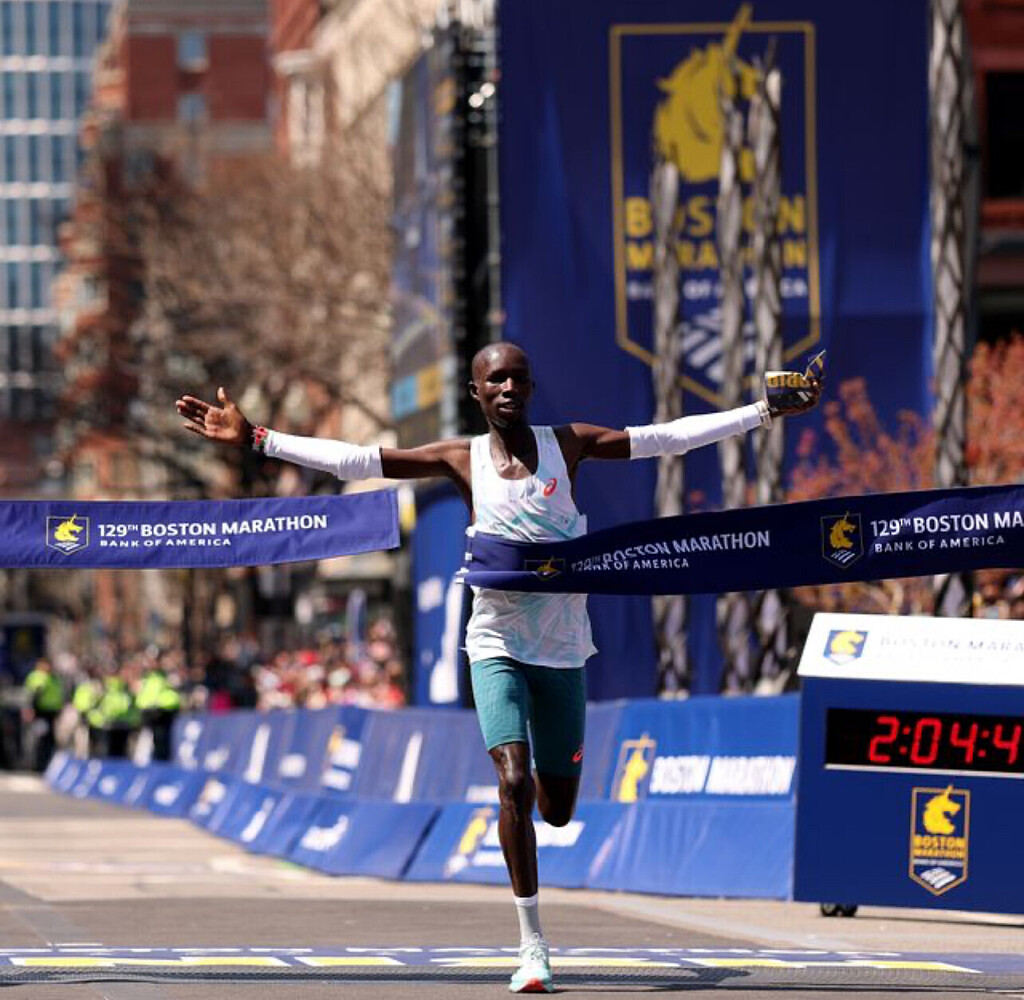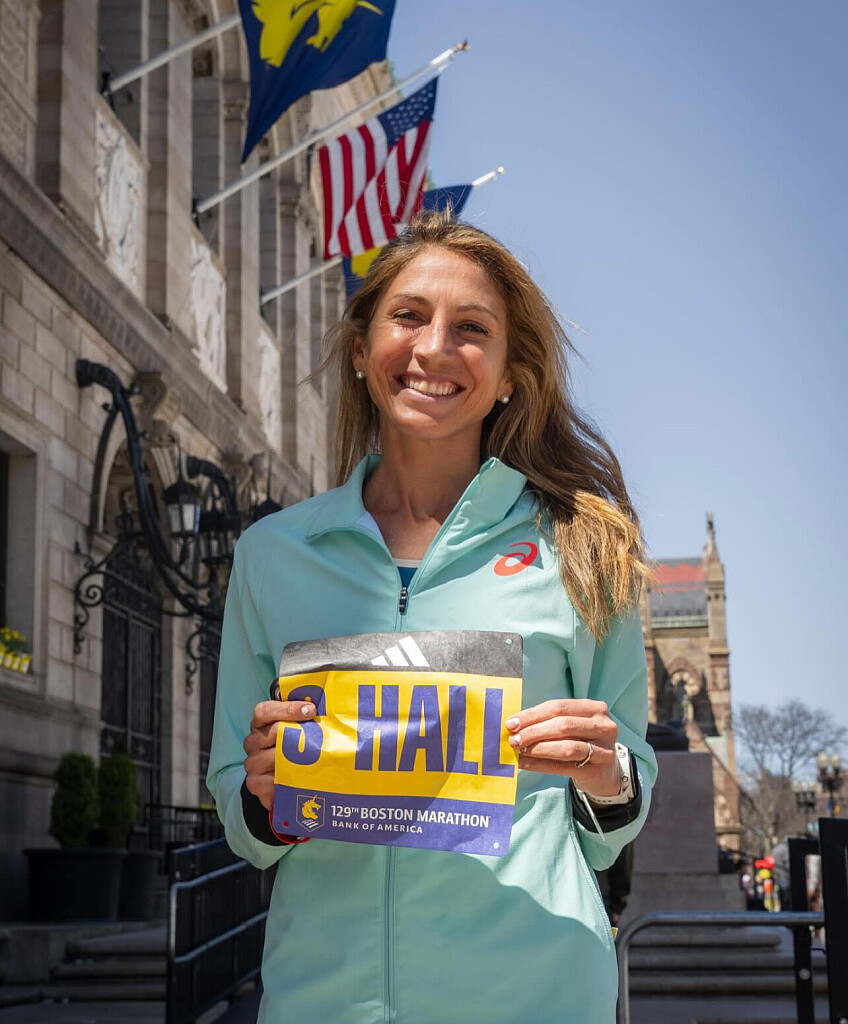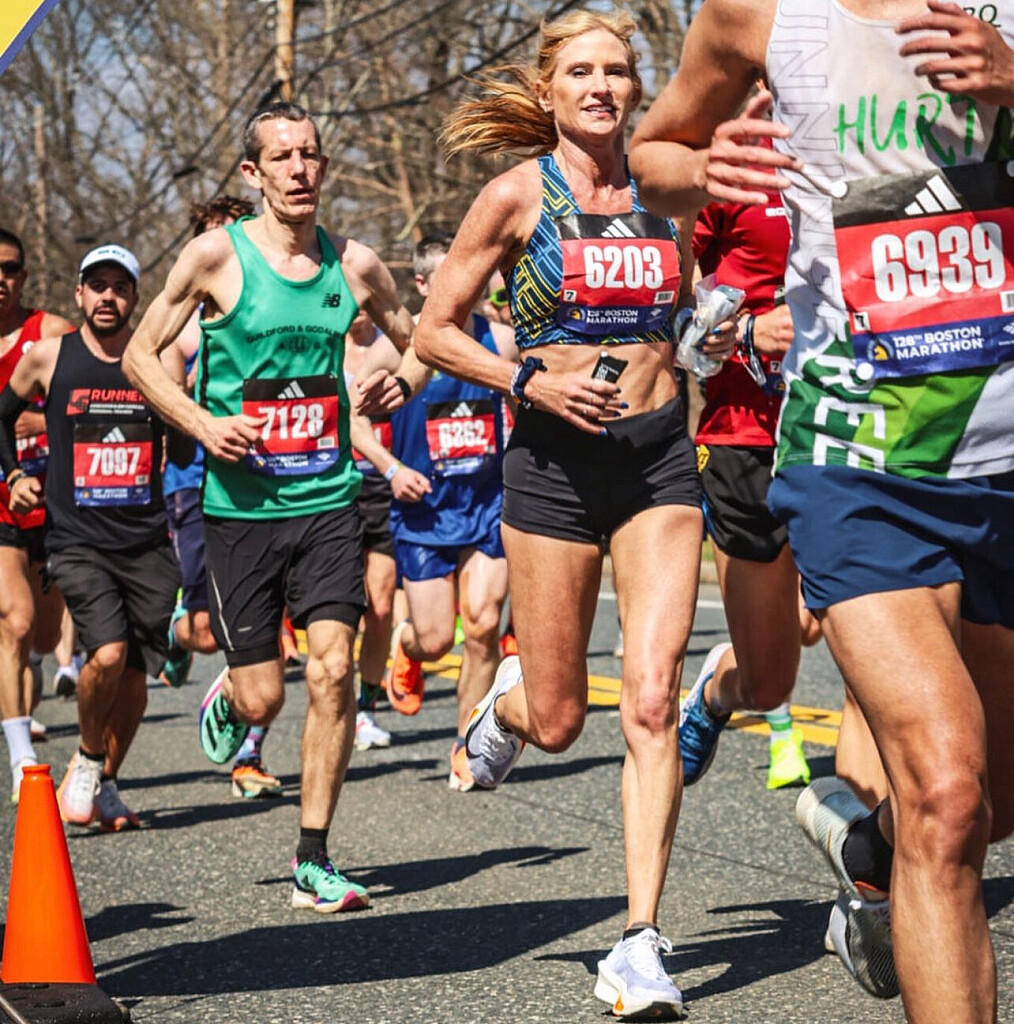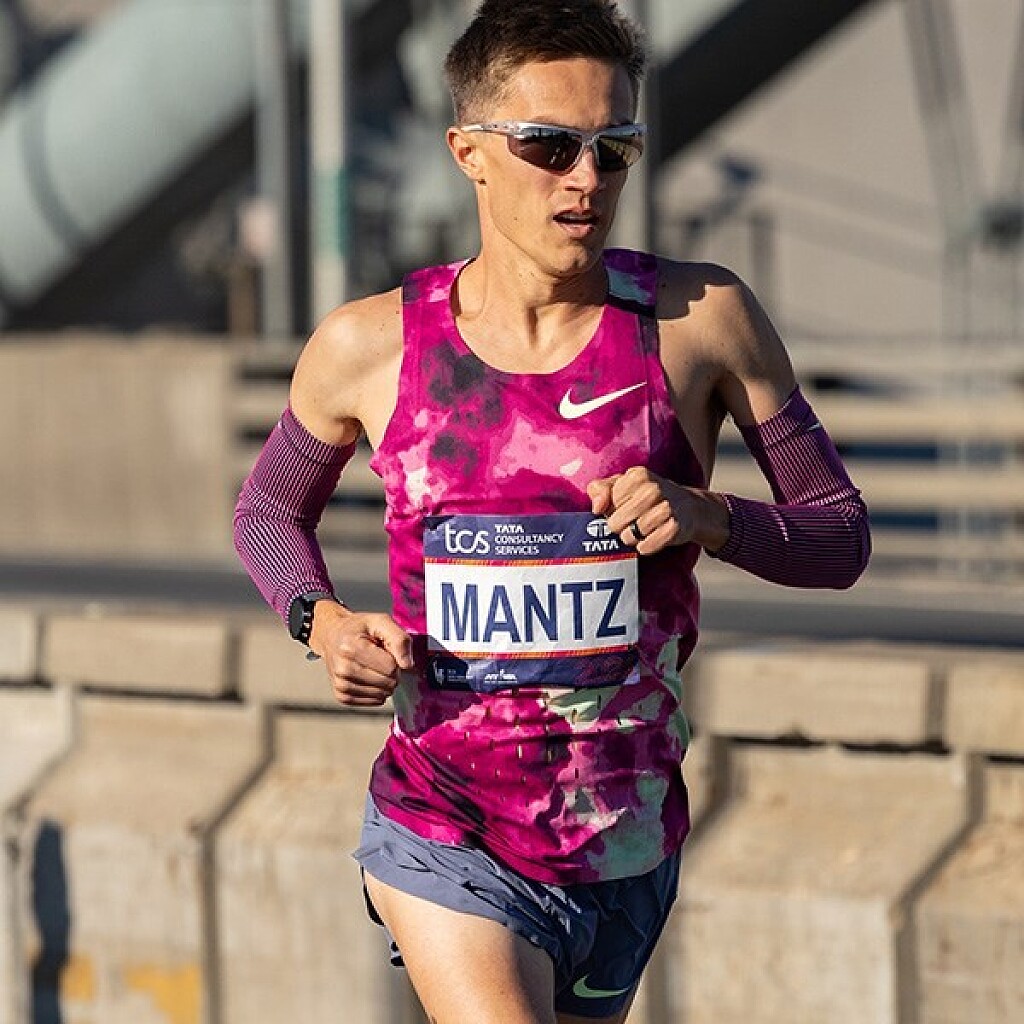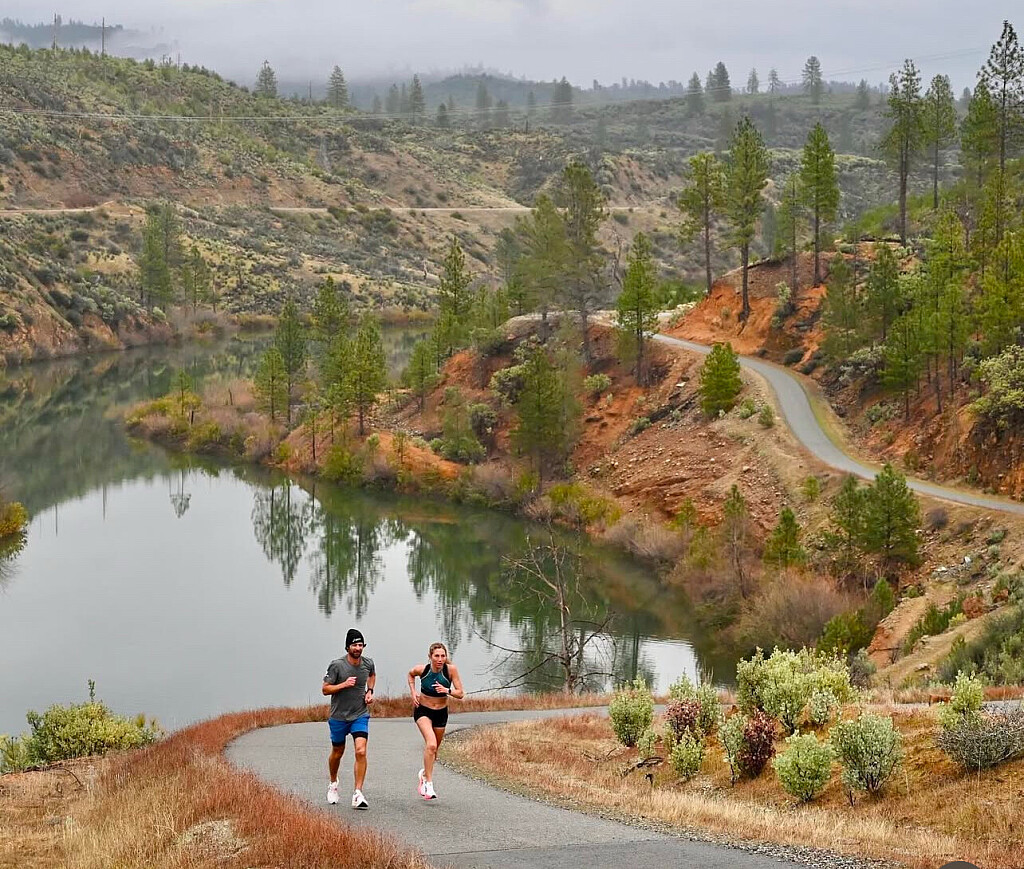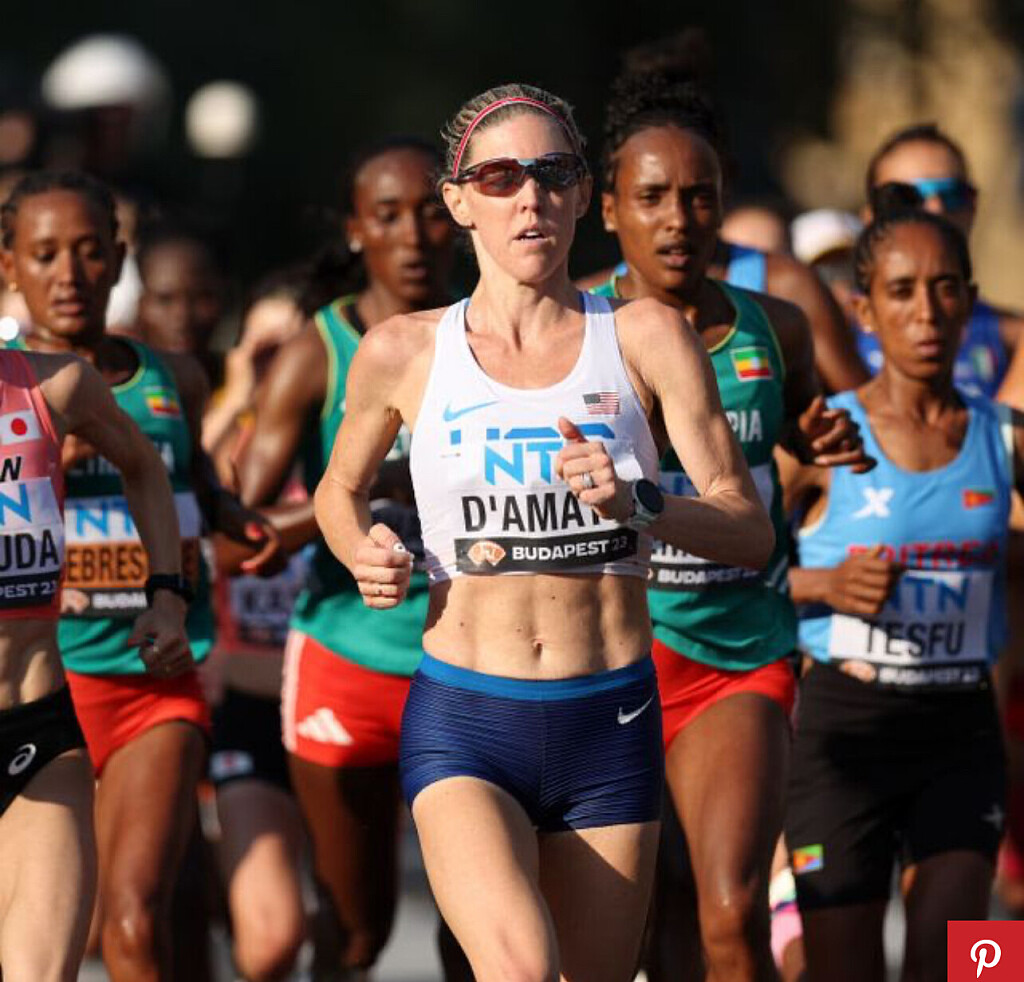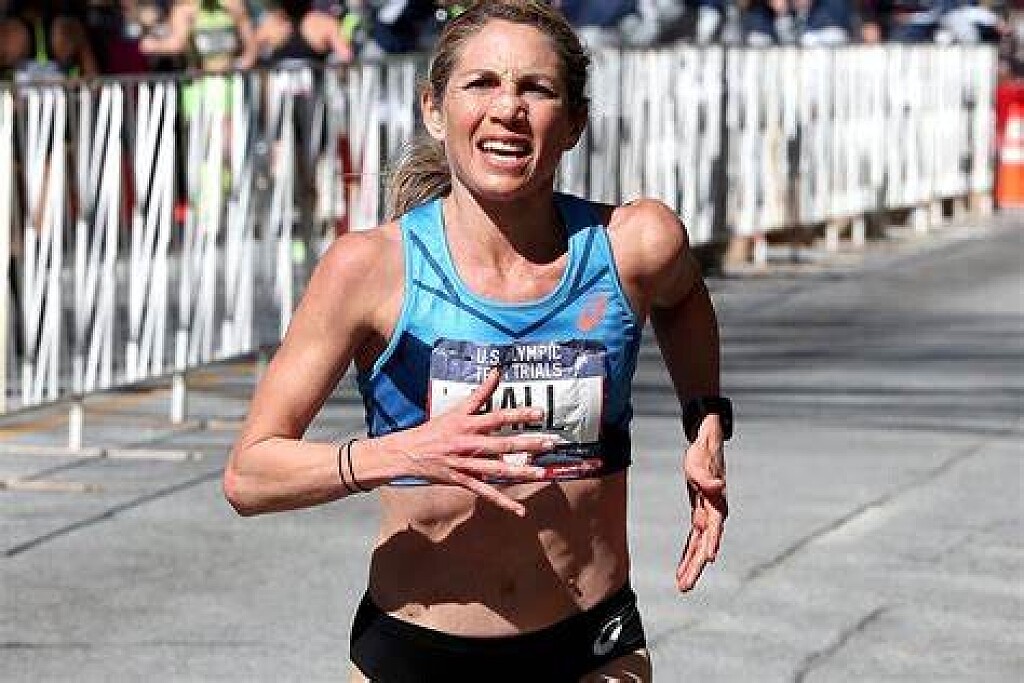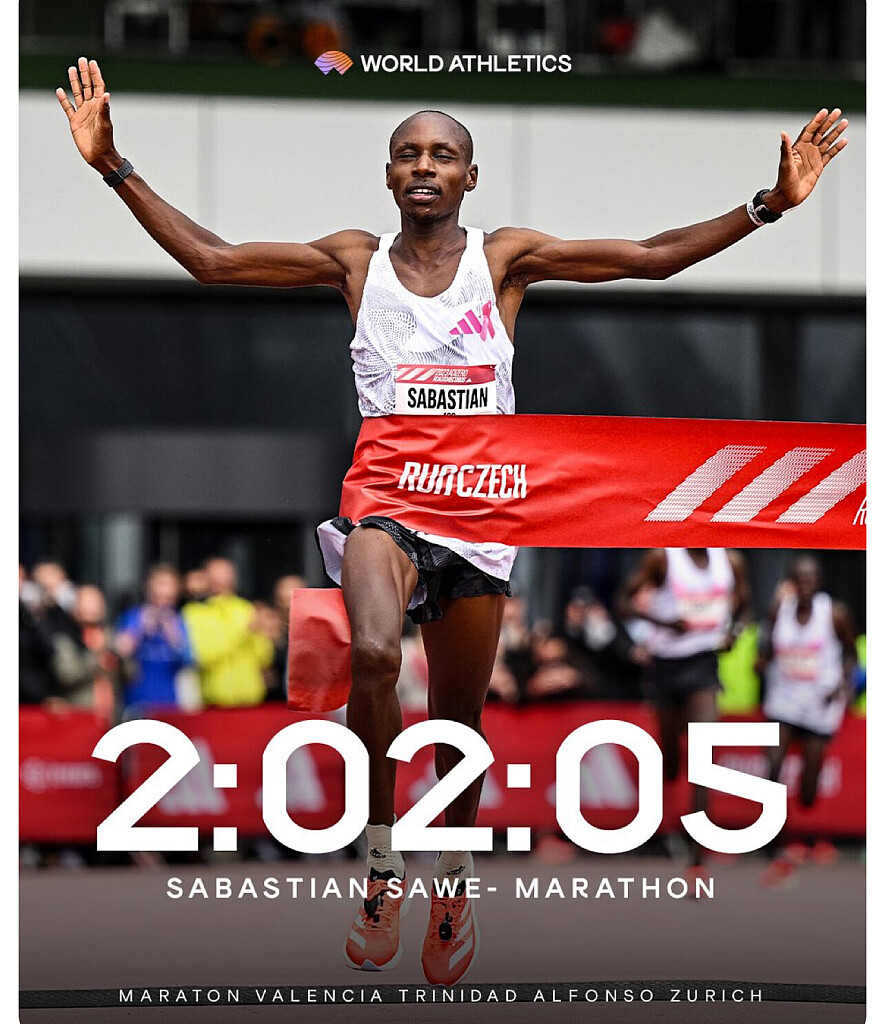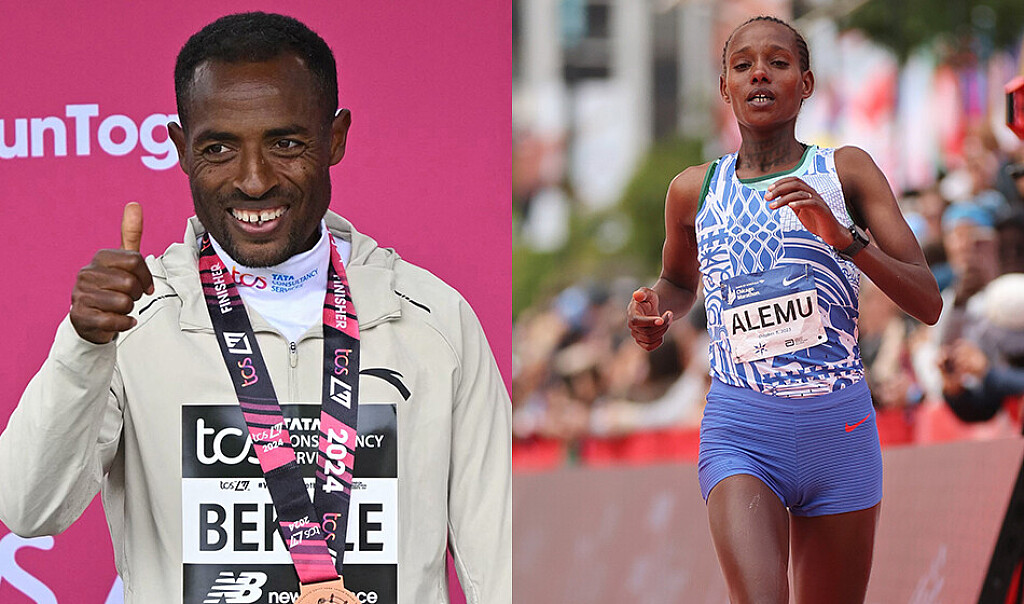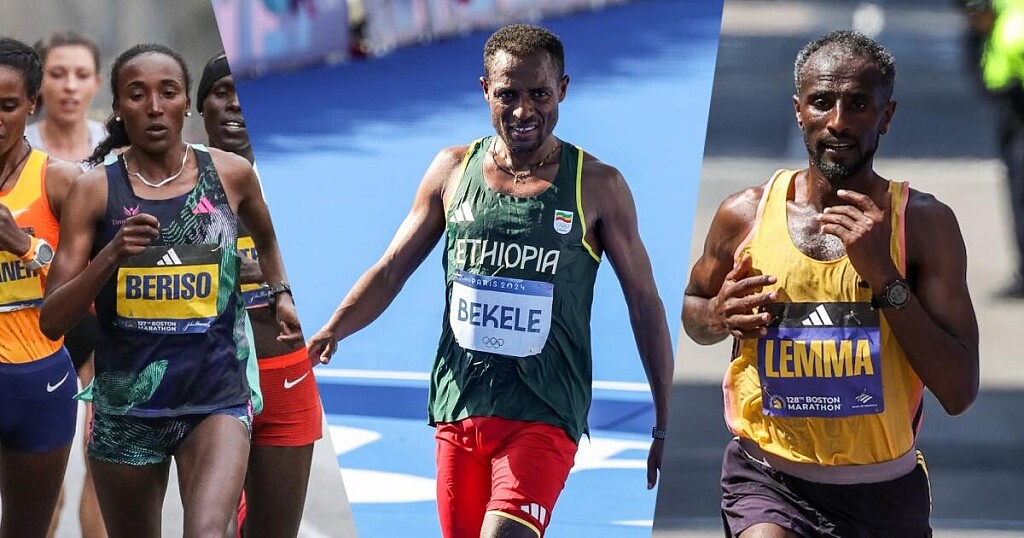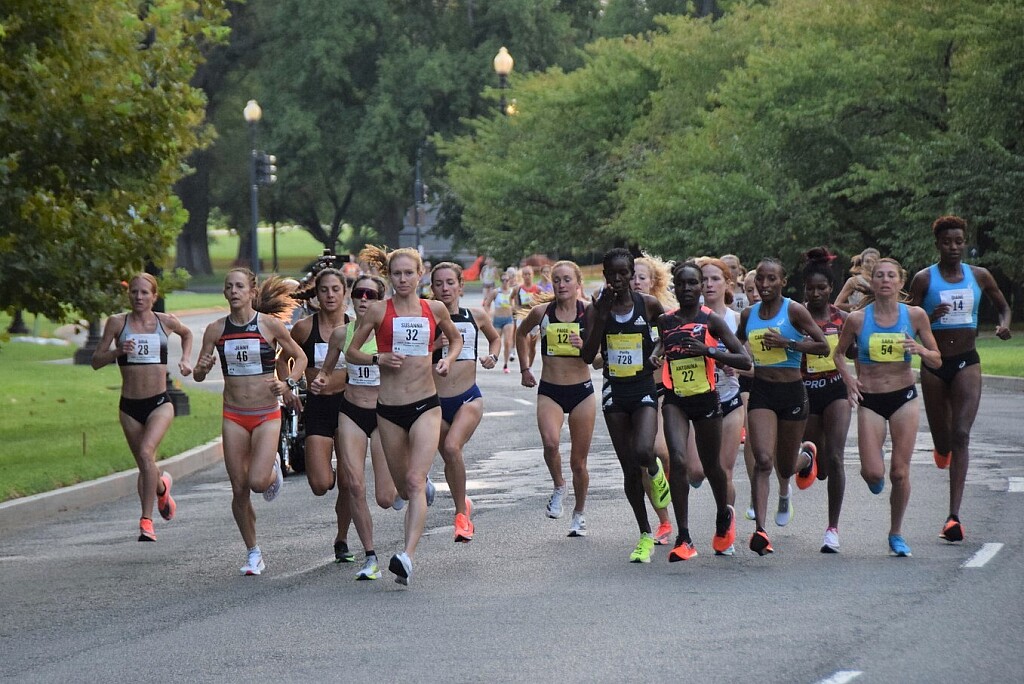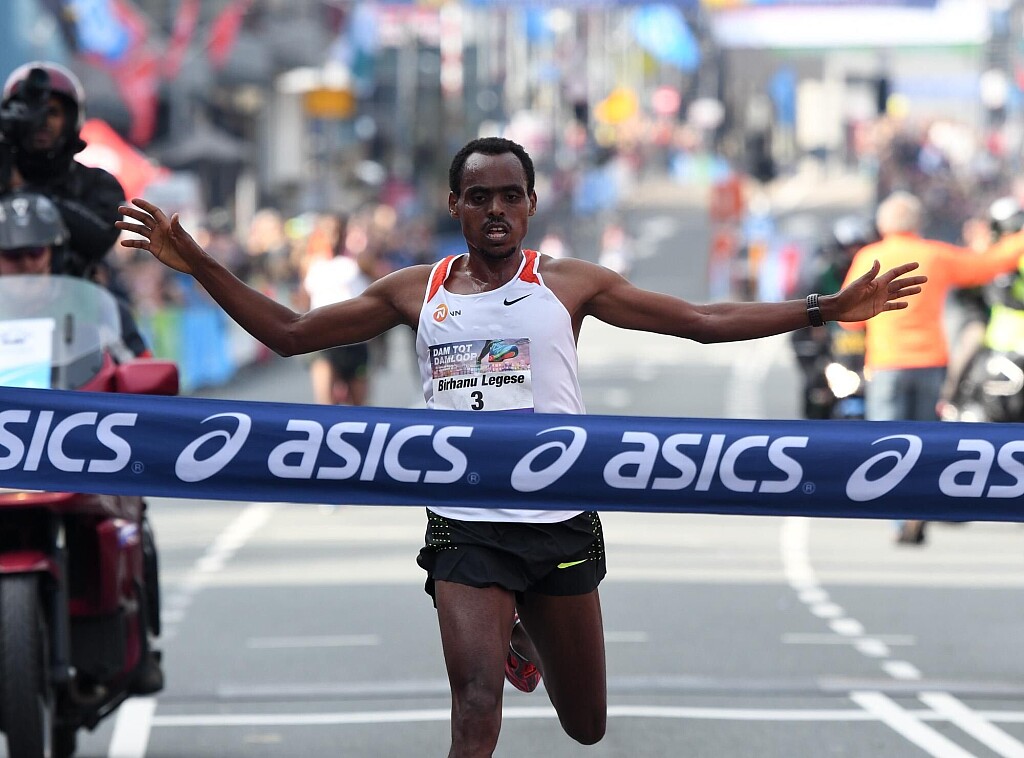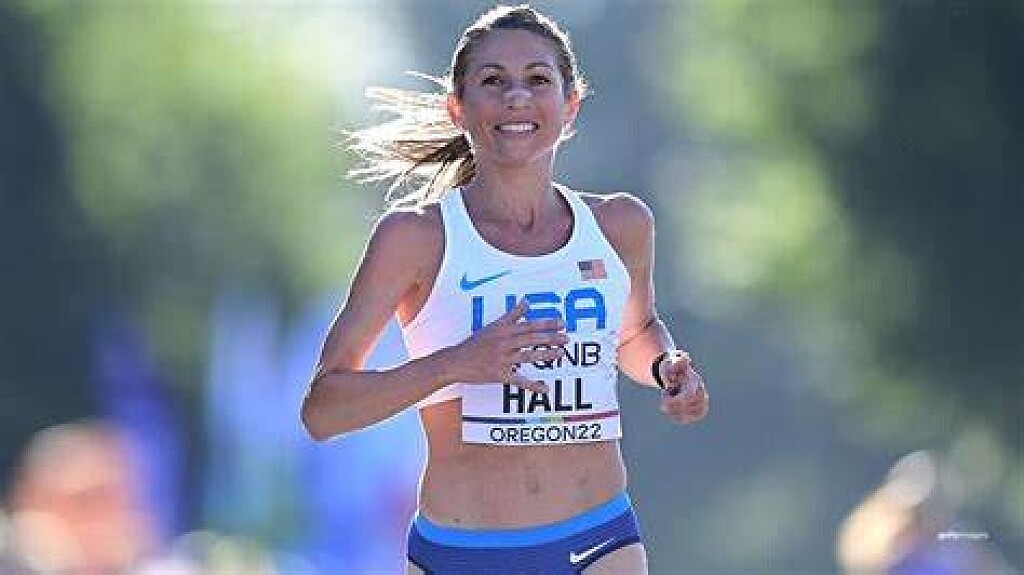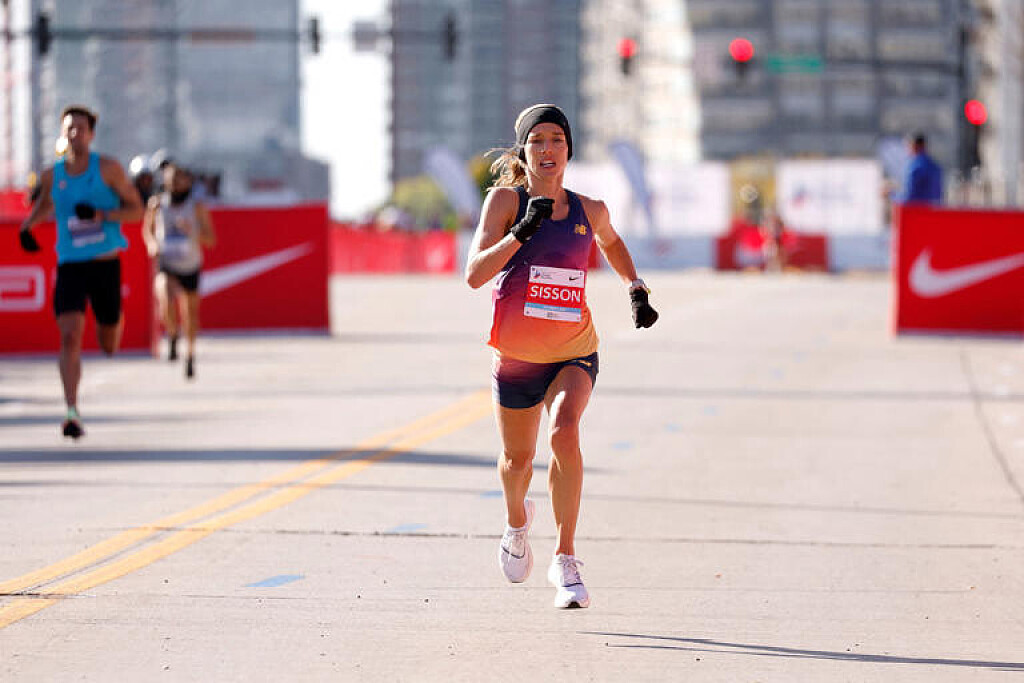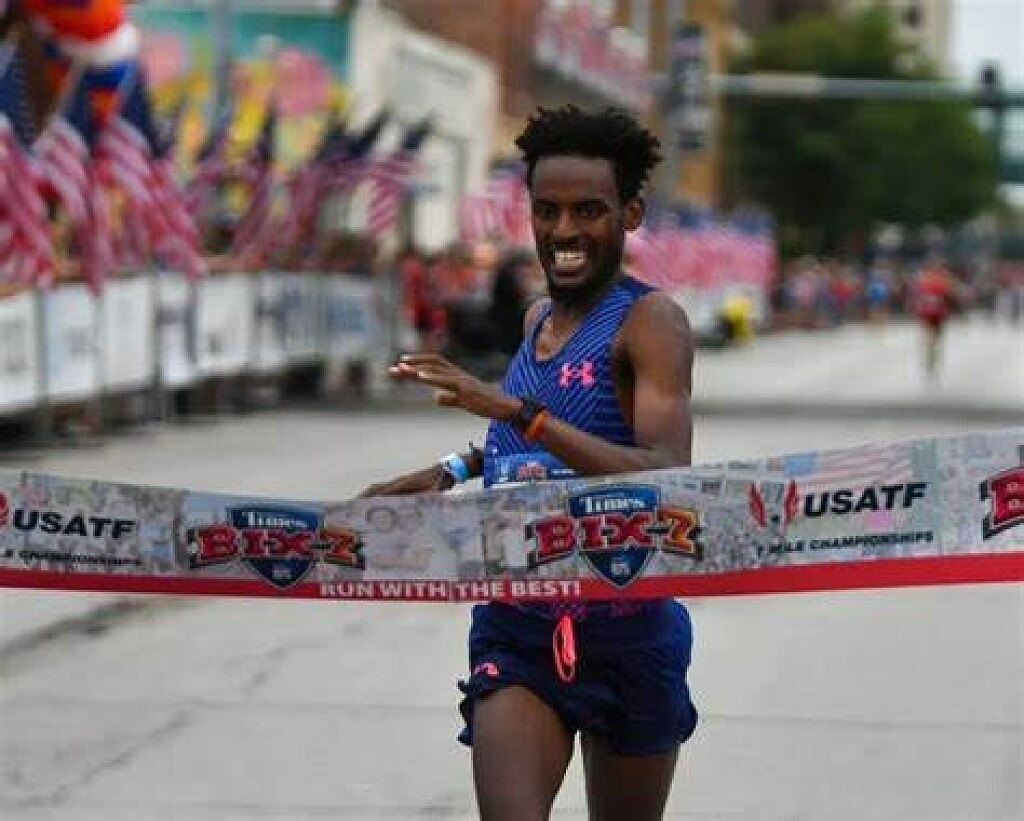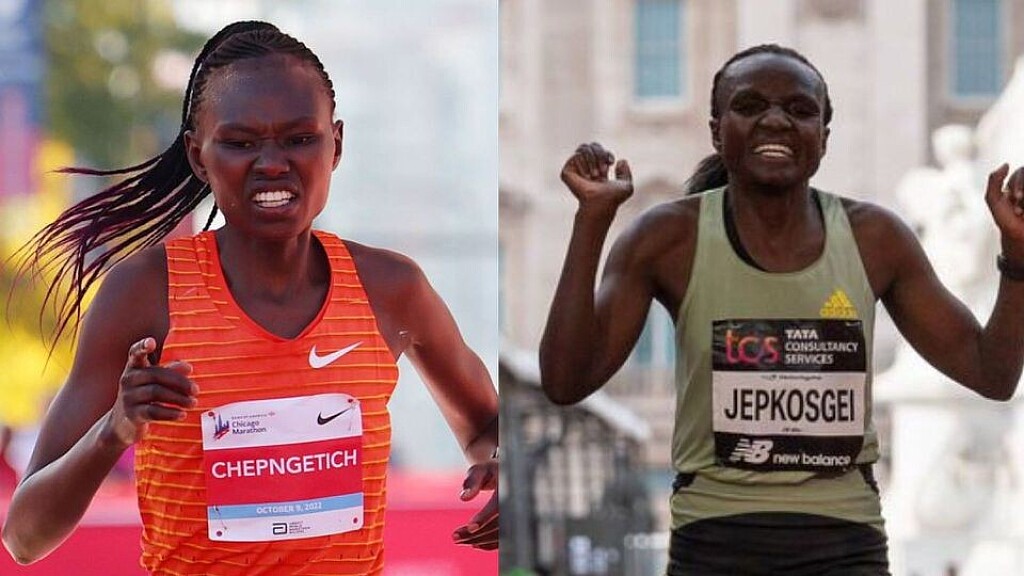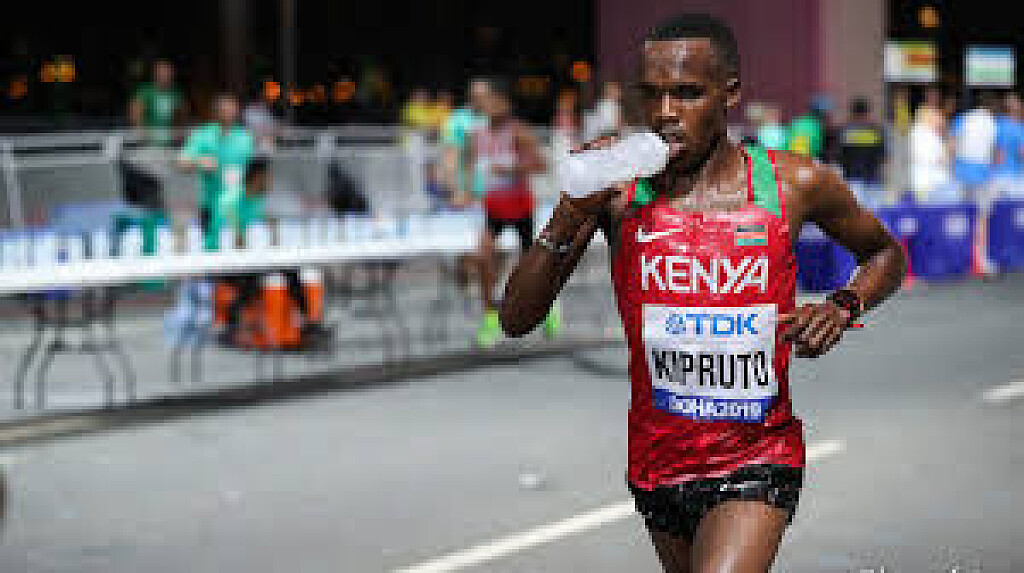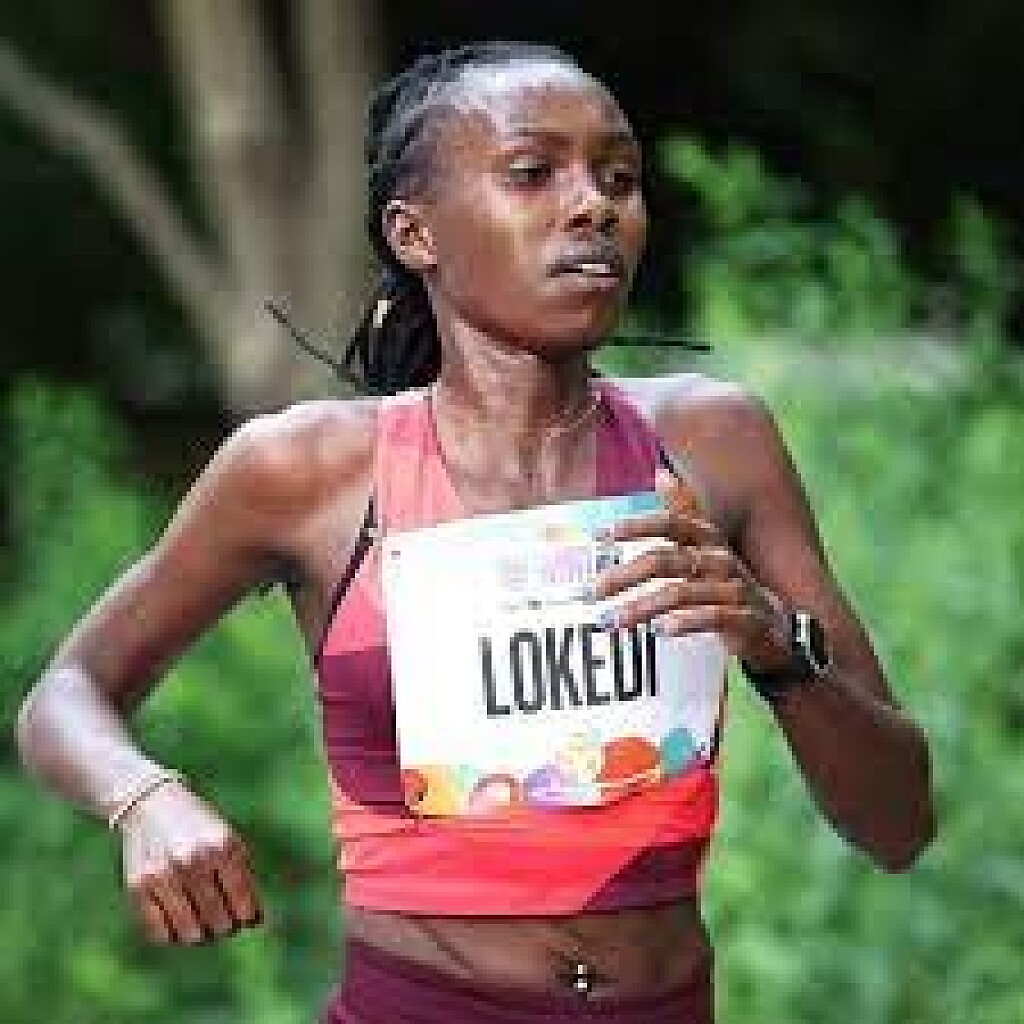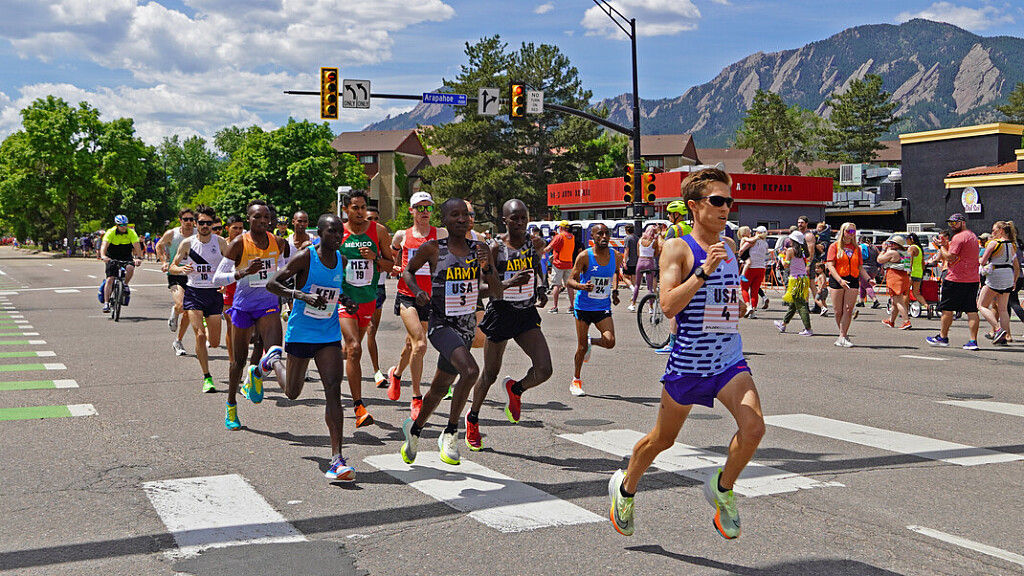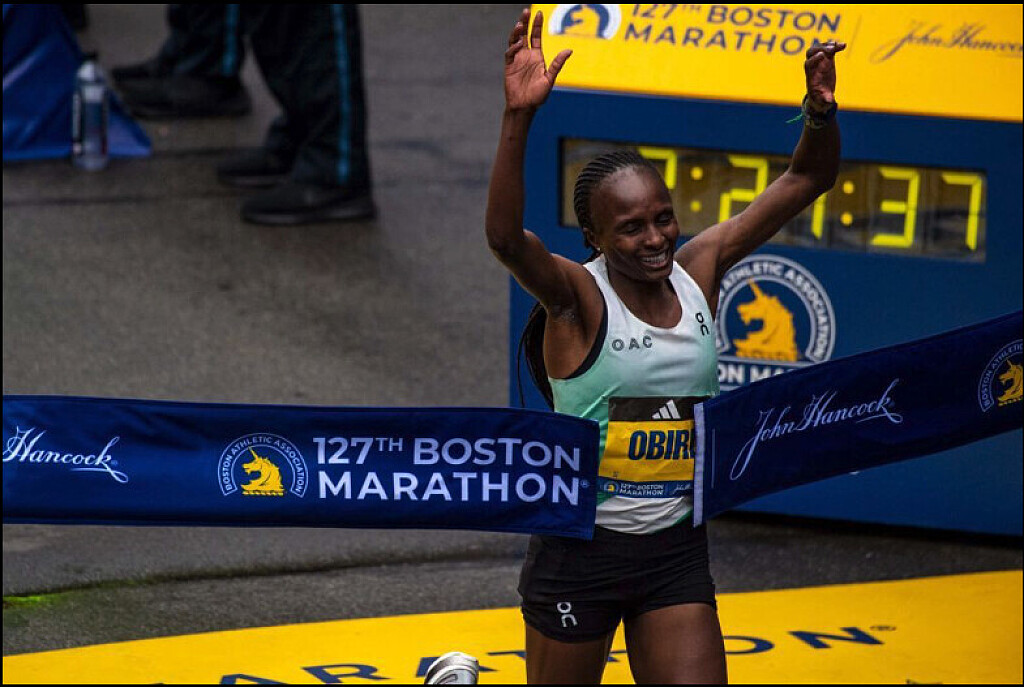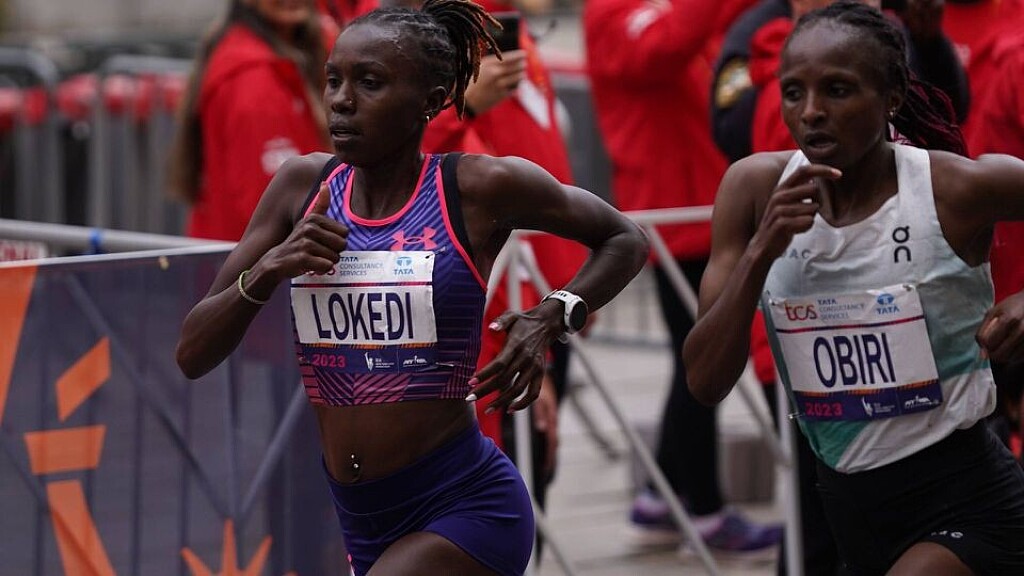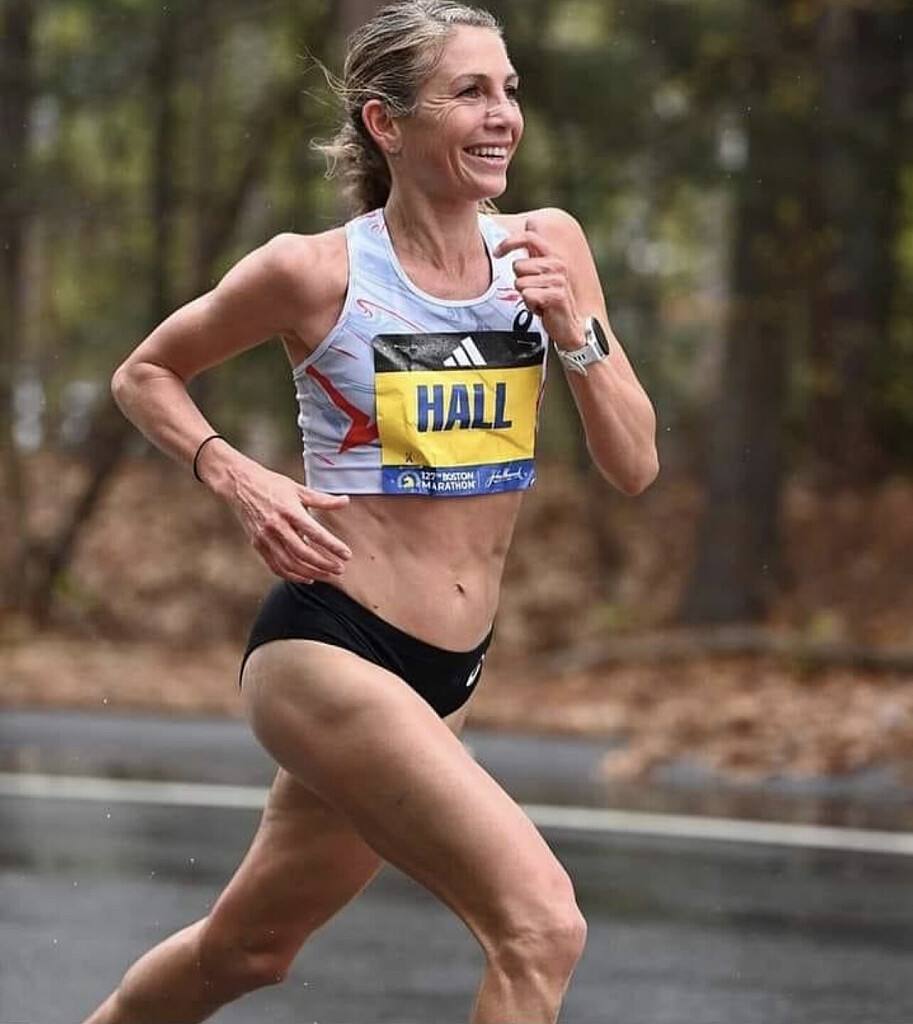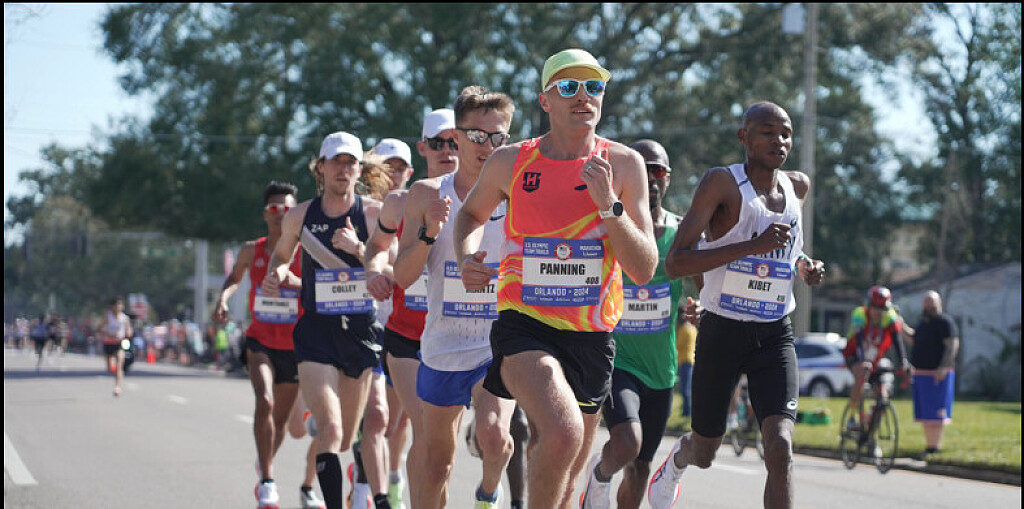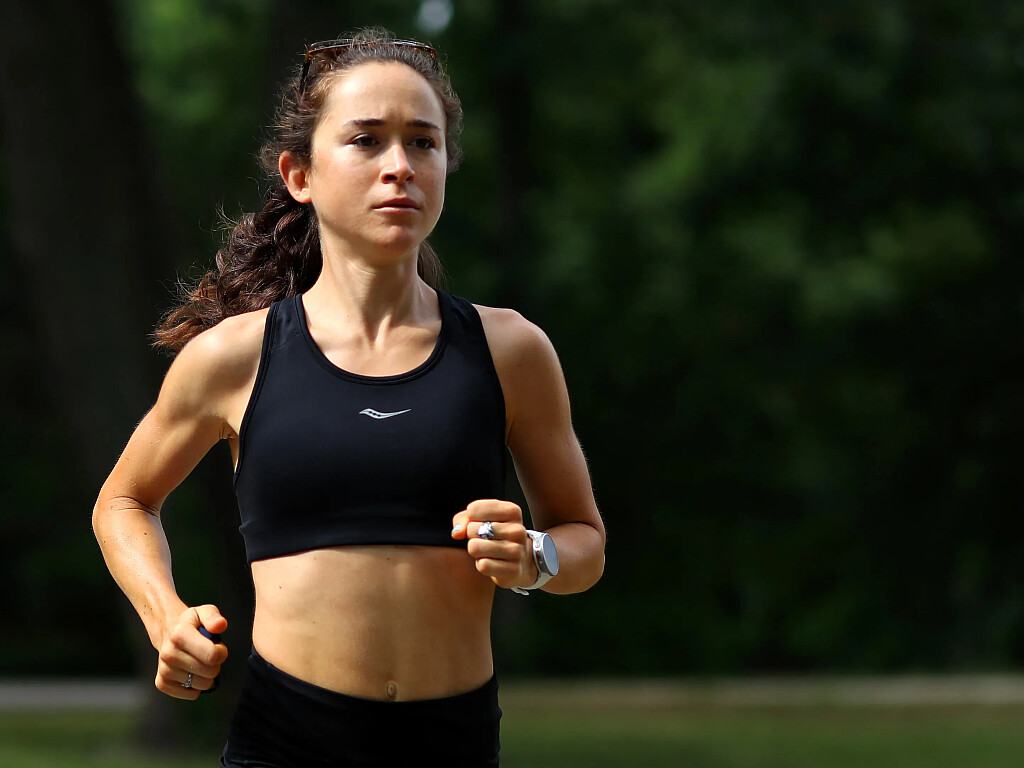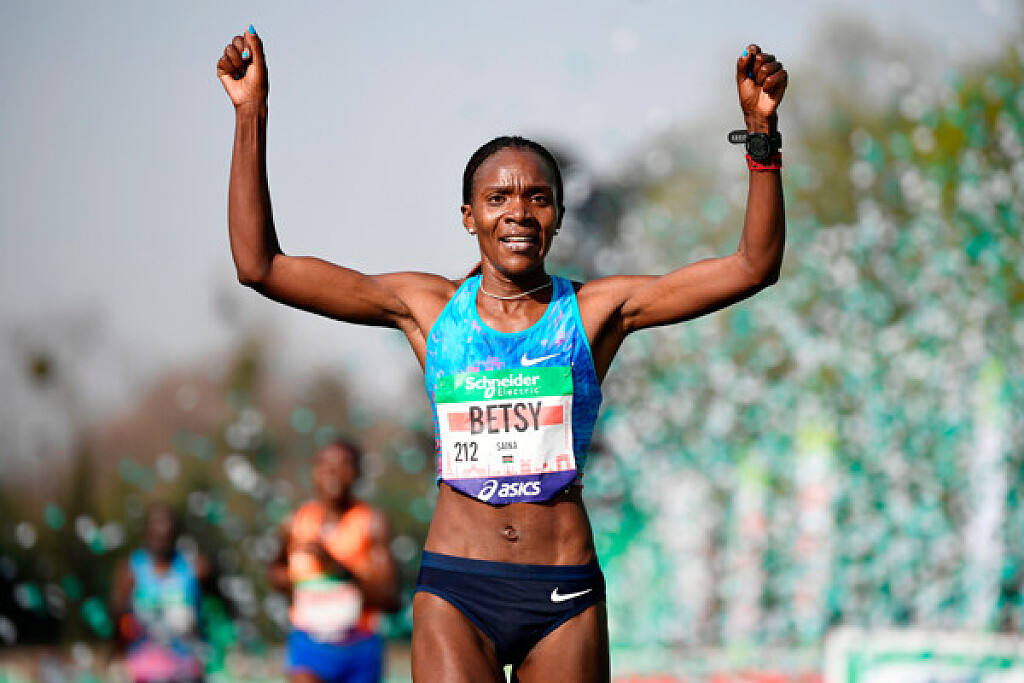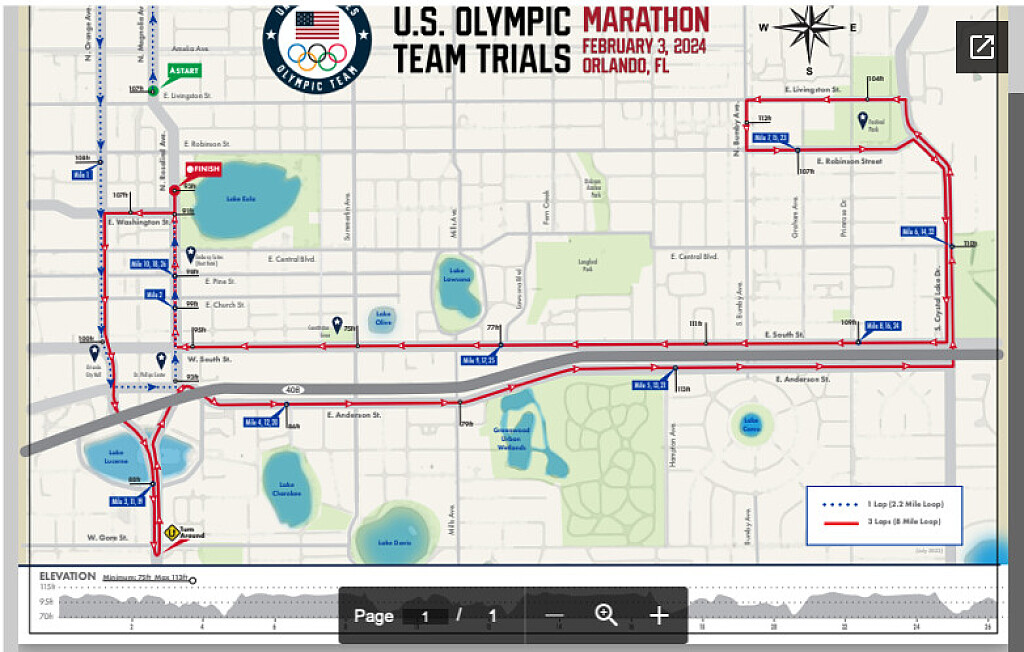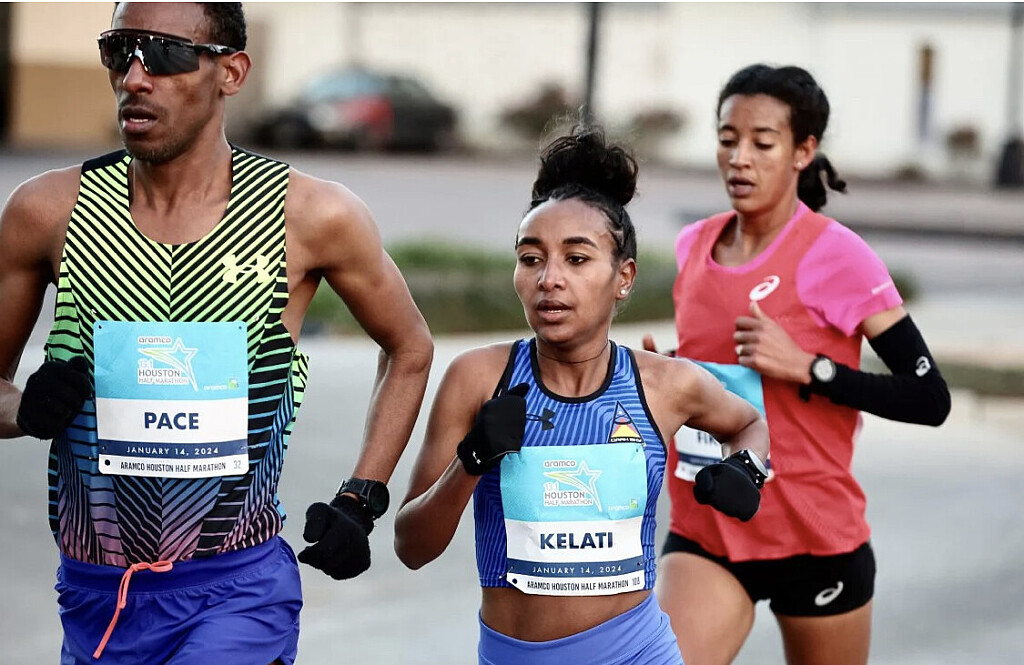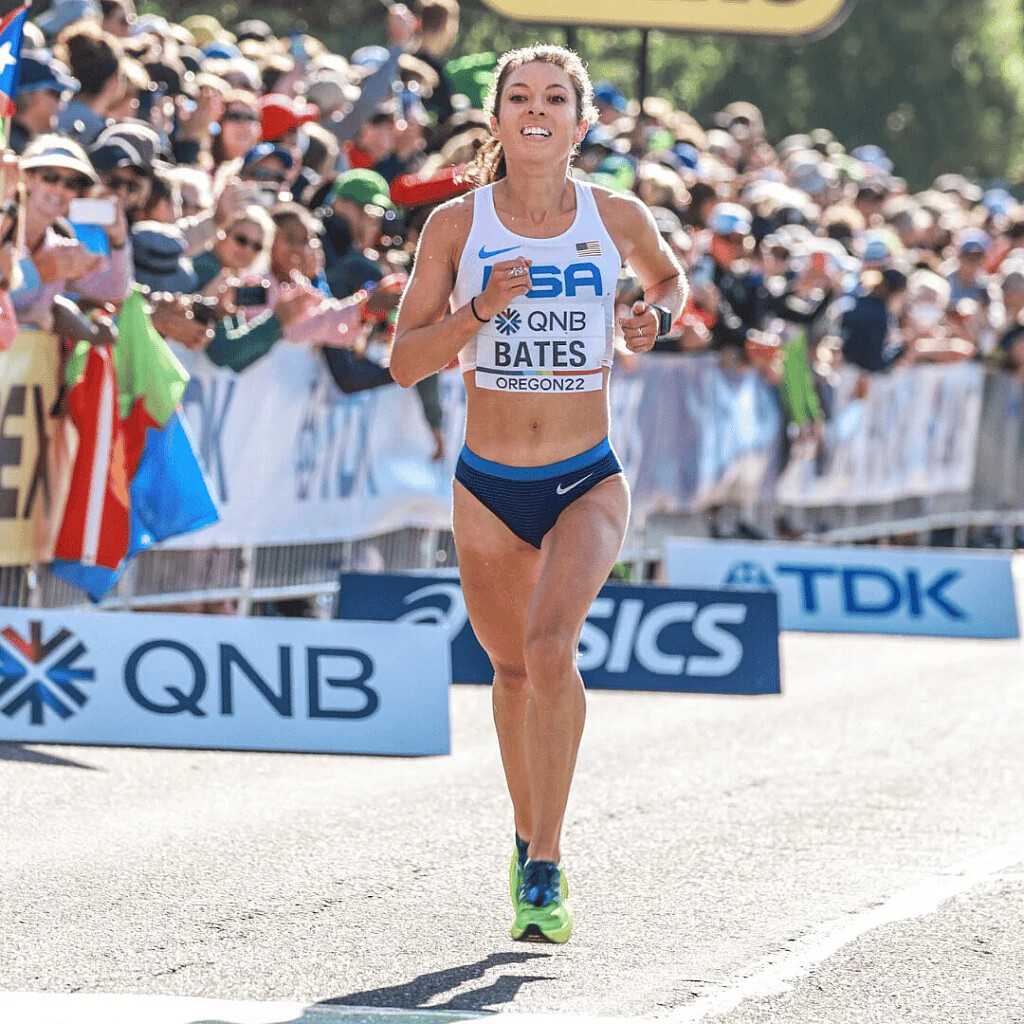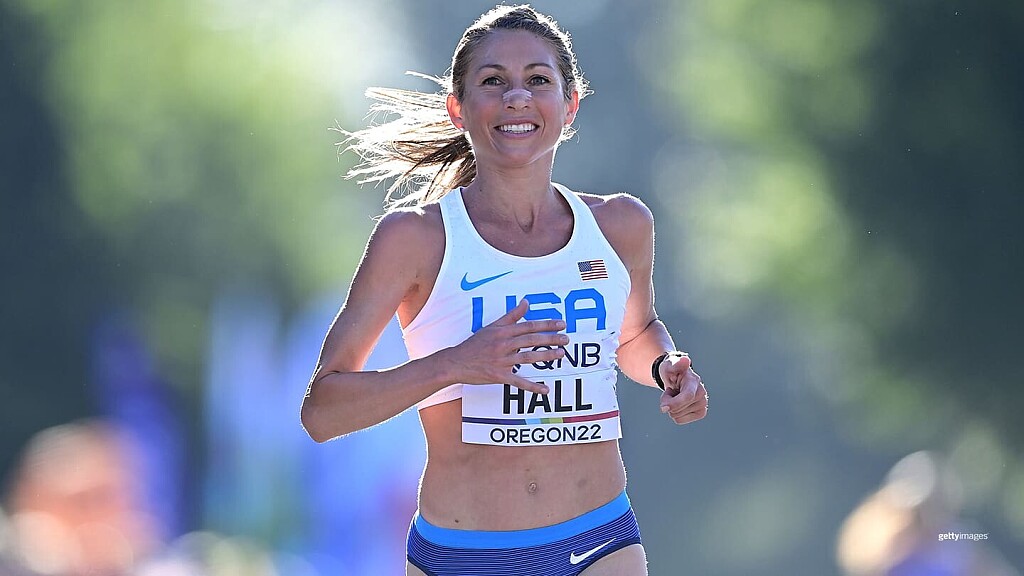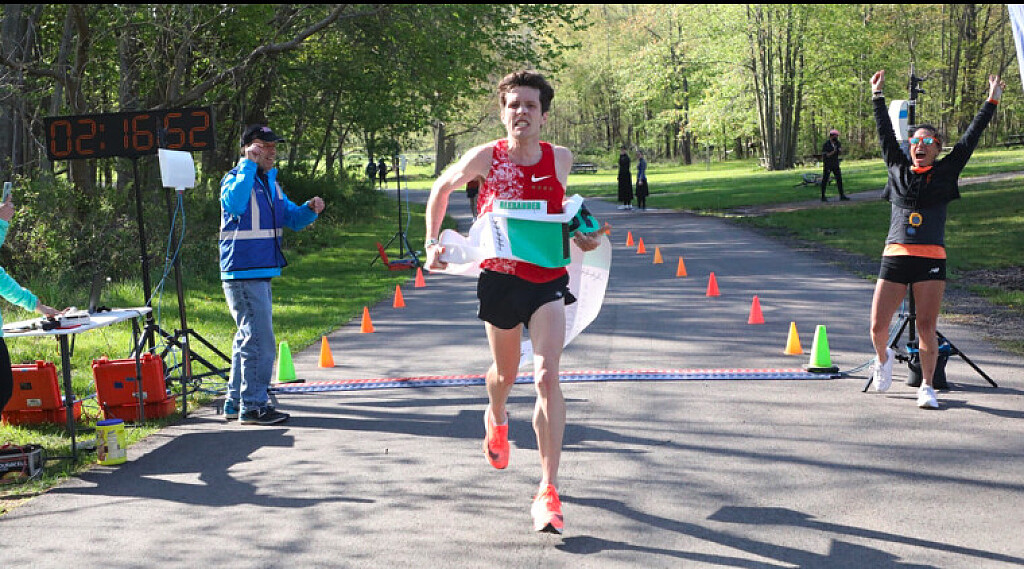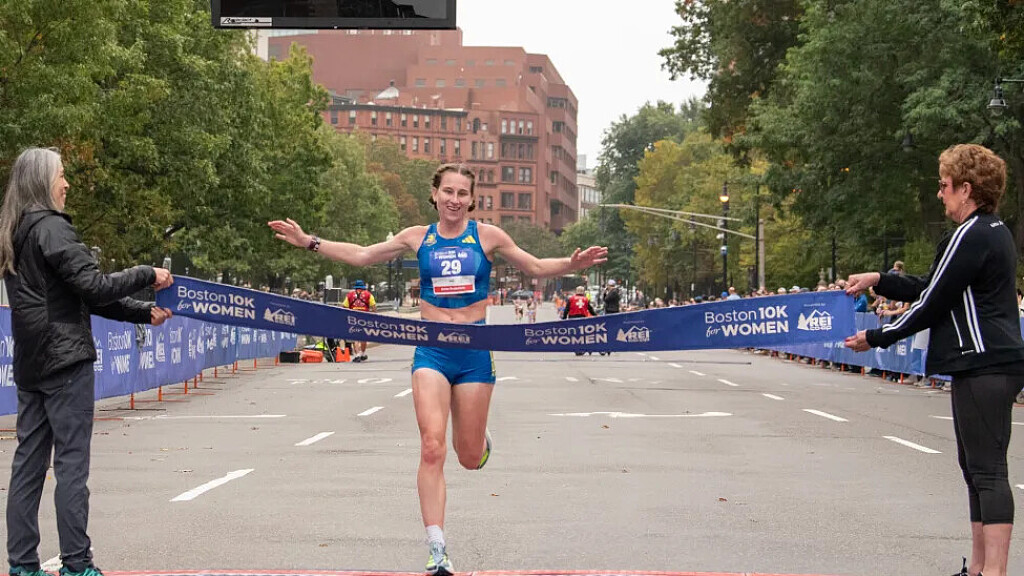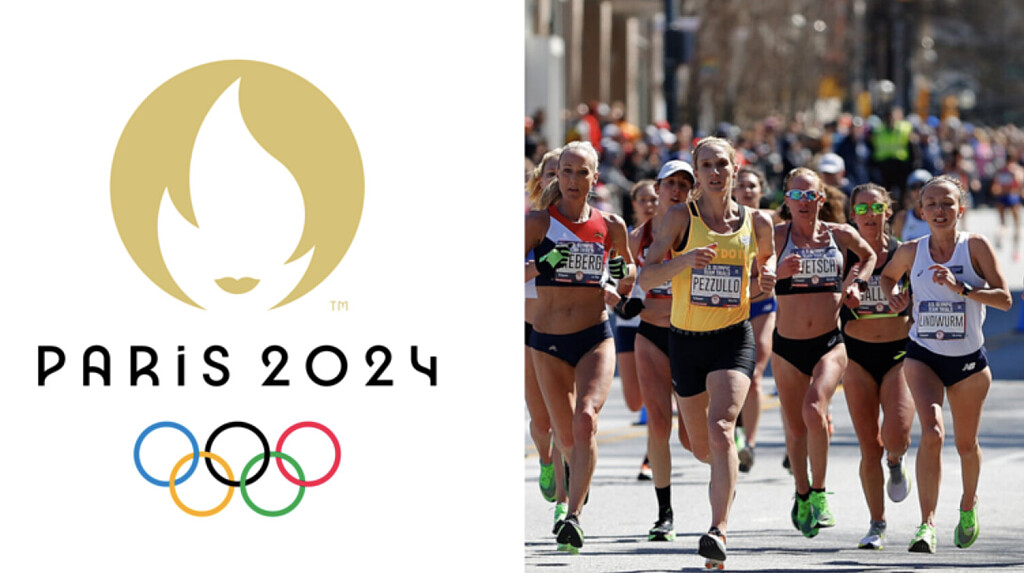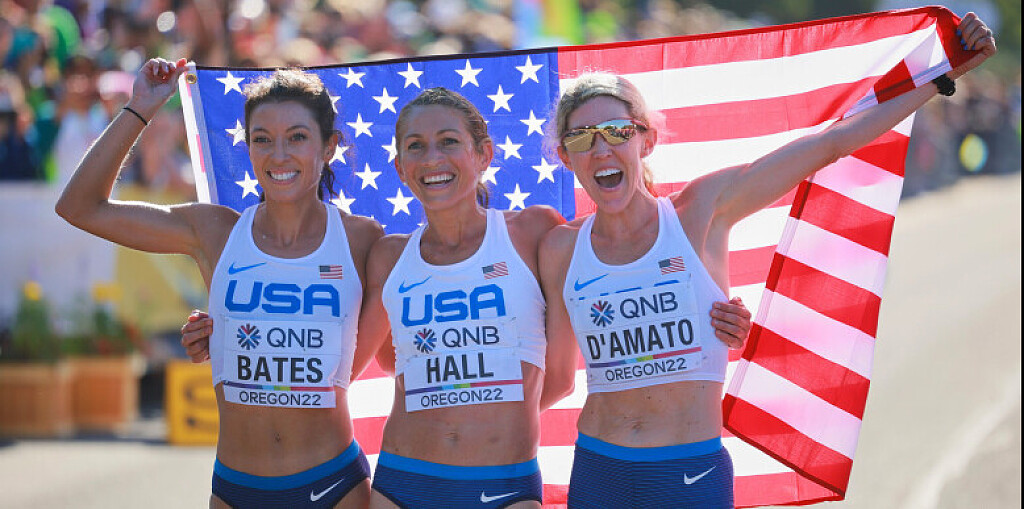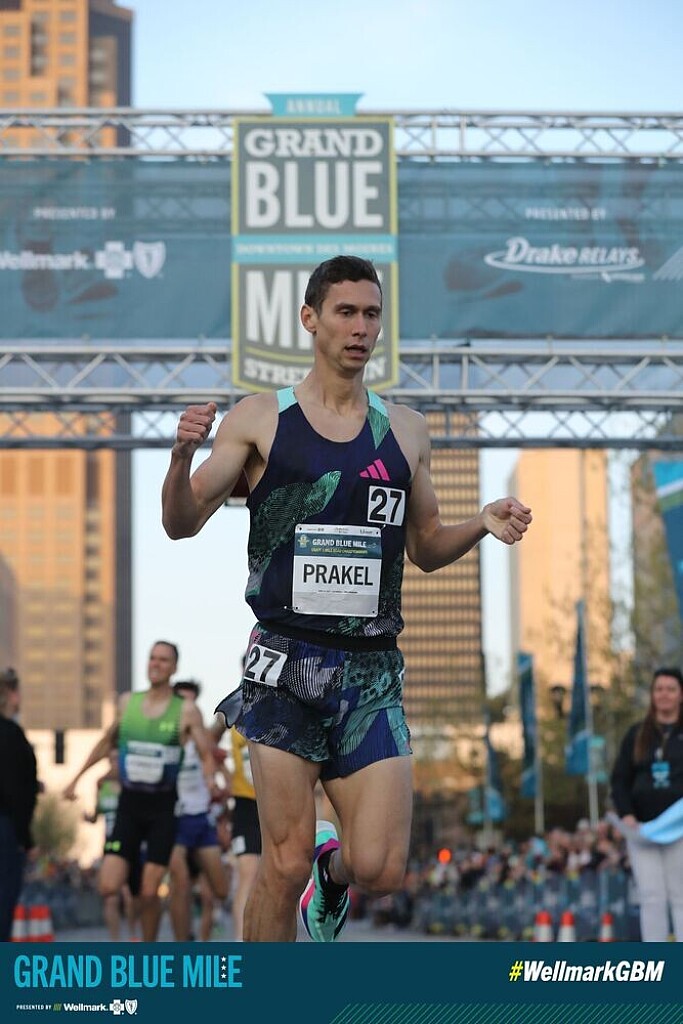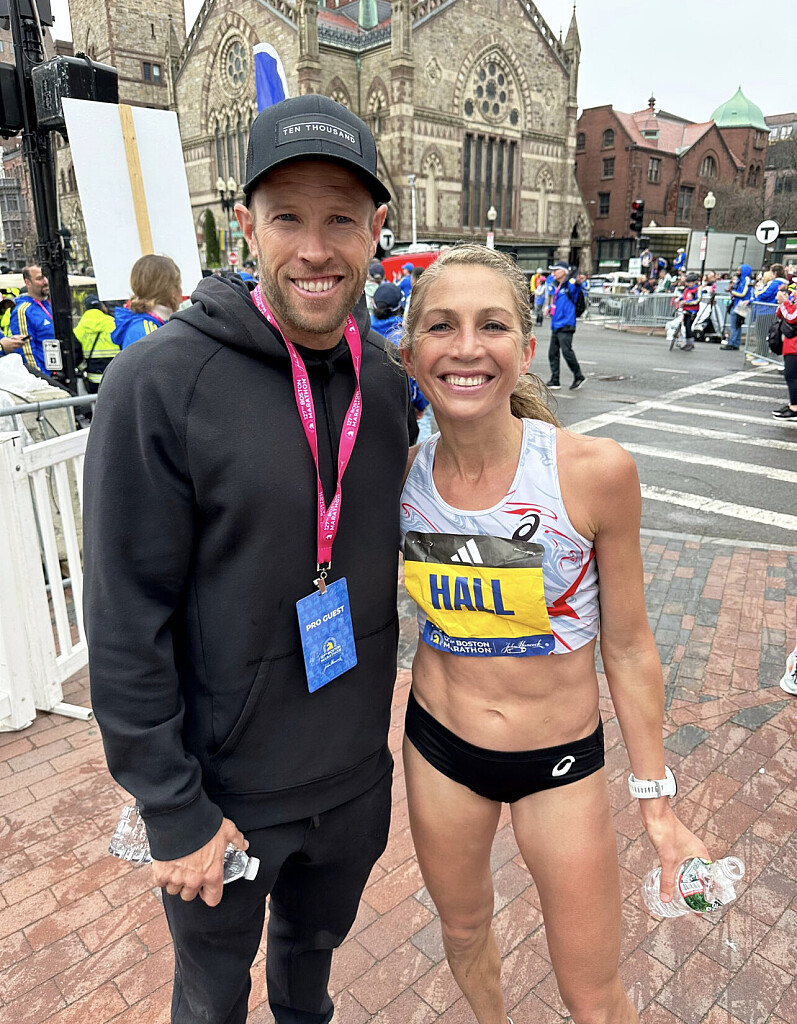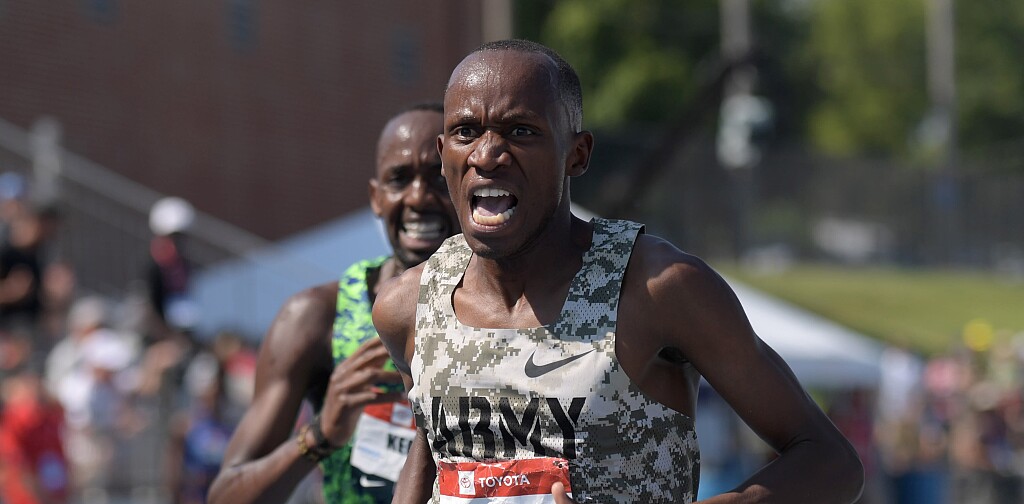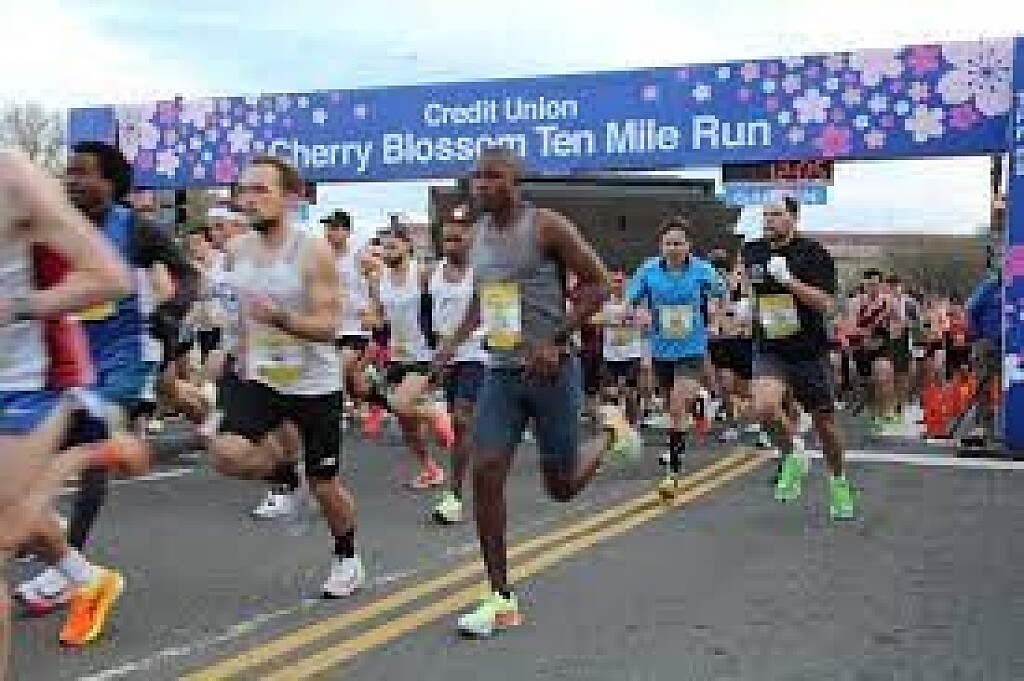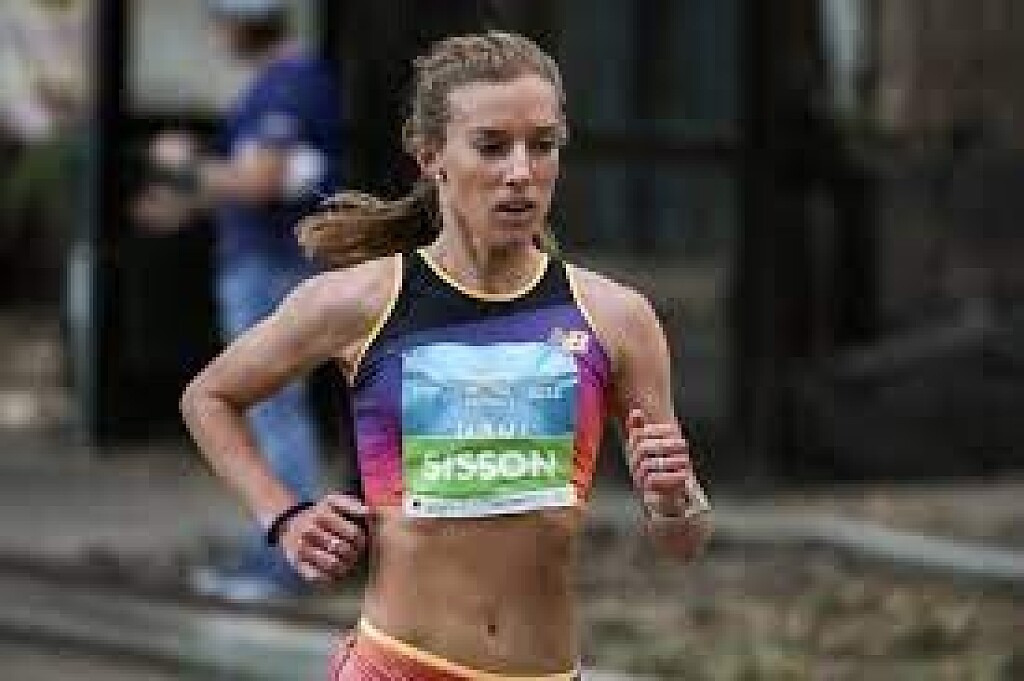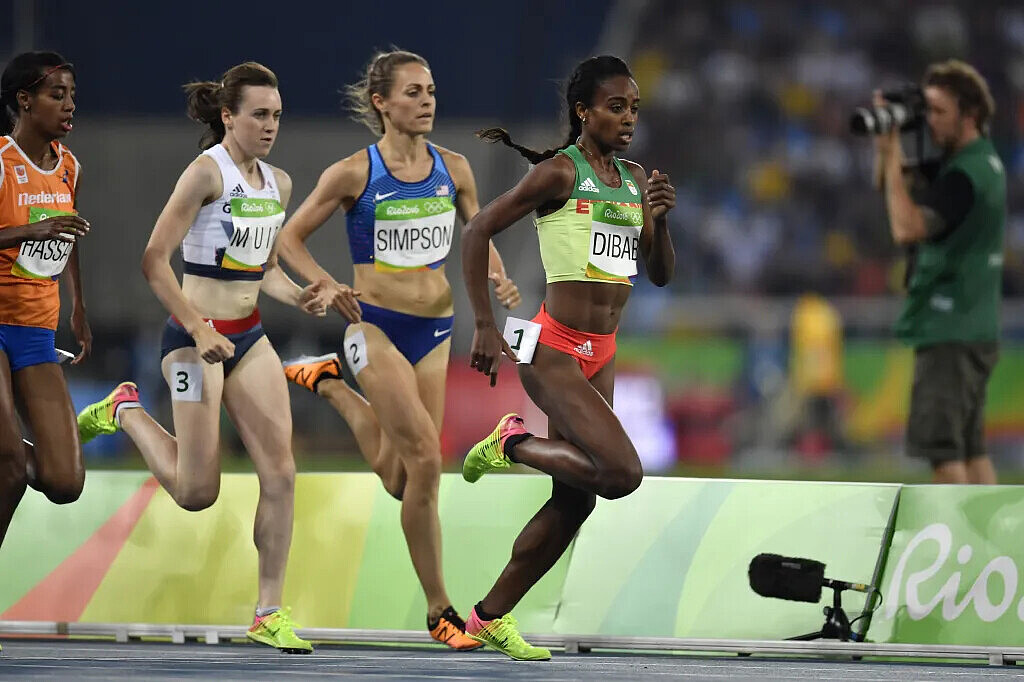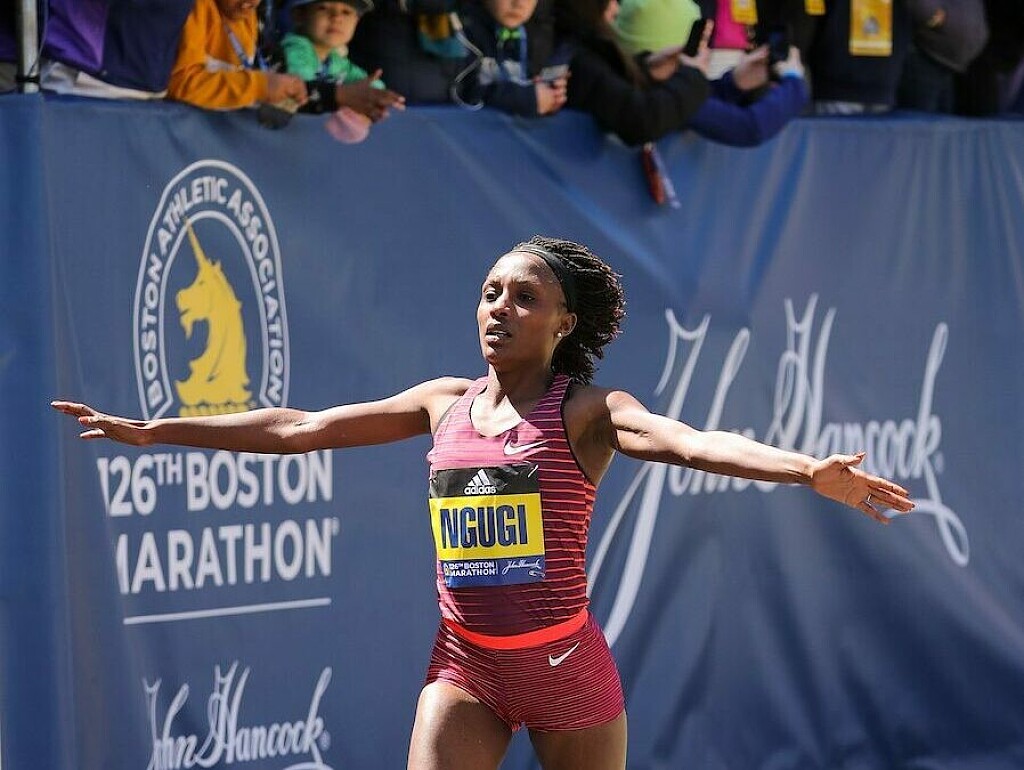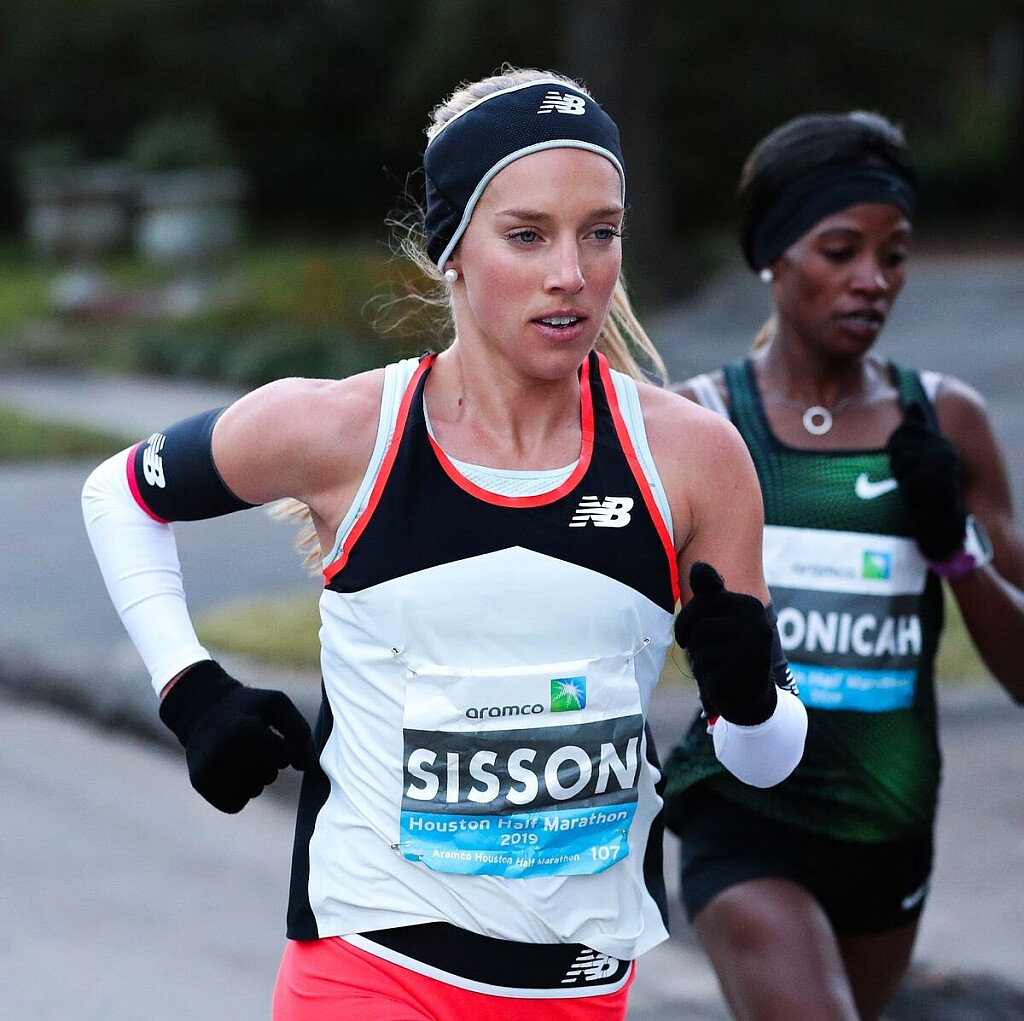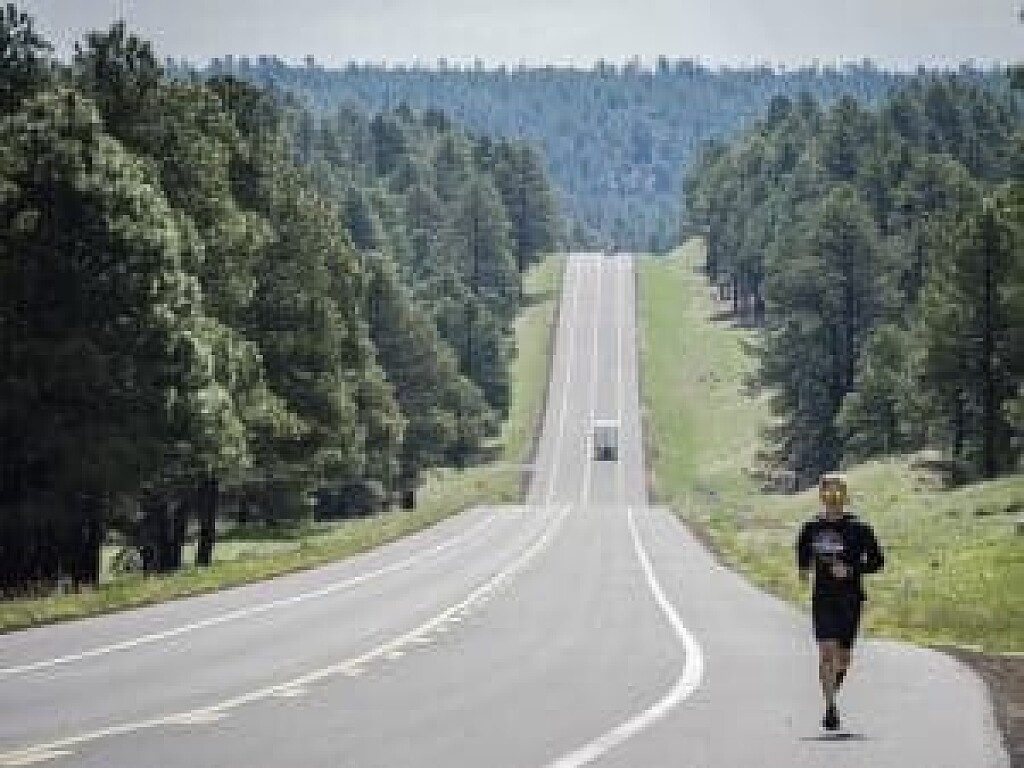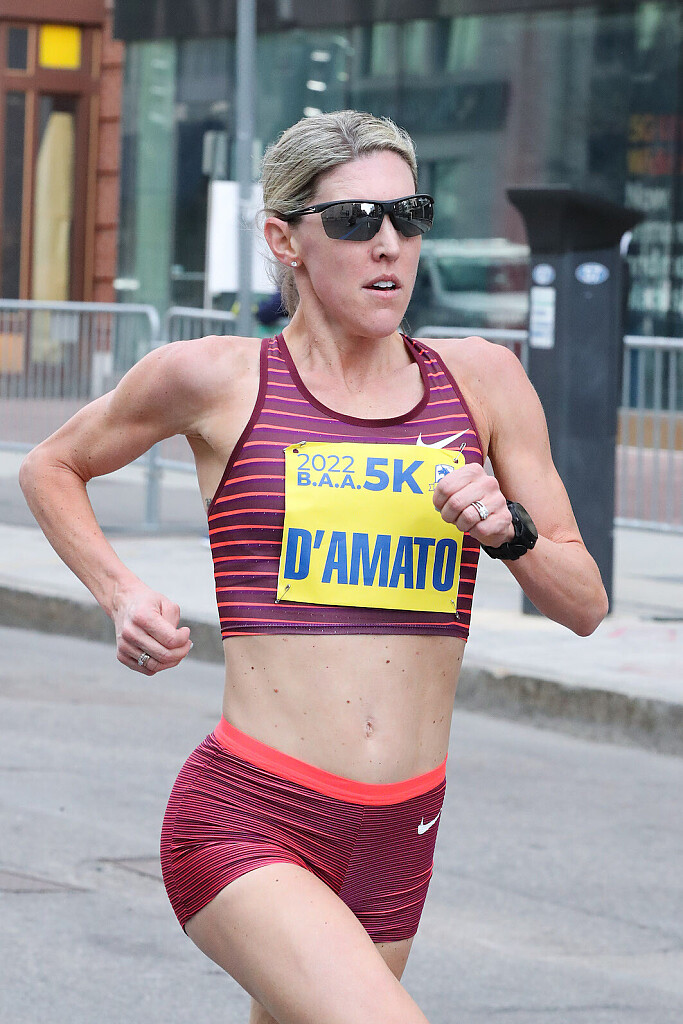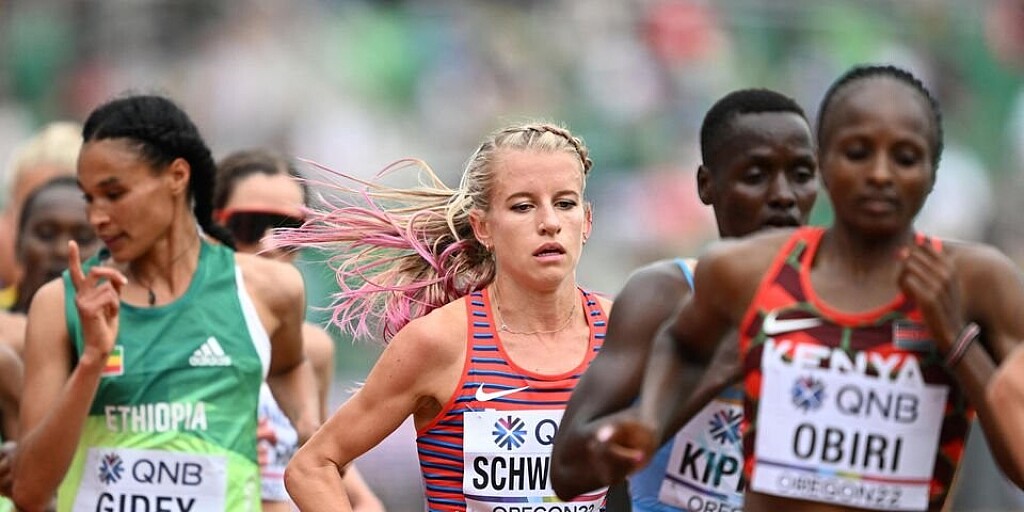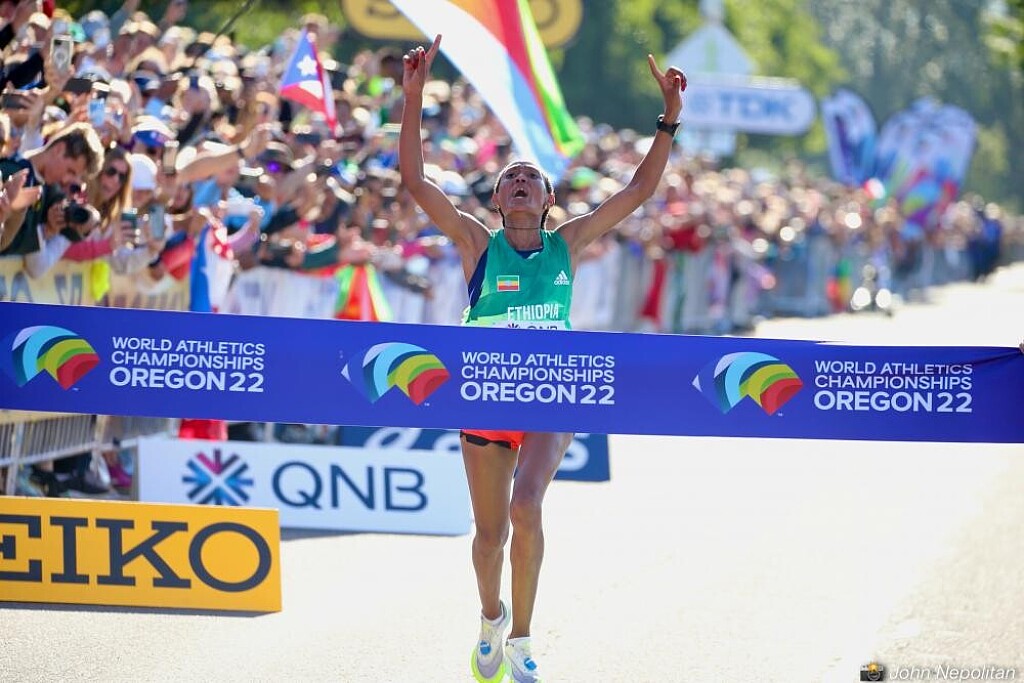Running News Daily
Running News Daily is edited by Bob Anderson. Send your news items to bob@mybestruns.com Advertising opportunities available. Train the Kenyan Way at KATA Kenya and Portugal owned and operated by Bob Anderson. Be sure to catch our movie A Long Run the movie KATA Running Camps and KATA Potato Farms - 31 now open in Kenya! https://kata.ke/
Index to Daily Posts · Sign Up For Updates · Run The World Feed
Articles tagged #Sara Hall
Today's Running News
American Depth Meets Global Firepower in Women’s Field for 130th Boston Marathon
The Boston Athletic Association (B.A.A.) has unveiled the women’s professional field for the 130th Boston Marathon presented by Bank of America, and the lineup signals one of the most competitive women’s races in event history. Athletes representing 18 countries will take the start, led by what may be the deepest American contingent ever assembled in Boston.
Thirteen U.S. women in the field have broken 2:26 for the marathon, setting the stage for aggressive racing on a course where experience and tactics often matter as much as raw speed.
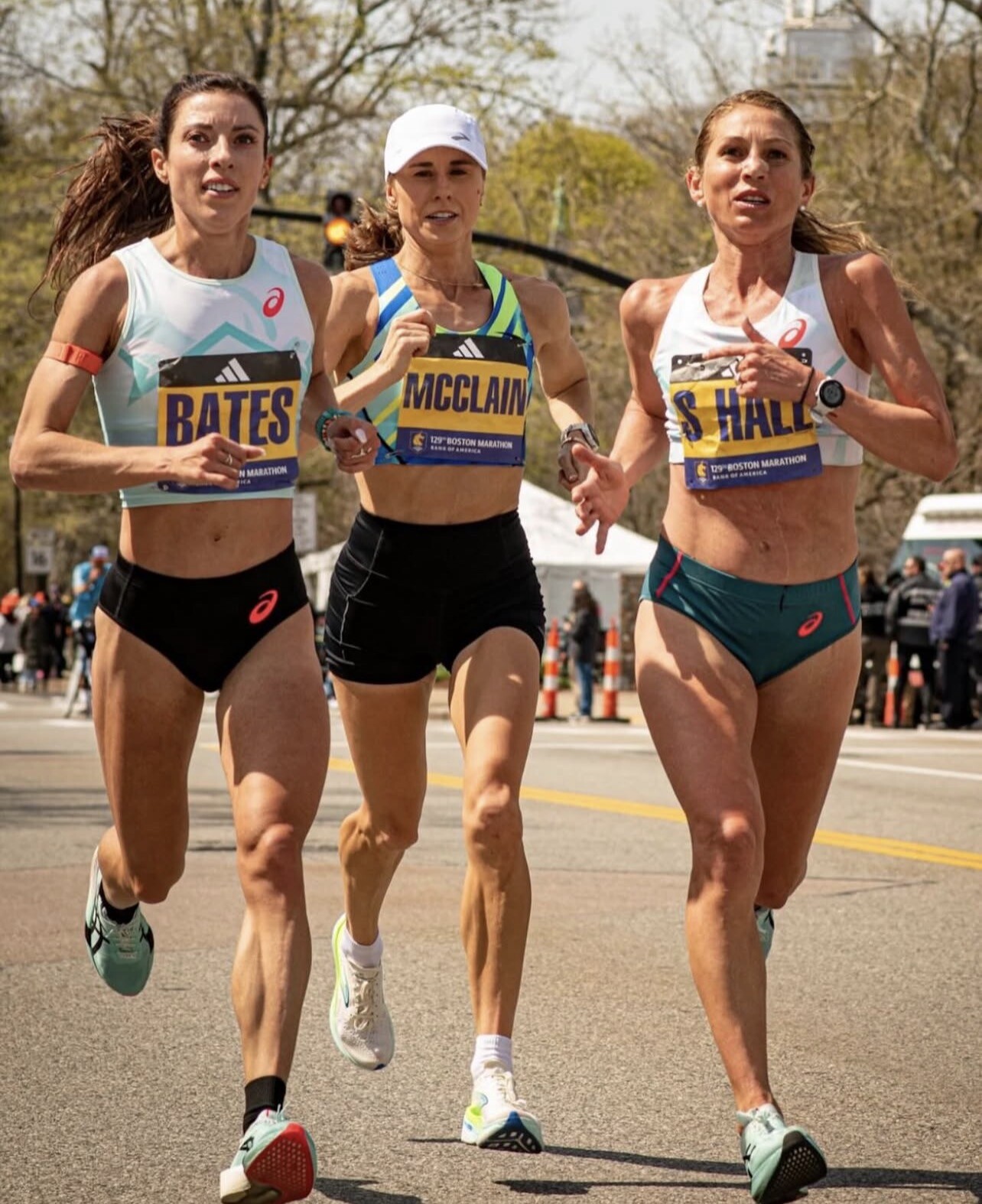
“The 130th edition of the Boston Marathon presented by Bank of America will feature unrivaled depth and head-to-head racing,” said Mary Kate Shea, Chief Operating Officer of the B.A.A. “The strength of the American field combined with the international experience sets the stage for a thrilling race on Boylston Street.
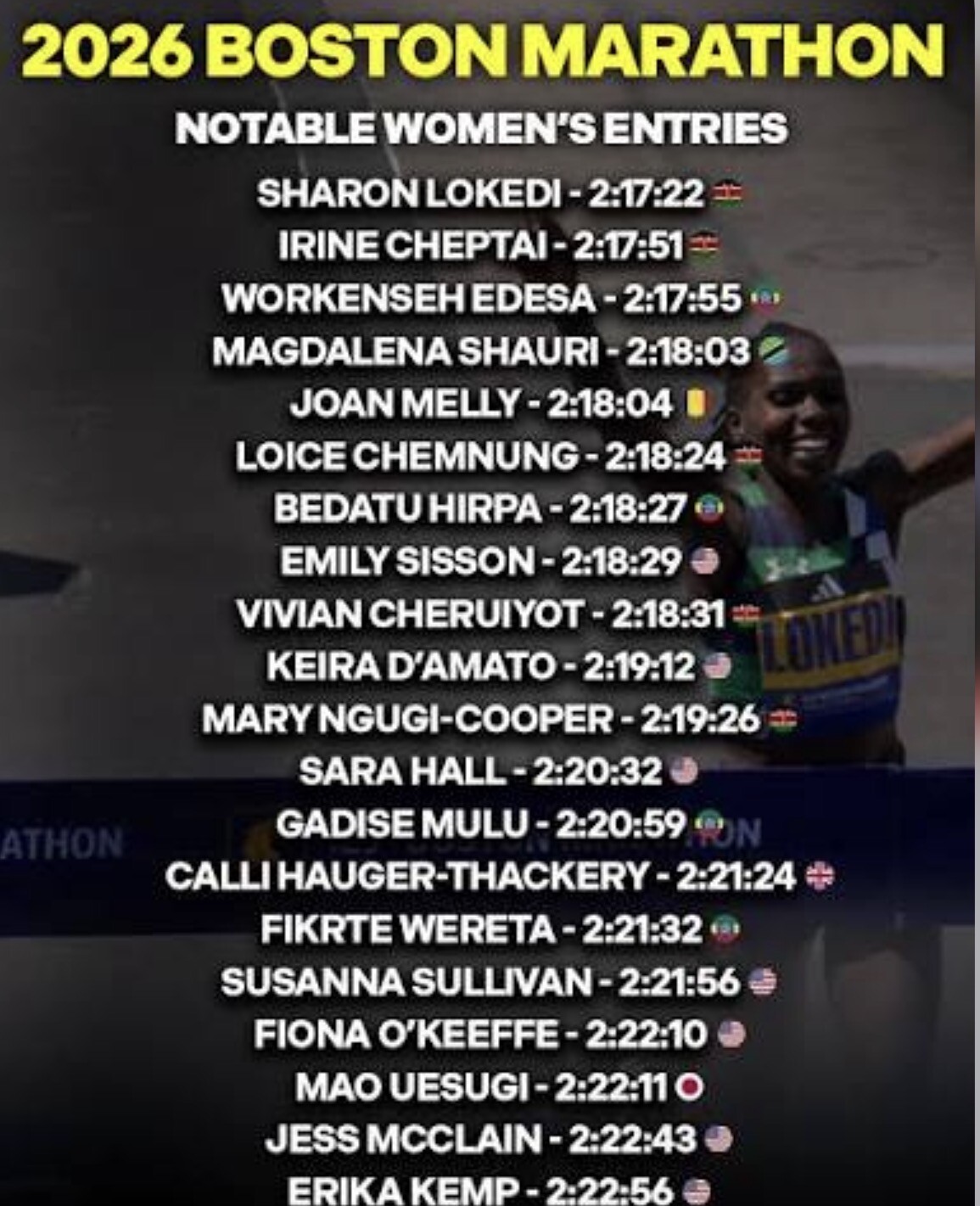
Headlining the U.S. squad is the full 2024 Olympic Marathon team: Emily Sisson, Fiona O’Keeffe, and Dakotah Popehn. Sisson enters as the American record holder at 2:18:29, while O’Keeffe is coming off a strong fourth-place finish at the 2025 New York City Marathon. Popehn posted a lifetime best of 2:24:21 at Chicago last fall.
Joining them is the entire U.S. team from the World Championships Marathon in Tokyo: Susanna Sullivan, Jess McClain, and Erika Kemp. McClain was the top American at Boston last year, finishing seventh in 2:22:43, while Kemp owns a personal best of 2:22:56, the fastest marathon ever run by a U.S.-born Black woman.
Annie Frisbie, eighth in Boston last year, returns after a fifth-place finish in New York, and Keira D’Amato, the former American record holder, will make her third Boston appearance. Veteran Sara Hallalso returns after a runner-up finish at the Houston Marathon in January.
Several Americans will make their Boston debuts, including Megan Sailor, Natosha Rogers, and Amanda Vestri, underscoring the breadth of U.S. talent now entering the marathon ranks.
Internationally, the challenge remains formidable. Defending champion Sharon Lokedi returns after her course-record 2:17:22 victory last year, joined by fellow Kenyans Irine Cheptai and Vivian Cheruiyot. Ethiopia is represented by Workenesh Edesa and Bedatu Hirpa, both proven winners on the global circuit.
Experience on Boston’s unforgiving course will be key for Calli Hauger-Thackery, who enjoyed a breakout 2025 season, and Kenya’s Mary Ngugi-Cooper, a five-time Boston top-ten finisher with a personal best of 2:19:25.
In the women’s wheelchair division, defending champion Susannah Scaroni leads the field after a dominant 2025 season that included victories in Boston, Chicago, New York, and Sydney. Switzerland’s Catherine Debrunner and Manuela Schär return as top challengers, with Schär holding the course record.
With elite depth across disciplines and generations, the women’s race at the 130th Boston Marathon is shaping up as one of the most compelling editions in recent memory—where tactics, experience, and courage will once again decide who claims glory on Boylston Street.
by Boris Baron
Login to leave a comment
Boston Marathon
Among the nation’s oldest athletic clubs, the B.A.A. was established in 1887, and, in 1896, more than half of the U.S. Olympic Team at the first modern games was composed of B.A.A. club members. The Olympic Games provided the inspiration for the first Boston Marathon, which culminated the B.A.A. Games on April 19, 1897. John J. McDermott emerged from a...
more...Sara Hall’s Brilliant California Marathon Run Upstaged by Molly Born’s Historic Debut in Sacramento
At 42 years old, Sara Hall produced one of the finest races of her storied career on Sunday at the California International Marathon — yet even her record-breaking brilliance wasn’t enough to stop the emergence of a new U.S. marathon star.
In a sensational debut that electrified the net-downhill course, 26-year-old Molly Born stormed to victory in 2:24:09, slicing 19 seconds off the women’s course record and claiming the 2025 USATF Marathon Championship title. The Oklahoma State alumna and Chapel Hill resident seized control at mile 19 and powered home with a fearless negative split, averaging a searing 5:30 per mile despite nearly stumbling on the homestretch.
Hall, the pre-race favorite and 2017 CIM champion, ran one of the greatest masters performances in U.S. history. Her 2:24:36 not only marked her fastest marathon since 2020, but also obliterated the American masters record for women over 40 and erased the sting of last month’s DNF in New York.
Megan Sailor completed the podium with a strong 2:25:16, but the day belonged to two runners at opposite ends of their careers: Hall, the enduring veteran proving she can still rise to championship form, and Born, whose fearless debut announces her as a rising force in U.S. distance running.
At a race known for breakthroughs, Sunday’s showdown delivered a generational moment — the established legend running one of her finest marathons, and the newcomer running into history.
by Boris Baron
Login to leave a comment
Molly Born Smashes Course Record in Marathon Debut; Futsum Zienasellassie Returns to the Top at CIM 2025
SACRAMENTO, California — December 7, 2025 The California International Marathon once again lived up to its reputation as America’s fastest championship course, producing breakout performances and reaffirming elite talent at the 2025 USATF Marathon Championships. Two standout athletes—Molly Born and Futsum Zienasellassie—delivered the signature performances of the day.
Born’s Brilliant Debut: 2:24:09 Course Record
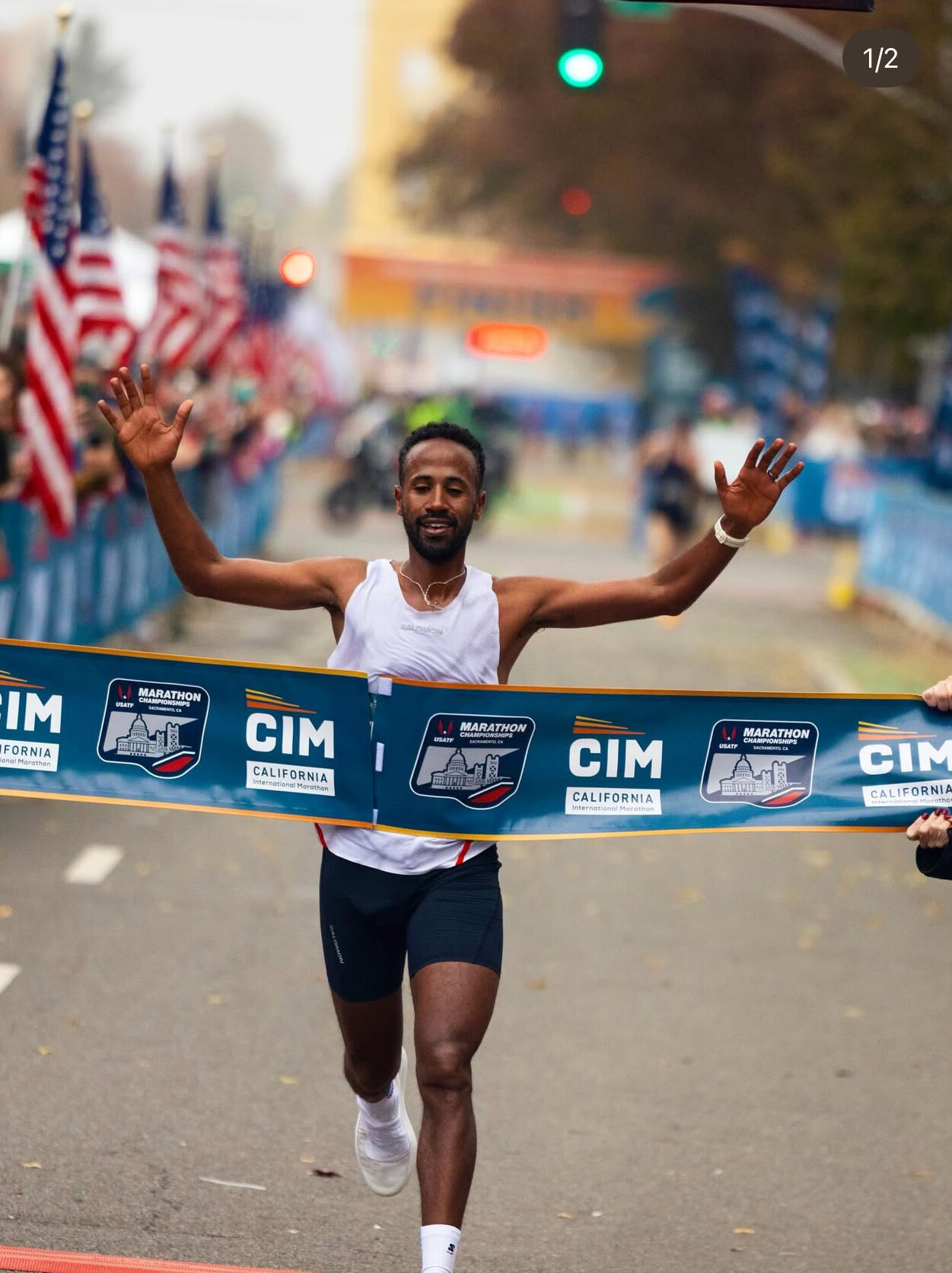
In her first-ever marathon, 26-year-old Molly Born ran with the poise and confidence of a seasoned veteran. The Oklahoma State alumna powered through the rolling downhills from Folsom to Sacramento to claim the 2025 USATF Marathon Championship in 2:24:09, breaking the women’s course record and announcing herself as a major new force in American distance running.
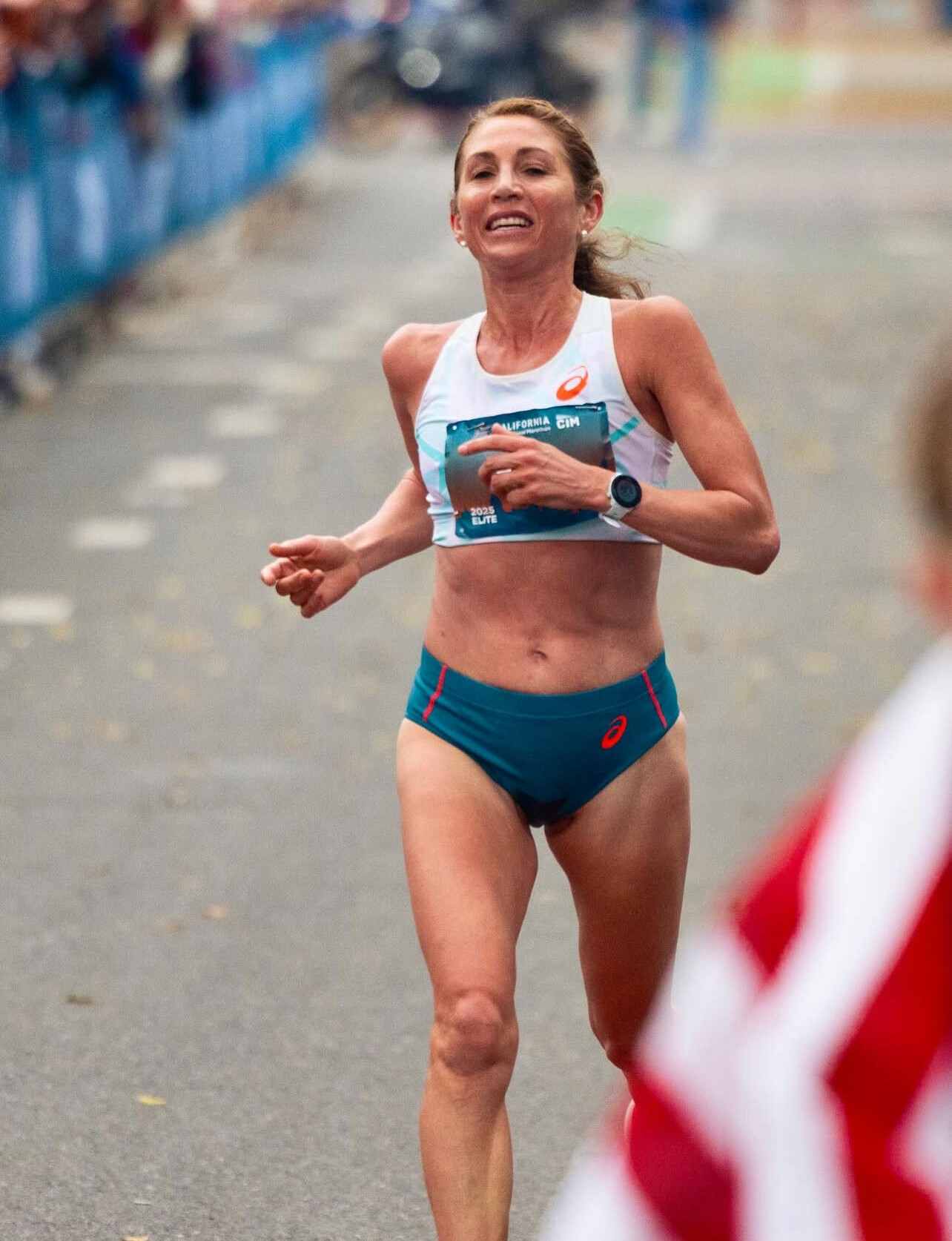
Born excelled at 1,500m through 10,000m during her collegiate career, but never attempted the marathon until today. Her debut suggests she has found her event.
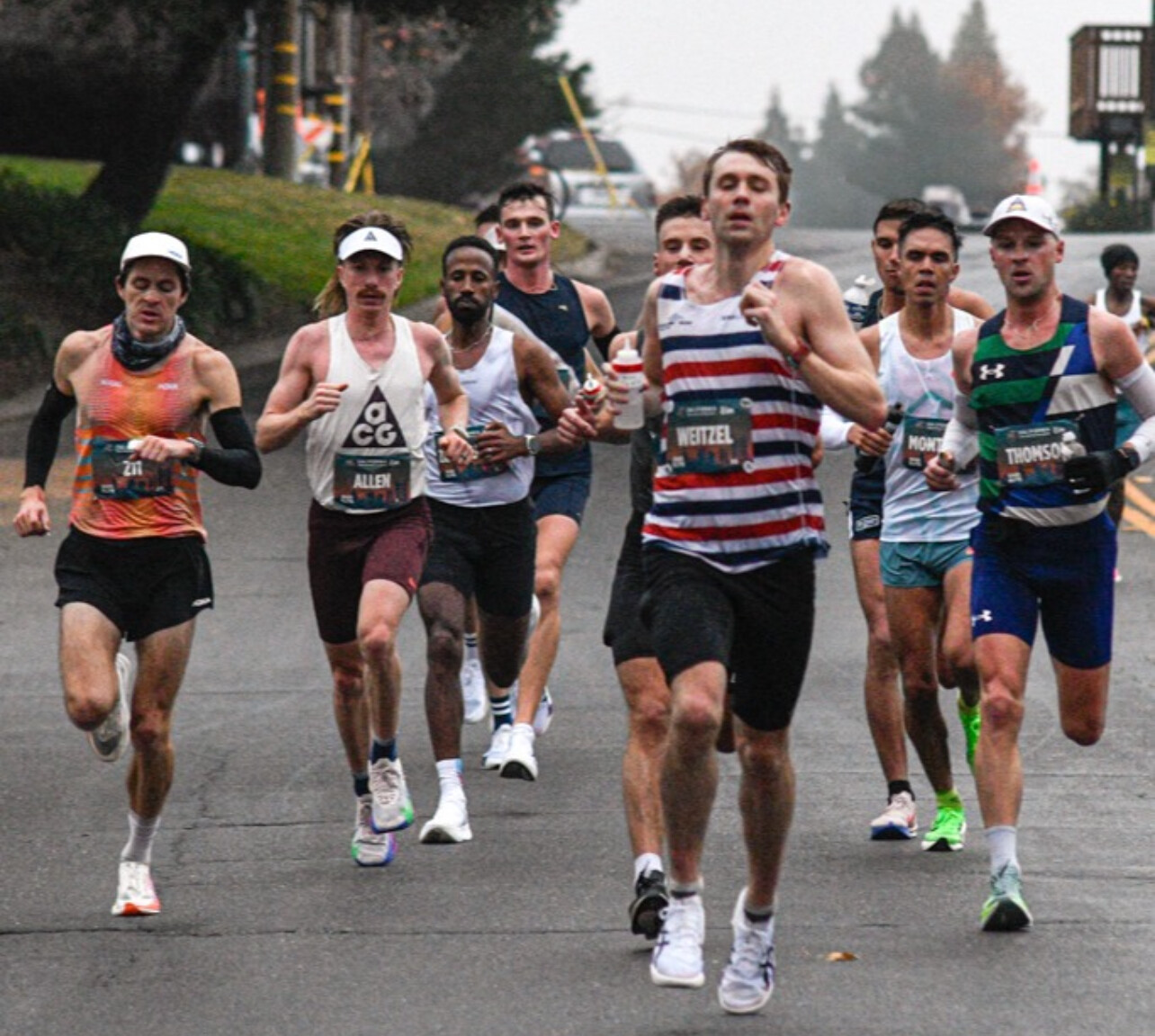
“I knew it was a possibility, but I wasn’t expecting all this,” Born said after winning.
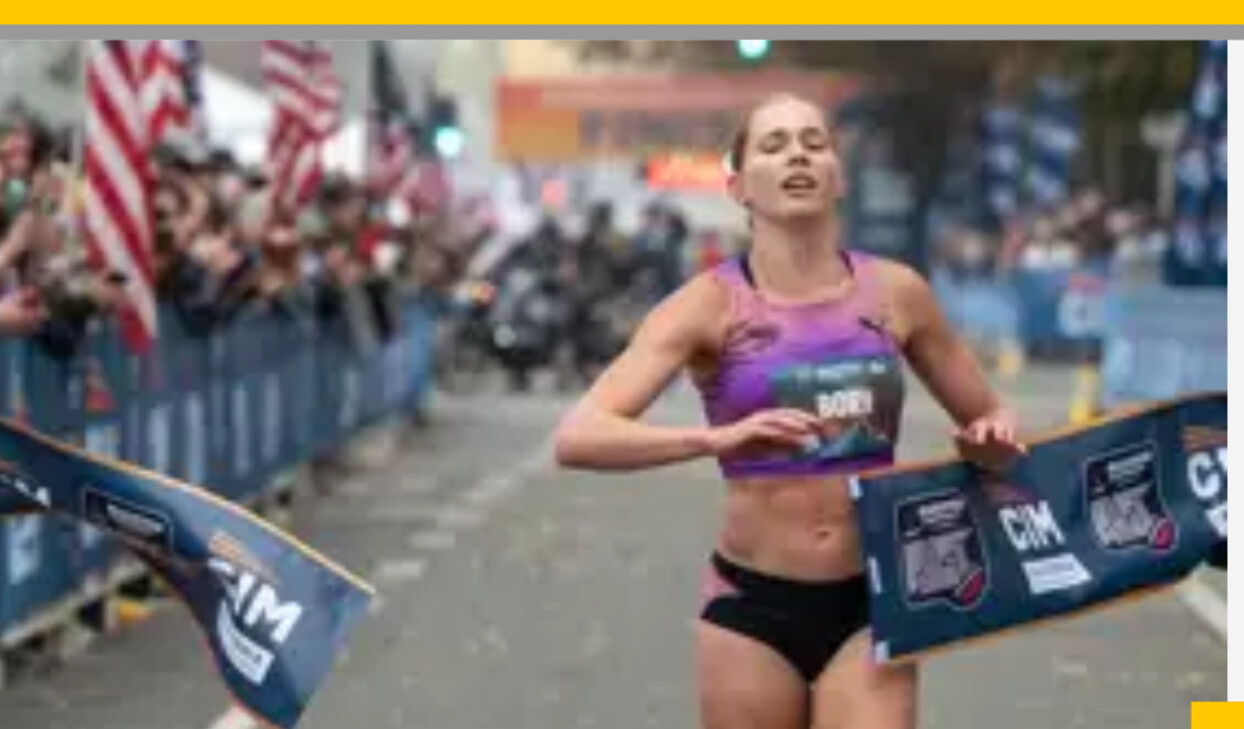
“It feels really good. I think I’ve found my event—going forward, it’s going to be the marathon.”
Women’s Top Five — CIM 2025
1. Molly Born — 2:24:09 (Course Record)
2. Sara Hall — 2:24:36
3. Megan Sailor — 2:25:16
4. Lindsey Bradley — 2:28:41
5. Maya Weigel — 2:28:44
Hall and Sailor also broke 2:26, marking one of the deepest women’s fields ever at CIM.
Zienasellassie Reclaims the CIM Crown
On the men’s side, Futsum Zienasellassie reclaimed the title he first won in 2022, crossing the finish in 2:09:29 to earn his second CIM victory. Smooth, controlled pacing and a strong final 10K separated him from the pack in a deep men’s field.
Zienasellassie famously grew up in Eritrea before starring at Northern Arizona University. His win today continues his rise as one of the most consistent American marathoners.
Men’s Top Five — CIM 2025
1. Futsum Zienasellassie — 2:09:29
2. Joseph Whelan — 2:09:41
3. Christian Allen — 2:09:57
4. Joseph Trojan — 2:10:38
5. Chris Maxon — 2:10:54
Three men breaking 2:10 on the CIM course underscores why this race remains a cornerstone of American distance running.
A Historic Day in Sacramento
Ideal racing conditions and CIM’s fast net-downhill profile helped produce one of the strongest editions in race history:
• A course record in the women’s race
• Three men under 2:10
• A national title decided in dramatic fashion
• An electrifying debut from one of America’s newest marathon stars
The 2025 California International Marathon once again proved why so many U.S. runners come to Sacramento seeking breakthroughs—and today, the event delivered exactly that.
by Boris Baron
Login to leave a comment
California International Marathon
The California International Marathon (CIM) is a marathon organized by runners, for runners! CIM was founded in 1983 by the Sacramento Running Association (SRA), a 501(c)(3) non-profit organization. The SRA Board of Directors is comprised of runners with a combined total of 150+ years of service to the CIM. The same route SRA management created for the 1983 inaugural CIM...
more...A Day for the History Books: Korir and Lokedi Shine at the 2025 Boston Marathon
The 129th edition of the Boston Marathon, held Monday, April 21, 2025, delivered unforgettable drama and record-setting performances on the iconic route from Hopkinton to Boylston Street. Under near-perfect running conditions—mid-50s temperatures, low humidity, and a light tailwind—elite runners took full advantage, producing some of the fastest times in race history.
John Korir Claims His Crown and Continues a Family Legacy
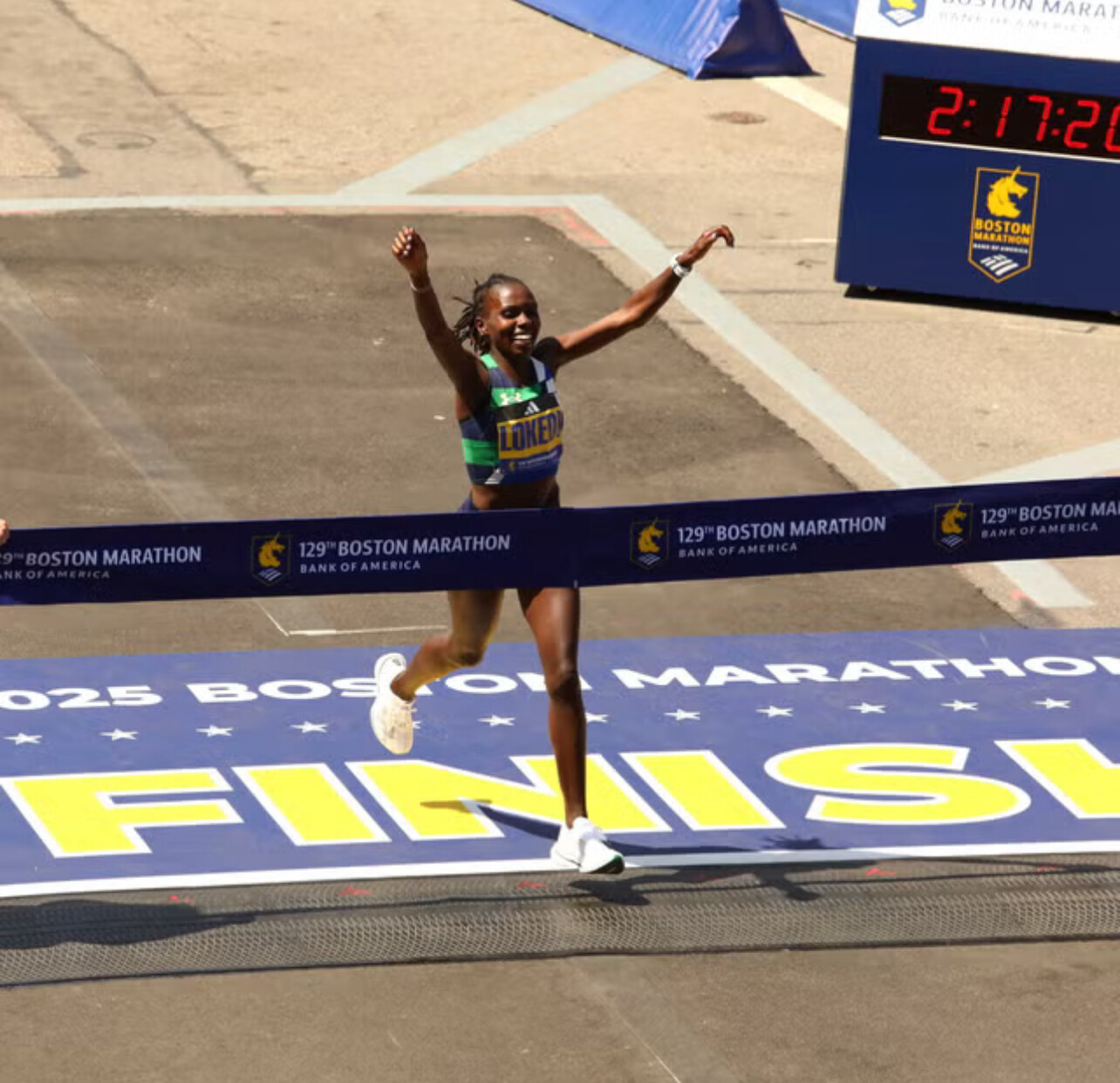
Kenya’s John Korir won the men’s race in a sensational 2:04:45, the second-fastest time ever run on the Boston course. The younger brother of 2012 Boston champion Wesley Korir, John added another chapter to his family’s Boston legacy by not only conquering the challenging course but doing so in dominant fashion.
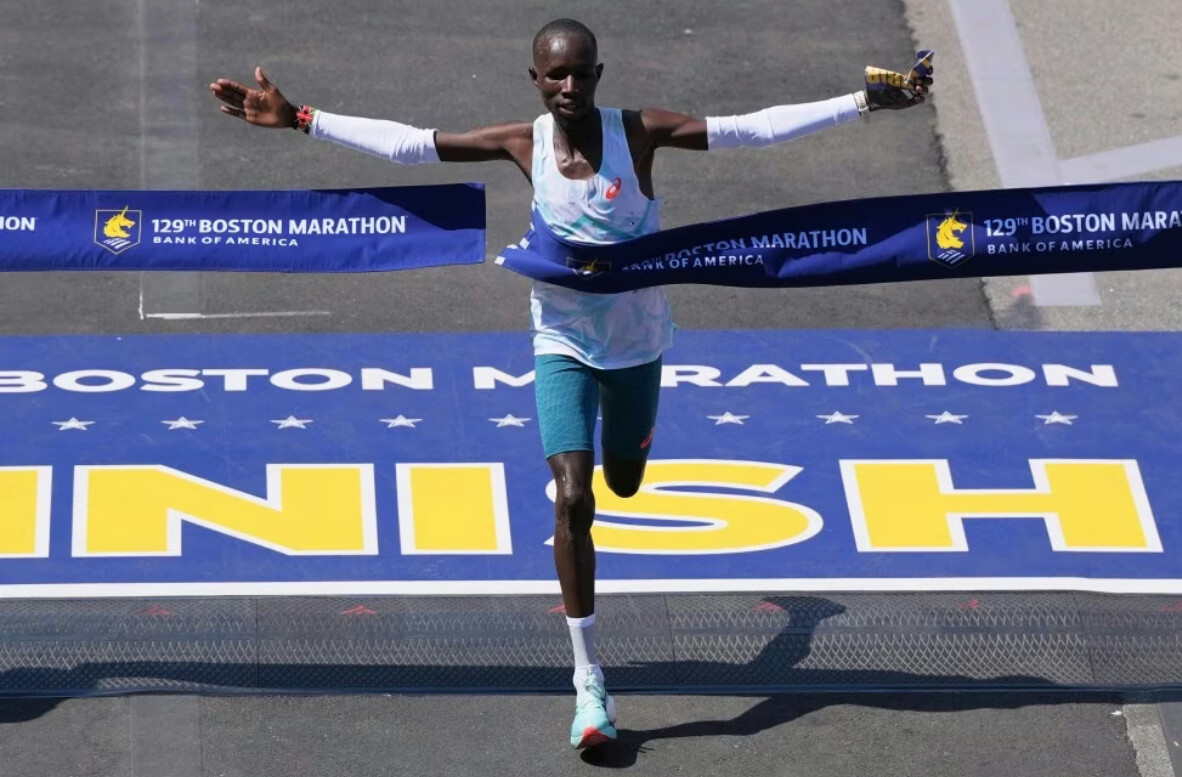
Despite a minor fall early in the race, Korir surged away from a deep international field after 20 miles, building a gap that no one could close. His finishing time was just over a minute shy of Geoffrey Mutai’s legendary 2:03:02 from 2011—the fastest time ever run in Boston but not eligible as a world record due to the course layout.
“I knew I was ready for something big,” Korir said post-race. “To follow in my brother’s footsteps and win Boston means everything.”
American hopes were high coming into the race, and Conner Mantz did not disappoint. Running a massive personal best of 2:05:08, he placed fourth overall and became the second-fastest American ever on the Boston course, behind only Ryan Hall’s 2:04:58 (set in 2011).
Sharon Lokedi Breaks the Tape—and the Record
The women’s race was equally historic. Sharon Lokedi, who won the 2022 New York City Marathon, delivered the performance of her life to win in 2:17:22, a new Boston Marathon course record, smashing the previous mark of 2:19:59 set by Buzunesh Deba in 2014.
Lokedi ran a smart, strategic race. She stayed tucked in a lead pack through the Newton Hills and then launched a powerful surge at mile 24, dropping two-time Boston champion Hellen Obiri and the rest of the field. Obiri finished second in a personal best 2:18:10, making it a Kenyan 1-2 sweep on the women’s podium.
“This course is tough, but I felt strong the whole way,” Lokedi said. “To run a course record here—it’s just unbelievable.”
Top 10 Elite Men – 2025 Boston Marathon
1. John Korir (Kenya) – 2:04:45
2. Alphonce Simbu (Tanzania) – 2:05:04
3. Cybrian Kotut (Kenya) – 2:05:04
4. Conner Mantz (USA) – 2:05:08
5. Muktar Edris (Ethiopia) – 2:05:59
6. Rory Linkletter (Canada) – 2:07:02
7. Clayton Young (USA) – 2:07:04
8. Tebello Ramakongoana (Lesotho) – 2:07:19
9. Daniel Mateiko (Kenya) – 2:07:52
10. Ryan Ford (USA) – 2:08:00
Top 10 Elite Women – 2025 Boston Marathon
1. Sharon Lokedi (Kenya) – 2:17:22 (Course Record)
2. Hellen Obiri (Kenya) – 2:17:41
3. Yalemzerf Yehualaw (Ethiopia) – 2:18:06
4. Irine Cheptai (Kenya) – 2:21:32
5. Amane Beriso (Ethiopia) – 2:21:58
6. Calli Thackery (Great Britain) – 2:22:38
7. Jess McClain (USA) – 2:22:43
8. Annie Frisbie (USA) – 2:23:21
9. Stacy Ndiwa (Kenya) – 2:23:29
10. Tsige Haileslase (Ethiopia) – 2:23:43
Notable American Performances
• Emma Bates finished 13th with a time of 2:25:10.
• Dakotah Popehn secured 16th place in 2:26:09.
• Des Linden completed her 28th and final professional marathon, finishing 17th in 2:26:19.
• Sara Hall placed 18th with a time of 2:26:32.
Looking Ahead
The 2025 Boston Marathon reaffirmed its place as one of the world’s premier races—not just for its history and prestige, but for its ability to showcase incredible athletic achievement. With deep American performances and Kenyan dominance at the front, it sets the stage for an exciting year.
For fans, runners, and historians, this year’s Boston will go down as one of the most memorable ever.
My Best Runs
Your front row seat to the world of running
by Boris Baron
Login to leave a comment
Boston Marathon
Among the nation’s oldest athletic clubs, the B.A.A. was established in 1887, and, in 1896, more than half of the U.S. Olympic Team at the first modern games was composed of B.A.A. club members. The Olympic Games provided the inspiration for the first Boston Marathon, which culminated the B.A.A. Games on April 19, 1897. John J. McDermott emerged from a...
more...Sara Hall Returns to Boston Marathon, Continuing a Legacy of Excellence
Sara Hall, one of America’s most accomplished marathoners, is set to compete in the 129th Boston Marathon on April 21, 2025. This marks her fourth appearance in Boston, where she aims to build upon her impressive track record.
Hall’s personal best in the marathon is 2:20:32, achieved at The Marathon Project in 2020, making her the fourth-fastest American woman in history at the distance. In 2024, she finished 15th overall and was the second American woman at the Boston Marathon with a time of 2:27:58. Later that year, she broke her own American masters record by running 2:23:45 at the Valencia Marathon .
Hall’s versatility is evident in her achievements across various distances. She set an American half marathon record of 1:07:15 in 2022 and has won 10 U.S. national titles, uniquely securikng championships in both the mile and the marathon. Her international accolades include a gold medal in the 3,000m steeplechase at the 2011 Pan American Games .
Beyond her athletic prowess, Hall is known for her commitment to philanthropy. She and her husband, Ryan Hall, a former U.S. Olympian and American record holder in the half marathon, co-founded the Hall Steps Foundation, which focuses on combating global poverty. In 2015, they adopted four sisters from Ethiopia, expanding their family and deepening their connection to the global community .
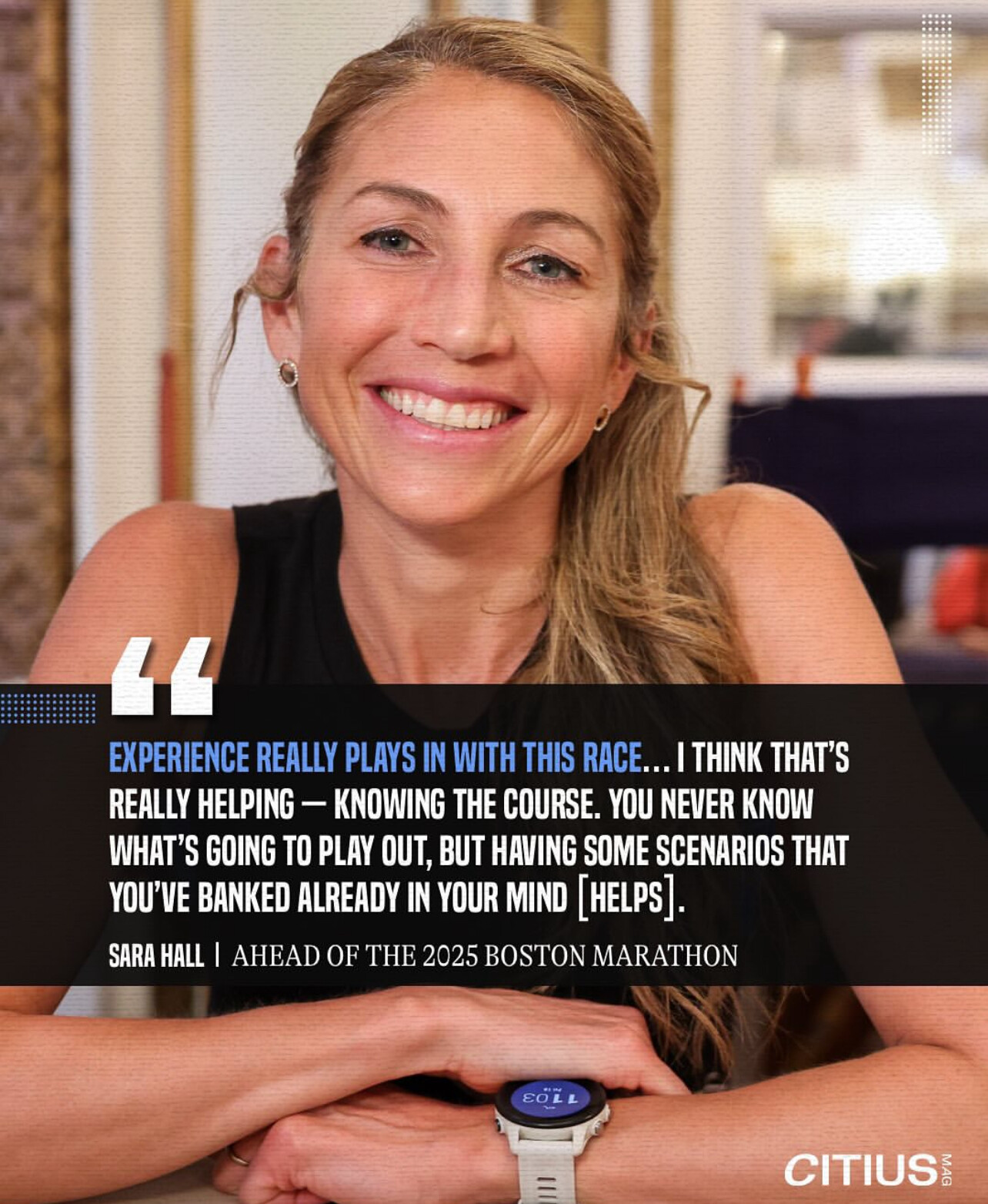
As Hall prepares for the 2025 Boston Marathon, she continues to inspire with her dedication, resilience, and contributions both on and off the course.
by Boris Baron
Login to leave a comment
American Stars Ready to Shine at the 2025 Boston Marathon
The 129th Boston Marathon, set for Monday, April 21, 2025, promises to be a historic showdown between international champions and a formidable field of elite American runners. With defending champions Hellen Obiri and Sisay Lemma returning to defend their titles, the depth of competition will be among the strongest in recent memory.
Elite American Men
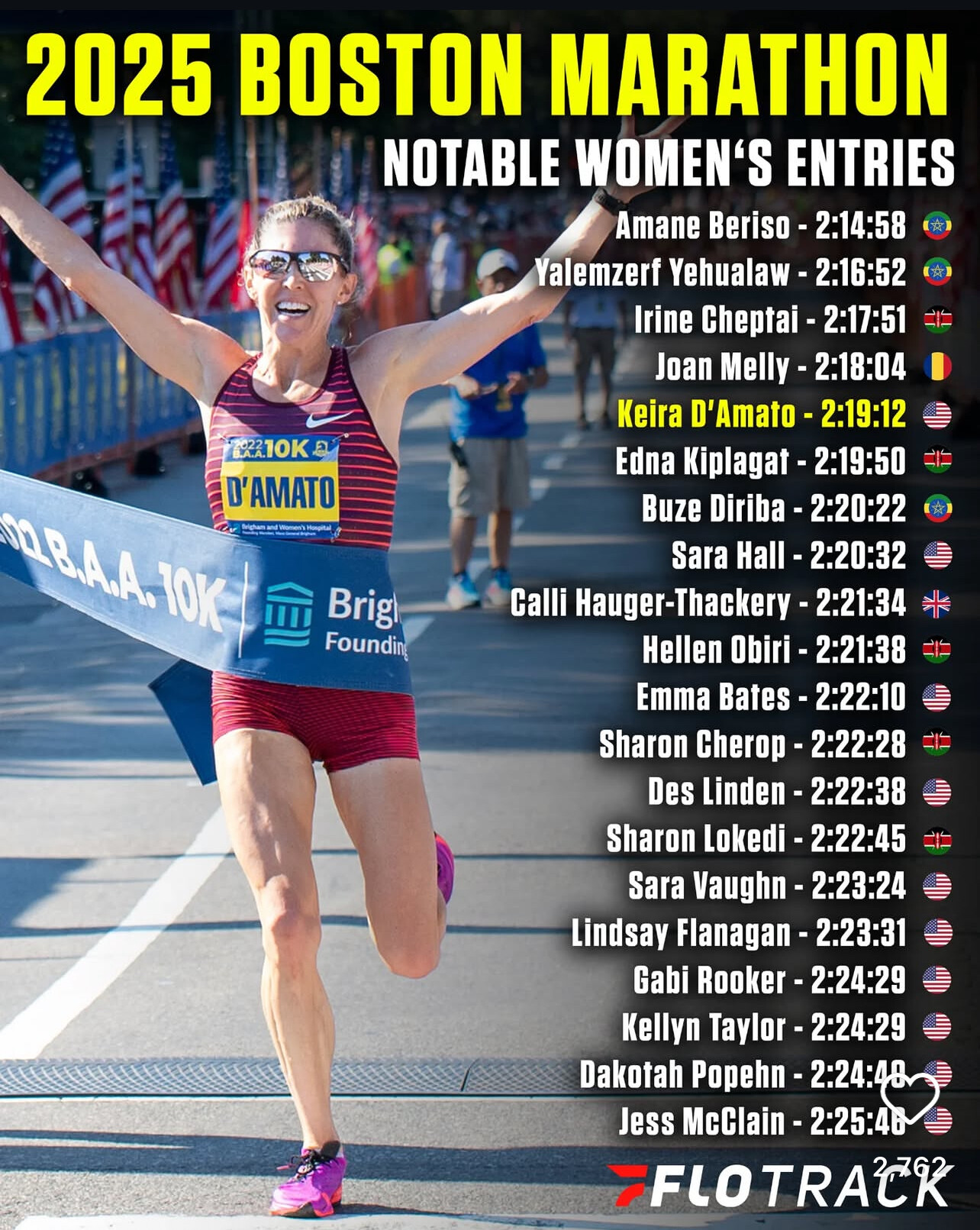
• Conner Mantz – PB: 2:07:47
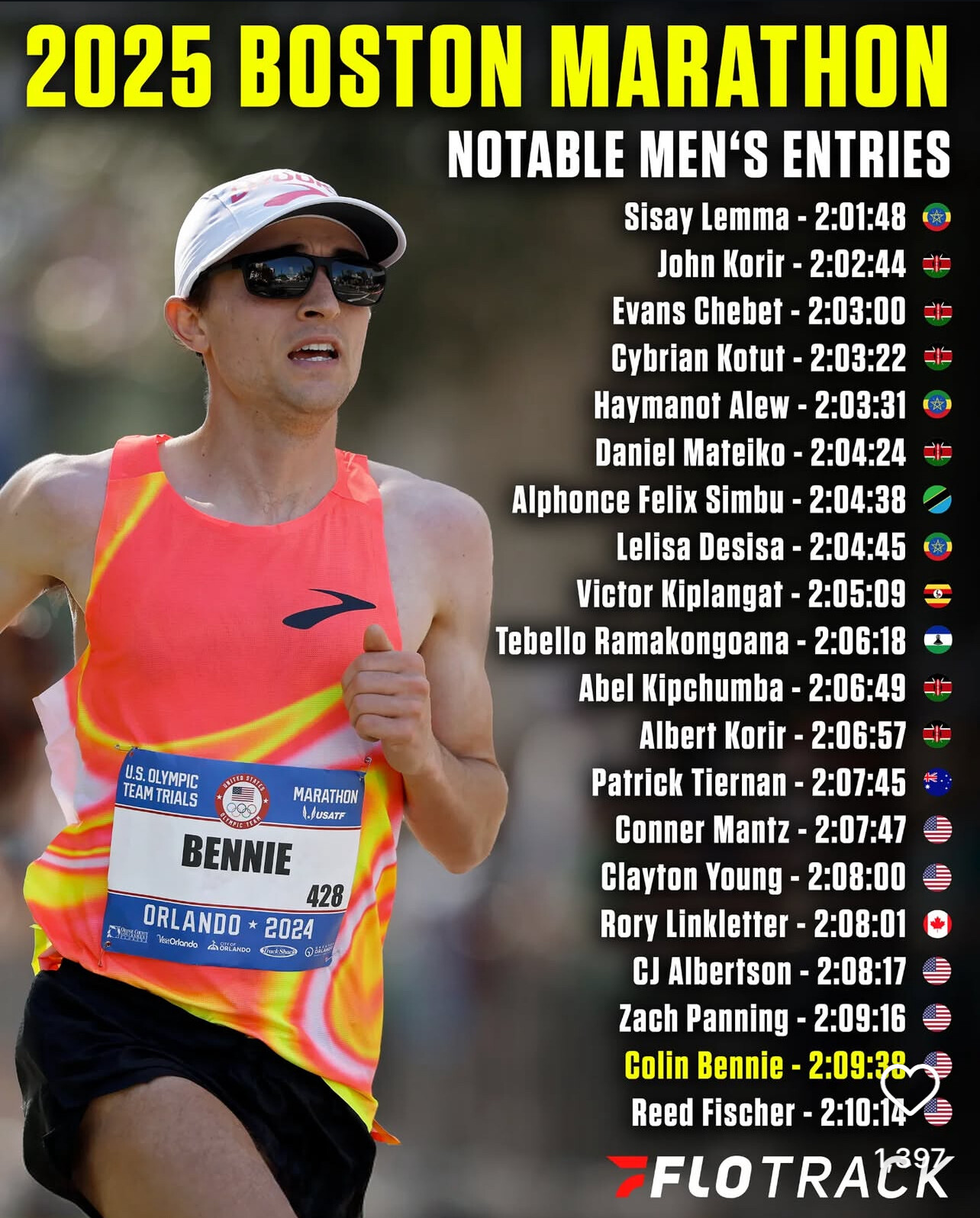
Mantz enters Boston as one of the top American hopes, fresh off an 8th-place finish at the Paris Olympics and 6th in New York City.
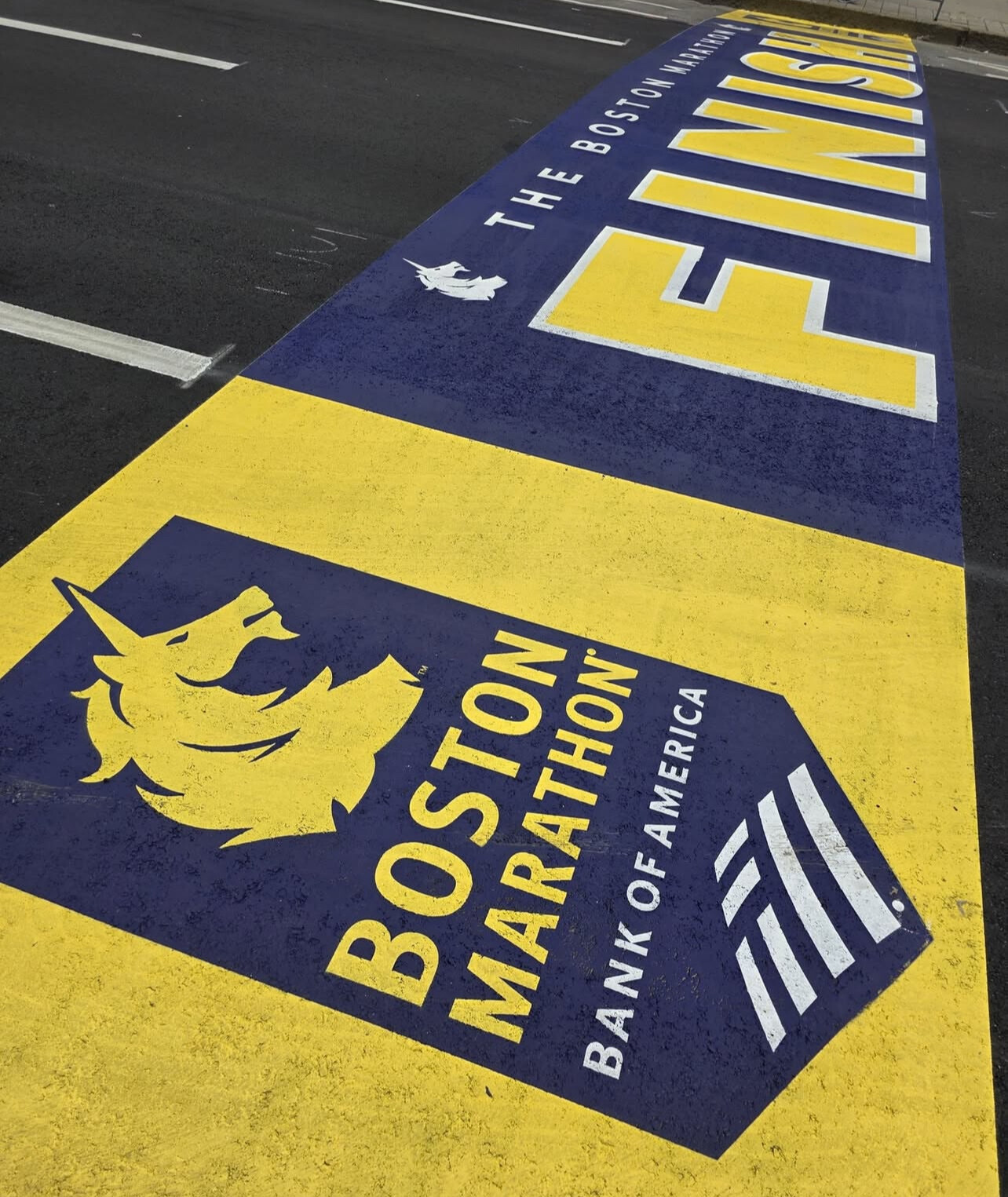
• Clayton Young – PB: 2:08:00
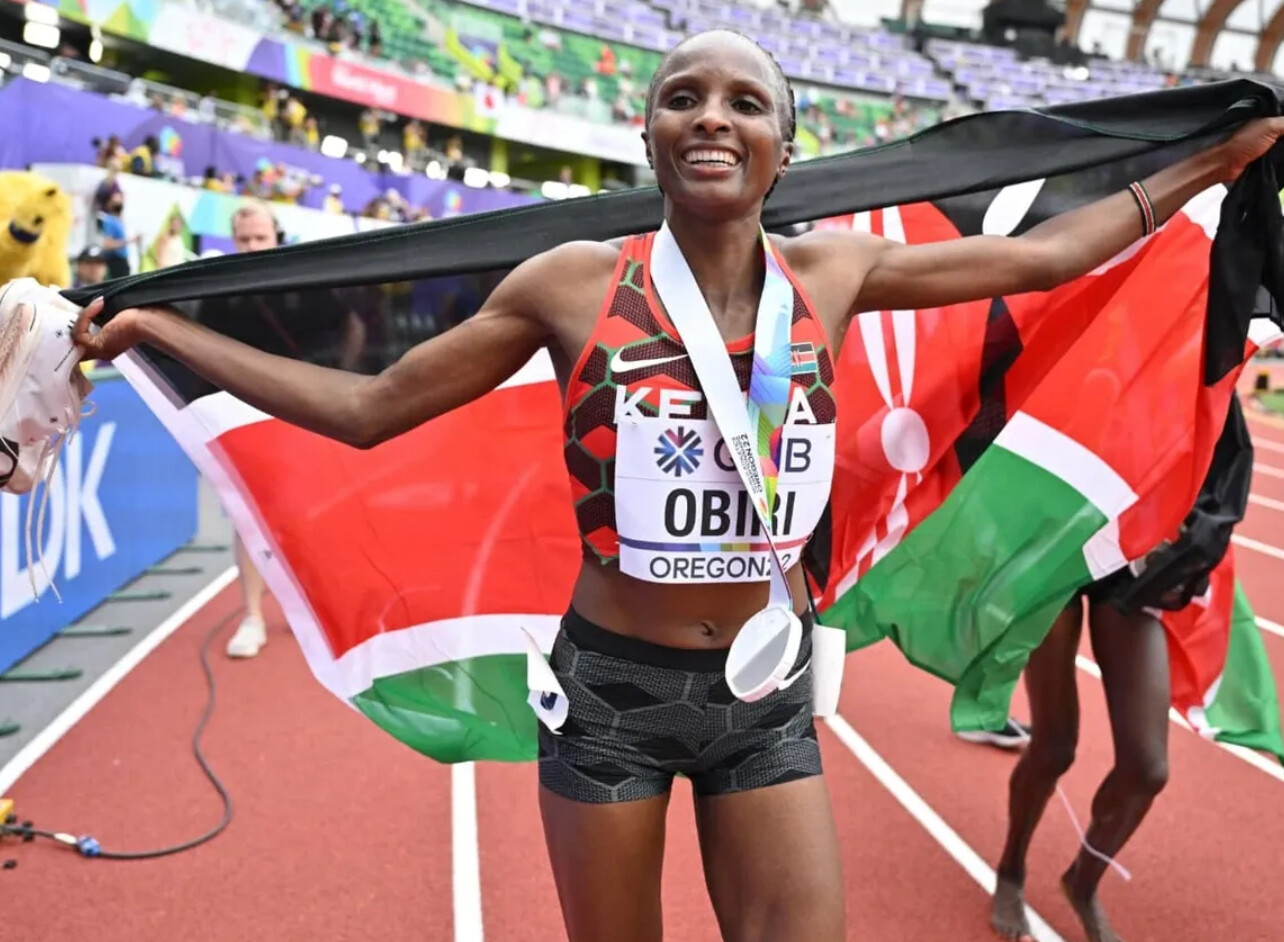
Training alongside Mantz, Young placed 9th in Paris and 7th in NYC, and continues to close the gap with the world’s best.
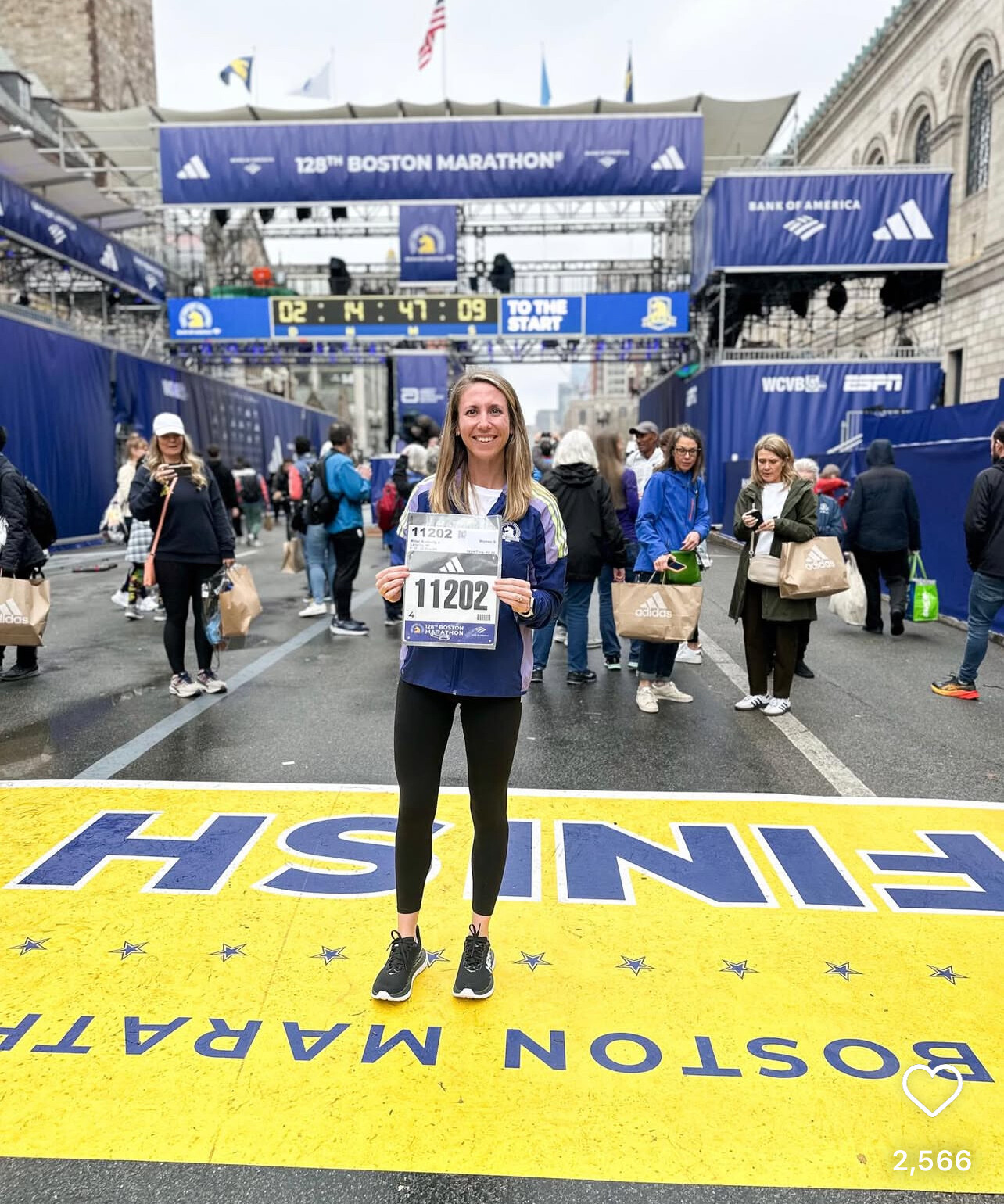
• CJ Albertson – PB: 2:08:17
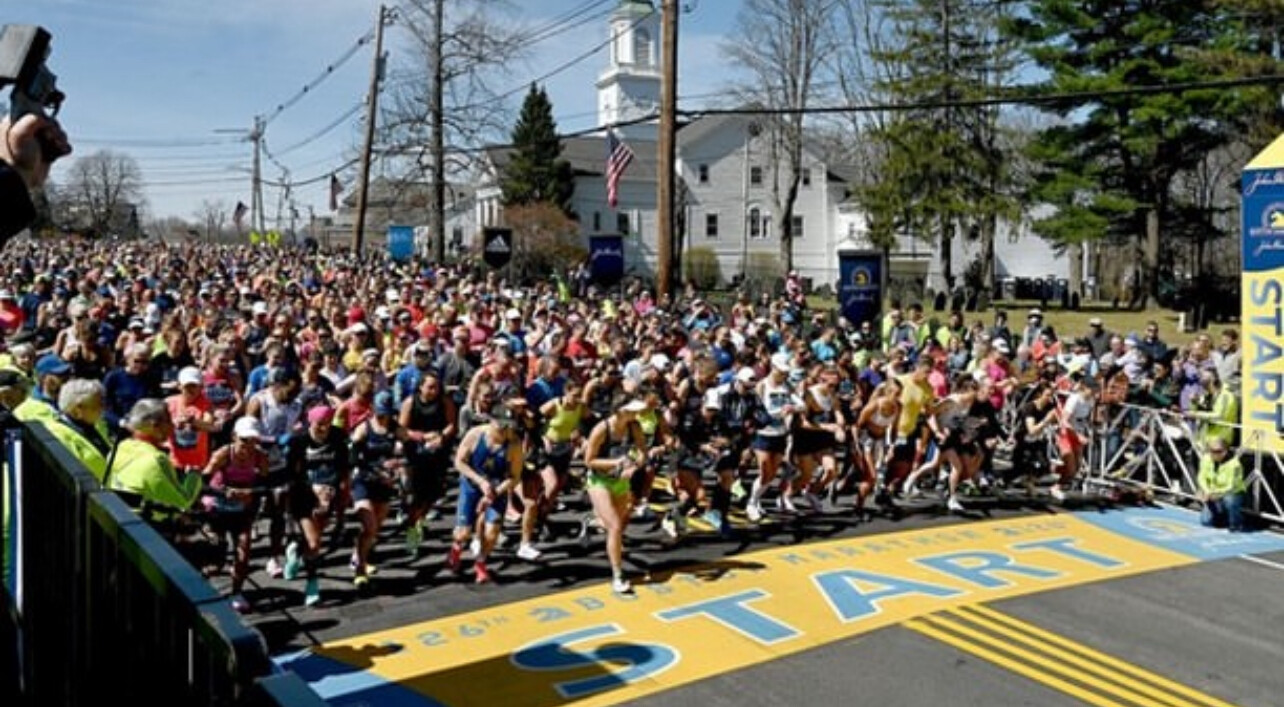
Known for his fearless tactics and high mileage, Albertson ran his personal best at the 2024 Chicago Marathon.
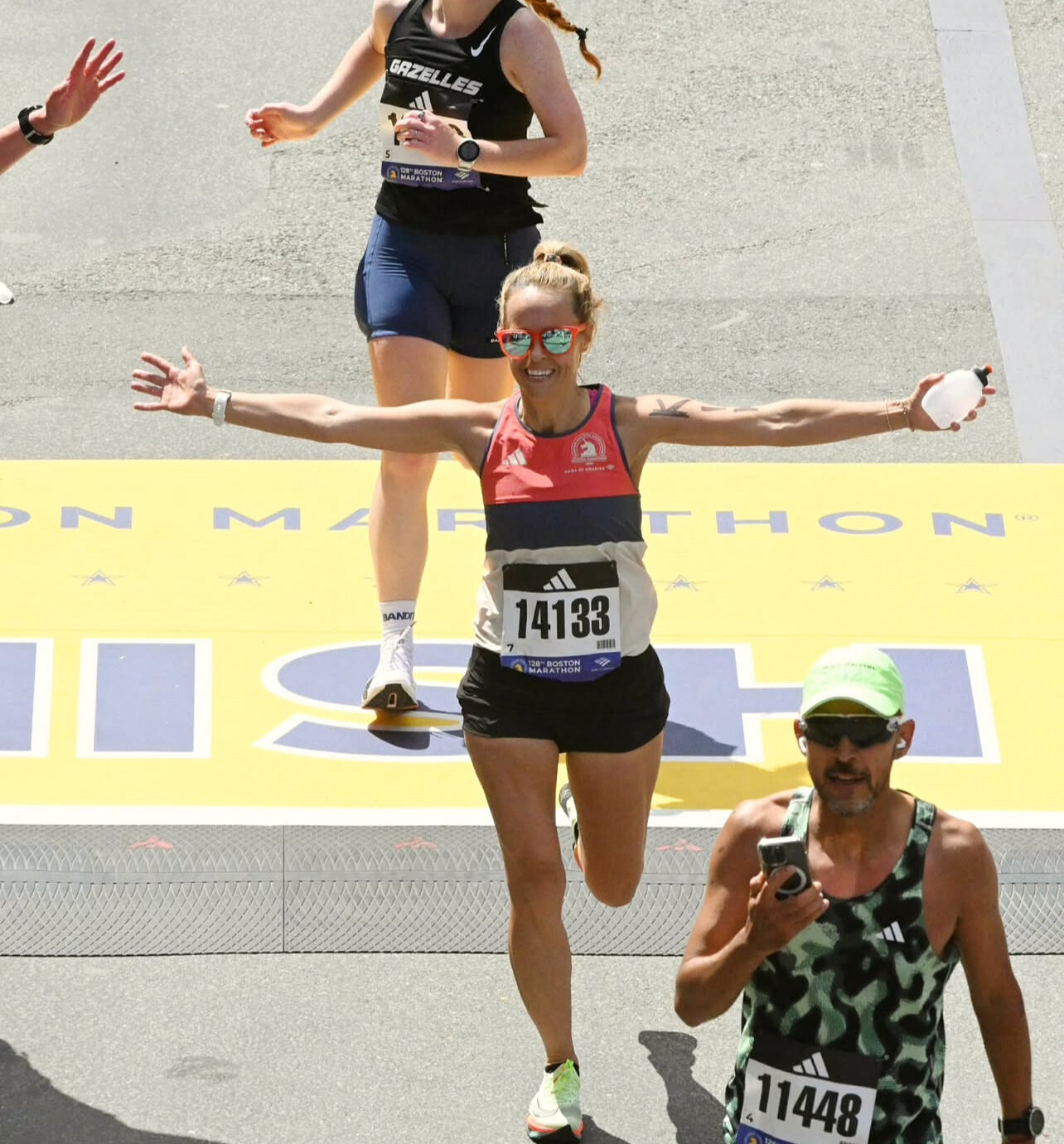
• Zach Panning – PB: 2:09:16
The 5th-place finisher at the U.S. Olympic Trials, Panning brings aggressive racing and consistent progress to Boston.
• Colin Bennie – PB: 2:09:38
The Massachusetts native and 2021 top American finisher returns with home course advantage and renewed focus.
Elite American Women
• Keira D’Amato – PB: 2:19:12
The former American record holder returns from injury with momentum and the experience to contend.
• Emma Bates – PB: 2:22:10
Bates was the top American at the 2024 Boston Marathon and continues to improve with every outing.
• Sara Hall – PB: 2:20:32
One of the most experienced American marathoners, Hall posted a 2:23:45 in Berlin last fall.
• Desiree Linden – PB: 2:22:38
The 2018 Boston champion returns for her 12th Boston start, a fan favorite with unmatched experience.
• Dakotah Popehn – PB: 2:24:40
Popehn was the top American finisher at the Paris Olympics and brings strong international credentials.
• Jess McClain – PB: 2:25:46
McClain placed fourth at the U.S. Trials and will be making her Boston debut as a rising star.
International Elite Field
Men’s Division:
• Sisay Lemma (ETH) – PB: 2:01:48
The defending champion and one of the fastest marathoners in history, Lemma seeks to repeat in Boston.
• John Korir (KEN) – PB: 2:02:44
The 2024 Chicago Marathon champion is a serious threat in any race he enters.
• Evans Chebet (KEN) – PB: 2:03:00
Boston champion in 2022 and 2023, Chebet looks to reclaim his title and join the three-time winners’ club.
Women’s Division:
• Amane Beriso (ETH) – PB: 2:14:58
The fifth-fastest woman in history is making her Boston debut.
• Yalemzerf Yehualaw (ETH) – PB: 2:16:52
Still just 25, Yehualaw adds tremendous firepower to the field.
• Hellen Obiri (KEN) – PB: 2:21:38
The two-time defending champion is chasing history with a potential third straight victory on Boylston Street.
Race Day Details
• Date: Monday, April 21, 2025
• Start Times:
• Wheelchair Division – 9:02 AM
• Handcycle & Duo Participants – 9:05 AM
• Elite Women – 9:32 AM
• Elite Men & Wave 1 – 10:00 AM
• Wave 2 – 10:25 AM
• Wave 3 – 10:50 AM
• Wave 4 – 11:15 AM
• Tracking & Coverage: Available through the B.A.A. Racing App with live updates, leaderboards, and interactive course maps.
“I’ve run over a thousand races in my life, and nothing compares to Boston,” says My Best Runs editor Bob Anderson. “When I ran 3:32:17 here at age 65, I felt like a rock star the entire way. The crowd was unbelievable—cheering, encouraging, lifting every runner forward. Boston isn’t just about the elites—it’s about the thousands of others out there chasing their dreams on the same course.”
With a deep American field and some of the fastest runners on the planet, the 2025 Boston Marathon is shaping up to be one of the most competitive in history. Whether it’s a breakout run or a hard-fought defense, fans can expect something unforgettable from this year’s race.
by Boris Baron
Login to leave a comment
Boston Marathon
Among the nation’s oldest athletic clubs, the B.A.A. was established in 1887, and, in 1896, more than half of the U.S. Olympic Team at the first modern games was composed of B.A.A. club members. The Olympic Games provided the inspiration for the first Boston Marathon, which culminated the B.A.A. Games on April 19, 1897. John J. McDermott emerged from a...
more...Boston Marathon 2025 Race Preview and Predictions - Can one of the Americans pull off an upset?
The 129th Boston Marathon is set for Monday, April 21, 2025 in just over a month, once again taking place on Patriots’ Day in Massachusetts. This year’s edition marks the first under the sponsorship of Bank of America, signaling a new chapter for the world’s oldest annual marathon. With an elite field packed with world-class runners and unpredictable spring weather, the race promises another thrilling showdown from Hopkinton to Boston.
Race Details & Course Overview
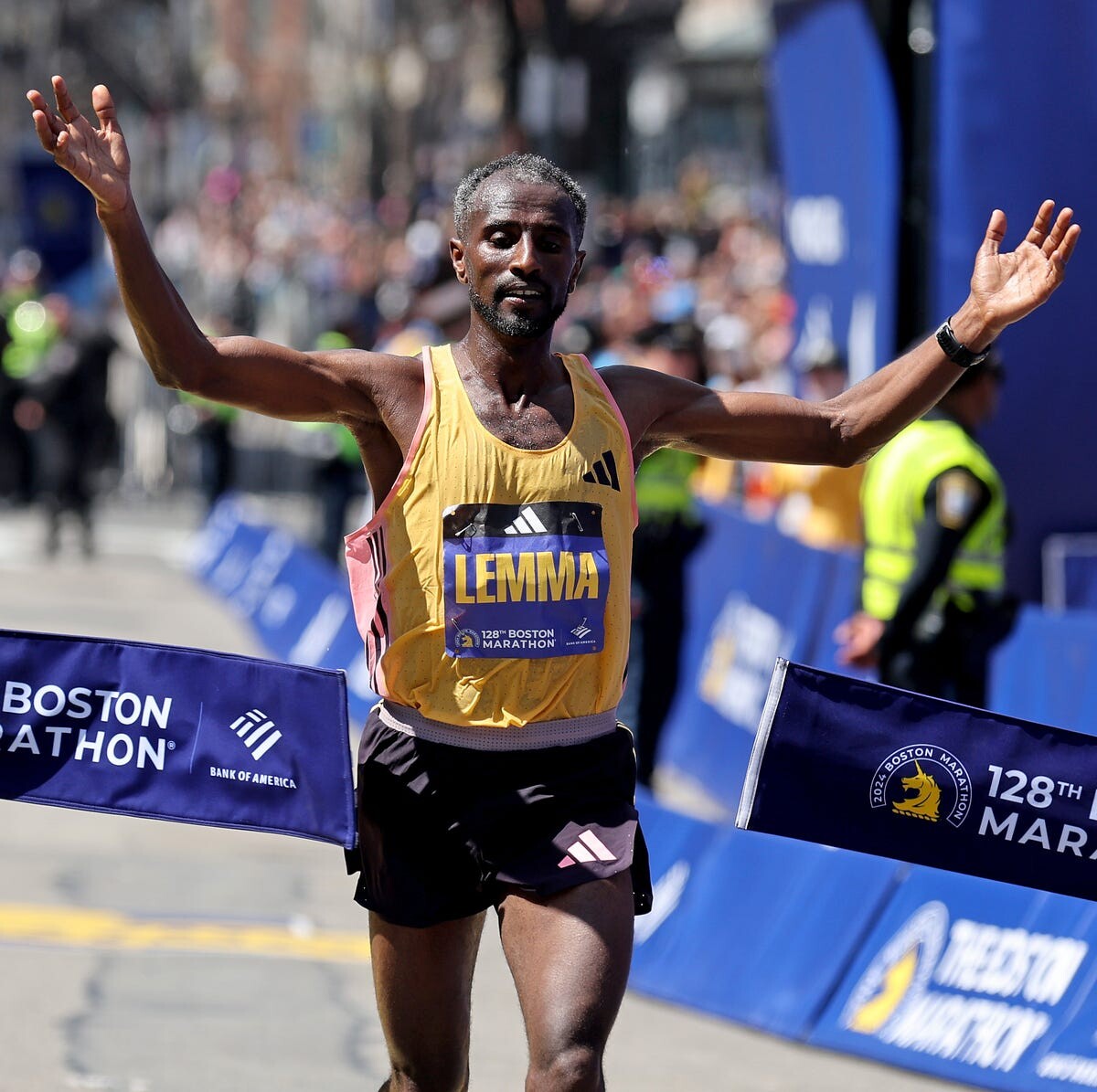
The Boston Marathon’s iconic point-to-point course spans 26.2 miles, starting in Hopkinton and ending on Boylston Street in Boston’s Copley Square. Runners will navigate rolling hills, including the challenging Newton Hills and the infamous Heartbreak Hill at mile 21. The course favors experienced runners who can manage both the early downhill sections and the later climbs.
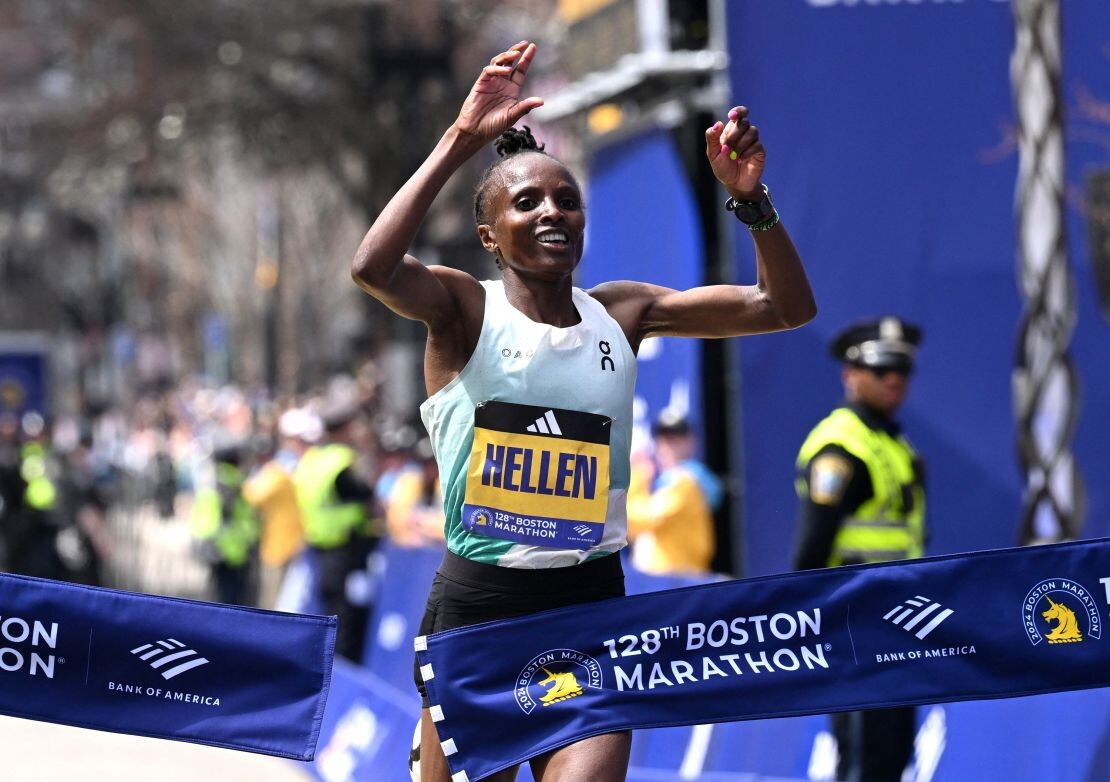
Weather will be a key factor, as New England’s spring climate is unpredictable. Ideal conditions for runners would be cool temperatures around 45–50°F with overcast skies and a tailwind, but past races have seen everything from heatwaves to freezing rain. Early forecasts suggest favorable conditions, but as always, runners must be prepared for anything.
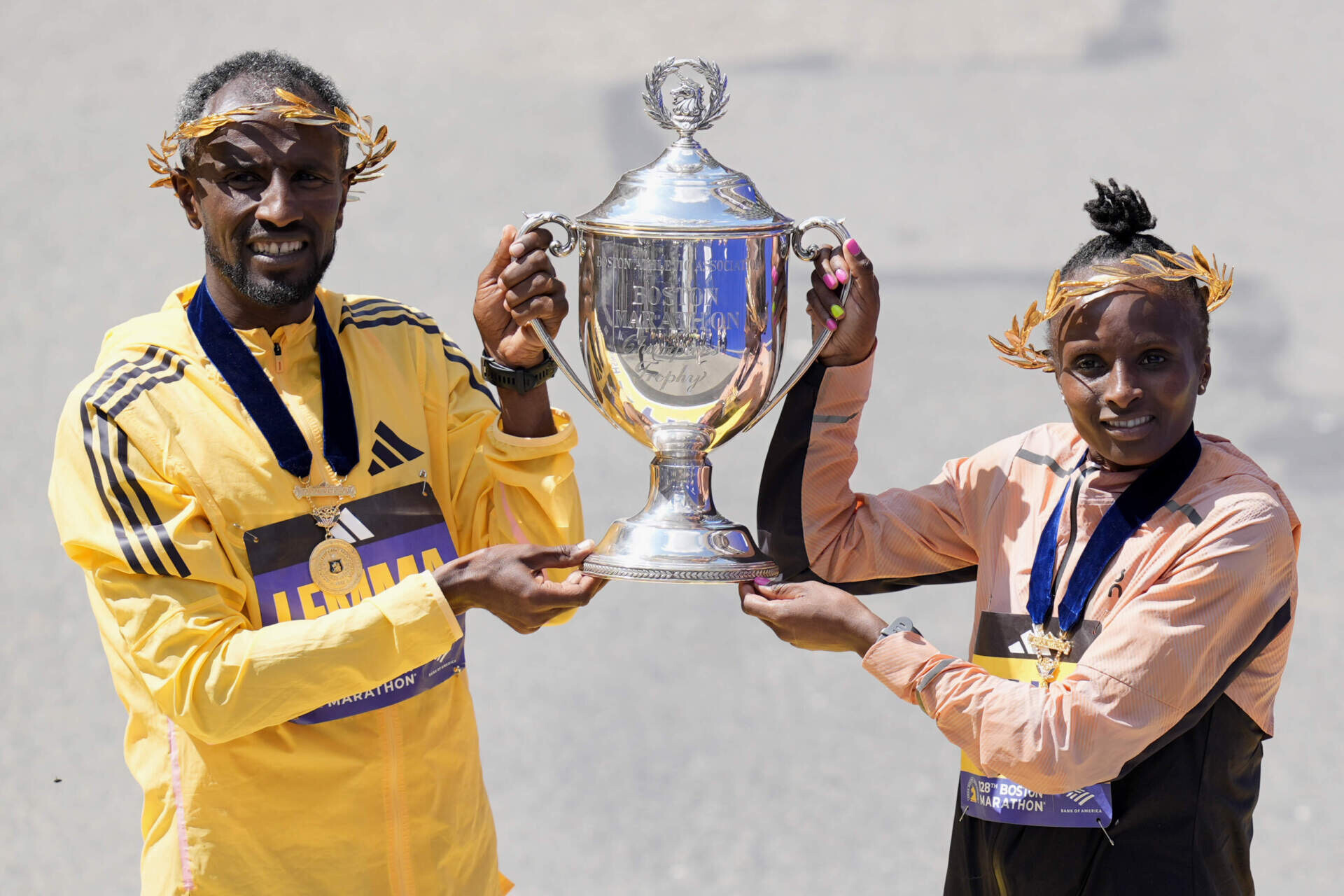
Men’s Elite Field
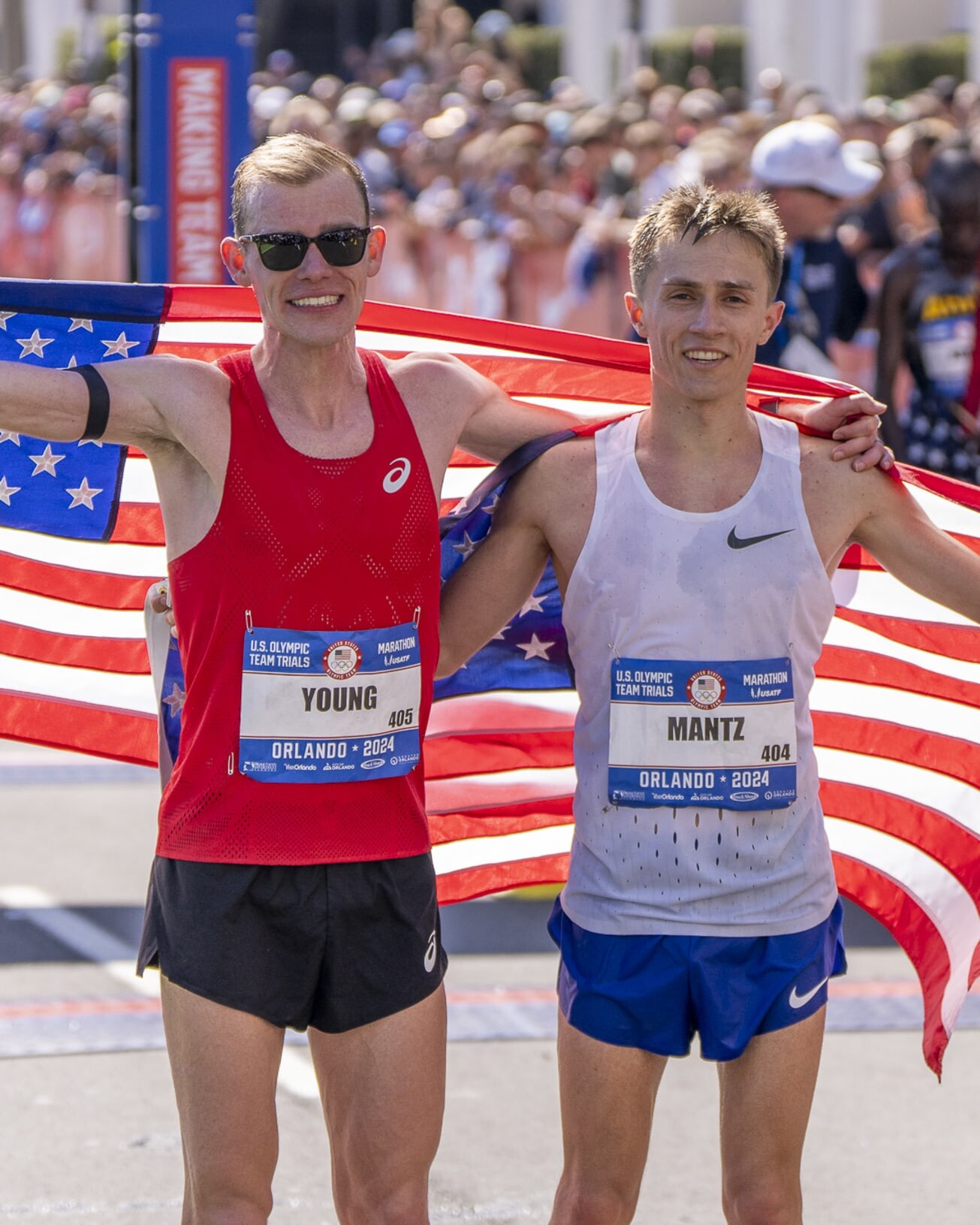
The men’s race features defending champion Sisay Lemma, who is aiming to retain his title after a dominant performance last year. Evans Chebet, the 2022 and 2023 champion, returns hungry to reclaim the crown. John Korir, fresh off a victory at the Chicago Marathon, brings world-class speed that could shake up the competition.
A strong American contingent is headlined by Conner Mantz and Clayton Young, both of whom finished in the top ten at the Olympic marathon. Mantz, in particular, has shown outstanding form, recently breaking the American half marathon record. CJ Albertson, a familiar name in Boston for his bold racing tactics, will also be in the mix, potentially pushing the early pace.
The race is expected to be tactical, with the Newton Hills playing a decisive role. If the pack remains tight through Heartbreak Hill, it could come down to a late-race battle along Boylston Street.
Women’s Elite Field
Hellen Obiri returns seeking a historic third consecutive Boston Marathon title, a feat not accomplished in over two decades. Known for her lethal finishing speed, Obiri has mastered the Boston course and will be the woman to beat.
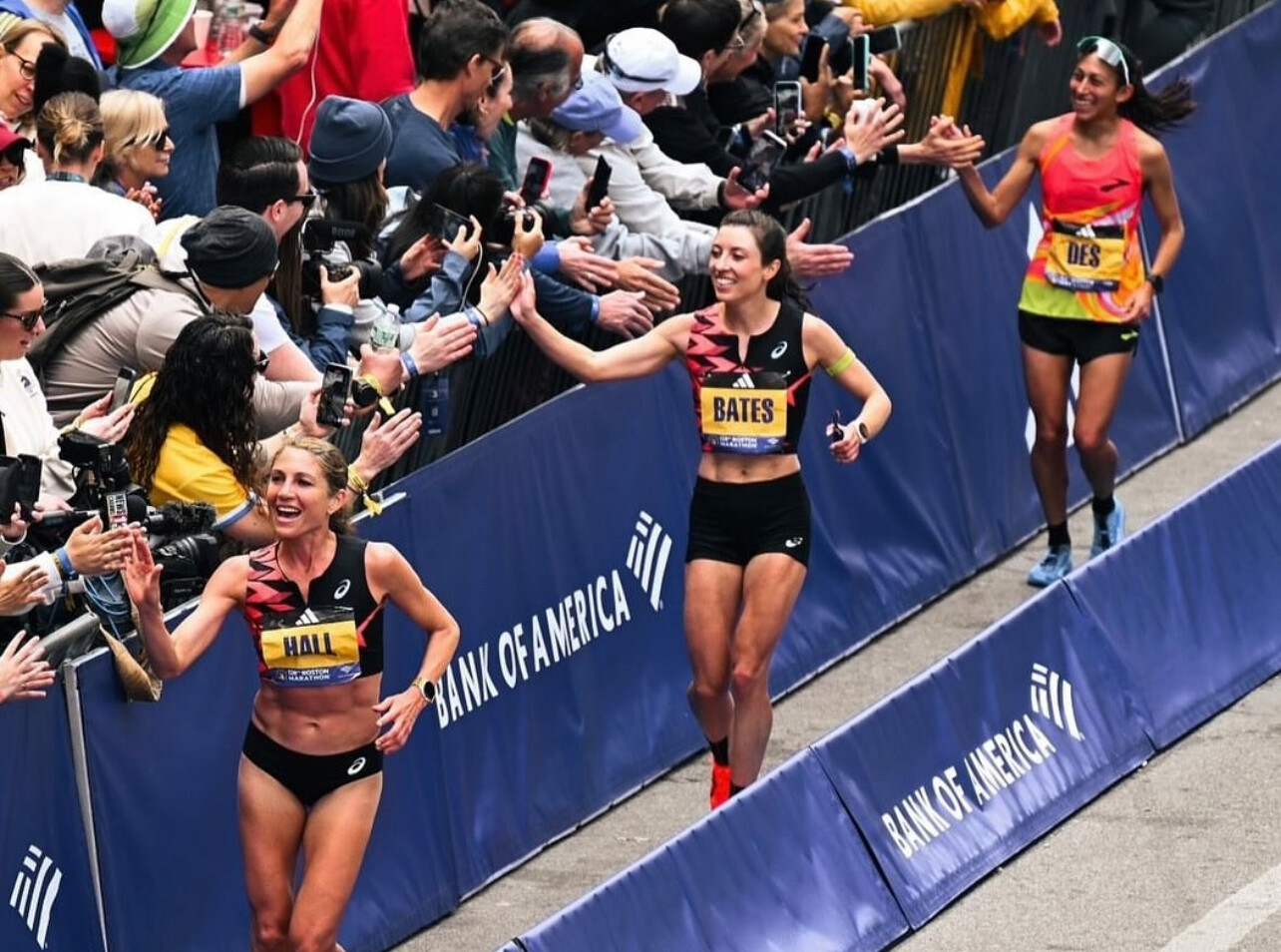
Challenging her will be Amane Beriso, the reigning world marathon champion, and Yalemzerf Yehualaw, a former London Marathon winner with sub-2:17 speed. Sharon Lokedi, last year’s runner-up, will also be in contention, having nearly edged out Obiri in a dramatic finish.
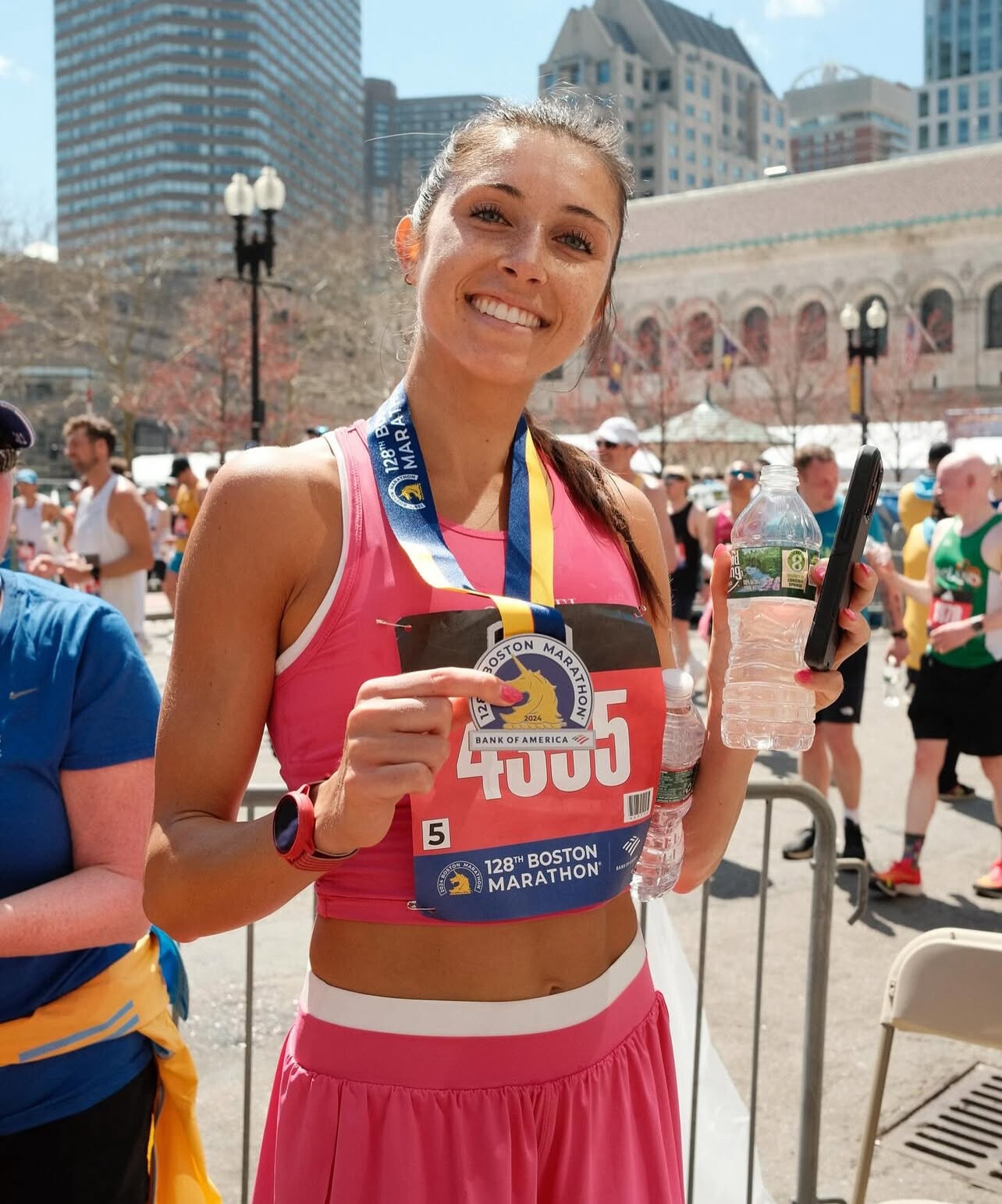
The American field is deep, with contenders including Sara Hall, Keira D’Amato, Emma Bates, and former champion Des Linden. While breaking into the top three will be a challenge, a top-five finish is within reach for the top U.S. women.
Predictions & Final Thoughts
The men’s race is expected to be a battle between the experienced champions and rising American stars. If the race is fast from the start, runners like Korir and Lemma may have the edge. However, if it becomes a strategic affair, Mantz and Young could position themselves for a breakthrough performance.
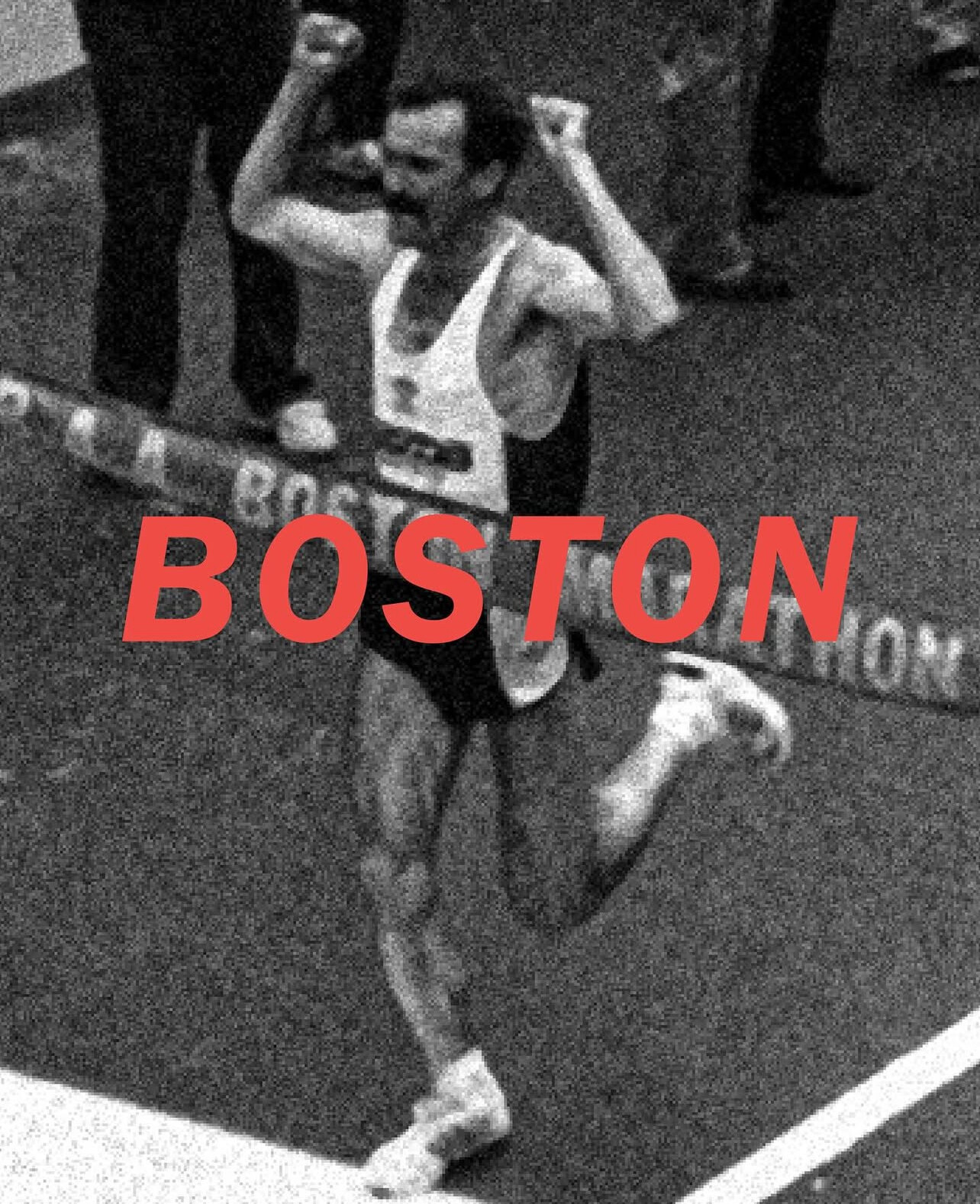
On the women’s side, Obiri’s experience and closing speed make her the favorite, but the depth of the field suggests another closely contested race. If Beriso or Yehualaw can push the pace early, it could disrupt Obiri’s plans for a late kick.
With a historic Patriots’ Day celebration and an elite field ready to compete, the 2025 Boston Marathon is shaping up to be an unforgettable race. Whether defending champions hold their ground or new winners emerge, all eyes will be on Boylston Street this April.
by Boris Baron
Login to leave a comment
Boston Marathon
Among the nation’s oldest athletic clubs, the B.A.A. was established in 1887, and, in 1896, more than half of the U.S. Olympic Team at the first modern games was composed of B.A.A. club members. The Olympic Games provided the inspiration for the first Boston Marathon, which culminated the B.A.A. Games on April 19, 1897. John J. McDermott emerged from a...
more...Sara Hall Reflects on the Path That Made Her Fall in Love with the Marathon
Sara Hall’s journey as one of America’s top marathoners has taken her across the world, from the high-altitude hills of Ethiopia to the historic streets of Boston. But one place remains especially meaningful—the rail trail to Shasta Dam in Redding, California.
Recently, Hall returned to this familiar path, sharing how it played a pivotal role in shaping her marathon career.
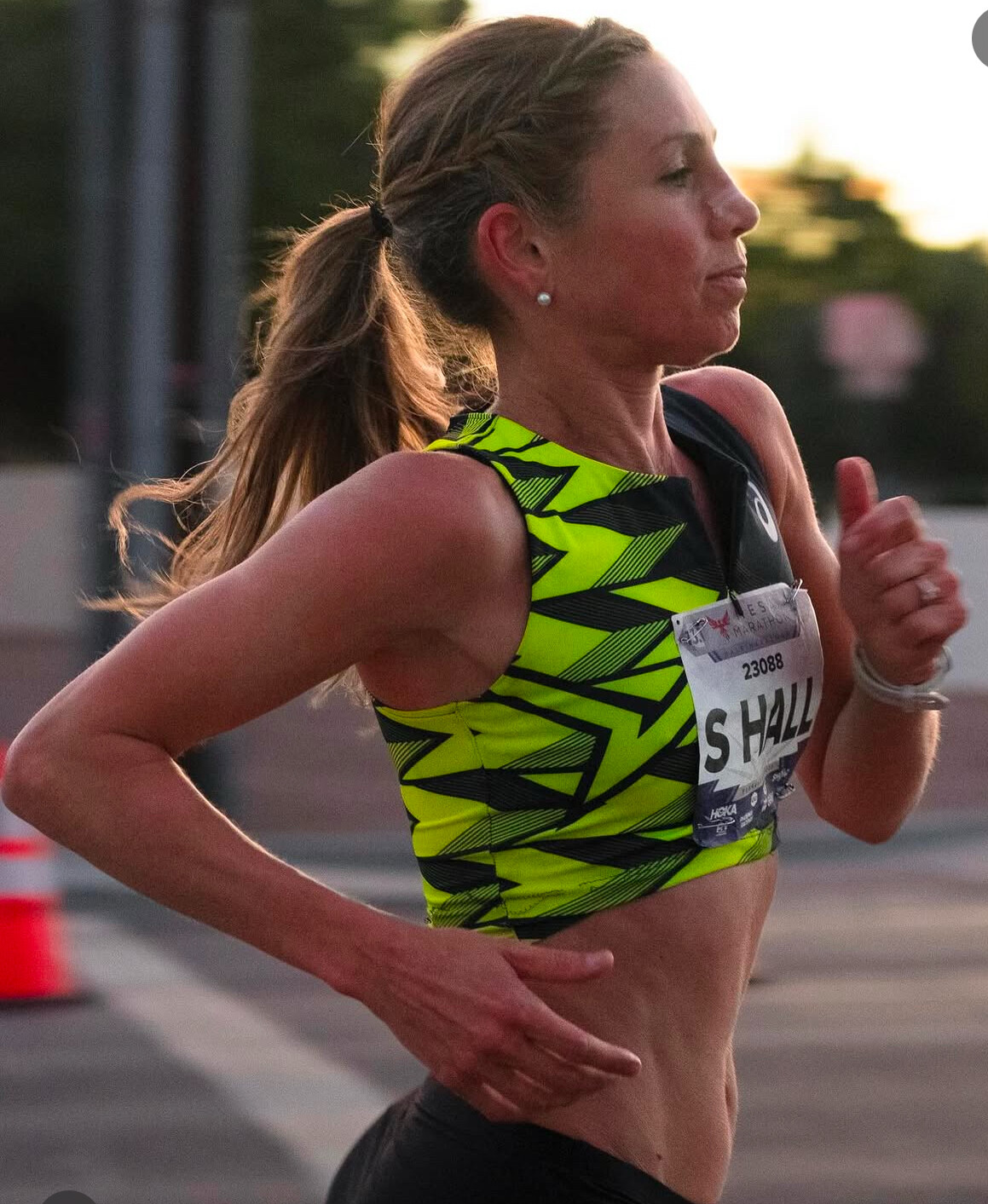
“Ryan & I moved to Redding in 2012 with months til the Olympic Trials, wanting more of God and to be a part of Bethel, but not knowing much about what it would be like to train here. This place far exceeded our expectations, with the most beautiful bike path in the world (rail trail up to Shasta Dam) and an endlessly positive training partner, Ben Keck.”
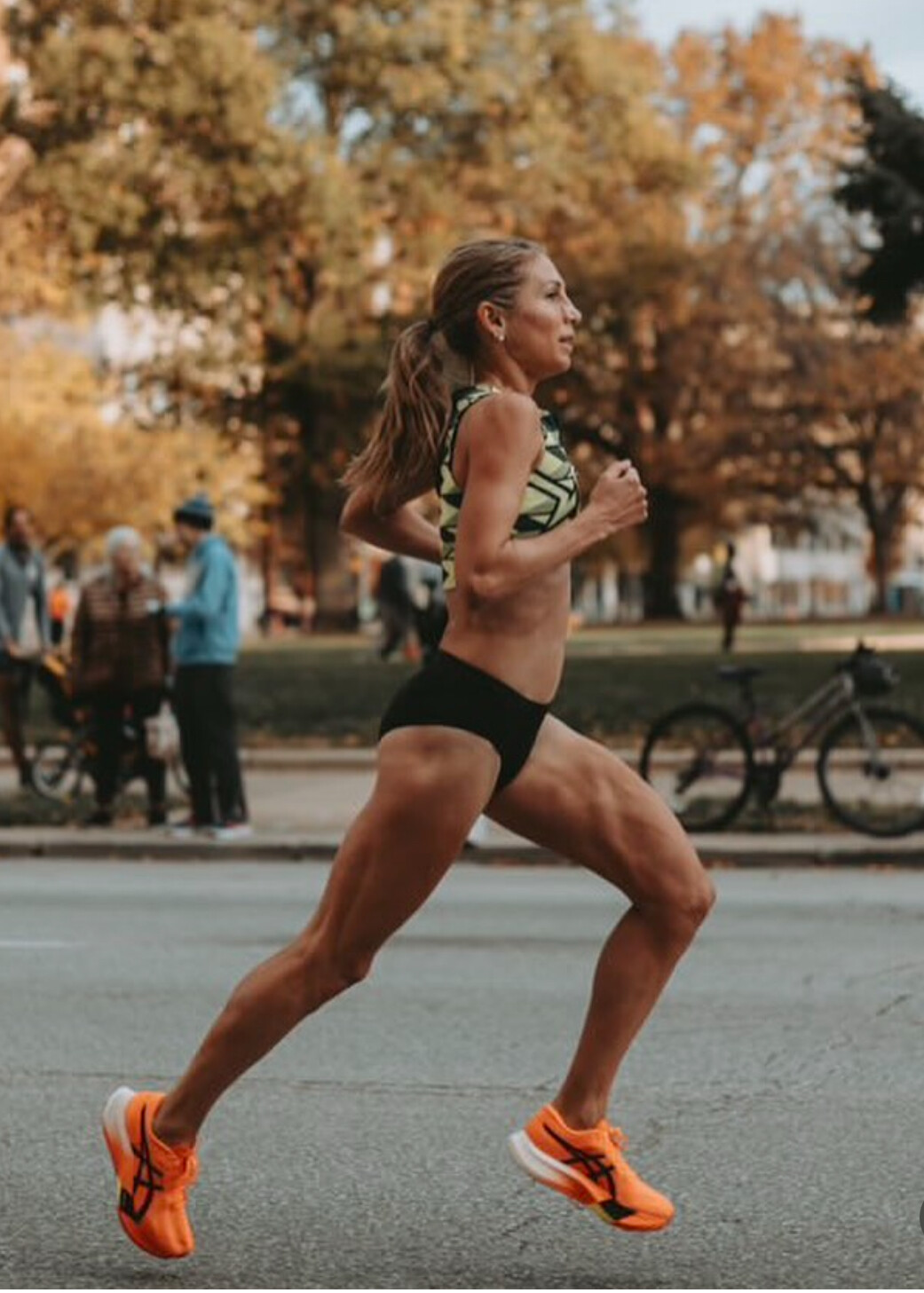
Reuniting with Keck for a long run, Hall logged over 1,000 feet of elevation gain without bike support—stashing bottles, ketones, and a ziplock of gummy peaches in her sports bra to fuel the effort. “Thinking of the people like Ben who have kept me enjoying the sport for so long when I could have easily hung it up—forever grateful,” she added.
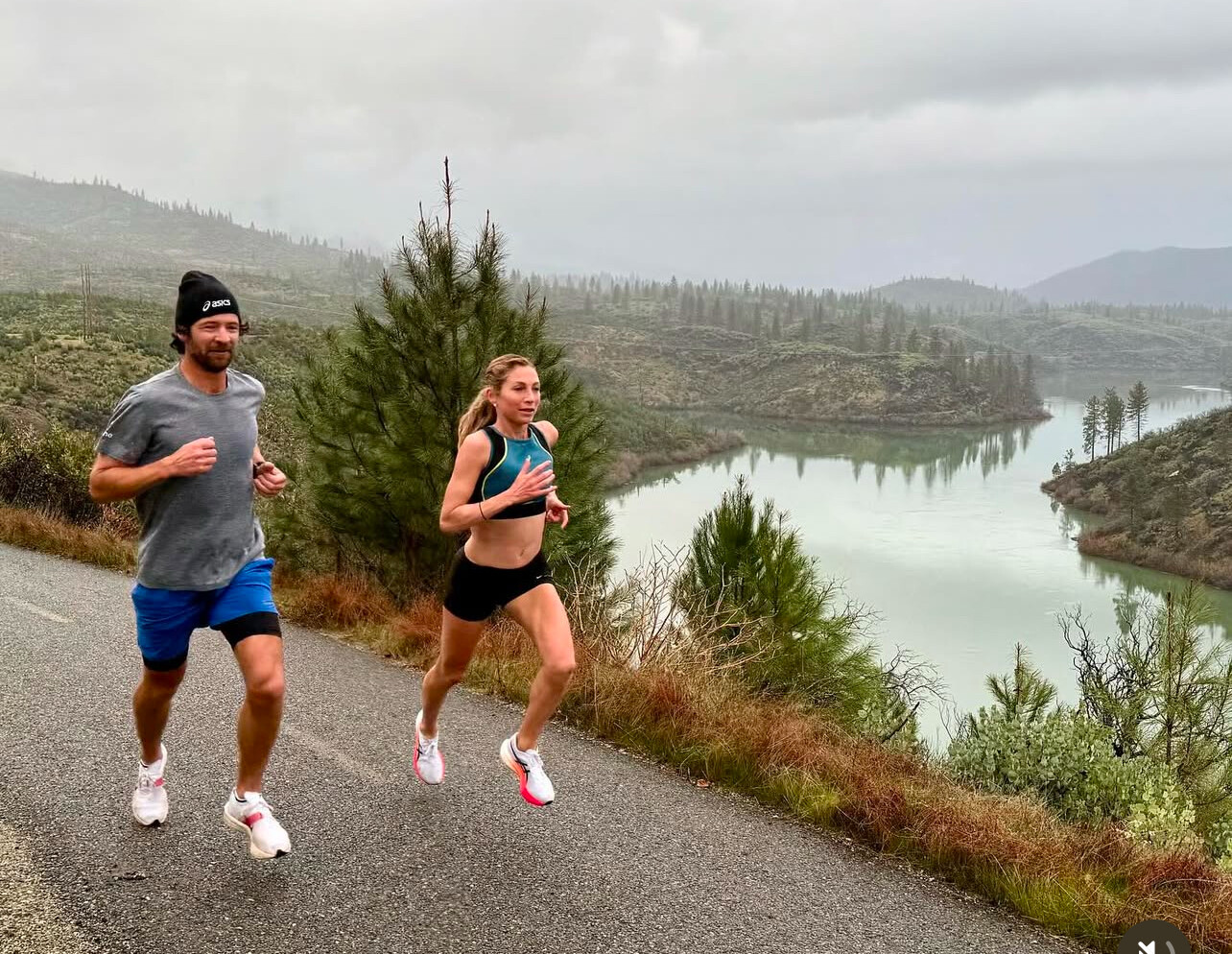
Now 41, Hall continues to defy expectations as she prepares for the next phase of her career. She will turn 42 just before the 2025 Boston Marathon, an event where she will once again test herself against the world’s best.
In December 2024, she set a new U.S. masters marathon record, running 2:23:45 at the Valencia Marathon, breaking her own previous record of 2:26:06. The performance reaffirmed her status as one of the fastest American women over 40, showing she is still improving and competing at the highest level.
Her journey to the marathon was not a direct one. A standout high school and collegiate runner, Hall won multiple state and NCAA titles before turning pro. She initially focused on shorter distances before successfully moving up to the marathon, setting a personal best of 2:20:32 at the 2020 Marathon Project—one of the fastest times ever recorded by an American woman.
Her latest masters record in Valencia secured her place at the top of the fastest American women over 40 list:
Fastest American Masters Women’s Marathon Performances
Sara Hall – 2:23:45 at age 41, 2024 Valencia Marathon
Desiree Linden – 2:27:35 at age 40, 2023 Chicago Marathon
Colleen De Reuck – 2:28:40 at age 40, 2004 Olympic Trials Marathon
Roberta Groner – 2:29:09 at age 41, 2019 Rotterdam Marathon
These performances highlight the longevity and competitiveness of elite American female marathoners, proving that success in the sport doesn’t have to fade with age.
As Hall continues her career, she remains focused on both competition and the relationships that have kept her inspired along the way. Whether she is training on the hills of Ethiopia, preparing for another major marathon, or revisiting the path that first fueled her love for the sport, one thing is certain—Sara Hall is far from finished.
by Boris Baron
Login to leave a comment
Hellen Obiri of Kenya will return to the Boston Marathon in April and attempt to win for the third time in a row.
In the race’s history, only four other women (Bobbi Gibb, Sara Mae Berman, Uta Pippig, and Fatuma Roba) have won three times a row, according to race organizers, who released the elite field today. The race is set for April 21.
Last year, Obiri broke the race open by covering the 24th mile in 4:41 and won in 2:22:37, 8 seconds ahead of her countrywoman Sharon Lokedi, who will also return to Boston.
Obiri, 35, trains in Boulder, Colorado, with the On Athletics Club, and she has been on the podium in five of the six marathons she has run. In addition to her two Boston titles, she won the New York City Marathon in 2023, finished second there in 2024, and won the Olympic bronze medal in Paris. (The only blemish on her marathon record was her sixth-place finish at her debut in New York in 2022.)
Obiri and Lokedi will be challenged by Amane Beriso and Yalemzerf Yehualaw of Ethiopia. Beriso has a personal best of 2:14:58 from the Valencia Marathon in 2022. She’s currently the fifth-fastest woman of all time.
Sisay Lemma of Ethiopia, the defending men’s champion, will also return to Boston. Lemma’s 2:01:48 from Valencia in 2023 makes him the fourth-fastest man in history.
Last year in Boston, Lemma got out to a large early lead, and the course record seemed almost certain to fall. But by the Newton hills, Lemma was feeling his hot early pace and slowed considerably. He held on to win in 2:06:17.
His challengers at the 2025 race will include Evans Chebet of Kenya, who has won the race twice (2022 and 2023) and was third in 2024. John Korir of Kenya, who won the 2024 Chicago Marathon in a fast 2:02:44, will also be back to race in Boston. He was fourth last year.
A Strong American Field
Many top Americans are entered into Boston. On the women’s side, they include Keira D’Amato, who briefly held the American record of 2:19:12 in 2022, and Sara Hall, who had a strong race at last fall’s Berlin Marathon, where she ran 2:23:45. She’ll turn 42 the week before the race.
D’Amato told Runner’s World in a text message that she is recovering from the injury in her left foot—stress reactions in her calcaneus and talus—that caused her to drop out of Chicago. “Hoping all the cross training has made me Boston Strong,” she wrote. “I’m building up conservatively to have a killer 2025.”
Olympians Dakotah Popehn and Des Lindenwill run (Linden for the 12th time), as will Emma Bates, the top American at Boston last year, Olympic Marathon Trials fourth-place finisher Jess McClain, and notables Sara Vaughn, Kellyn Taylor, and Lindsay Flanagan.
On the men’s side, Olympians and training partners Conner Mantz and Clayton Young, who finished eighth and ninth at the Games, respectively, will run Boston. They’ll be joined by CJ Albertson, who runs several fast marathons each year (five in 2024, including his PR of 2:08:17 in Chicago) and Zach Panning, who was fifth at the Olympic Marathon Trials.
by Runner’s World
Login to leave a comment
Boston Marathon
Among the nation’s oldest athletic clubs, the B.A.A. was established in 1887, and, in 1896, more than half of the U.S. Olympic Team at the first modern games was composed of B.A.A. club members. The Olympic Games provided the inspiration for the first Boston Marathon, which culminated the B.A.A. Games on April 19, 1897. John J. McDermott emerged from a...
more...Sara Hall Smashes Her Own American Masters Record
In her fourth marathon of 2024, Sara Hall finished 10th at the Valencia Marathon in Spain in 2:23:45. Hall, 41, shattered her own U.S. masters record, 2:26:06, which she set at the Olympic Marathon Trials in February.
The race was won by Megertu Alemu of Ethiopia in 2:16:49.
Hall averaged 5:29 per mile pace in Valencia. It was her best marathon since 2022, when she ran 2:22:10 at the World Championships in Eugene, Oregon, and placed fifth.
Hall has been frequent racer throughout her career, not needing much time to recover between races. Her entry into Valencia was a last-minute addition, after she raced in Chicago eight weeks earlier, and the race did not go according to plan. (Hall was 18th in 2:30:12.) She also ran Boston this year, finishing 15th in 2:27:58.
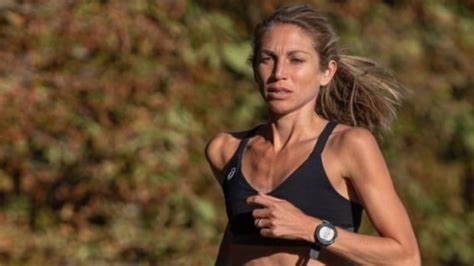
She posted to her Instagram account after the race.
“After a long stretch of not feeling like myself since Boston, it felt so good to have my normal fight out there,” Hall wrote, in part. “Applied the lessons I learned from Chicago, handled the very similar conditions much better. Chose to believe in myself even when my confidence had been rattled over and over. What a dream to do this four times this year.”
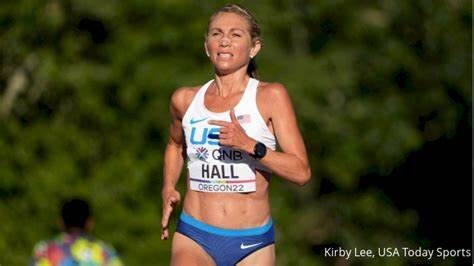
Hall elaborated in a text message to Runner’s World that she missed several bottles in Chicago—she fumbled a couple, and others she didn’t drink much out of—and became dehydrated in the humid conditions. “This time just was much more intentional to consume fluids even if I didn’t feel like I needed it,” she said.
She also increased her electrolytes and said she went out more conservatively than she would normally run and did at Chicago. Hall ran half spits that were almost even—1:11:40 and 1:12:05.
Hall’s PR is 2:20:32 from the Marathon Project in Chandler, Arizona, a one-time event set up for elite runners during the pandemic. That PR puts her fifth on the U.S. all-time list, behind Emily Sisson, Keira D’Amato, Betsy Saina, and Deena Kastor.
Her career is notable for its duration. Hall has appeared in every Olympic Trials since 2004, either on the track or in the marathon, or both. She is coached by her husband, Ryan Hall, who is third on the U.S. all-time list for men’s marathoners.
Hall was not the only record setter in Valencia. Roberta Groner, 46, who represented the U.S. at the 2019 world championships in Doha, Qatar, where she finished sixth, ran 2:29:32, setting an American record for the 45–49 age group.
Groner’s record should be safe for at least the next three years—or until Hall turns 45 in April 2028.
by Sarah Lorge Butler
Login to leave a comment
VALENCIA TRINIDAD ALFONSO
The Trinidad Alfonso EDP Valencia Marathon is held annually in the historic city of Valencia which, with its entirely flat circuit and perfect November temperature, averaging between 12-17 degrees, represents the ideal setting for hosting such a long-distance sporting challenge. This, coupled with the most incomparable of settings, makes the Valencia Marathon, Valencia, one of the most important events in...
more...Marathon world lead for debutant Sawe in Valencia
Kenya’s Sabastian Sawe set a world lead on his marathon debut, while Ethiopia’s Megertu Alemu also captured a solid victory at the Valencia Marathon Trinidad Alfonso – a World Athletics Elite Platinum Label event – on Sunday (1).
Sawe’s winning time was 2:02:05, just 12 seconds off the fastest ever debut set by his compatriot Kelvin Kiptum two years ago and a mark that moves him to fifth on the world all-time list, while Alemu ran 2:16:49, just 15 seconds outside her lifetime best.

The men’s event had been billed as a thrilling showdown between experienced specialists such as Sisay Lemma, Deresa Geleta and Kenenisa Bekele, versus some promising debutants including Sawe and Hillary Kipkoech. Perfectly paced by a trio of pacemakers – Kenya’s Samwel Mailu, Erick Sang and Vincent Nyageo – the leading men went through the opening 5km in 14:31. That cadence was maintained until the leading pack reached the 10km checkpoint in 29:04 and 15km in 43:39. By then, nine athletes remained at the helm including all the favourites, Geleta and Lemma running closest to the pacemakers.
The halfway mark was passed in 1:01:17, 42 seconds slower than last year’s split when Lemma set the course record of 2:01:48. Unlike last year, when he performed conservatively over the first half, Bekele was running quite bravely as the 42-year-old travelled in third or fourth place. But some two kilometres later, the multiple Olympic and world champion began to lose ground and by the 28th kilometre the relentless 2:55/km rhythm whittled down the leading pack to five: Kenya’s Mateiko and Sawe plus Ethiopia’s Geleta, Lemma and Birhanu Legese.
Once the last pacemaker dropped out with the clock reading 1:33, Lemma began to falter to lose any chance of retaining his title. At the front, Mateiko and Geleta broke away from Sawe and Legese, those pairs separated by 30 metres inside the 32nd kilometre. It was Mateiko, who was not able to finish the Chicago 2023 and London 2024 marathons, who seemed to decide the victory was in his favour shortly afterwards as he became a lonesome leader. The three-time Valencia half-marathon podium place finisher had built a five-second gap on Sawe and Geleta, while Legese could not maintain that pace and travelled in fourth place way back.
Mateiko’s getaway proved to be short-lived as he was reeled in by Sawe and Geleta at the 36th kilometre, when the predicted final time remained at 2:02:35. It was then that the eventual winner found another gear to speed away easily from Mateiko and Geleta, who finished fifth at the Paris Olympics. Sawe, who has completed all his nine half marathons under the 60-minute barrier, upped his pace to the 2:48/2:50 range to gradually extend his lead. By the 40km point he clocked 1:55:42, 20 seconds ahead of Geleta, while a tired Mateiko travelled another 35 seconds in arrears.
Sawe showed a magnificent display of solo running over the closing kilometres, going faster and faster as the end was approaching to finally finish unopposed in a world leading performance of 2:02:05, including a 14:06 closing five kilometres.
Geleta, the Seville Marathon winner, improved his career best to 2:02:38 for second place, while Mateiko slowed dramatically over the final stages but still managed to finish the distance at the third time of asking in 2:04:24, holding off a late challenge from Tanzania’s 2017 world bronze medallist Alphonce Simbu.
Simbu achieved a perfectly balanced two halves (1:02:13/1:02:25) to finish fourth in a PB of 2:04:38, two seconds clear of the 42-year-old Swiss athlete Tadesse Abraham, who clocked a lifetime best and national record of 2:04:40 for fifth. In a race of an incredible depth, 10 men ducked under the 2:05 milestone while Bekele dropped out shortly after the 31st kilometre.
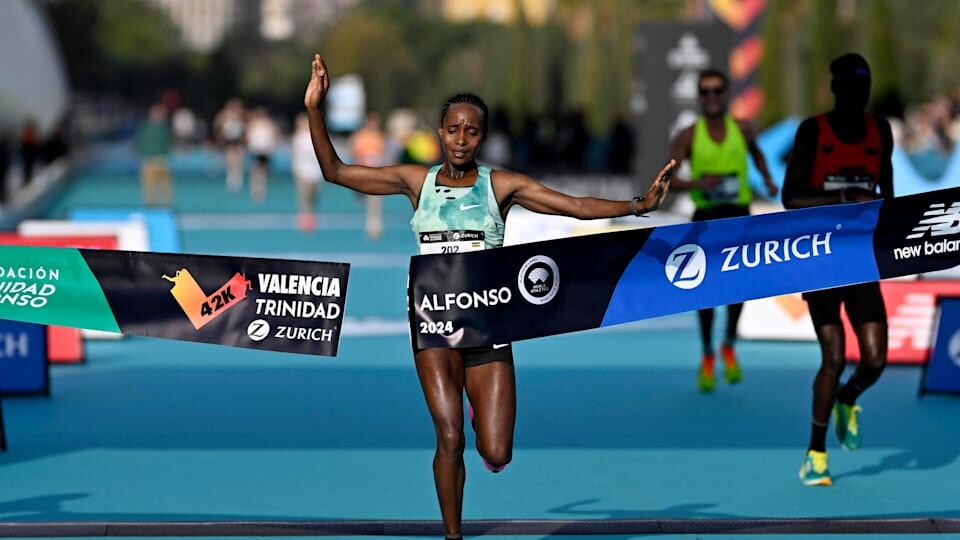
Sawe, the world half marathon champion, has won seven out of his nine half marathon appearances, topped by a 58:02 time in Rome in 2022. His two defeats came in Valencia, so Sunday’s performance marks his first victory in the city.
The winner, whose two halves were timed at 1:01:18 and 1:00:47, said: “Honestly, I had built up very good for this debut and was quite confident of doing well. It’s an amazing day, I’m so happy to be here and win in Valencia, which is so beautiful.
“I was used to running the half marathon event, I was comfortable during the first half, then I was close to the helm of the race and I thought I could go faster and I just did it. I dedicate this win to the victims of the Valencia floods, I pray for them.”
Alemu confirms she is the strongest
Following the withdrawal of Ethiopia’s course record-holder Amane Beriso due to a stress fracture, the women’s contest kicked off at the scheduled 3:12 rhythm on an attempt to lower the current 2:14:58 course record set in 2022. The opening five and 10 kilometres were covered in 16:02 and 32:03, respectively, and by then all the favourites stayed in the leading pack, with Alemu joined by her compatriot Tiruye Mesfin, Uganda’s Stella Chesang and Kenya’s Evaline Chirchir. The clock read 47:56 for the 15th kilometre and that cadence proved to be too quick for Mesfin and Chirchir, that pair running 18 seconds in arrears by then.
Running alongside lots of male athletes, Alemu and the Paris Olympics eighth-place finisher Chesang went through halfway in 1:07:15, well on schedule to break Beriso’s record, with Mesfin and Chirchir some 300 metres back timed at 1:08:06 but quick enough to set respective career bests. Chesang’s resistance came to an end some 1:11 into the race when she just could not stay with Alemu’s pace. The Ethiopian managed to maintain her speed until the 30th kilometre, which she reached in 1:35:55, but from then on the 27-year-old dropped her rhythm as she timed 16:48 for the following two five-kilometre sections (30-40km) and her chances of a course record clearly vanished.
Even so, Alemu’s win was never in jeopardy as she strengthened gradually her advantage on Chesang to 40 seconds by the 30th kilometre and a massive 1:21 at the 40km checkpoint, while Mesfin easily got rid of Chirchir just before reaching the 25th kilometre. At the tape, Alemu posted her second quickest ever time thanks to a 2:16:49 clocking, while the runner-up Chesang broke the 2:20 barrier for the first time in a national record of 2:18:26. Mesfin completed the classy podium, also improving her lifetime best by 12 seconds with 2:18:35.
“I know I can do a better mark but I’m happy to win today,” said Alemu. “Between 35 and 40 kilometres I wasn’t feeling good, so I decided to reduced my rhythm. At the finish line, all the people were clapping and that was really special. I can feel today it’s a different day for Valencia.”
It is only in recent weeks that event organisers were able to confirm that the race would go ahead. At the end of October, the province of Valencia was hit by extreme floods, claiming the lives of 229 people. The natural disaster lasted for more than two weeks, causing substantial damage in the area. Organisers confirmed that all the proceeds from the sponsors, the organisation’s own funds and the runners will be donated to one or more projects for the reconstruction of the affected areas.
Leading results
Women1 Megertu Alemu (ETH) 2:16:492 Stella Chesang (UGA) 2:18:263 Tiruye Mesfin (ETH) 2:18:354 Evaline Chirchir (KEN) 2:20:335 Majida Maayouf (ESP) 2:21:436 Chimdesa Kumsa (ETH) 2:21:547 Laura Luengo (ESP) 2:22:318 Isobel Batt-Doyle (AUS) 2:22:599 Moira Stewartova (CZE) 2:23:4410 Sara Hall (USA) 2:23:45
Men1 Sabastian Sawe (KEN) 2:02:052 Deresa Geleta (ETH) 2:02:383 Daniel Mateiko (KEN) 2:04:244 Alphonce Simbu (TAN) 2:04:385 Tadesse Abraham (SUI) 2:04:406 Chimdessa Debele (ETH) 2:04:447 Maru Teferi (ISR) 2:04:458 Hillary Kipkoech (KEN) 2:04:459 Samuel Fitwi (GER) 2:04:5610 Sisay Lemma (ETH) 2:04:59
by World Athletics
Login to leave a comment
VALENCIA TRINIDAD ALFONSO
The Trinidad Alfonso EDP Valencia Marathon is held annually in the historic city of Valencia which, with its entirely flat circuit and perfect November temperature, averaging between 12-17 degrees, represents the ideal setting for hosting such a long-distance sporting challenge. This, coupled with the most incomparable of settings, makes the Valencia Marathon, Valencia, one of the most important events in...
more...Kenenisa Bekele and Alemu Megertu lead Valencia line-ups
The Spanish city hosts star-studded fields, with athletes hoping to run extremely quick times on the traditionally fast course.
Some of the greatest marathon runners in the world will once again descend on Valencia on Sunday (December 1), just two months on from the horrific floods that devastated the region.
Given the severity of the damage on Valencia – it saw two months of rain in as many days at the end of October – there was uncertainty about whether the event would even take place.
Organisers decided that the Valencia Marathon would go ahead in the end, with a moment of remembrance occurring before the start of the elite races.
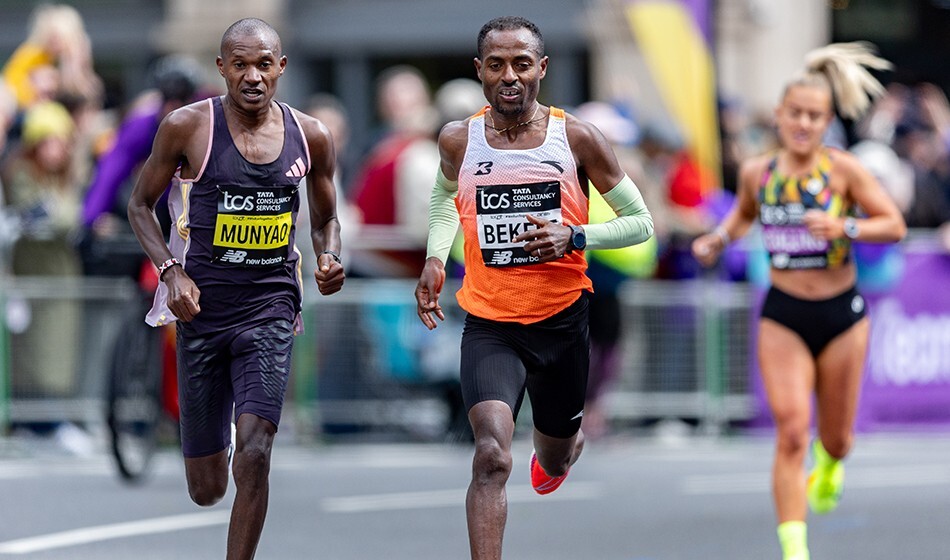
“It will be a hug to this wounded city and a promise of recovery, a moment in which sport becomes hope and help for those who need it most,” organisers said.
“This year, the record we want to beat is that of solidarity, the record of a marathon that will remind each one of us of the power of being together. The immense strength of the collective as a society, and of sport, as a vehicle for reconstruction and recovery.
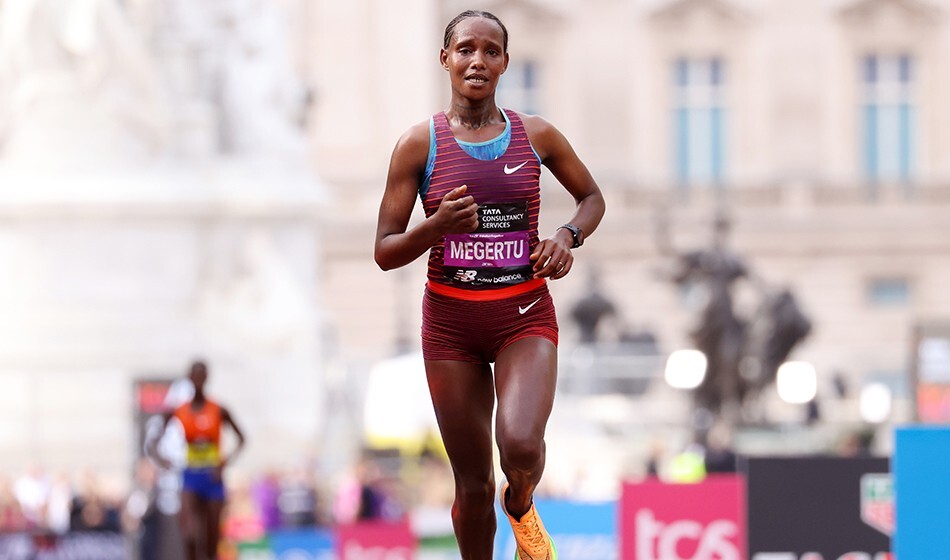
“We want that Valencia Marathon, your race, be a symbol of support for every family that has suffered, for every street and every corner of Valencia that is in the process of reconstruction.”
People lining the streets can look forward to watching some scintillating action, with a myriad of stars taking to the streets of the Spanish city.
A stacked men’s field is led by Kenenisa Bekele and Sisay Lemma.
Bekele, a triple Olympic and five-time world track champion, is the third fastest marathon runner in history, with his personal best of 2:01:41 set back in Berlin five years ago.
The 42-year-old also created in history at last year’s Valencia Marathon, after he became the first athlete aged over 40 to run a sub-2:05 marathon, clocking 2:04:19.
At this year’s London Marathon, Bekele lowered that mark by four seconds, before going on to finish 39th for Ethiopia in the Olympic marathon in Paris.
On paper, Lemma – the reigning champion in Valencia – is the one to beat once again.
Last year, the 33-year-old clocked 2:01:48 in his victory, going fourth on the all-time list over 26.2 miles behind Bekele, Eliud Kipchoge and the late Kelvin Kiptum.
Lemma also secured the Boston marathon crown back in March and is a two-time major marathon champion, after his victory in London three years ago.
The athlete who might be most likely to challenge Lemma is Sabastian Sawe, who is the world half-marathon champion and making his debut over 26.2 miles in Valencia.
The Kenyan’s first ever marathon carries a lot of anticipation and expectation, given the 28-year-old’s personal best in the half-marathon is a blistering 58:05, which he set in Copenhagen back in September.
Double Tokyo Marathon champion Birhanu Legese and the 2021 Berlin Marathon winner Guye Adola will also be ones to watch.
The British challenge is led by Ross Braden, who boasts a personal best of 2:14:32 from London two years ago and has clocked 2:19:49 this season. Dan Nash and Norman Shreeve are also among the British men in action.
Expect a pulsating battle in the women’s field, with Ethiopian Megertu Alemu the stand-out name, following the withdrawal of her compatriot Amane Beriso through injury.
Alemu, who’s placed second and third at the London Marathon in the last two years respectively, has a best of 2:16:34, which has her 14th on the all-time list.
You should also be aware of Hiwot Gebrekidan and Tiruye Mesfin, who are the second and third quickest athletes in the women’s field, with respective bests of 2:17:59 and 2:18:47.
Sara Hall flies the flag for the US and goes into Valencia off the back of fifth and 15th place finishes at the US Olympic Marathon trials and Boston.
Clara Evans will be hoping to improve her PB of 2:25:01, which was set in Valencia last year, after finishing top British woman at the Olympics with 46th place in Paris.
Evans is fresh from setting a Welsh half-marathon record of 69:00 in Valencia too.
She is joined by fellow Brits Becky Briggs and Alice Wright among others.
Ireland’s Fionnuala McCormack finishes off a spectacular season in the Spanish City, with the 40-year-old having finished 28th in the Olympic marathon – her fourth Games – in Paris.
Another fascinating storyline is that of Alice Braham, who is aiming to get near her personal best of 2:35:20 from 2008.
The 48-year-old became the oldest British female to run a marathon in under 2:40 in Berlin, clocking an incredible 2:39:42 on the streets of the German capital.
Braham recently spoke exclusively with AW, opening up about how she got into running, overcoming adversity and her top tips for others over 26.2 miles.
by Tim Adams
Login to leave a comment
VALENCIA TRINIDAD ALFONSO
The Trinidad Alfonso EDP Valencia Marathon is held annually in the historic city of Valencia which, with its entirely flat circuit and perfect November temperature, averaging between 12-17 degrees, represents the ideal setting for hosting such a long-distance sporting challenge. This, coupled with the most incomparable of settings, makes the Valencia Marathon, Valencia, one of the most important events in...
more...2024 Valencia Marathon Elite Fields Announced: Sisay Lemma, Kenenisa Bekele and Amane Beriso Headline
Race organizers for the Valencia Marathon have announced the elite fields for the 2024 edition of the race on Dec. 1.
The field is headlined by 2024 Boston Marathon champion Sisay Lemma returning from injury after withdrawing from the Paris Olympics. He will be challenged by his compatriot and all-time great Kenenisa Bekele, who finished second in April’s London Marathon and 39th at the Paris Olympics at 42 years old.
Kenya’s Sebastian Sawe, who boasts a half marathon personal best of 58:05, and Daniel Mateiko, who has also run 58:17 for the half, are the most intriguing debutants.
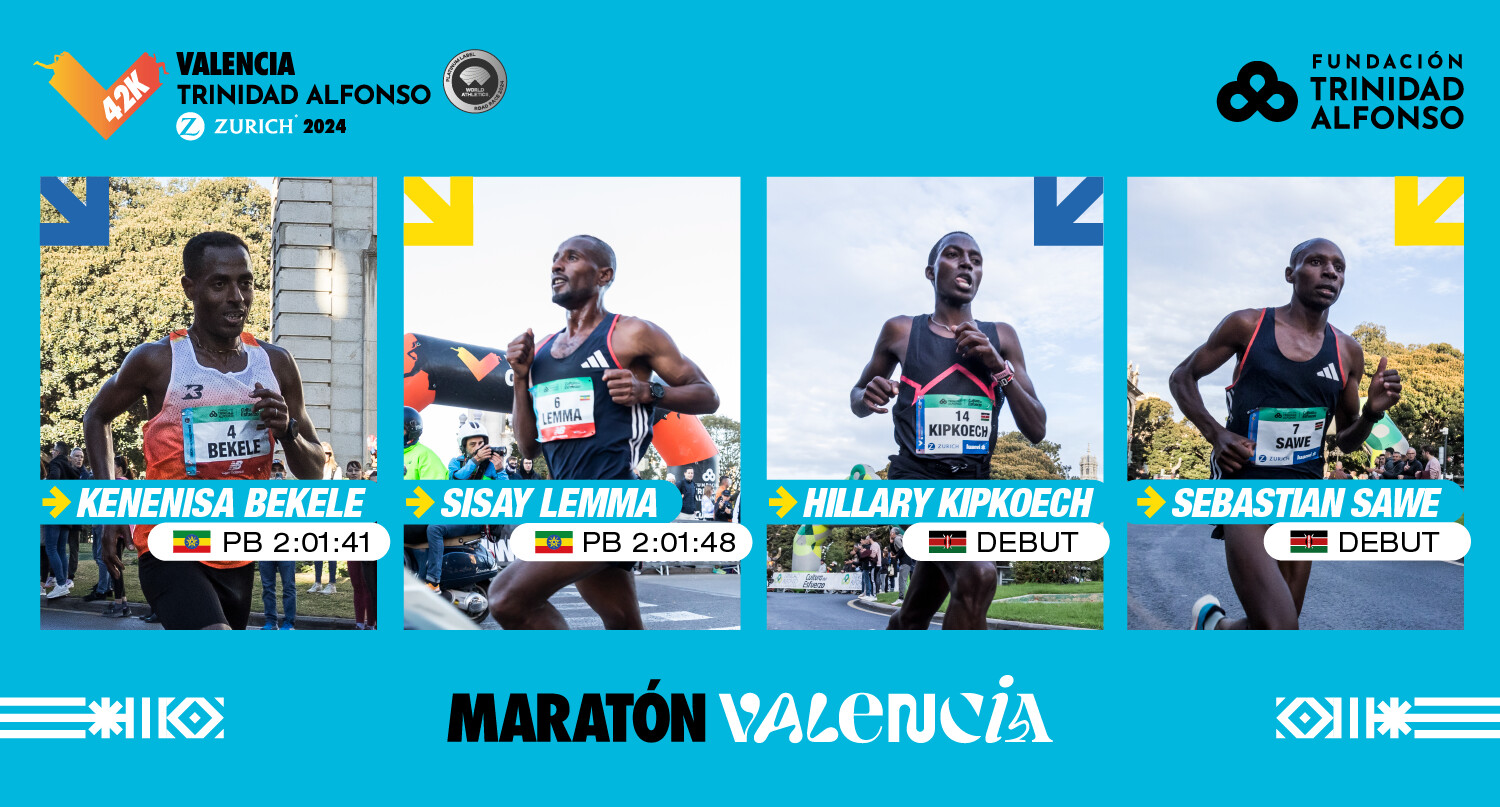
On the women’s side, 2023 World champion Amane Beriso headlines the field with her 2:14:58 personal best from the 2022 Valencia Marathon, which puts her at No. 6 on the all-time list. Her fellow countrywomen Megertu Alemu (2:16:34) and Hiwot Gebrekidan (2:17:59) are the only two other women under 2:18.
American Sara Hall will be running her fourth marathon of the year. Biya Simbassa, who has a personal best of 2:10:34 and was 11th at the U.S. Olympic Marathon Trials in February, is heading to Spain for his third career marathon.
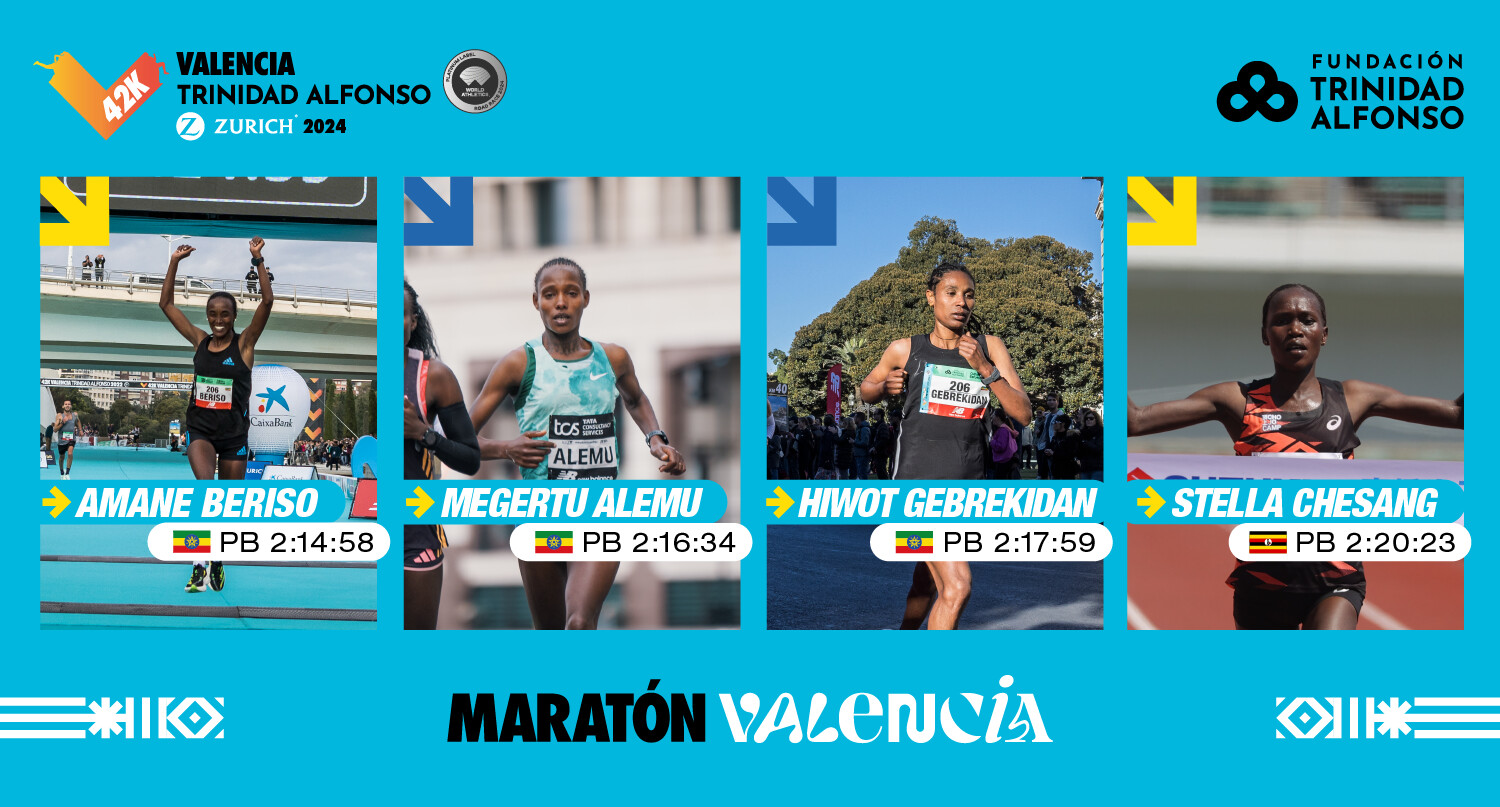
Here’s a list of the notable men who are running…
Men’s Elite Field
Kenenisa Bekele – 2:01:41
Sisay Lemma – 2:01:48
Birhanu Legese – 2:02:48
Deresa Geleta – 2:03:27
Guye Adola – 2:03:46
Gashau Ayale – 2:04:53
Tadesse Abraham – 2:05:01
Alphonce Simbu – 2:05:39
Sondre Moen – 2:05:48
Samwel Fitwi – 2:06:27
Andamlak Belihu – 2:06:40
Maru Teferi – 2:06:43
Shokhrukh Davlyatov – 2:07:02
Richard Ringer – 2:07:05
Zerei Kbrom – 2:07:10
Iliass Aouani – 2:07:16
Samuel Barata – 2:07:35
Héctor Garibay – 2:07:44
Ibrahim Chakir – 2:07:48
Mohamed El Talhaoui – 2:08:03
Peiyou Feng – 2:08:07
Dani Mateo – 2:08:22
Lahsene Bouchikhi – 2:08:36
Abderrazak Charik – 2:08:37
Andy Buchanan – 2:08:58
Weldu Negash Gebretsadik – 2:09:14
Therence Bizoza – 2:09:18
Yohan Durand – 2:09:21
Mohamed Chaaboud – 2:09:21
Simon Boch – 2:09:25
Yimer Getahun – 2:09:27
Bukayawe Malede – 2:09:28
Emmanuel Roudolff – 2:09:34
Yohanes Chiappinelli – 2:09:46
Stephen Scullion – 2:09:49
Paulo Paula – 2:09:50
Peter Herzog – 2:10:06
Bart van Nunen – 2:10:16
Felicien Muhitira – 2:10:17
Dieter Kersten – 2:10:22
Arkadiusz Gardielewski – 2:10:31
Bjorn Koreman – 2:10:32
Abbabiya Simbassa – 2:10:34
Hicham Sigueni – 2:10:37
Johannes Motschmann – 2:10:39
Patricio Castillo – 2:10:40
Jorge Blanco Alvarez – 2:10:49
Archie Casteel – 2:10:49
Yongzheng Huang – 2:10:49
Jakoub Labquira – 2:10:50
Alejandro Jiménez – 2:10:54
Juan Luis Barrios – 2:10:55
Thijs Nijhuis – 2:10:57
Iraitz Arrospide – 2:10:59
Christian Zamora – 2:11:02
Nicolás Cuestas – 2:11:03
Edward Cheserek – 2:11:07
Kamil Jastrzebski – 2:11:09
Necho Tayachew – 2:11:21
Richard Douma – 2:11:21
Linus Rosdahl – 2:11:30
Mohamed El Ghazouany – 2:11:48
Thomas do Canto – 2:11:51
Hesiquio Flores – 2:11:57
Ahmed Elhassouni – 2:12:12
René Cunéaz – 2:12:48
Mario Bauernfeind – 2:12:49
Patrik Wageli – 2:12:58
Jason Pointeau – 2:13:00
Adam Lipschitz – 2:13:01
Joris Keppens – 2:13:18
Alexis Godefroy – 2:13:32
Pierre Denays – 2:13:34
Sebastian Sawe – Debut
Daniel Mateiko – Debut
Matthew Kimeli – Debut
Dillon Maggard – Debut
Here’s a list of the notable women who are running…
Amane Beriso – 2:14:58
Megertu Alemu – 2:16:34
Hiwot Gebrekidan – 2:17:59
Tiruye Mesfin – 2:18:47
Stella Chesang – 2:20:23
Sara Hall – 2:20:32
Majida Maayouf – 2:21:27
Evaline Chirchir – 2:22:11
Chimdesa Kumsa – 2:22:13
Isobel Batt-Doyle – 2:23:27
Malindi Elmore – 2:23:30
Sofia Assefa – 2:23:33
Fionnuala McCormack – 2:23:58
Jessica Stenson – 2:24:01
Gerda Steyn – 2:24:03
Laura Hottenrott – 2:24:32
Camilla Richardsson – 2:24:38
Kaoutar Boulaid – 2:25:03
Clara Evans – 2:25:04
Fatima Azzaharaa Ouhaddou – 2:25:30
Laura Luengo – 2:25:35
Susana Santos – 2:25:35
Moira Stewartova – 2:25:36
Marie Perrier – 2:26:19
Tereza Hrochová – 2:26:38
Zhanna Mamazhanova – 2:26:42
Aleksandra Brzezinska – 2:27:20
Solange Jesus – 2:27:30
Paola Bonilla – 2:27:38
Nora Szabo – 2:28:25
Jane Bareikis – 2:29:00
Becky Briggs – 2:29:06
Alice Wright – 2:29:08
Roberta Groner – 2:29:09
Molly Gravill – 2:29:45
Monika Jackiewicz – 2:29:51
Event organizers announced the race will move forward as scheduled despite severe flooding and more than 200 deaths in the Valencia province. In a statement, organizers announced fundraising plans to aid the city and those affected by the recent storms and flooding.
by Chris Chavez
Login to leave a comment
VALENCIA TRINIDAD ALFONSO
The Trinidad Alfonso EDP Valencia Marathon is held annually in the historic city of Valencia which, with its entirely flat circuit and perfect November temperature, averaging between 12-17 degrees, represents the ideal setting for hosting such a long-distance sporting challenge. This, coupled with the most incomparable of settings, makes the Valencia Marathon, Valencia, one of the most important events in...
more...50 Motivational Running Quotes About Racing
Find Inspiration from Running Icons and Legends
Even the most motivated among us occasionally has a challenging time wanting to lace up our shoes and hit the pavement running. Bookmark this page for the next time motivation is waning for you. Read on for inspirational race quotes to pump you up before your next run.
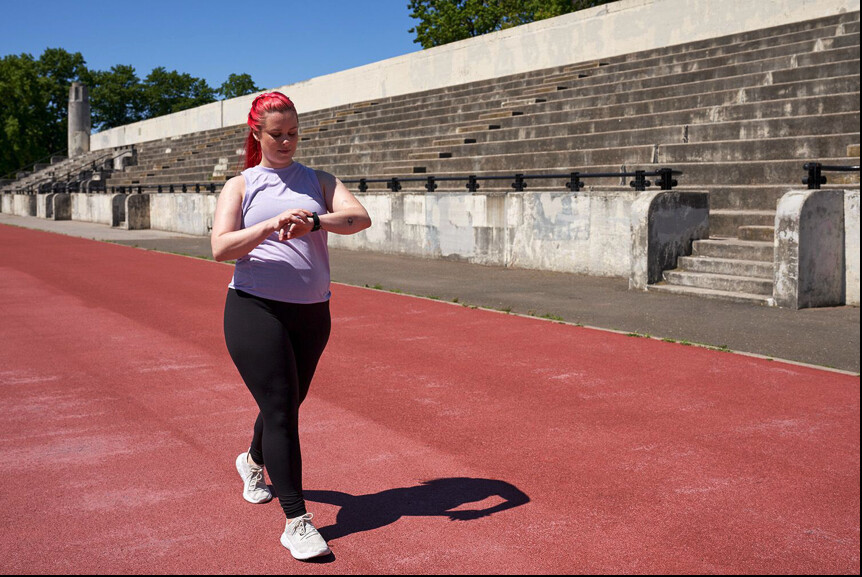
"The miracle isn't that I finished. The miracle is that I had the courage to start." —John Bingham, running speaker and writer
"Fear is gradually replaced by excitement and a simple desire to see what you can do on the day." —Lauren Fleshman, American distance runner
"It doesn't matter whether you come in first, in the middle of the pack, or last. You can say, 'I have finished.' There is a lot of satisfaction in that." —Fred Lebow, co-founder of the New York City Marathon
"When you put yourself on the line in a race and expose yourself to the unknown, you learn things about yourself that are very exciting." —Doris Brown Heritage, women's distance running pioneer
"Good health, peace of mind, being outdoors, camaraderie: those are all wonderful things that come to you when running. But for me, the real pull of running—the proverbial icing on the cake—has always been racing." —Bill Rodgers, winner of four Boston Marathons
"Big occasions and races which have been eagerly anticipated almost to the point of dread, are where great deeds can be accomplished." —Jack Lovelock, environmentalist and futurist
"I also realize that winning doesn't always mean getting first place; it means getting the best out of yourself." —Meb Keflezighi, 2004 Olympic Marathon silver medalist
"Why race? The need to be tested, perhaps; the need to take risks; and the chance to be number one." —George Sheehan, running columnist and writer
RELATED: A Beginner's Guide to Becoming a Runner
"Everyone in life is looking for a certain rush. Racing is where I get mine." —John Trautmann, Olympic runner
"I'm always nervous. If I wasn't nervous, it would be weird. I get the same feeling at all
"My thoughts before a big race are usually pretty simple. I tell myself: 'Get out of the blocks, run your race, stay relaxed. If you run your race, you'll win.'" —Carl Lewis, nine-time Olympic gold champion
RELATED: How to Plan a Running Route Using Map Apps on Your Phone
"I love controlling a race, chewing up an opponent. Let's get down and dirty. Let's fight it out. It's raw, animalistic, with no one to rely on but yourself. There's no better feeling than that." —Adam Goucher, U.S. Nationals 5K race champion
"I'm going to work so that it's a pure guts race at the end, and if it is, I am the only one who can win it." —Steve Prefontaine, legendary American long-distance runner
"Let's just say it and be done with it. Racing hurts. But here's another truth: having put in the effort to prepare for a race and then not giving it your all hurts even more. The first kind of hurt goes away in hours or a day. The second kind of hurt can last a lifetime." —Larry Shapiro, author of Zen and the Art of Running
"Different people have different reasons for racing, but
"Running is in my blood—the adrenaline flows before the races, the love/hate of butterflies in your stomach." —Marcus O'Sullivan, Irish middle-distance runner
"It's just as important to remember that each footstrike carries you forward, not backward. And every time you put on your running shoes you are different in come way than you were the day before. This is all good news." —John Bingham, American marathon runner
"Racing teaches us to challenge ourselves. It teaches us to push beyond where we thought we could go. It helps us to find out what we are made of. This is what we do. This is what it's all about." —PattiSue Plumer, U.S. Olympian
"You didn't beat me. You merely finished in front of me." —Hal Higdon, American writer and runner
"Fast running isn't forced. You have to relax and let the run come out of you." —Desiree Linden
"No marathon gets easier later. The halfway point only marks the end of the beginning." —Joe Henderson, famed running coach
RELATED: Race Day Tips for Running Your First 5K
"No matter how old I get, the race remains one of life's most rewarding experiences." —George Sheehan
"If you feel bad at
"What distinguishes those of us at the starting line from those of us on the couch is that we learn through running to take what the days gives us, what our body will allow us, and what our will can tolerate." —John Bingham, running writer and speaker
"For me, races are the celebration of my training." —Dan Browne, National Champion 5K and 20K runner
"Run when you can, walk if you have to, crawl if you must; just never give up." —Dean Karnazes, ultramarathon runner
"Every race is a question, and I never know until the last yards what the answer will be. That's the lure of racing." —Joe Henderson
"It's amazing how the same pace in practice can feel so much harder than on race day. Stay confident. Trust the process." —Sara Hall, American long-distance runner
"Winning has nothing to do with racing. Most days don't have races anyway. Winning is about struggle and effort and optimism, and never, ever, ever giving up." —Amby Burfoot, American marathon runner
"Your goal is simple: Finish. Experience your first race, don’t race it." —Bob Glover, author of The Runner's Handbook
"Don't dream of winning, train for it!" —Mo Farah, Olympic long
"Nothing, not even pain, lasts forever. If I can just keep putting one foot in front of the other, I will eventually get to the end." —Kim Cowart, runner and journalist
"The real purpose of running isn't to win a race. It's to test the limits of the human heart." —Bill Bowerman, co-founder of Nike
"Our running shoes have magic in them. The power to transform a bad day into a good day; frustration into speed; self-doubt into confidence; chocolate cake into muscle." —Mina Samuels, author of Run Like a Girl
"There is magic in misery. Just ask any runner." —Dean Karnazes
"Run often. Run long. But never outrun your joy of running." —Julie Isphording, American Olympic runner
Login to leave a comment
What the elites eat: Marathon Edition
Curious about what elite marathoners eat to fuel their peak performance? From carb-loaded pre-race meals to post-race burger feasts, here’s an inside look at what the elites eat before, during, and after a marathon.
As runners and human beings, we’re naturally curious, slightly nosy people. With information instantly available with the twitch of a finger across our iPhone screens, this curiosity has never been easier to satisfy. Plus, many of our favorite runners are more transparent than ever about their training blocks, pulling back the blinds through social media to show what it takes to be the best. Which is why we’re ever-fascinated by the race-related nutrition strategy of elite runners, who often perform at superhero-like levels.
We asked a few elite marathoners what they eat surrounding race day—pre-race dinner, pre-race breakfast, and post-race celebration—so you don’t have to.
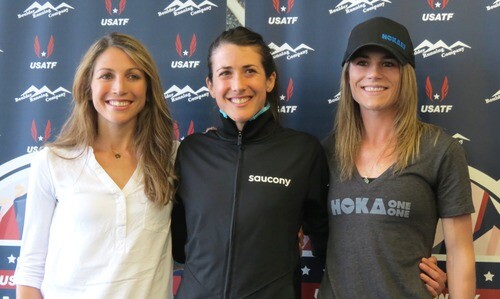
Note: One sentiment echoed among all of the athletes interviewed was that their diets are personal and have gone through lots of trial-and-error to be finessed to their specifications. No lifestyle should be replicated exactly.
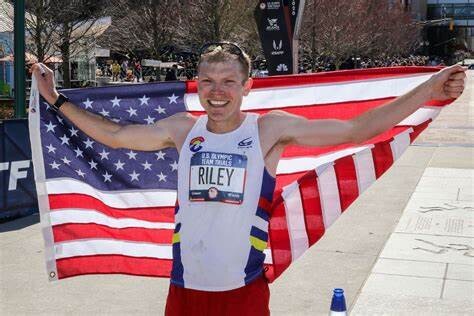
35, Boulder, Colorado
About him: First American and ninth overall finisher in the 2019 Chicago Marathon (2:10:36). Placed second at the 2020 U.S. Olympic Trials Marathon (2:10:02); Finished 28th in Tokyo Olympics marathon (2:16:26). After a second round of double Haglund’s surgery in 2022, he’s back in top form and running the 2024 New York City Marathon on November 3.
The night(s) before a race:
“I start thinking about meals two nights out, and I go carb-heavy on both. For the first night, I like to have Thai food, usually a noodle dish, and a side of rice. The only thing I’ll really avoid is spice since I’ve had issues from it a couple times. The night before, I do pasta, usually a marinara (that’s what a lot of races provide for the elite athletes), but a good pesto sauce works well, too. I mostly stay away from the creamy sauces. I don’t like to get too much more specific—you never know exactly what’s going to be available, so I try not to make particular foods part of my routine.”
Race morning:
“Race mornings I’ll get up at least three hours before (I prefer four, but with 7 to 8 A.M. starts, that becomes a little counter-productive), I’ll go for a short walk with some skipping or something, just to get the body moving. My first choice for breakfast is oatmeal with peanut butter, honey, and a little fruit mixed in. And at least one, usually two cups of coffee. It’s not something to avoid, but I recommend making sure that you have more than just simple carbs (cereal, muffin, etc), I find that if there isn’t at least some protein, I start getting that ‘empty’ feeling during my warmup, and if that mixes with the adrenaline, I feel real queasy. If I’m taking gels, I take one on the start line, maybe five minutes before. I also like Generation UCAN, which I’ll sip as I’m going through my drills, maybe half an hour out.”
During the race:
“I like to get my calories from gels and have just electrolytes in my bottles. Most major marathons provide drink stations every 5K, and I’ll drink about 8-10 oz of SOS per bottle (there can be splashing, and you never get it all out). I’ll take Roctane gels before every other drink station (every 30 minutes or so).”
Post-race meal:
“Most races I want a hash—lots of potatoes with some eggs, bacon, cheese, and veggies all mixed up, but after marathons my stomach takes a while to settle down, so I’m more in a lunch mood. So my go-to post-race meal is a big bistro bacon cheeseburger, ideally with an onion ring and barbecue sauce, side of fries, and a beer. I mostly stay away from fried foods during a build up, but I always take at least a week off after a marathon and at this point, that beer and burger is almost a Pavlovian ‘vacation time’ signal for my whole body.”
41, Flagstaff, Arizona
About her: She’s the fourth-fastest American woman in history based on her personal best (2:20:2) at the 2020 Marathon Project; Second-fastest American female half-marathon runner and former American record-holder (1:07:15). Most recently, she was 18th overall and the women’s master champion in the 2024 Chicago Marathon (2:30:12).
The night(s) before a race:
“Rice with chicken. I skip the veggies to not risk having to make a bathroom stop in the race.”
Pre-race breakfast:
“Two scoops of UCAN energy powder with whey protein, and a little bit of almond butter.” Bonus, Hall credits her husband, Ryan Hall, as being the best coffee maker, brewing pour-over, medium roast coffee blended with butter.
During the race:
Ketone-IQ—peach flavored.
Post-race meal:
“My favorite post-meal race is Thai food. I’m usually eating a lot of boring food before the race, so I want something spicy and more flavorful after.”
Bonus—Lunch during training blocks:
“Two scoops of UCAN powder, two pieces of gluten-free bread with Kerrygold Butter.”
36, Boulder, Colorado
About her: Won the 2019 Grandma’s Marathon and finished ninth in the 2020 U.S. Women’s Olympic Trials Marathon in 2:30:39. She was the top American finisher in the Boston Marathon in 2021 (fifth, 2:27:12, ) and 2022 (10th, 2:25:57). In January, she placed ninth in the Houston Half Marathon in a new personal best of 1:08:52.
The night(s) before a race:
“I always have the same thing. Basically, a couple cups of white rice and a chicken breast is where I tend to fall. White rice is going to fuel the most carbs per serving. I used to mix up potatoes and white rice, but for me, I digest white rice well, I feel better, it’s easy to find, simple, and works well.
I don’t care about spices—and I’m usually not making it myself if I’m not at home. Typically, before races, there’s a pre-race dinner, and chicken is an option. I wouldn’t do any cream-based sauces. If it tastes good, great. If it doesn’t, great. I don’t care.”
Pre-race breakfast:
“Typically it’s oatmeal with a tablespoon of peanut butter, a banana, and maybe honey. I’m not 100 percent satisfied with my pre-race meal, because sometimes it can feel a bit heavy in my stomach, because oatmeal does have some fiber. So I try to play around with things. Sometimes I’ll do a couple pieces of toast with a banana and peanut butter. I can switch between those two. Try to get 500-600 calories in, mostly from carbs, two-three hours before the race. Plus, I drink coffee with half-and-half.
Post-race meal:
“Immediately after the race, I honestly will grab whatever is available. Typically, after a race, we’ll be shuttled to a post-race holding area where you’re waiting, so there are usually refreshments there. I’ll slam Gatorade—anything with sugar and electrolytes. Maybe there’s my own bottle with Skratch in it. Banana, a protein shake. I’m pretty open, as long as it’s immediate.
And as far as later, it completely depends. I’m trying to do a better job at this—especially after a major marathon—but it kind of takes a while. You might get drug-tested, then shuttled back to your hotel, shower, then six hours later you’re like, ‘I need to eat.’ If it’s a marathon, I love a big burger with fries—the classic stuff, lettuce, tomato, onion, and tons of ketchup and mayo. That’s something my body would crave. Fries are my favorite food ever that I don’t typically eat during a marathon cycle.”
35, Louisville, Colorado
About her: Finished sixth in the 2017 London Marathon (2:25:38), seventh in the 2019 New York City Marathon (2:28:23), eighth in the 2019 Chicago Marathon (2:29:06), eighth in the 2021 New York City Marathon (2:27:00). Most recently, an Achilles injury forced her to pull out of the 2024 Chicago Marathon days before the race.
The night(s) before a race:
“I do 72-hours of carb-loading. So, obviously, in the build to that, carbs are key. Three days out from the race is when I start it. It is always the same. The night before, I have pasta with marinara sauce, and I don’t do a lot of protein with that. I do love angel hair, that’s my go-to. I also like rigatoni. Plus, I’ll have some type of bread and salad.”
Pre-race breakfast:
“The morning of, I always do a plain bagel and peanut butter with a banana. I’ve done that since high school. And I do an Americano with two shots. I eat that threeish hours out from the race.
During the race:
“I’ll take my first gel 15 minutes before the start of the race. I’ve been all over the place with what I take, but right now, Neversecond. Big fan of their Cola C30 gels. They worked wonders for me during this build. I had some stomach issues earlier in the build with long runs and couldn’t quite figure out what was going on, so I switched up my nutrition during, so never second has been a godsend.”
Post-race meal:
“After the race, it’s hard because usually my stomach is a mess. Not only did you just run really hard for two and a half hours, but you’re taking all this fuel during, so I have a really hard time eating solids immediately after the race. My choice if I can get it is soda. I’m not a big soda drinker, but after a marathon, all I want is a Coke, Sprite, or Ginger Ale. I’m always really thirsty when I finish.
Then later when I feel like eating, I always do a burger (stacked with all the fixings—sometimes adding bacon) and sweet potato fries with ranch. I never opt out of Ranch. Anything I can dip ranch in is a plus for me. And I order a Blue Moon. I’m not a beer drinker, but that’s what I want after a marathon.”
by Mallory Arnold
Login to leave a comment
Legese and Chepngetich lead Chicago Marathon fields
Ruth Chepngetich heads to the Bank of America Chicago Marathon on the hunt for a hat trick, while Birhanu Legese is the fastest in the men’s field for the World Athletics Platinum Label road race on Sunday (13).
The women’s race features a clash between Chepngetich, her Kenyan compatriot Joyciline Jepkosgei and Ethiopia’s Sutume Kebede – three sub-2:17 runners who form part of a field that includes another six women to have dipped under 2:20.
Chepngetich, the 2019 world marathon champion, won in Chicago in 2021 and 2022, and followed that with a runner-up finish to Sifan Hassan last year. She clocked 2:14:18 on that occasion, while her PB of 2:14:18 set in Chicago in 2022 makes her the fourth fastest women’s marathon runner in history.
She ran 2:24:36 for her most recent marathon, in London in April, and placed ninth, but then clocked 1:05:58 to win the 21k Buenos Aires half marathon in August.
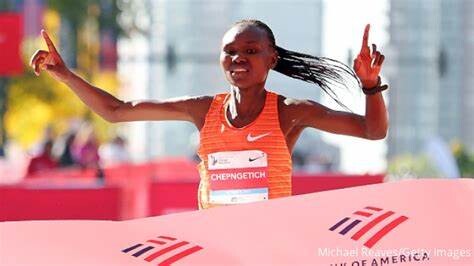
Jepkosgei, who won the London Marathon in 2021 and New York City Marathon in 2019, finished fourth in Chicago last year in 2:17:23.
She improved by one place when returning to marathon action in London in April, setting a PB of 2:16:24.
It’s Kebede who leads this season’s top list, thanks to the PB of 2:15:55 she set to win the Tokyo Marathon in March. That puts her at No.8 all time and she will be hoping to make the most of the fast course in Chicago.
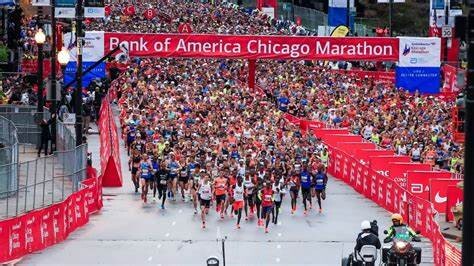
“After seeing what my teammate Kelvin Kiptum did last year, I want to come to Chicago to do something great,” said Kebede, who finished 15th in last year’s race.
Kiptum, who was part of Kebede’s training group, died in a road traffic accident in February, just four months after he set his world marathon record of 2:00:35 in Chicago. This year, the event will honour Kiptum’s legacy with a moment of silence at the start line.
Joining Chepngetich, Jepkosgei and Kebede on that start line will be three more women with PBs under 2:18 – Ethiopia’s Degitu Azimeraw, Ashete Bekere and Hiwot Gebrekidan – plus Kenya’s Irine Cheptai, who ran 2:18:22 in Hamburg in April.
The field also features the second and third fastest ever US women’s marathon runners, Keira D’Amato and Betsy Saina, who have also dipped under 2:20. They are joined in this competitive field by their compatriots Sara Hall and Emma Bates.
Ethiopia’s Legese leads the men’s field with the PB of 2:02:48 he ran in Berlin in 2019. That performance puts him sixth on the men’s world marathon all-time list but since then his highest marathon finish has been a third place, achieved in Rotterdam with a 2:05:16 run in April.
The two-time Tokyo Marathon champion will want to return to winning ways when he heads back to Chicago, where he placed 10th when making his World Marathon Majors debut in 2018, but he faces tough opposition.
Six other men in the field have PBs faster than 2:06, including Kenya’s Amos Kipruto, Vincent Ngetich and John Korir, and Ethiopia’s Dawit Wolde, Amedework Walelegn and Mohamed Esa.
Kipruto, the 2019 world bronze medallist, and Ngetich have matching PBs of 2:03:13. Kipruto won the London Marathon in 2022 and trains with Benson Kipruto, who won that year’s Chicago Marathon, while Ngetich was second in the Berlin Marathon last year, five places ahead of Kipruto. He was also third at this year’s Tokyo Marathon.
Korir ran his PB of 2:05:01 when finishing third in Chicago in 2022, while Wolde ran 2:03:48 in Valencia last year, Esa has a best of 2:05:05 from Amsterdam in 2022 and Walelegn clocked 2:04:50 in Rotterdam in April, finishing runner-up – one place ahead of Legese.
Looking to join them at the front of the field will be Kenya’s Daniel Ebenyo, the world 10,000m and half marathon silver medallist who makes his marathon debut. The 29-year-old ran a 59:30 half marathon in Berlin in April, 26 seconds off his PB set in Manama in 2022.
Ethiopia’s Jemal Yimer Mekonnen, who finished fourth in the half marathon at last year’s World Road Running Championships behind runner-up Ebenyo, is back in marathon action after his win in Seoul in March.
Among the athletes racing on home soil are USA’s Zach Panning, CJ Albertson and Brian Shrader.
Elite fields
WomenRuth Chepngetich (KEN) 2:14:18Sutume Kebede (ETH) 2:15:55Joyciline Jepkosgei (KEN) 2:16:24Degitu Azimeraw (ETH) 2:17:58Ashete Bekere (ETH) 2:17:58Hiwot Gebrekidan (ETH) 2:17:59Irine Cheptai (KEN) 2:18:22Keira D'Amato (USA) 2:19:12Betsy Saina (USA) 2:19:17Sara Hall (USA) 2:20:32Emma Bates (USA) 2:22:10Buze Diriba (ETH) 2:23:11Sara Vaughn (USA) 2:23:24Susanna Sullivan (USA) 2:24:27Gabi Rooker (USA) 2:24:35Lindsay Flanagan (USA) 2:24:43Stacey Ndiwa (KEN) 2:25:29 Lauren Hagans (USA) 2:25:56Annie Frisbie (USA) 2:26:18Jackie Gaughan (USA) 2:27:08Dominique Scott (RSA) 2:27:31Diane Nukuri (USA) 2:27:50Makena Morley (USA) 2:30:25Anne Marie Blaney (USA) 2:30:43Amy Davis-Green (USA) 2:33:09Aubrey Frentheway (USA) debut
MenBirhanu Legese (ETH) 2:02:48Amos Kipruto (KEN) 2:03:13Vincent Ngetich (KEN) 2:03:13Dawit Wolde (ETH) 2:03:48Amedework Walelegn (ETH) 2:04:50John Korir (KEN) 2:05:01Mohamed Esa (ETH) 2:05:05Jemal Yimer (ETH) 2:06:08Kyohei Hosoya (JPN) 2:06:35Toshiki Sadakata (JPN) 2:07:05Tatsuya Maruyama (JPN) 2:07:50Yuichi Yasui (JPN) 2:08:48Jorge Castelblanco (PAN) 2:09:24Zach Panning (USA) 2:09:28Brian Shrader (USA) 2:09:46CJ Albertson (USA) 2:09:53Tomoki Yoshioka (JPN) 2:10:03Reed Fischer (USA) 2:10:34Nathan Martin (USA) 2:10:45Colin Mickow (USA) 2:11:22Kevin Salvano (USA) 2:11:26Jacob Thomson (USA) 2:11:40Turner Wiley (USA) 2:11:59Shadrack Kipchirchir (USA) 2:13:02JP Flavin (USA) 2:13:27Charlie Sweeney (USA) 2:13:41Ben Kendell (USA) 2:15:49Phil Parrot-Migas (CAN) 2:15:53Aaron Gruen (USA) 2:15:56Daniel Ebenyo (KEN) debutPeter Lynch (IRL) debutAlex Maier (USA) debutAlex Masai (USA) debut
by World athletics
Login to leave a comment
Bank of America Chicago
Running the Bank of America Chicago Marathon is the pinnacle of achievement for elite athletes and everyday runners alike. On race day, runners from all 50 states and more than 100 countries will set out to accomplish a personal dream by reaching the finish line in Grant Park. The Bank of America Chicago Marathon is known for its flat and...
more...Six American runners to watch in the 2024 Chicago Marathon
Excitement is building for this year’s Chicago Marathon that takes place on Sunday 13 October. Once again, a stellar field has been assembled including some of the best American runners operating today. Read on to find out which US athletes will compete in the 2024 Chicago Marathon.
It’s been seven years since the last American was victorious in the Chicago Marathon, with Galen Rupp crowned winner of the men’s race in 2017. In the women’s race, you need to go back almost 20 years to find the last US winner, when Deena Kastor became the first female American to claim victory on the streets of Chicago in almost a decade.
But with this year’s Chicago Marathon just days away, a strong group of elite American runners will take on the challenge of the 42.195km race, bringing with them experience, pedigree and the hopes of a nation as they battle for glory on home soil.
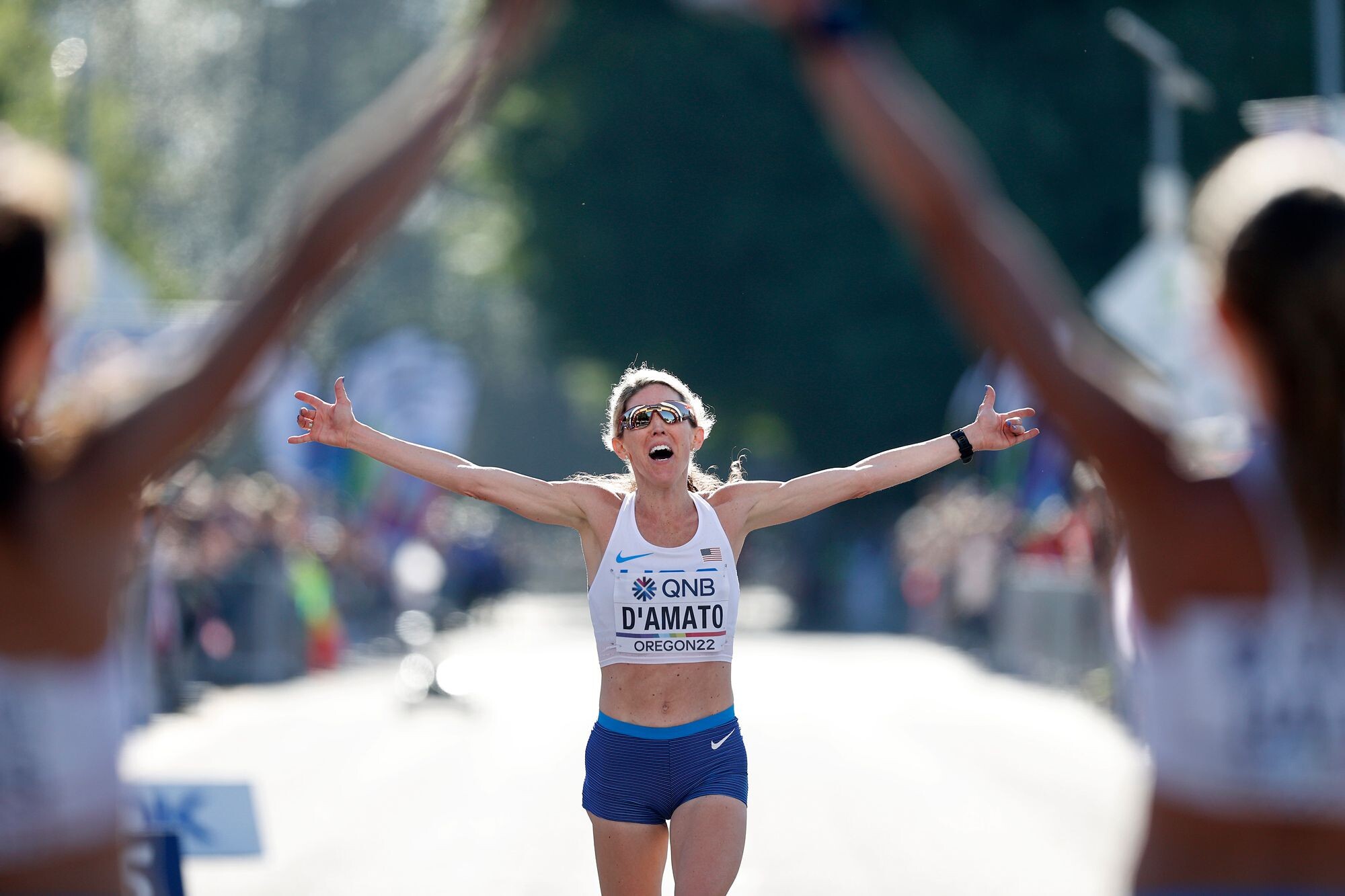
Read on to discover the top American athletes competing in the 2024 Chicago Marathon.
Top Americans in the 2024 Chicago Marathon women’s race
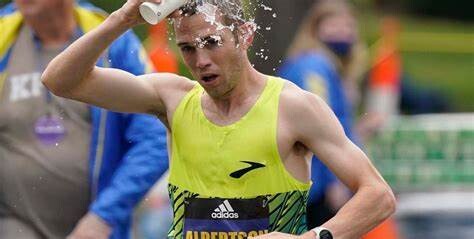
Keira D’Amato
Keira D'Amato, the former fastest female American runner of all time, has an exceptional track record in long-distance events. The 39-year-old still holds the fastest US women’s time in the half marathon at 1:06:39, set in the Gold Coast, Australia in 2023, while her best in the 42.195km race is an impressive 2:19:12, which she achieved in Houston in 2022.
This year, D’Amato will have speedy support by her side, as she revealed her pacer for the Chicago Marathon will be none other than Rio 2016 Olympic 1500m gold medallist Matthew Centrowitz. Can the addition to her race-day crew catapult D’Amato to glory in the Windy City? All will be revealed on Sunday.
Born in Kenya, Betsy Saina has since received her US citizenship and will be one of the favourites to hold the title of fastest American in this year’s Chicago Marathon women’s race. Saina became a mother in 2021 but has gone from strength to strength since then, becoming the fastest female American marathoner in 2023. While her dreams of making the Olympic team for Paris 2024 were not realised, she comes into this year’s Chicago Marathon showpiece with one of the fastest times among all US runners with a personal best of 2:19:17 set at the 2024 Tokyo Marathon.
A fan favourite and former American marathon record holder, Sara Hall has vast experience in elite marathon running, which includes a third-place finish in the 2021 Chicago Marathon.
Perhaps her most memorable performance was in the 2021 London Marathon where she produced a stunning all-out sprint finish to claim second-place in Britain’s capital.
At 41 years old, Hall will be among the older members of the elite field but she is showing few signs of slowing down. She finished fifth in the 2024 Olympic marathon trials and in April this year ended the Boston Marathon as the second-fastest American finisher in a time of 2:27:58.
Top Americans in the 2024 Chicago Marathon men’s race
Zach Panning
During the US marathon trials for the last Olympics, Zach Panning sent the crowd into a frenzy with a courageous run where he led from the front for almost three-quarters of the race. Panning eventually fell off the pace to finish the trials in sixth place, with only the top three nominated for the team.
However, the fearlessness of the 29-year-old, who holds a personal best of 2:09:28, makes him one of the most exciting runners in the field.
Following his 10th-place finish in the 2024 London Marathon, Brian Shrader is back on home soil hoping to impress on the streets of Chicago, where he finished 11th last year in a personal best time of 2:09:46.
While a DNF in the Olympic trials shattered Shrader’s dreams of going to Paris 2024 he enters this race with real aspirations of finishing as the top American and perhaps challenging the front-runners in the elite men’s race.
Perhaps best known for his exploits over distances that trickle into the category of ultrarunning, CJ Albertson’s pace over the legendary 42.195km distance makes him one of the top three American men in the Chicago Marathon field.
The former world record holder over 50km enters Sunday’s race with a best marathon time of 2:09:53 set at the 2024 Boston Marathon, where he finished seventh.
Albertson finished fifth in the 2024 Olympic trials but his recent form shows just why he is one of the most talked-about US athletes operating in the marathon today.
by Athletics
Login to leave a comment
Bank of America Chicago
Running the Bank of America Chicago Marathon is the pinnacle of achievement for elite athletes and everyday runners alike. On race day, runners from all 50 states and more than 100 countries will set out to accomplish a personal dream by reaching the finish line in Grant Park. The Bank of America Chicago Marathon is known for its flat and...
more...Could the women's American marathon record fall at this year's Chicago Marathon?
The 2024 Bank of America Chicago Marathon on Oct. 13 poses an exciting opportunity for elite runners to capture record-breaking times -- and this year is no different. Could a women's record fall during the race?
The lineup, which was released earlier this summer, is highlighted by two of the "10 fastest women of all time" and the the second and third fastest American women of all time.
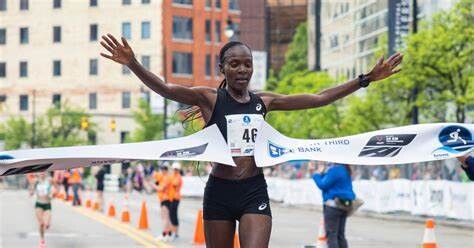
“We are accustomed to making history at the Bank of America Chicago Marathon,” Executive Race Director Carey Pinkowski said in a statement. “With some of the fastest athletes in the world joining us this fall, we are hopeful to build on the tradition of great performances this year.”
For the Americans, Keira D'Amato and Betsy Saina headline the country's best.
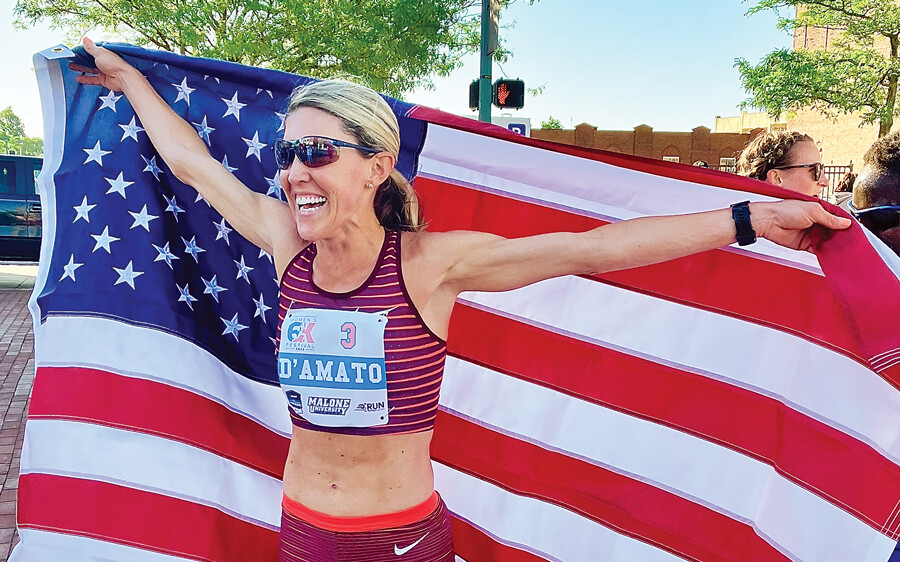
D'Amato, the former American marathon record holder, will return to the starting line after being part of the broadcast team for the past two years.
“I have a special history with the Chicago Marathon,” said D’Amato who finished fourth in 2021. “The past two years I’ve run my mouth in the lead vehicle for NBC. I’m excited to get back to running my legs.”
D'Amato first broke the American marathon record in 2022 in Houston, topping a time that had stood for 16 years.
Emily Sisson broke that same record shortly after during the 2022 Chicago Marathon. D'Amato was among the long line of legendary female runners celebrating Sisson at the Chicago finish line that year.
Saina, who placed fifth in this year’s Tokyo Marathon, will look to record her first Chicago finish after dropping out of the race in 2019 due to illness. She's run the third-fastest marathon time of any American woman, one spot behind D'Amato.
Sara Hall and Emma Bates are also in the field for the Americans. Hall's best time of 2:20:32 comes from Chandler in 2020. Bates ran her best time in 2022 at the Boston Marathon with a 2:22:10 finish.
Among the most notable names at the starting line will be Sutume Kebede, of Ethiopia, who holds the fastest marathon in the women's field and whose finish at the 2024 Tokyo Marathon made her the eighth fastest of all time.
“I am extremely happy to come back to Chicago and run on a course that has proven to be very fast,” Kebede, who had a disappointing finish in the 2023 Bank of America Chicago Marathon, said in a statement. “After seeing what my teammate Kelvin Kiptum did last year, I want to come to Chicago to do something great.”
Kenya's Ruth Chepngetich will also return to the start line in October. She won the race in both 2021 and 2022 while finishing runner-up during last year's 2023 race. Her 2:14:18 from the 2022 Chicago Marathon stands as the fourth-fastest time by a woman in history.
Here is the lineup for the women's elite division.
Bank of America Chicago Marathon Professional Field – Women’s Open Division
The Chicago Marathon is not immune to seeing record-breaking times.
Kenya's Kelvin Kiptum obliterated the men's marathon world record at the 2023 Chicago Marathon, running it in 2 hours and 35 seconds. He overcame Eliud Kipchoge's previous record by 30 seconds with his time. Tragically, Kiptum later died shortly after in a car accident in February. He was 24.
At the 2022 Chicago Marathon, Emily Sisson defeated the women's American marathon record in 2 hours, 18 minutes and 29 seconds. She finished second place in the race to Kenya's Ruth Chepngetich, who ran 2:14:18; the second-fastest marathon time by a woman in history.
Let's not also forget Joan Benoit Samuelson broke the women's American marathon record in 1985 with a time of 2:21:21. The time still stands as the seventh-fastest time by an American woman today.
Three of the four fastest marathon times in women's history were run at the Chicago Marathon. Will spectators see another on Oct. 13?
by NBC Sports Chicago Staff
Login to leave a comment
Bank of America Chicago
Running the Bank of America Chicago Marathon is the pinnacle of achievement for elite athletes and everyday runners alike. On race day, runners from all 50 states and more than 100 countries will set out to accomplish a personal dream by reaching the finish line in Grant Park. The Bank of America Chicago Marathon is known for its flat and...
more...Defending champions return to Bix
Kellyn Taylor and Biya Simbassa each ran the Quad-City Times Bix 7 for the first time last year.
They clearly loved the course, the atmosphere and just about everything about the annual race through the streets of Davenport.
Both Taylor and Simbassa held off late challenges from other runners, both ran the sixth best Bix 7 times ever by a U.S. athlete of their gender and both plan to return to defend their championships when the race is held for the 50th time on July 27.
It marks the first time in 12 years that both the men’s and women’s champions are returning to defend their Bix titles.
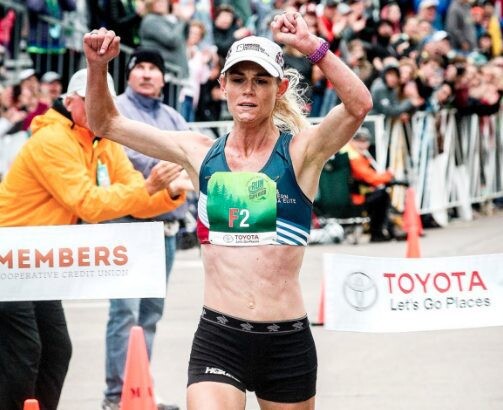
Simbassa admitted he wasn’t really sure how he felt about the Bix 7 course last year when he first saw the endless array of ups and downs in the course. But after holding off Olympian Clayton Young to win, he liked it.
“I mean, now I do,’’ he said after his victory. “It’s a course that’s all about strength and I train for this."
Taylor went through a similar transformation.
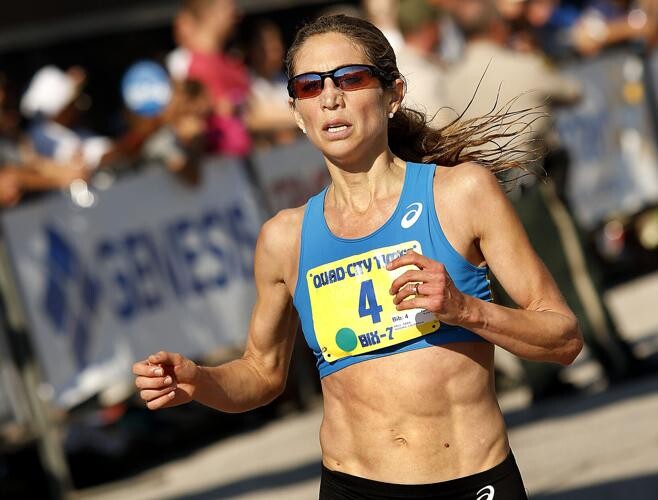
“When I saw the course, I was like, ‘Oh, no. What did I get myself into?’ ” she said. “That’s a super substantial hill right at the beginning and then it rolls all the way through. It’s certainly not easy by any means. I think that works to my favor since I’m more of a strength runner.”
Taylor appreciated more than just the hills.
“The crowds were amazing,” she said. “It’s not what I expected at all — the streets were completely lined, and a race that isn’t a huge marathon, I don’t feel like you see that that often. The crowds were incredible.”
Taylor and Simbassa will be bidding to repeat as Bix 7 champions, something that has been done only seven times in the race’s history, four times by men, three times by women.
Both runners failed to land berths on the U.S. Olympic team, which would have precluded a return to Bix, but they’ve still used their 2023 victories as a springboard to additional success.
Taylor briefly led the New York City Marathon last November before placing eighth, making her the top American finisher in the race. It was the third time she has been in the top eight at New York.
The Wisconsin native, who will turn 38 a few days before the Bix 7, then focused her attention on making the U.S. Olympic team and made a respectable showing in the trials in the marathon, finishing 15th, and the 10,000 meters, placing sixth.
Simbassa, a 31-year-old native of Ethiopia who now lives in Flagstaff, Arizona, attempted to earn an Olympic spot in the marathon but placed 11th in the trials.
However, he has followed that with an ambitious schedule on the U.S. road racing circuit, recording top-five finishes in the Bolder Boulder 10k (5th), Cherry Blossom 10-miler (5th), Gate River 15k (4th), Amway River Bank 25k (3rd) and Houston Half-marathon (4th).
Also included in the field are four former Olympians and nine other runners who have placed in the top 10 at the Bix 7 in the past. Elite athlete coordinator John Tope said even more top runners could be added between now and race day.
Among the top men’s entries are two former Iowa State University standouts.
Wesley Kiptoo of Kenya was the 2021 NCAA indoor 5,000-meter champion and a seven-time All-American for the Cyclones. He was seventh in the Bix 7 two years ago and won the Cherry Blossom 10-miler earlier this year.
Hillary Bor, a Kenya native who is now an American citizen, also attended Iowa State before representing the U.S. in the 3,000-meter steeplechase at the Olympics in both 2016 and 2021. He also is the U.S. record-holder in the 10-mile run.
Other former Olympians in the field are Morocco’s Mohamed El Aaraby and Americans Jake Riley and Shadrack Kipchirchir. Riley and Araby both competed in the marathon in Tokyo in 2021 and Kipchirchir ran the 10,000 meters in 2016.
Riley also is a Bix 7 veteran along with Kenya’s Reuben Mosip and Americans Frank Lara, Andrew Colley and Isai Rodriguez. Lara was second in the Bix 7 in 2021 and eighth a year ago.
Rounding out the men’s field are Raymond Magut of Kenya; Tsegay Tuemay and Tesfu Tewelde of Eritrea; and Americans Nathan Martin, Ryan Ford, JP Trojan, Merga Gemeda and Titus Winders.
The most recognizable name in the women’s field is 41-year-old Sara Hall, the wife of two-time Olympian, U.S. half-marathon record-holder and 2010 Bix champion Ryan Hall. Sara Hall was fifth in the U.S. Olympic marathon trials earlier this year and has two strong Bix 7 efforts on her resume, placing second in 2014 and third in 2017.
She and Taylor will be challenged by three up-and-coming runners from Kenya — Emmaculate Anyango Achol, Grace Loibach Nawowuna and Sarah Naibei. Achol has run the second fastest women’s 10k ever (28:57) and Naibei won the Lilac Bloomsday 12k in May.
Also in the field are Bix 7 veterans Kassie Parker, Jessa Hanson, Carrie Verdon and Tristin Van Ord along with Americans Annmarie Tuxbury and Stephanie Sherman, Ethiopia’s Mahlet Mulugeta and Kenya's Veronicah Wanjiru.
The elite field also includes four legendary runners who have helped build the Bix 7 into the international event that it is. Two-time champion Bill Rodgers, who has run the Bix 7 43 times, will be joined by four-time women’s champion and 1984 Olympic gold medalist Joan Samuelson, two-time Olympic medalist Frank Shorter and Meb Keflezighi, who has two Bix titles and an Olympic silver medal on his resume.
by Don Doxsie
Login to leave a comment
Bix 7 miler
This race attracts the greatest long distance runners in the world competing to win thousands of dollars in prize money. It is said to be the highest purse of any non-marathon race. Tremendous spectator support, entertainment and post party. Come and try to conquer this challenging course along with over 15,000 other participants, as you "Run With The Best." In...
more...Ruth Chepng’etich, Joyciline Jepkosgei confirmed for 2024 Chicago Marathon
Ethiopians will challenge Kenyan stars Ruth Chepng’etich and Joyciline Jepkosgei at the 2024 Chicago Marathon, promising a thrilling race.
Two of Kenya's marathon luminaries Ruth Chepng’etich and Joyciline Jepkosgei have been confirmed to compete in the 2024 Chicago Marathon on October 13.
This news comes with a mix of excitement and high expectations as they prepare to face formidable Ethiopian opposition in a race that promises thrilling competition.
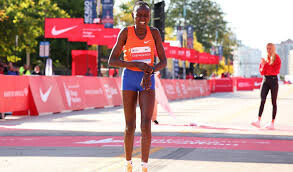
Chepng’etich, a two-time Chicago Marathon winner, returns to the Windy City with hopes of reclaiming her title.
She previously stunned the running world by clocking a phenomenal 2:14:18 in 2021, securing her a spot as the fourth fastest woman in marathon history.
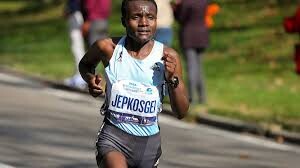
Despite her non-selection for the Paris Olympics, Chepng’etich's record speaks volumes about her resilience and prowess.
Her participation in Chicago marks a significant step as she aims for a hat-trick of wins in a city that has witnessed some of her greatest triumphs.
On the other hand, Joyciline Jepkosgei, the 2019 New York City Marathon champion and a seasoned competitor with a personal best of 2:16:24, is no stranger to the pressures of big city marathons.
With victories in both New York and London, Jepkosgei's strategic racing and endurance will be key assets as she navigates the Chicago course alongside Chepng’etich.
However, the Kenyan duo’s ambitions will be tested by strong Ethiopian contenders, including Sutume Kebede the reigning Tokyo Marathon champion with an impressive personal best of 2:15:55.
Kebede's entry adds a layer of intensity to the race, setting the stage for a gripping showdown among some of the world’s elite marathoners.
Further adding to the international flavor of this year's Chicago Marathon are other Kenyan runners like Mary Ngugi-Cooper, who posted a 2:20:22 at the 2022 London Marathon, and Stacey Ndiwa, who recently finished with a time of 2:25:29 in Los Angeles.
The American contingent is led by Keira D’Amato, who has a personal best of 2:19:12 and is transitioning from her 10th place finish in the 10,000m at the U.S. Olympic trials to her first marathon of the season.
Sara Hall and Emma Bates who have shown strong performances in past Chicago Marathons will also return aiming to capitalize on their familiarity with the course and local support.
by Festus Chuma
Login to leave a comment
Bank of America Chicago
Running the Bank of America Chicago Marathon is the pinnacle of achievement for elite athletes and everyday runners alike. On race day, runners from all 50 states and more than 100 countries will set out to accomplish a personal dream by reaching the finish line in Grant Park. The Bank of America Chicago Marathon is known for its flat and...
more...World champions to headline 2024 Chicago Marathon
As we inch toward the fall road racing season, the 2024 Chicago Marathon is the first Abbott World Marathon Major (AWMM) to announce its men’s and women’s elite list. Last year’s elite races in Chicago saw two course records and one world record set by the late Kelvin Kiptum—something that will be hard to beat. But the 2024 field does not lack talent or potential, with former world champion and fourth-fastest marathoner in history Ruth Chepngetich headlining the women’s field and world 10,000m silver medallist Daniel Ebenyo making his marathon debut in the men’s field.
The men’s race
Ebenyo has had a successful career on the track, winning multiple medals at World Championships and Commonwealth Games, but never individual gold. He is currently ranked by World Athletics as the top 10,000m runner in the world, holding a personal best of 26:57.80, which he set in 2023. The 28-year-old was not selected for the 10,000m by the Kenyan Olympic team for Paris 2024 after an eighth-place finish at the Kenyan Trials.
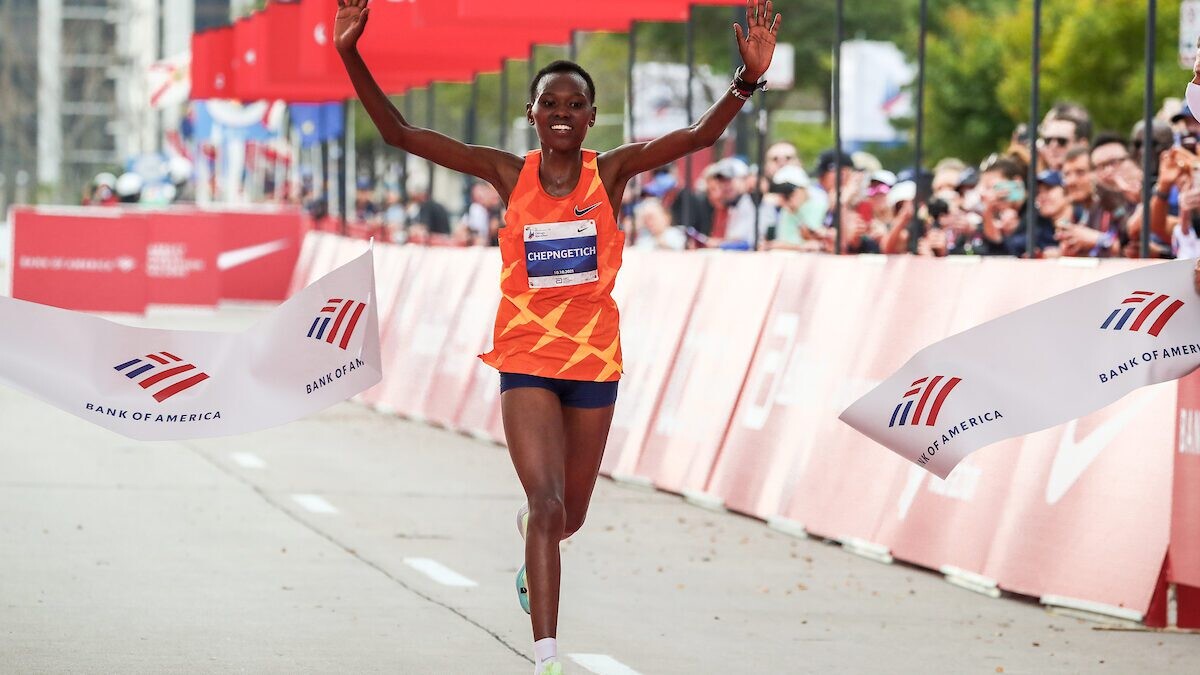
Although the Kenyan star has had success on the track, he has also flourished in his short career on the roads, winning silver in the half-marathon at the inaugural World Road Running Championships in Riga, Latvia. He holds a personal best of 59:04 for the half distance and a world best over 25 km (1:11:13).
Ebenyo’s potential over 42.2 km will be hard to predict; many people had high expectations for three-time world 10,000m champion Joshua Cheptegei of Uganda, but he struggled in his marathon debut last December in Valencia, clocking 2:08:59 for 37th place.
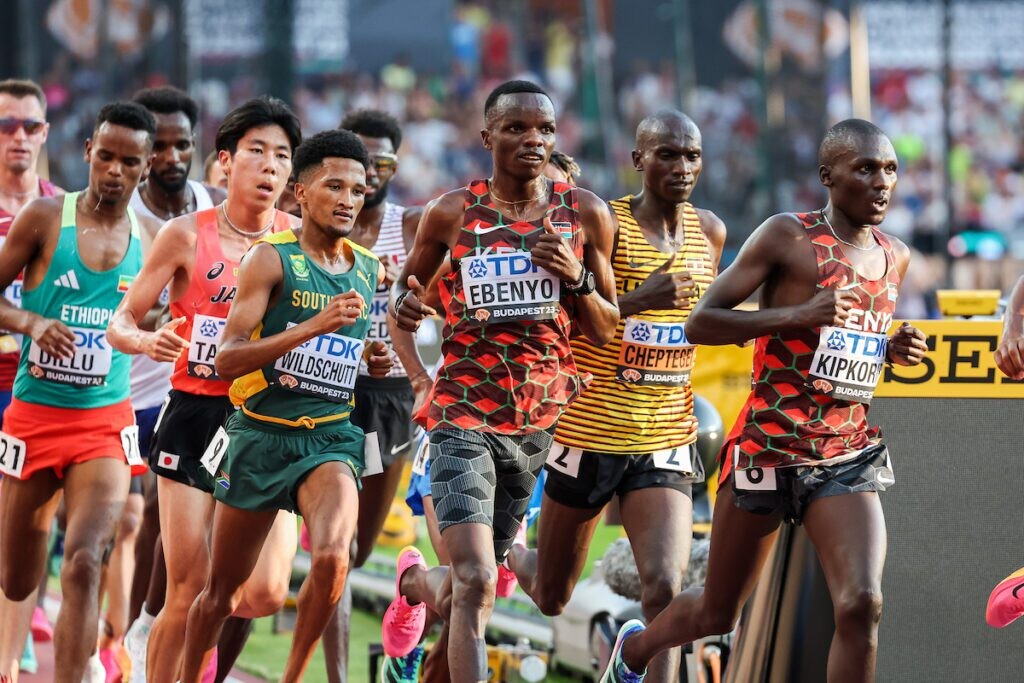
Joining Ebenyo in the men’s field is 2022 London Marathon champion Amos Kipruto, who has the fastest personal best in the field (2:03:13 from the 2022 Tokyo Marathon). Kipruto has podiumed at three of the six AWMMs and is known as one of the best tactical marathoners in the world. Chicago will be Kipruto’s first marathon since his seventh-place finish in Berlin last year.
The lone Canadian in the men’s field is Phil Parrot-Migas of London, Ont. This will be the third marathon of his career. He holds a personal best of 2:15:53, set in Hamburg in April.
The women’s field
At the 2022 Chicago Marathon, Chepngetich was on a world-record pace until the final kilometre, ultimately missing it by 14 seconds (2:14:18). This capped off her second-straight Chicago victory, following in the footsteps of her compatriot, Brigid Kosgei. Last year, Chepngetich was second to Sifan Hassan’s course record-setting run, in 2:15:37. Her personal best is the fastest in the field by a minute and a half, and with her experience on the flat and fast course, she’s going to be a tough athlete to beat come Oct. 13.
Besides Chepngetich, there’s a strong American contingent, consisting of three of the country’s top five fastest marathoners: Keira D’Amato, Sara Hall and Betsy Saina. D’Amato had a rough go at the 2024 U.S. Olympic Trials, and was unable to finish, due to injury. Months later, she announced a coaching change and a planned move to Utah to train under distance running guru Ed Eyestone, the coach of U.S. Olympic marathoners Conner Mantz and Clayton Young. D’Amato, who will turn 40 in October, told Runner’s World she made the switch because she wanted a different perspective on her training and a chance to learn from someone new.
Saina comes into the race as the strongest American athlete, placing in the top five of her last three marathons, including a win at the 2023 Sydney Marathon. Sydney is currently a candidate to be added as the seventh AWMM, joining Tokyo, Berlin, London, Boston, Chicago and NYC.
by Marley Dickison
Login to leave a comment
Bank of America Chicago
Running the Bank of America Chicago Marathon is the pinnacle of achievement for elite athletes and everyday runners alike. On race day, runners from all 50 states and more than 100 countries will set out to accomplish a personal dream by reaching the finish line in Grant Park. The Bank of America Chicago Marathon is known for its flat and...
more...Lokedi, Kiplagat and Chepkirui Headline New York Mini 10K Run
Three Kenyans headlined by Boston Marathon second finisher Sharon Lokedi are among the top athletes entered for the 2024 New York Mini 10K set for Saturday, June 8.
Veteran and consistent Edna Kiplagat as well as Sheila Chepkirui, who finished second at the 2023 Berlin Marathon.
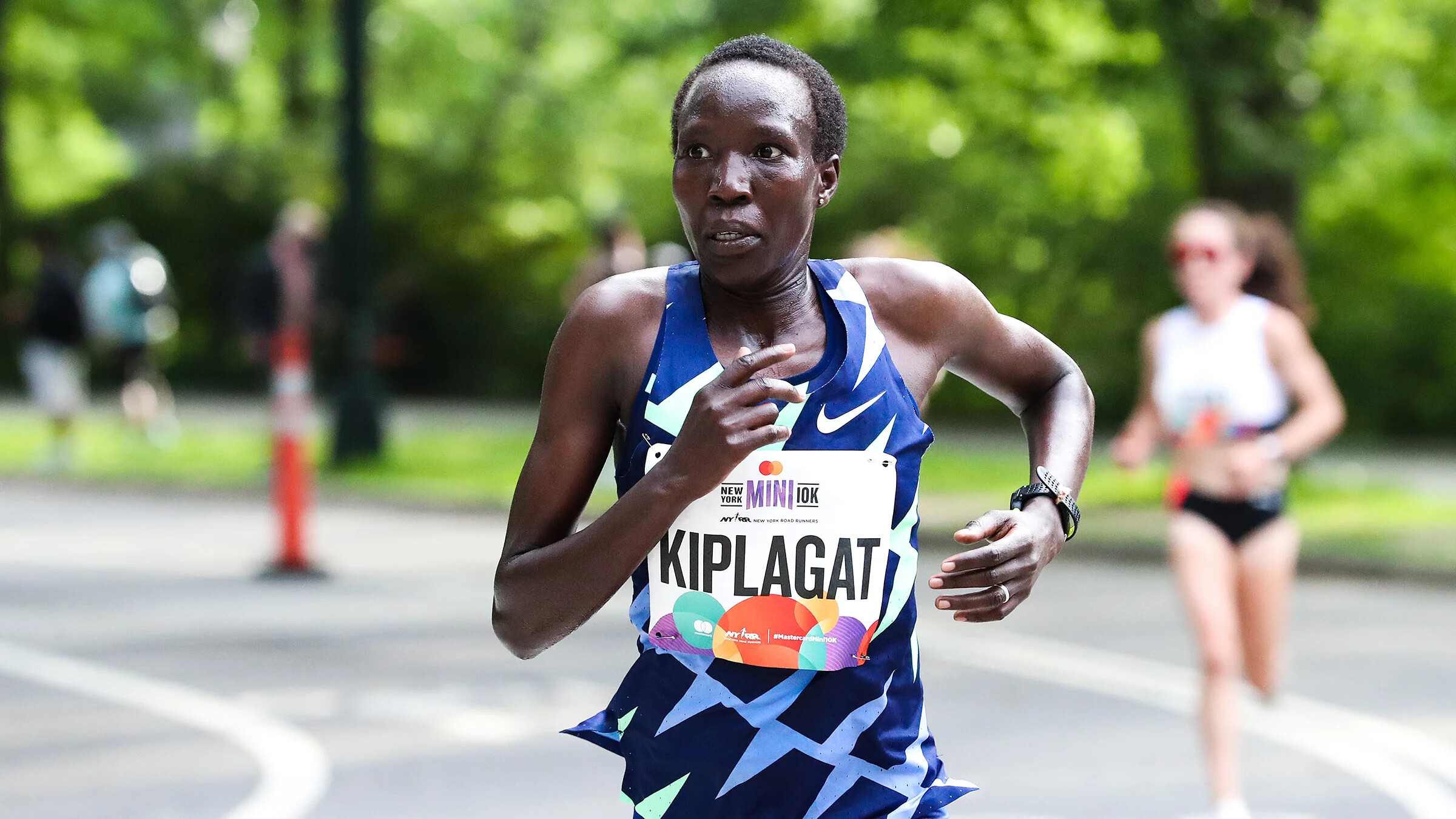
The race also features four past champions, five Paris 2024 Olympians, and seven of the top 10 finishers from the 2024 U.S. Olympic Marathon Trials.
Produced by the New York City-based nonprofit for more than five decades, the 52nd running of the event will also be competed by event-record holder and two-time race champion Senbere Teferi and two-time race champion Sara Hall, who will join the previously announced 2024 U.S. Olympic Women’s Marathon Team – Fiona O’Keeffe, Emily Sisson, and Dakotah Lindwurm – at the start line in Central Park.
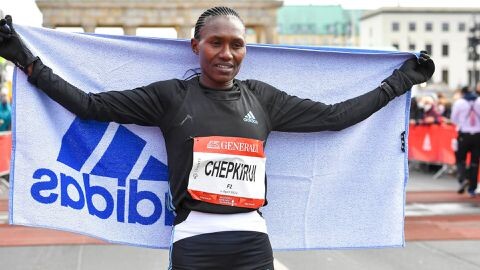
Teferi, a two-time Olympian and two-time World Championships medalist from Ethiopia, has won the last two editions of the New York Mini 10K, breaking the event record in 2023 with a time of 30:12.
Also, in New York, she won 2019 UAE Healthy Kidney 10K and in her 2022 United Airlines NYC Half victory recorded the second-fastest time in the history of the event.
“I’m very happy to return to New York for the Mini, and I will try my best to win the race for a third time,” Teferi said. “It is such a special race because there is a bond that exists with thousands of women also running. Even though we are not related, I feel supported like we are all sisters in running.”
Hall is a 10-time U.S. national champion who won the New York Mini 10K in 2021 and 2022. Earlier this year, she finished fifth at the U.S. Olympic Marathon Trials. She is also the former national record-holder in the half marathon and the only athlete in history to have won the New York Mini 10K, New Balance 5th Avenue Mile, and Abbott Dash to the Finish Line 5K in New York.
“It’s very cool that this year’s New York Mini 10K falls on the fifth anniversary of my first win at the race, and I can’t think of any place I’d rather be that weekend,” said Hall.
by Capital Sport
Login to leave a comment
New York Mini 10K
Join us for the NYRR New York Mini 10K, a race just for women. This race was made for you! It’s the world’s original women-only road race, founded in 1972 and named for the miniskirt, and it empowers women of all ages and fitness levels to be active and to look and feel great on the run. Every woman who...
more...U.S. Olympic Marathoners Will Race the Bolder Boulder 10K as a Pre-Paris Tune-Up
Conner Mantz, Clayton Young, and Leonard Korir will run in the International Pro Team Challenge on May 27.
Memorial Day is always an exceptional celebration for runners in Boulder, Colorado, but this year, it will have some extra special Olympic flair.
On Monday, May 27, more than 40,000 runners will run through the city that’s known for the iconic Flatirons rock formations, the Pearl Street pedestrian mall, and an exceptionally active population in the annual Bolder Boulder 10K. Now in its 44th year, it’s been one of the top road running races in the U.S. since its inception, and this year will serve as one of the final tune-ups for the men’s U.S. Olympic marathon squad before racing in the Paris Olympics later this summer.
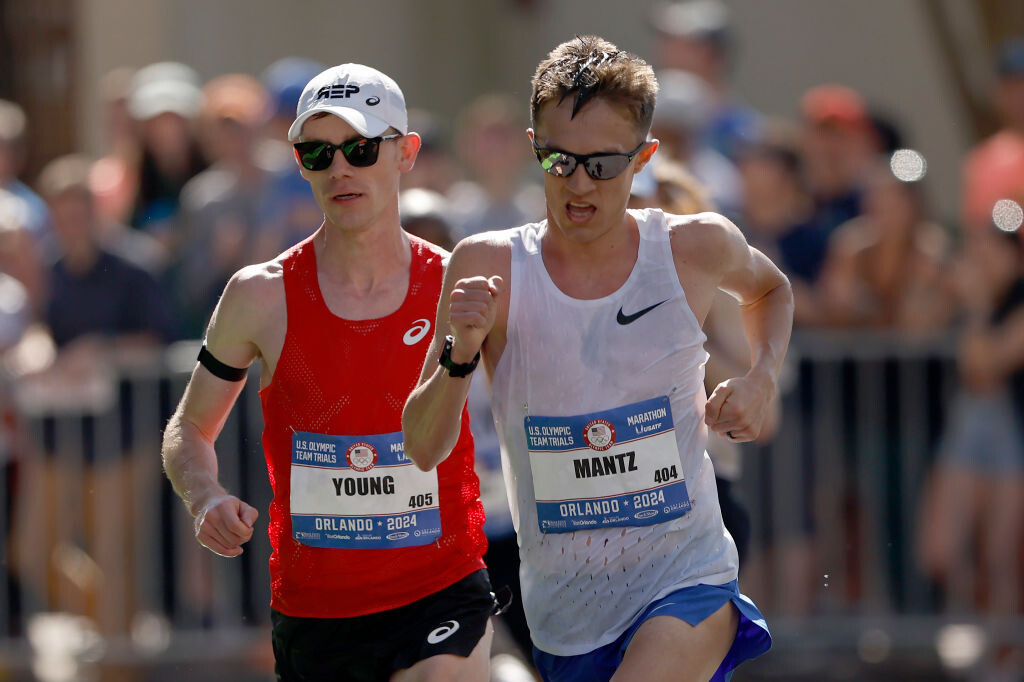
Conner Mantz, Clayton Young, and Leonard Korir, the top three finishers in the 2024 U.S. Olympic Trials who will be racing the marathon in the Paris Olympics on August 10, will be competing as Team USA Red in the Bolder Boulder’s International Pro Team Challenge that follows the citizen’s races. (Korir is expected to officially be named to the U.S. team in early May based on final pre-Olympic international rankings.)
The pro race, which has a prize purse of $83,700 before potential bonuses, is one of the things that makes the Bolder Boulder so unique. After all the runners in 98 citizen waves have completed the race, professional men’s and women’s international teams from more than a dozen countries compete on the same course for team and individual titles. The races feature a staggered start, with women beginning 15 minutes before the men so the winners of each race will finish about 10 minutes apart inside the University of Colorado’s Folsom Field football stadium.
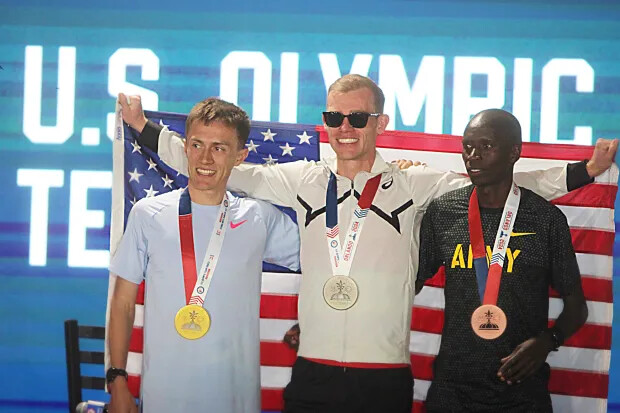
The finishing moments are among the thrilling spectacles in American running. By that point, the stadium is filled with a near-capacity crowd of roaring runners, family, and friends who have been watching the action play out on the massive video screens.
“The finish in the full stadium is like nothing else in the sport,” says Mantz, 27, who won the men’s race last year in 29:08 with a thrilling late-race surge to pass Kenya’s Alex Masai in the final 200 meters before the finish. “It was pretty electric. It took away all the pain you’re feeling mid-race. I was like, ‘Just race as hard as you can.’”
Team USA Red will have plenty of competition, from Team USA White, the secondary American team of Jared Ward, Futsum Zienasellassie, and Sam Chelanga, as well as teams from Kenya, Ethiopia, Mexico, and Rwanda. Teams are scored like a cross country race, with points awarded on the basis of finishing place, which means the team with the lowest combined score for all three runners is the winner. Ties are decided by the positions of the third-place finishers.
The women’s Team USA Red team will be led by defending champion Emily Durgin, along with Sara Hall and Boulder native Nell Rojas. Durgin finished ninth at the U.S. Olympic Trials in February and won the USATF 10 Mile Championships on April 7 in Washington D.C. At last year’s Bolder Boulder, she stormed to victory in 33:24, winning by 24 seconds over Kenya’s Daisy Kimeli.
Hall placed fifth in the U.S. Olympic Trials Marathon on February 3 in a U.S. master’s record (2:26:06) and 15th in the Boston Marathon on April 15. The women’s Team USA White roster will be composed of an all-University of Colorado alumnae squad—Makena Morley, Sara Vaughn, and Carrie Verdon.
“I can’t wait to be back in Boulder for the best day of the year,” says Durgin, 29, who will compete in the U.S. Olympic Trials 10,000 meters on the track in late June with the hopes of making the U.S. Olympic team. “Competing with Nell and Sara will make the experience even better.”
The women’s U.S. Olympic marathon team of Fionna O’Keefe, Emily Sisson, and Dakotah Lindwurm were invited to race in the Bolder Boulder but each runner declined, citing scheduling timing conflicts or a disinterest in racing at Boulder’s lofty altitude (5,430 feet). All of the runners who are racing for the U.S. teams in Boulder live at 4,500 feet or higher.
An Olympic Legacy
Boulder is known as one of the top running meccas in the U.S., in part because elite-level American and international runners have made it their training base since Olympic gold medalist Frank Shorter arrived in the early 1970s. Emma Coburn, Jenny Simpson, Yared Nuguse, Joe Klecker, Jake Riley, Hellen Obiri, and Edna Kiplagat are among the many top-level runners who are currently training in Boulder. Shorter, the 1972 marathon gold medalist, was a co-founder of Bolder Boulder 10K in 1979, and helped it grow into one of the country’s largest races.
Since then, numerous U.S. Olympians have raced in the Bolder Boulder, including Deena Kastor (a three-time women’s champion), Aliphine Tuliamuk (the 2022 women’s winner), Alan Culpepper, Elva Dyer, Ryan Hall, Abdi Abdirahman, Jorge Torres, Shalane Flanagan, Amy Cragg, Magdalena Boulet, and Libby Hickman, as well as Korir (who won it in 2022), and Ward (who was fourth in 2022).
Thanks to Boulder’s robust running community and the prestige of the race, the Bolder Boulder has also always featured fast sub-elite runners competing in the early citizen waves. Yet, the race has also celebrated dedicated middle-of-the-pack runners, as well as the first-time runners and walkers in the later waves. It was one of the first races to have bands playing along the course (as well as belly dancers and other entertainers), runners dressed up in costumes, elite wheelchair races, and in recent years, it has been known for a mid-race slip-and-slide and unofficial bacon aid station.
For the past 25 years, the Bolder Boulder has organized a special Memorial Day tribute—one of the largest in the country—that honors military veterans and new cadets.
The U.S. men’s Olympic marathon team competing in this year’s Bolder Boulder will be a legacy moment for the race, says Bolder Boulder race director Cliff Bosley.
“Having the three men that will represent our country in the marathon at this summer’s Paris Olympic Games is something we are extremely proud of,” Bosley says. “All three ran here last year, and to have them back is just incredible for the race, the city of Boulder, and the sport of running.”
by Brian Metzler
Login to leave a comment
How to Watch the 2024 Boston Marathon
The world’s oldest annual marathon is back for its 128th edition.
On Monday, April 15, the World Marathon Majors will return stateside to the 2024 Boston Marathon. In its 128th year, the world’s oldest annual marathon features must-see storylines, including the return of defending women’s champion Hellen Obiri and two-time men’s winner Evans Chebet.
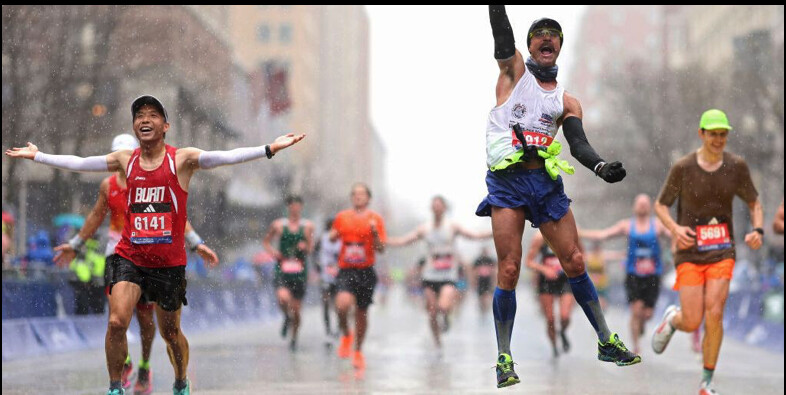
The point-to-point race is scheduled to begin in Hopkinton, Massachusetts, and ends in the Back Bay neighborhood of Boston. The weather forecast for Patriots’ Day is showing slightly warmer temperatures than average in the city. The conditions could make race day more challenging on a course famous for its hills (we ranked Boston as the second-toughest of the six World Marathon Majors).
Here’s everything you need to know about this year’s race.
How to watch the 2024 Boston Marathon
ESPN2 will broadcast the Boston Marathon from 8:30 a.m. ET to 12:30 p.m. ET. You can also live stream the race with an ESPN+ subscription, which costs $10.99 a month.
For those tuning in from Boston, live coverage will be provided by WCVB beginning at 4:00 a.m. ET and lasting throughout the day.
Boston Marathon start times (ET)
Men’s wheelchair division—9:02 a.m.
Women’s wheelchair division—9:05 a.m.
Men’s elite race—9:37 a.m.
Women’s elite race—9:47 a.m.
Para athletics division—9:50 a.m.
First wave—10 a.m.
Second wave—10:25 a.m.
Third wave—10:50 a.m.
Fourth wave—11:15 a.m.
Race preview
This year’s elite race comes with added high stakes for many international athletes. Countries that don’t host Olympic Trials for the marathon are currently in the national team selection process. A standout performance in Boston could be a game-changer for athletes looking to represent their country in Paris this summer.
Women’s race
On the women’s side, Boston podium contenders Hellen Obiri and Sharon Lokedi were included in the shortlist of marathoners under national team consideration by Athletics Kenya.
Obiri, 34, is set to return to Boston after a stellar 2023 campaign. Last year, the On Athletics Club runner won the Boston Marathon and the New York City Marathon. A former track standout with two world championship titles, Obiri aims to continue her winning streak on Monday.
Lokedi, 30, is looking to top the podium at a key moment in her career. The University of Kansas graduate is set to run her first 26.2 since finishing third at the New York City Marathon last fall—a race she won in her marathon debut two years ago.
Kenya will also be represented by 2022 World Championship silver medalist Judith Korir and two-time Boston Marathon champion Edna Kiplagat, among other standouts.
The Ethiopian contingent should be strong as well. Ababel Yeshaneh finished second at Boston in 2022 and fourth in 2023. Plus, 2:17 marathoner Tadu Teshome will be one to watch in her Boston debut.
In the weeks after the U.S. Olympic Marathon Trials in February, more Americans were added to the field. Sara Hall, 40, enters the race after finishing fifth in a new American masters record (2:26:06) at the Trials in Orlando, Florida. 2015 Boston champion Caroline Rotich, 39, joins the field after placing sixth at the Trials. Jenny Simpson, 37, also entered after dropping out in her marathon debut in Orlando. And keep an eye out for 2018 Boston Marathon champion Des Linden, 40, and Emma Bates, 31, who finished fifth in Boston last year.
Men’s race
Evans Chebet is looking for a hat trick. Last year, the Kenyan became the first athlete to repeat as men’s champion since Robert Kipkoech Cheruiyot won three in a row between 2006 and 2008. In the process, the 35-year-old took down two-time Olympic champion Eliud Kipchoge in Boston.
His biggest challenger will likely be Sisay Lemma of Ethiopia, who is returning after a breakthrough season in 2023. In December, Lemma, 33, won the Valencia Marathon in 2:01:48, making him the fourth-fastest marathoner in history. Lemma also won the Runkara International Half Marathon in 1:01:09, a new personal best.
Gabriel Geay, last year’s Boston runner-up, is returning to the field on Monday. The 27-year-old from Tanzania is coming off a fifth-place finish at the Valencia Marathon.
Other runners to watch include 2023 New York City runner-up Albert Korir; Shura Kitata, who placed third in New York last year; and Zouhair Talbi, who finished fifth in Boston last year.
The American men’s field also grew after the Olympic Trials with the addition of Elkanah Kibet and Sam Chelanga. Kibet finished fourth in Orlando in a 2:10:02 personal best, and after dropping out after mile 18 of the Trials, Chelanga will aim for redemption in Boston. They join 50K world record-holder CJ Albertson and the BAA’s Matt McDonald in the elite race.
by Runner’s World
Login to leave a comment
Sharon Lokedi: How the Kenyan marathon star is sketching her strategy for victory at Boston Marathon
Sharon Lokedi is aiming for victory at the Boston Marathon where she will be facing elite rivals.
2022 New York City Marathon champion Sharon Lokedi has rapidly ascended to the pinnacle of long-distance running with her sights firmly set on the 128th Boston Marathon.
Amidst a field brimming with talent, Lokedi's journey from her marathon debut to becoming a favorite in Boston illustrates not only her athletic prowess but also her unique approach to managing the pressures of elite competition.
"Before I get to a race, there’s so much tension and anxiety. I try to remain present," Lokedi shared as per Run.
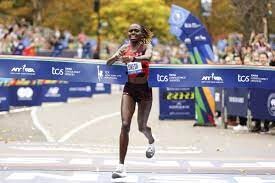
This practice, recommended by her sports psychologist in July 2023, has helped her maintain calm and focus, vital for someone whose career in running has been anything but typical.
Surprising herself and the athletic world, she clinched victory at her first marathon attempt in New York in 2022 with a time of 2:23:23, joining the ranks of debut winners in the storied race.
Despite facing an injury that sidelined her from the Boston Marathon last April she returned to the global marathon scene last November, securing a third-place finish in New York, a testament to her resilience and tenacity.
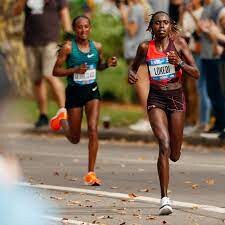
The 30-year-old Kenyan runner's story is a blend of innate talent and serendipity having never envisioned a professional career in athletics.
From her humble beginnings running at age 12 to training alongside Olympic champions in Kaptagat, Kenya, Lokedi's ascent in the sport is, by her own admission, "a miracle."
Training at altitudes close to 8,000 feet, Lokedi has pushed her limits, clocking upwards of 140 miles a week in preparation for Boston.
Under the guidance of her coach Haas, she has emphasized hill training, a crucial component for tackling the notoriously challenging Boston course.
"I think she’ll be in the mix," said Haas, highlighting Lokedi's diligent preparation and positive mindset.
Lokedi's connection to the running community, both in Kenya and her second home in Flagstaff, Arizona, has been a source of strength and inspiration.
The camaraderie she shares with competitors, including close friend and fellow Kenyan Hellen Obiri underscores a spirit of mutual respect and friendship that transcends rivalry.
"Racing with Sharon, it’s really good for me," Obiri remarked.
The Boston Marathon promises a historic showdown in the women's elite field, featuring luminaries such as Obiri, Tadu Teshome, Hiwot Gebremariam, and Edna Kiplagat, alongside promising American contenders like Emma Bates and Sara Hall.
"Sharon has been my good friend since 2019. She’s a lovely girl," Obiri added, highlighting the deep bonds formed between athletes at the highest levels of competition.
For Lokedi and Obiri, the Boston Marathon is not just another race, it is an opportunity to showcase their skills, support each other, and celebrate their friendship, irrespective of the outcome.
As she prepares to toe the line in Boston, her message is clear: "I know I’m strong. I want to come into the race knowing that anything is possible."
by Festus Chuma
Login to leave a comment
Boston Marathon
Among the nation’s oldest athletic clubs, the B.A.A. was established in 1887, and, in 1896, more than half of the U.S. Olympic Team at the first modern games was composed of B.A.A. club members. The Olympic Games provided the inspiration for the first Boston Marathon, which culminated the B.A.A. Games on April 19, 1897. John J. McDermott emerged from a...
more...Sara Hall after finishing 5th at the American marathon Olympic Trials
My heart is broken, but my love for this sport is unchanged. Man I missed doing that and loved being out there flying along again, flanked by an incredible group of women I love and respect so much.
Even when you come up short, there’s no better feeling than going all-in and all-out on something you love.
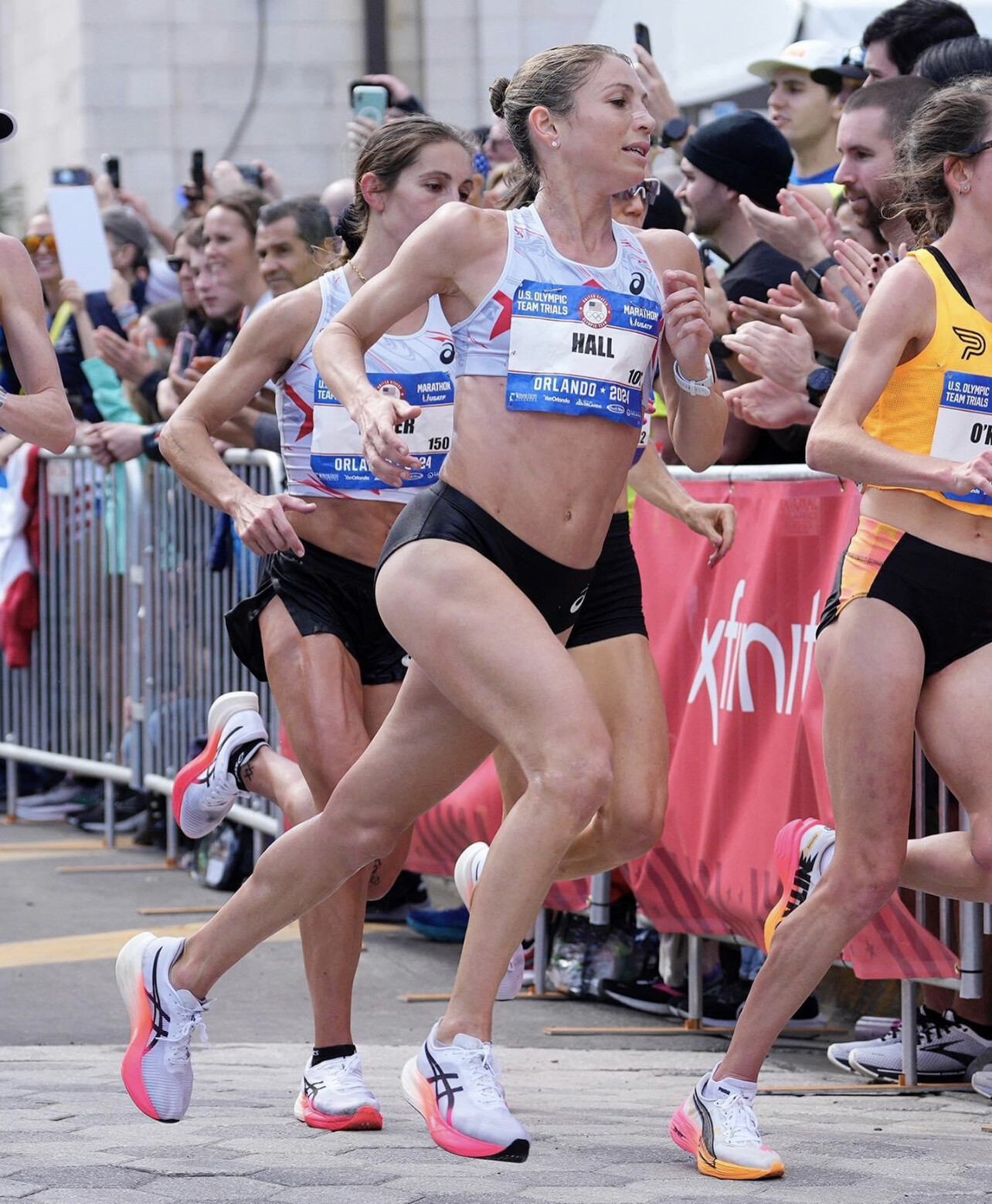
This one hurts more than any of the other 7, and yet I feel proud and have no regrets. Was in 3rd/could see 3rd the whole last lap as I battled through cramps. Never stopped believing, fought every step.
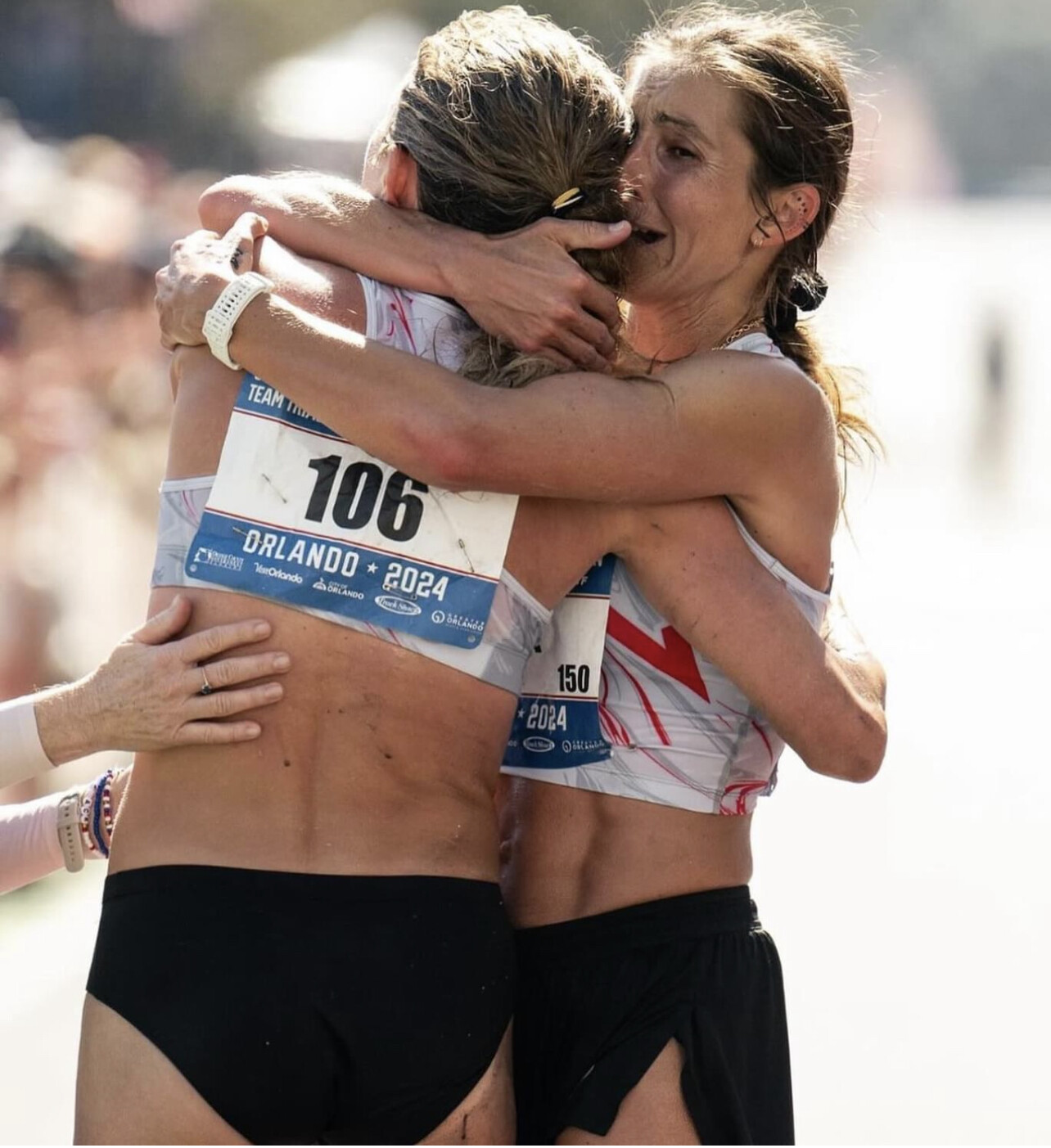
What a privilege to chase your dreams and have others believe in them with you. What incredible relationships I’ve made through this sport. I wouldn’t trade them for anything I’ve accomplished or could have accomplished.
Thanks for believing with me. The story continues.
Congratulations to our amazing team who are going to represent so amazingly in Paris!
by Sara Hall
Login to leave a comment
2028 US Olympic Trials Marathon
Most countries around the world use a selection committee to choose their Olympic Team Members, but not the USA. Prior to 1968, a series of races were used to select the USA Olympic Marathon team, but beginning in 1968 the format was changed to a single race on a single day with the top three finishers selected to be part...
more...These were the Fastest Shoes of the 2024 Olympic Marathon Trials
Asics, Puma, and Nike had a big day.
The city of Orlando witnessed some amazing performances under a blistering sun, with tickets to Paris at stake. When the dust settled after three loops, six brands placed among the top 10 men’s and women’s finishers. There was a time Nike ruled the roads, but Asics topped them in this year’s Olympic Trials Marathon, with two men and four women making my list below.
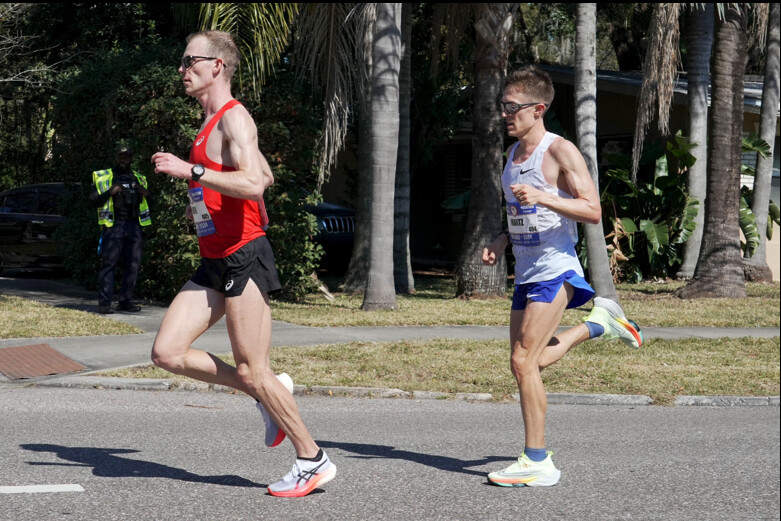
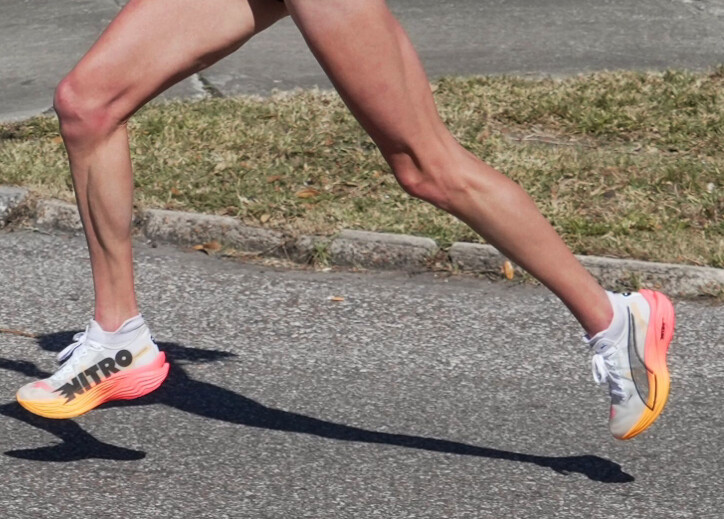
Here’s a look at what the top 10 finishers in both races wore in their quests for a spot on the Olympic team.
MEN’S TOP 10
1st — Conner Mantz, 2:09:05
Nike Air Zoom Alphafly Next% (v1)
Despite two updates to the Alphafly, Mantz (right in the image above) continues to wear the very first version. If it ain’t broke, don’t fix it.
2nd — Clayton Young, 2:09:06
Asics Metaspeed Sky 3 prototype
Young (left, above) looks to be wearing the newest, unreleased Metaspeed Sky. Asics has three “development” shoes (prototype) approved by World Athletics for use in competition, currently. This colorway looks a lot like the existing Metaspeed Sky+ and Edge+, but when we zoom in closer we don’t see any labels, and the sidewall of the midsole looks different than the shoe you can buy now.
3rd — Leonard Korir, 2:09:57
Nike Air Zoom Alphafly 3
Korir laced up the latest Alphafly and might just have run himself onto the squad headed for Paris. We reviewed the Alphafly 3 recently.
4th — Elkanah Kibet, 2:10:02
Asics Metaspeed Edge 3 prototype
Kibet is wearing a prototype, like Young. His, however, appears to be the Metaspeed Edge. You can see the ridge on the sidewall of the forefoot swoops down low toward the sole of the shoe. The Edge’s plate curves lower, allowing for more foam between your foot and the plate than in the Sky.
5th — CJ Albertson, 2:10:07
Brooks Hyperion Elite 4 prototype
It looks like CJ is wearing Brooks’s top racing shoe, which was just announced. But, the company also has a “Hyperion Elite 4 RD.010” prototype shoe that was approved by World Athletics for use in competition just two weeks ago. It’s likely he wore that version (we don’t have details yet) but the outsole of CJ’s race shoe has gray rubber, whereas the newly announced version has a web of black and orange rubber.
6th — Zach Panning, 2:10:50
Brooks Hyperion Elite 4 prototype
Panning seems to be wearing the same prototype of the Hyperion Elite 4 that CJ wore.
7th — Nathan Martin, 2:11:00
Nike Air Zoom Alphafly 3
8th — Josh Izewski, 2:11:09
Nike Air Zoom Alphafly 3
9th — Reed Fischer, 2:11:34
Adidas Adizero Adios Pro 3
Fischer rolled to a top-10 finish with an all-white version of the Adios Pro 3. Adidas does not have any prototypes on the list of approved shoes as of race day.
10th — Colin Bennie, 2:12:17
Brooks Hyperion Elite 4 prototype
Bennie seems to be wearing the same prototype as Albertson and Panning.
WOMEN’S TOP 10
1st — Fiona O’Keeffe, 2:22:10
Puma Deviate Nitro Elite 3
Not a bad first effort for O’Keeffe and Puma. Fiona won her first marathon in record fashion. And Puma claimed victory with the Deviate Elite 3 on the first day it was approved for use in competition. The World Athletics approved shoe list shows the 3 green lighted for use as a “development” as of Feb. 3, 2024.
2nd — Emily Sisson, 2:22:42
New Balance FuelCell SuperComp Pacer
New Balance has a new super shoe, the FuelCell SuperComp Elite v4, out. But Sisson laced up the thinner, lighter Pacer. It’s a shoe most of us recreational runners might only grab for a 5K or 10K (maybe). Seems like it’s working just fine for the American record holder.
3rd — Dakotah Lindwurm, 2:25:31
Puma Deviate Nitro Elite 3
Lindwurm also wore the new Puma racer. Hey, Puma, need me to re-send my address?
4th — Jessica McClain, 2:25:46
Nike Vaporfly 3
This marks an insane shift in racing footwear. On the men’s side, four of the top 10 runners laced up Nike. Only McClain, the team’s first alternate, cracked the top 10 women’s runners wearing the swoosh. Folks, we’re living in the golden age of running shoes. Pick the pair that fits and feels best—and rip it.
5th — Sara Hall, 2:26:06
Asics Metaspeed Edge 3 prototype
Like Kibet, it appears Hall wore the Metaspeed Edge prototype.
6th — Caroline Rotich, 2:26:10
Asics Metaspeed Edge+
Unlike Hall, Kibet, and Young, Rotich’s shoe seems to be the current Metaspeed Edge+ that you can buy right now.
7th — Makenna Myler, 2:26:14
Asics Metaspeed Sky 3 prototype
Myler is likely wearing the Sky 3 prototype—again, check out that ridge in the forefoot; it’s closer to the foot. One heck of a day for Asics, if I do say so.
8th — Lindsay Flanagan, 2:26:25
Asics Metaspeed Edge 3 prototype
N + 1.
9th — Emily Durgin, 2:27:56
Adidas Adizero Adios Pro 3
Durgin held onto a top-10 finish wearing Adidas’s most popular marathon racer.
10th — Annie Frisbie, 2:27:56
Puma Deviate Nitro Elite 3
Asics packed four runners in the top 10, but Frisbie finished strong to give Puma a triumphant trio, all wearing the new Deviate Elite 3.
by Runner’s World
Login to leave a comment
Molly Seidel withdraws from Olympic Marathon Trials due to injury
Tokyo Olympic bronze medalist Molly Seidel announced she is withdrawing from Saturday’s U.S. marathon trials for the Paris Games due to a knee injury.
Seidel, 29, said in a video posted Thursday that she suffered a knee injury a month ago, couldn’t run on it and got an MRI that revealed a broken patella and a partially torn patella tendon.
“I have done everything in my power over this last month to try and get myself to the (starting) line,” she said. “I’ve had just the most incredible physios and doctors doing everything in their power to help me. I’ve been cross-training my (butt) off, but ultimately I got to this week, and my knee had not healed up enough, and I knew that I could not race a marathon hard on it in its current state without really, really injuring myself.”
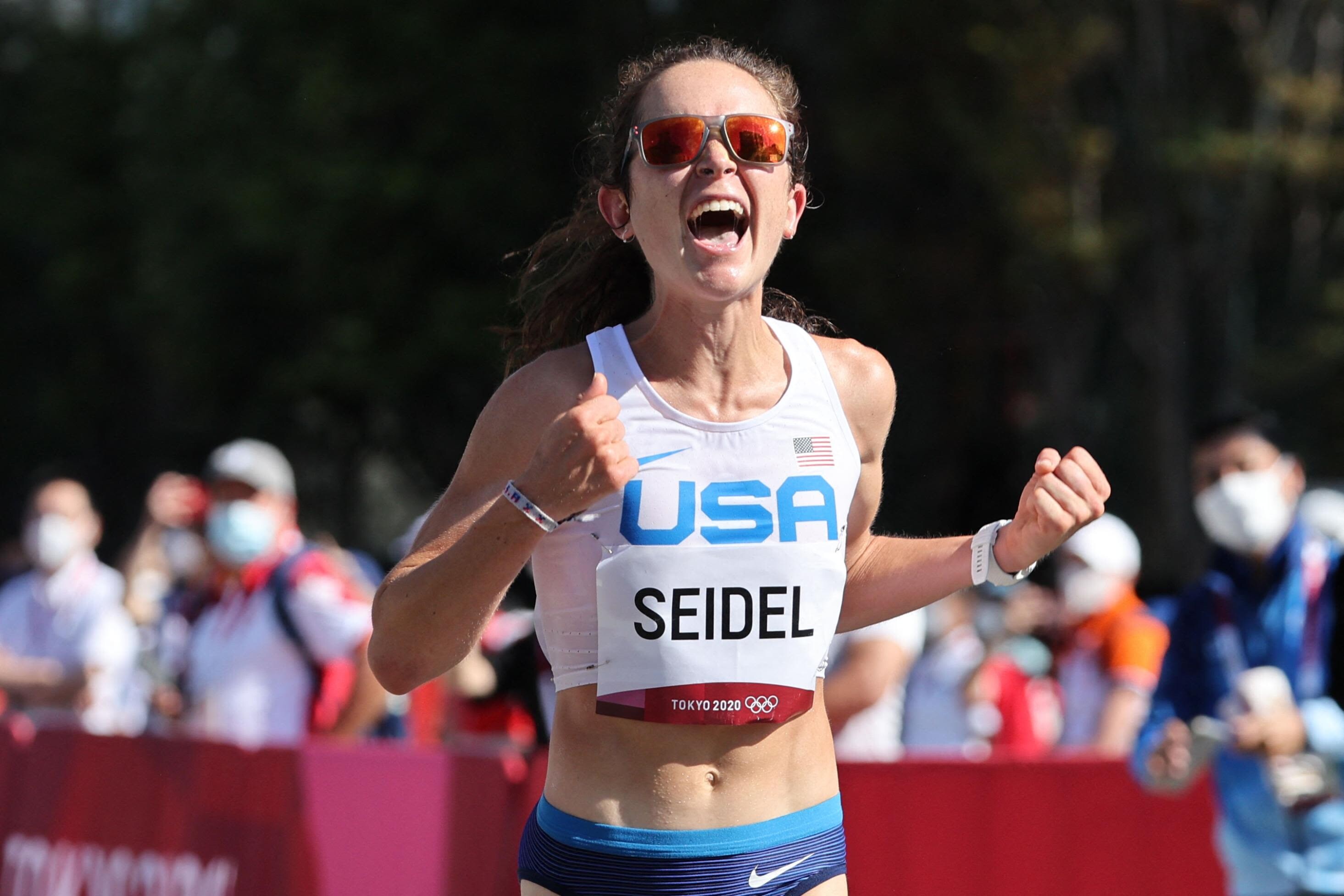
The trials are Saturday at 10 a.m. ET from Orlando, airing live on Peacock with coverage on NBC, NBCSports.com and the NBC Sports app at noon.
Four years ago, Seidel placed second in the trials in her marathon debut to make the three-woman Olympic team.
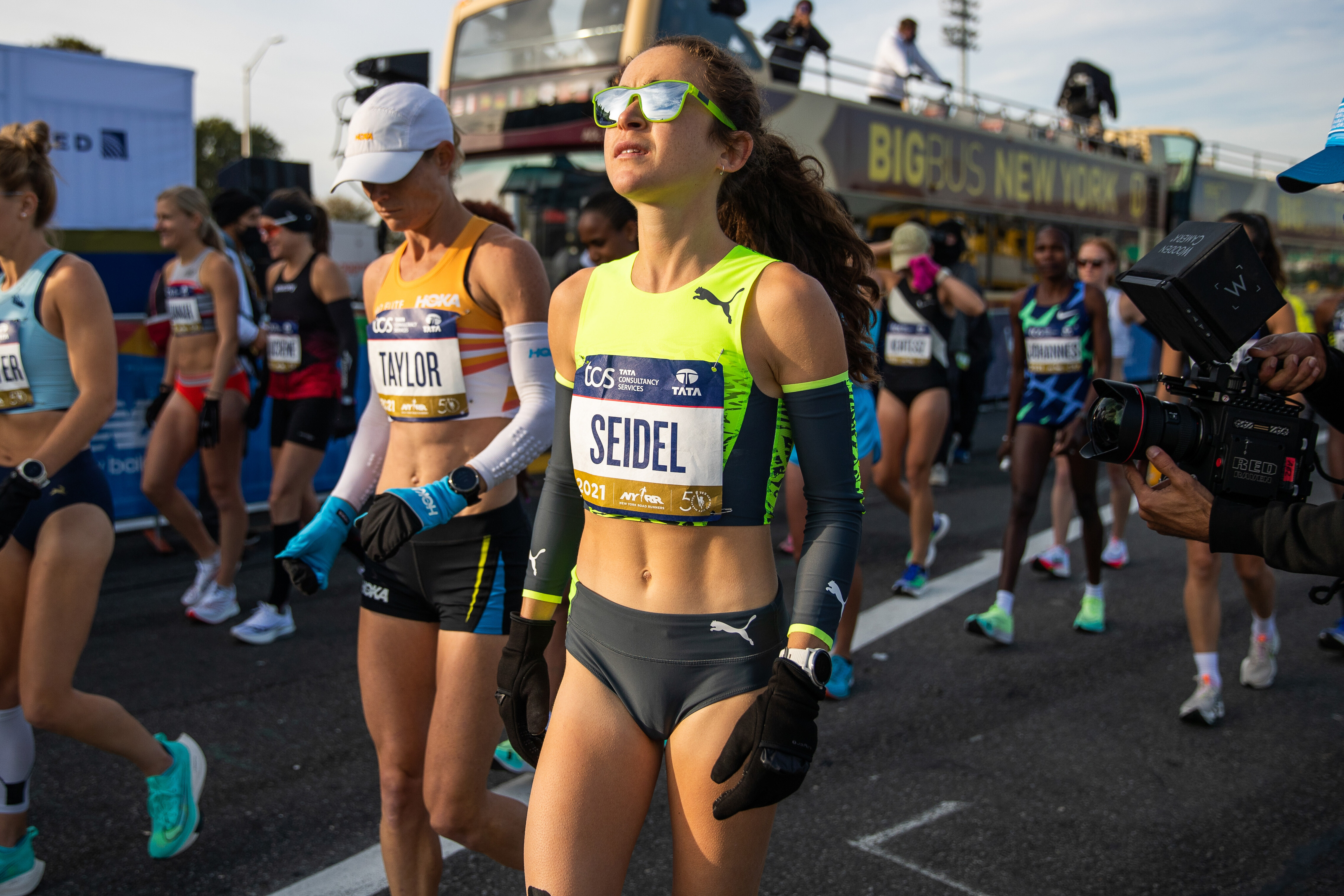
After the COVID-19 pandemic postponed the Tokyo Games by one year, Seidel finished third in the Olympic marathon held in Sapporo.
She became the third U.S. woman to win a marathon medal after Joan Benoit Samuelson, who won the first Olympic women’s marathon in 1984, and Deena Kastor, the 2004 bronze medalist.
After Tokyo, Seidel dealt with a hip injury and anemia, plus took time to focus on mental health after an eating disorder relapse.
Then last Oct. 8, Seidel finished a 26.2-mile race for the first time in two years. She was the second-fastest American woman at the Chicago Marathon, running a personal best and re-establishing herself as a prime candidate to make the Paris team of three at trials.
Seidel is the second contender to withdraw in the lead-up to trials.
Emma Bates, the third-fastest U.S. female marathoner of 2023, bowed out Jan. 7, saying then, “There’s just not enough time to be where I need to be.”
The field still includes three of the four fastest American women in history — American record holder Emily Sisson, former American record holder Keira D’Amato and Sara Hall, No. 4 on the all-time list.
Plus, former Iowa State teammates Betsy Saina (the fastest American in 2023) and Aliphine Tuliamuk (Tokyo Olympic Trials winner).
by Olympic Talk
Login to leave a comment
2028 US Olympic Trials Marathon
Most countries around the world use a selection committee to choose their Olympic Team Members, but not the USA. Prior to 1968, a series of races were used to select the USA Olympic Marathon team, but beginning in 1968 the format was changed to a single race on a single day with the top three finishers selected to be part...
more...For Betsy Saina, the U.S. Olympic Trials Marathon Presents a Chance to Represent Her Son
For much of last year, Betsy Saina had a plan. She would race the Chicago Marathon in October, eager to run alongside Emma Bates (who placed fifth at last year’s Boston Marathon in a new personal best of 2:22:10) in pursuit of breaking Emily Sisson’s American record of 2:18:29, set the previous year at that same race.
Saina, 35, a naturalized U.S. citizen who represented Kenya in the 2016 Olympics in Rio de Janeiro—she placed fifth in the 10,000 meters 30:07.78—had reason to be confident. Last spring, she set a new personal best of 2:21:40 with her fifth-place finish at the Tokyo Marathon, which wound up being the fastest marathon by an American woman in 2023 and made her the eighth-fastest U.S. female marathoner of all-time, solidifying her position as a top U.S. Olympic marathon team contender.
The Chicago Marathon had assured Saina’s agent, Tom Broadbent, that she was in for the race. But when the elite field was announced in August, Saina learned she had not been accepted, which not only threw a wrench in her fall training plans, but made for a lot of stress as she was planning her U.S. Olympic Marathon Team Trials buildup.
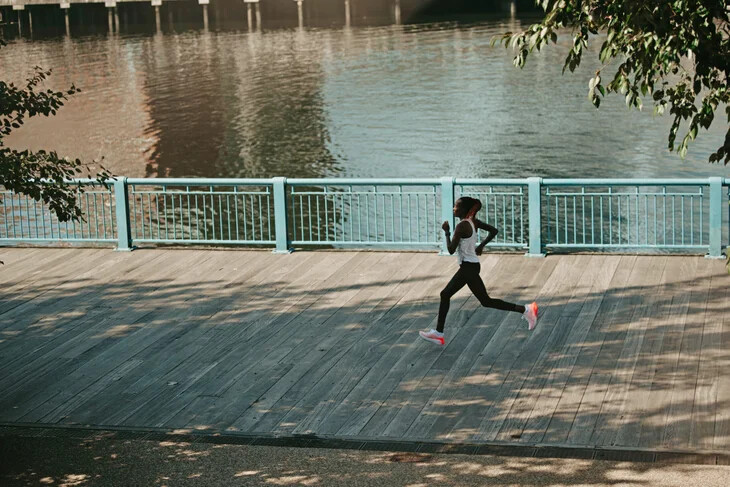
“I was shocked and spent three days looking at myself and trying to find any mistakes I made to not make the field, especially after running 2:21 in Tokyo,” Saina says. “I had never been rejected from a race before, and never got a response or an explanation as to why I didn’t make it. Being denied to run in Chicago honestly was one of the most disappointing things I’ve experienced in my career.”
Saina looked into entering the Berlin Marathon the following month, but had no such luck getting in with it being so late in the game. She was ultimately accepted into the Sydney Marathon (which shares its sponsor, ASICS, with Saina) on September 16. Unlike Chicago—with its fast, flat course that ended up having ideal racing conditions with temperatures in the 40s—Sydney has a hilly course and race-day weather was on the hotter side, with a starting temperature of 68 degrees.
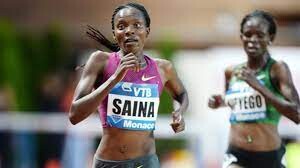
Despite the conditions, Saina proved herself once again, winning the race in 2:26:47. This sealed her confidence as she began to look ahead to the Olympic Trials in Orlando on February 3. If she’s one of the top three finishers in the women’s race in Florida, she’ll earn a spot on the U.S. team that will compete in the marathon at the Paris Olympics on August 11.
“Challenges make people strong, and running a good marathon on a harder course made me come back feeling motivated,” she says. “[Even though it wasn’t the faster time I originally wanted], it didn’t stop me from being a better version of myself.”
Transcendent Transplant
Despite her impressive performances in 2023, Saina has remained largely under the radar in terms of media coverage and fan predictions leading up to the Trials in Orlando, similarly to what fellow Kenyan-born marathoners Aliphine Tuliamuk and Sally Kipyego (both of whom made the last Olympic marathon team) experienced in 2020. The lack of attention relative to her competitors hasn’t fazed Saina, however.
“I know how to deal with pressure, having been in the sport since 2013, so as long as my training is going well, I don’t pay too much attention to what people say,” Saina says. “I’m just more excited to see many of the U.S. women [who are also] my friends, like Emily Sisson, Sara Hall, and Keira D’Amato, and to be racing so many amazing U.S. athletes for the first time.”
Saina’s result in Tokyo was only about a minute faster than her debut at the distance at the 2018 Paris Marathon, which she won in 2:22:56 (after dropping out of the 2017 Tokyo and New York City Marathons). It was also a confidence boost for Saina because it was also her first marathon since giving birth to her son, Kalya, now two, in December 2021, after previously running 2:22:43 and 2:31:51 at the 2019 Toronto Waterfront and Honolulu Marathons, respectively.
Saina—who originally came to the U.S. to attend Iowa State University where she trained alongside Tuliamuk and was a three-time individual NCAA champion and 11-time NCAA All-American—has remained in her hometown of Iten, Kenya, for the majority of the time since having her son, as her husband, Meshack Korir, is a doctor completing his postgraduate education there.
Although Saina became a U.S. citizen in late 2020 and has a home base in Colorado Springs, she made the decision to return to Kenya to have additional family support and childcare as she worked to come back from pregnancy and childbirth to prepare for the Olympic Trials, which she’ll return for just a few days before the race. Saina also keeps busy managing a couple of guesthouses, which she regularly rents out to visiting athletes and tourists. She also works with Cross World Africa, a nonprofit that sponsors underprivileged children in pursuing secondary and higher education.
“Before I came from Kenya, my family was struggling and we had to fundraise for my flight ticket to come to the U.S. Being here has changed my family in a different way—I have two sisters who are now nurses in the U.S., and my parents can now more easily fly to visit us, and while it is not where I began running, the U.S. where I began competing at such a high level,” she says. “My son also gives me so much motivation and is my inspiration. When I see him, I see beauty in myself and see myself getting better when I’m running. So I am excited both to compete and represent my son, and to hopefully wear the U.S. uniform because it has so much meaning for me.”
Back in Iten, Saina has been training in a group with personal pacemakers alongside 2019 New York City Marathon champion Joyciline Jepkosgei, which she describes as game-changing for her progress in the marathon. Both Saina and Jepkosgei, who is also the former world-record holder in the half marathon and Saina’s best friend from high school, are coached by Jepkosgei’s husband, Nicholas Koech.
“Sometimes you will train with people who don’t want to help someone else get better, but [Jepkosgei], who has run 1:04 [in the half marathon] and 2:17 [in the marathon] is unique in that she has sacrificed a lot, which I don’t think a lot of women will ever do for each other, and I don’t think I would either,” Saina says. “But she has been pushing me a lot since the first day I joined her, and I think that’s the reason I came back and I’ve had better races. I have someone to chase and it’s like competition in training, but in a good way.”
American Original
Saina returned to the U.S. twice last year, to race the USATF 25K Championships in Grand Rapids, Michigan, (where she took the win in 1:24:32 for her first U.S. title, narrowly beating D’Amato) and to be inducted into Iowa State’s Athletics Hall of Fame in September. Saina had planned to do some shorter U.S. races, including the Bolder Boulder 10K in May and the NYRR Mini 10K in June, following her national championship title in the 25K. However, she ultimately decided she couldn’t bear to be away from her son any longer.
“As a mom, when you’re away, you are so worried because you’re like, ‘How is he doing right now? How can I handle the pressure, being away from him?’” Saina says. “This year, it’s really different for me because the only race I want to travel to without Kalya is the Olympic Trials. He is growing now and getting better, so I want to travel with him afterward to compete in the USATF circuit. That’s the biggest goal for 2024, to travel with my son.”
Later this year, Saina hopes to also run the April 7 Cherry Blossom 10-Miler in Washington, D.C., the Mini 10K on June 8 in New York City, and a fast spring half marathon to pursue the current American record (which was broken yet again by Weini Kelati on January 14 in Houston), before running another marathon in the fall. In the meantime, she noted that she is especially eager to compete in one of the deepest fields ever assembled for the Trials.
Although Bates withdrew from the Trials, Saina figures to be one of the favorites in Orlando along with Sisson, Hall, Tuliamuk, D’Amato, and Seidel. However, Lindsay Flanagan (ninth in last summer’s world championships), Sara Vaughn, Susanna Sullivan, Gabriella Rooker, Dakotah Lindwurm, and Nell Rojas are all sub-2:25 marathoners, and thus top contenders, too.
“The U.S. is no longer small and non-competitive. Look at Molly Seidel. She got bronze at the Tokyo Olympics, and I remember when Amy [Cragg] was a bronze medalist at the 2017 World Championships. If you put that in perspective, it has changed even more right now compared to that time,” she says. “The competition [to make the U.S. team] is no longer as easy as the way some people [thought], and I’m super excited to be competing with a lot of solid women. There is no difference between the U.S. and other countries right now—it’s not just to go compete at the Olympics; they’re going to compete for the medals, just like other countries.”
by Emilia Benton
Login to leave a comment
2028 US Olympic Trials Marathon
Most countries around the world use a selection committee to choose their Olympic Team Members, but not the USA. Prior to 1968, a series of races were used to select the USA Olympic Marathon team, but beginning in 1968 the format was changed to a single race on a single day with the top three finishers selected to be part...
more...Orlando Unveils 2024 US Olympic Marathon Trials Course, Announces Races Will Start at 12:10 and 12:20 pm ET
Just over six months out from race day, organizers revealed the course for the 2024 U.S. Olympic Team Trials – Marathon on Tuesday morning. The race, which will be held on February 3, 2024, in Orlando, Fla., will consist of one 2.2-mile loop through the downtown business district and three 8-mile loops through the city’s Milk District — so-called because it features the headquarters of T.G. Lee Dairy, which has been based in the area for 98 years. It will start and finish at the Walt Disney Amphitheater at Lake Eola Park. None of the course will run through Disney World, which is located to the southeast of the city of Orlando.
Unlike the Paris Olympic marathon course, which features considerable climbing and descending during the middle of the race, the Orlando course is relatively flat, with few small inclines but a variation of just 38 feet (11.6 meters) between the course’s lowest and highest points.
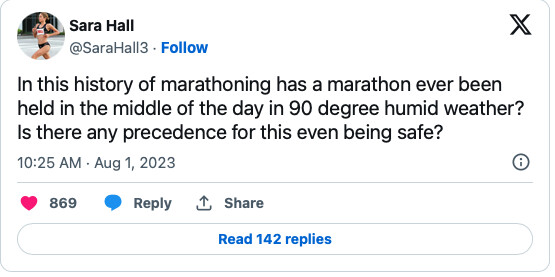
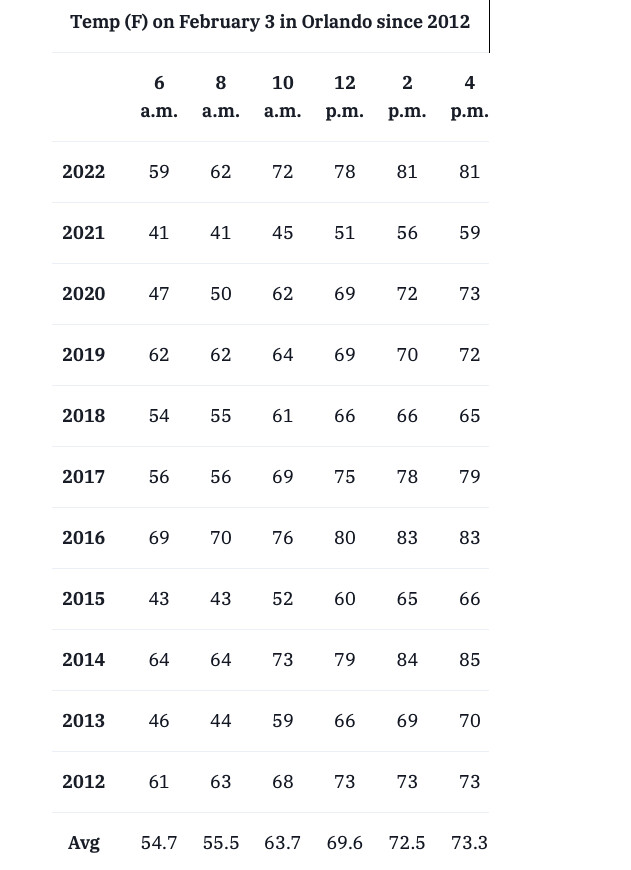
Mid-Day Start Time
Getting the actual course layout is nice but not that significant. We knew the course was going to be mostly flat as Orlando is mostly flat.
Organizers also announced something more significant: the start times for the race. The men will begin at 12:10 p.m. ET with the women to follow at 12:20 p.m. ET. Both races will be shown in their entirety on NBC.
With basically a noon start in Florida, it’s possible the race could be run in quite warm conditions. The debate of the once-rumored but now confirmed 12ish start times has been intense on the LRC forums for over a month now.
A couple of Trials veterans have already shared their thoughts, with Sara Halland Des Linden offering contrasting viewpoints. Hall, who is known to not like racing in hot weather, expressed concern about the heat and the safety of the athletes. She even challenged USATF CEO Max Siegel to run a hot weather marathon this summer.
It must be noted that Orlando has not seen a 90-degree day in February since 1962.
Meanwhile, two-time Olympian Linden had no issue with the start time and thought it could boost her chances of making the team by running smart.
For those interested in what the weather is typically like in Orlando on February 3, here’s a look at the temperature, wind, and dew point at specific times from 2012-22.
If the goal of the Olympic Marathon Trials was for every athlete to run their fastest possible race, obviously it would be better to start the race earlier, but there are other concerns. Television is the reason why the race is being held in the afternoon (there’s not a huge amount of West Coasters watching TV at 5 or 6 a.m. on a Saturday). The 2016 Trials began at 1:06 p.m. ET (10:06 a.m. local in Los Angeles) while the 2020 Trials in Atlanta began at 12:08 p.m. ET. Both races were shown on NBC in their entirety.
The fact is, in professional sports, there are often competing interests — what’s best for the athletes isn’t always what’s best for TV, and someone is going to be unhappy. USATF designed its US championships schedule this year with athletes in mind but the result was that USATF could not get the US outdoor championships shown on NBC. With the Trials, USATF is prioritizing the broadcast on NBC with the athletes a secondary consideration. You can be mad about one of those two things, but not both.
Orlando can be warm in February, no doubt about it — from 2012-22, the average temperature at 2 p.m. on February 3 was 73 degrees. But guess which race also is warm? The Olympic marathon. The Olympic marathons will be held on July 10-11, 2024. On July 10-11 this year, it was 73 degreees at 10 a.m. in Paris, which is when the marathons would be nearing their completion (8 a.m. start times).
In general, we are for athletics to be on live TV so we are fine with the races being scheduled for 12:10 and 12:20. We do believe if the temperatures are truly extreme (say 75 or higher at the start, certainly 80), USATF should move the race up and show it on tape-delay. But if you’re looking for conditions that mirror the Olympic marathon, Orlando in February is not a bad facsimile.
The one big issue we still have is with the new Olympic qualifying system. If you haven’t run under 2:11:30 for the men or 2:29:30 for the women during the qualifying window, you aren’t going to the Olympics even if you are in the top three. We think that’s ridiculous but those are the rules. That’s tough to do in warm weather. While it’s very unlikely someone who hasn’t run at least 2:11:30 or 2:29:30 in the window finishes top three, it could happen in the case of someone just moving up the marathon like Molly Seidel did in 2020 or someone coming back from injury or maternity leave like Kellyn Taylor.
We really wish WA would simply accept the top three from the Trials since the US is sending three per gender most likely no matter what happens, but we’d rather take the small risk that someone without the 2:11:30/2:29:30 times is top three and have the race be on live TV than put it early in the morning. Plus athletes could chase the time up until April 30 and we’d love to see WA have to take the PR hit of someone on the way back from maternity leave having to run a time. Maybe it would finally make them let the spots go to countries as long as the countries hold legitimate trials.
(To cover all our bases, it’s worth noting there’s a small chance on the men’s side that the US has only one or two qualified men’s athletes at the start of the Trials. We’re pretty sure we’ll have at least three but it’s not set in stone and we won’t know for sure until after the fall marathon season is over. If that’s the case, then the start time is more problematic as the US men would either have to hit the 2:08:10 auto standard or run fast enough to raise their world ranking into a qualification spot. If that’s the case and the US men don’t have three spots guaranteed, we think the men’s start time should be moved up and shown on tape delay but keep the women’s race as scheduled).
Talk about the trials on our forum:
by Let’s Run
Login to leave a comment
Ethiopians Jemal Yimer (60:42) and Sutume Kebede (64:37) won the overall titles in Houston Half
In what is becoming an annual tradition, Weini Kelati ran 66:25 on Sunday to break the American record at the 2024 Aramco Houston Half Marathon. It was the third straight year the record was broken in Houston as the 27-year-old Kelati, making her half marathon debut, followed in the footsteps of Sara Hall (67:15 in 2022) and Emily Sisson (66:52 in 2023) to become a record-breaker in Houston. Sunday marked the third time the record had been broken in the past year as Keira D’Amatolowered Sisson’s record to 66:39 at the Asics Half Marathon in Australia in July.
Kelati finished 4th overall as Ethiopia’s Sutume Kebede, a late addition to the women’s field, upset Hellen Obiri to win in 64:37, a US all-comers record that moves her into a tie for 9th on the all-time list. The time was a pb of more than three minutes for Kebede, who was previously best known for finishing 3rd at the 2020 Tokyo Marathon and running 2:18:12 at the 2022 Seoul Marathon. Obiri, who was with Kebede through 10k (30:28) faded over the second half and wound up a distant 2nd in 66:07.
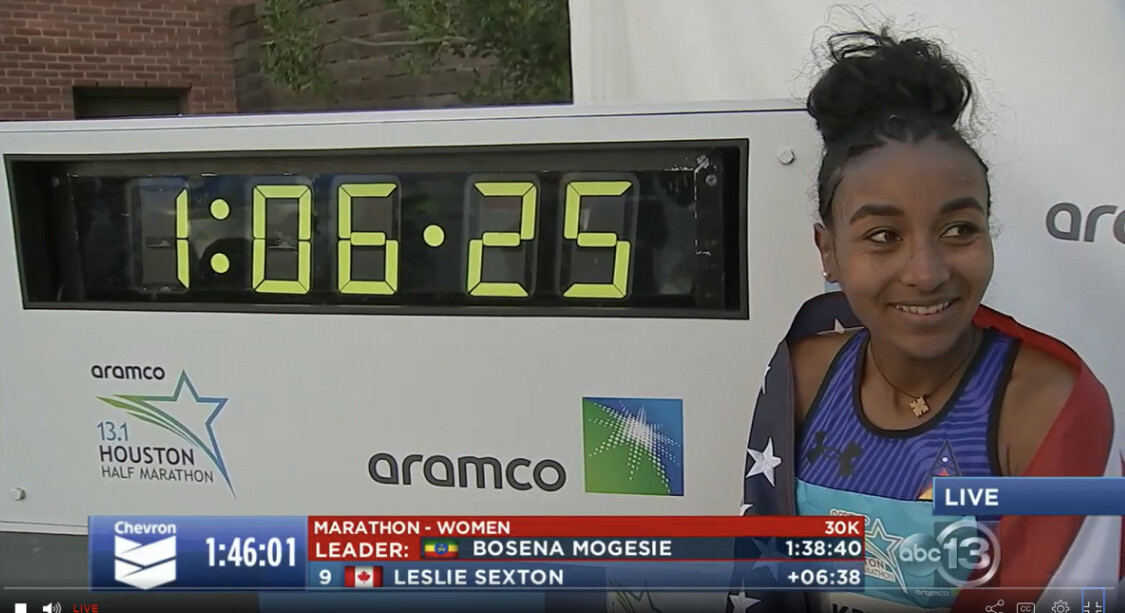
The men’s race came down to a five-man sprint finish with Ethiopia’s Jemal Yimer, who won in Houston in 2020 and was 4th at the World Half Marathon Championships in October, prevailing in 60:42. Wesley Kiptoo of NAZ Elite and Kenya was 2nd for the second straight year in 60:43 with 2022 champ Milkesa Mengeshaof Ethiopia 3rd in 60:45.
Biya Simbassa was the top American man in 60:45 in 4th, just ahead of a resurgent Diego Estrada, who led for the first 20 minutes and finished 5th in a pb of 60:49. Galen Rupp, tuning up for the Olympic Marathon Trials three weeks from now, hung back from the leaders and finished 14th in 62:37.
In the Chevron Houston Marathon, contested simultaneously, former NAIA star Zouhair Talbi of Morocco won the men’s race in 2:06:39 to boost his chances of Olympic selection. 2016 NCAA XC champion Patrick Tiernan, now training as part of Alistair and Amy Cragg’s Puma Elite Running team in North Carolina, was 4th in 2:07:45, hitting the Olympic standard and moving to #2 on the all-time Australian marathon list.
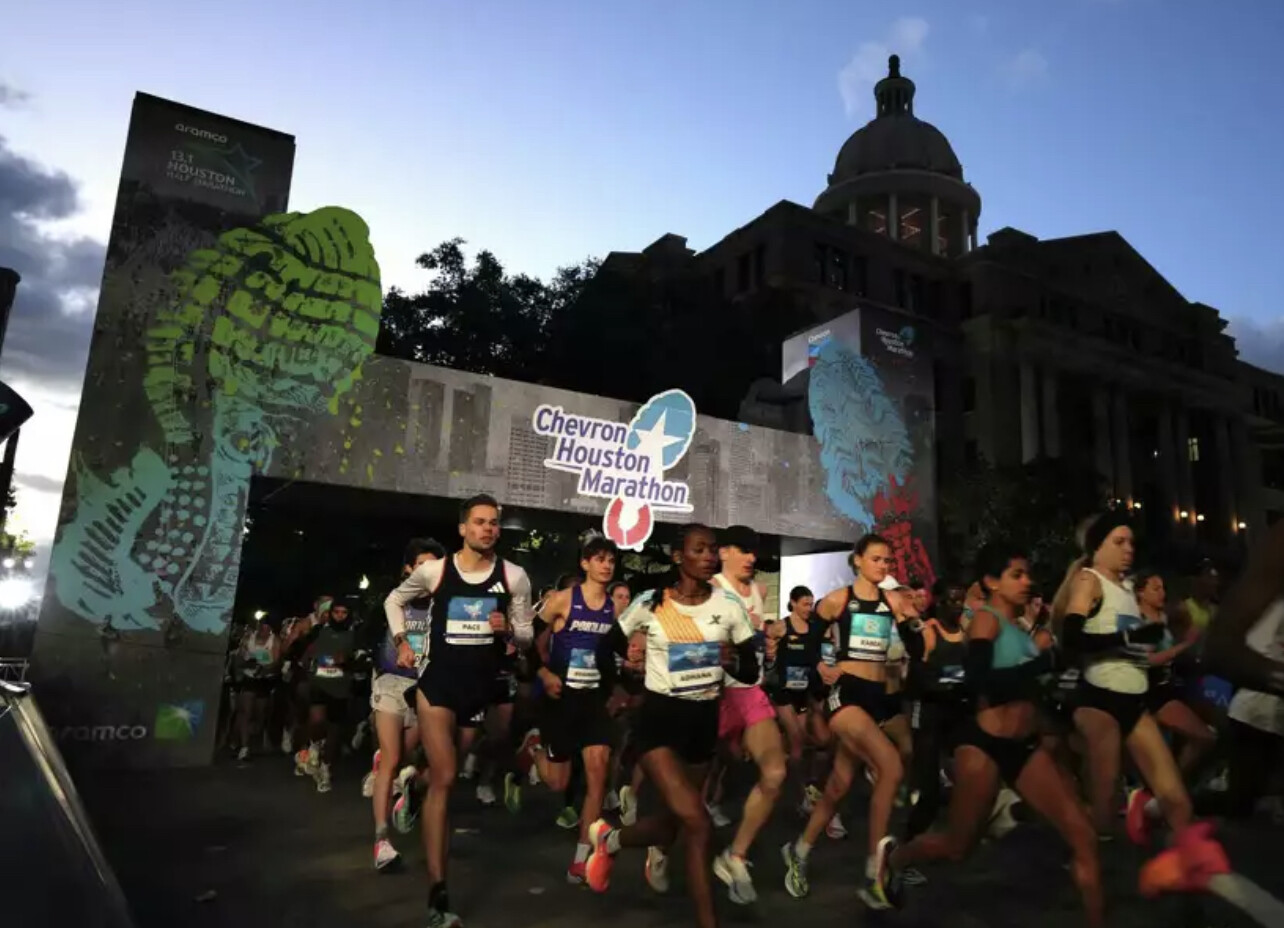
Ethiopia’s Rahma Tusa, the runner-up behind American Betsy Saina in September’s Sydney Marathon, won the women’s marathon in Houston in 2:19:33.
The races featured temperatures in the low 40s with 10 mph winds and gusts up to 17 mph, which made for a challenging end to the half marathon as miles 9, 10, and 11 were run directly into the teeth of the wind.
Below, six takeaways from the day’s racing in Houston.
2024 Houston Half Marathon men’s top 51. 60:42 Jemal Yimer, Ethiopia2. 60:43 Wesley Kiptoo, Kenya3. 60:45 Milkesa Mengesha, Ethiopia4. 60:45 Biya Simbassa, USA5. 60:49 Diego Estrada, USA14. 62:37 Galen Rupp, USA
2024 Houston Half Marathon women’s top 51. 64:37 Sutume Kebede, Ethiopia2. 66:07 Hellen Obiri, Kenya3. 66:24 Buze Diriba, Ethiopia4. 66:25 AR Weini Kelati, USA5. 67:36 Mestawut Fikir, Ethiopia
by Jonathan Gault (Let’s Run)
Login to leave a comment
Aramco Houston Half Marathon
The Chevron Houston Marathon provides runners with a one-of-a-kind experience in the vibrant and dynamic setting of America's fourth-largest city. Renowned for its fast, flat, and scenic single-loop course, the race has earned accolades as the "fastest winter marathon" and the "second fastest marathon overall," according to the Ultimate Guide to Marathons. It’s a perfect opportunity for both elite athletes...
more...Emma Bates Withdraws from Olympic Marathon Trials 2024
Emma Bates was widely considered a top contender to make the U.S. Olympic team in the marathon this year. But over the weekend, she announced she won’t be lining up at the Olympic Marathon Trials in Orlando, Florida, on February 3.
Bates, 31, tore her plantar fascia during October’s Chicago Marathon. On December 12, she posted that she had been healing well and was back to running on the ground for an hour at a time when she developed another injury, posterior tibial tendonitis.
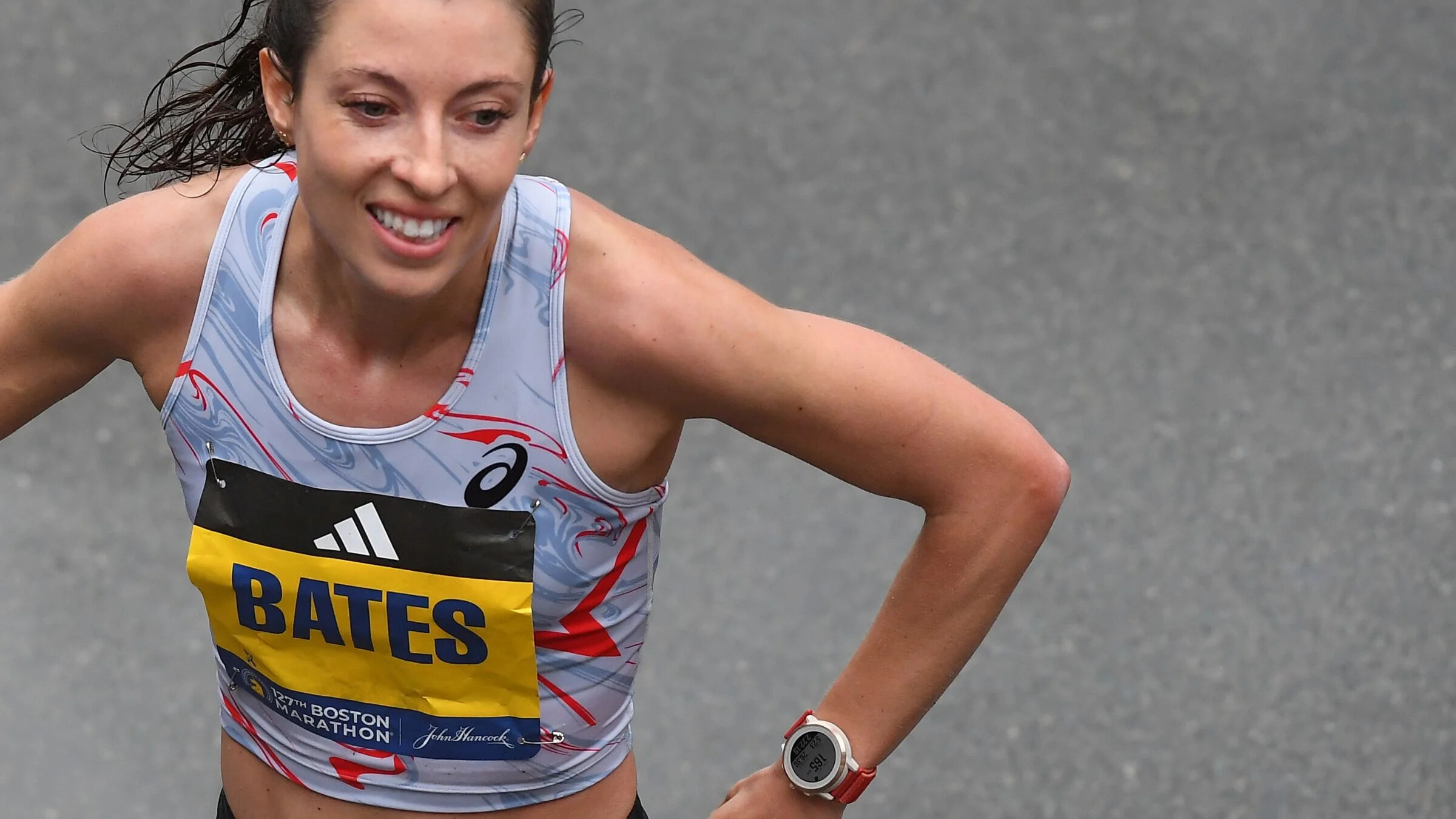
And in a tearful Instagram video posted Saturday night, Bates said that while she had returned to workouts with her Boulder-based training group, Team Boss, “we just know that there’s not enough time to be where I need to be.”
Bates’ personal best of 2:22:10 at the 2023 Boston Marathon, where she placed fifth, was the third-fastest time by an American last year.
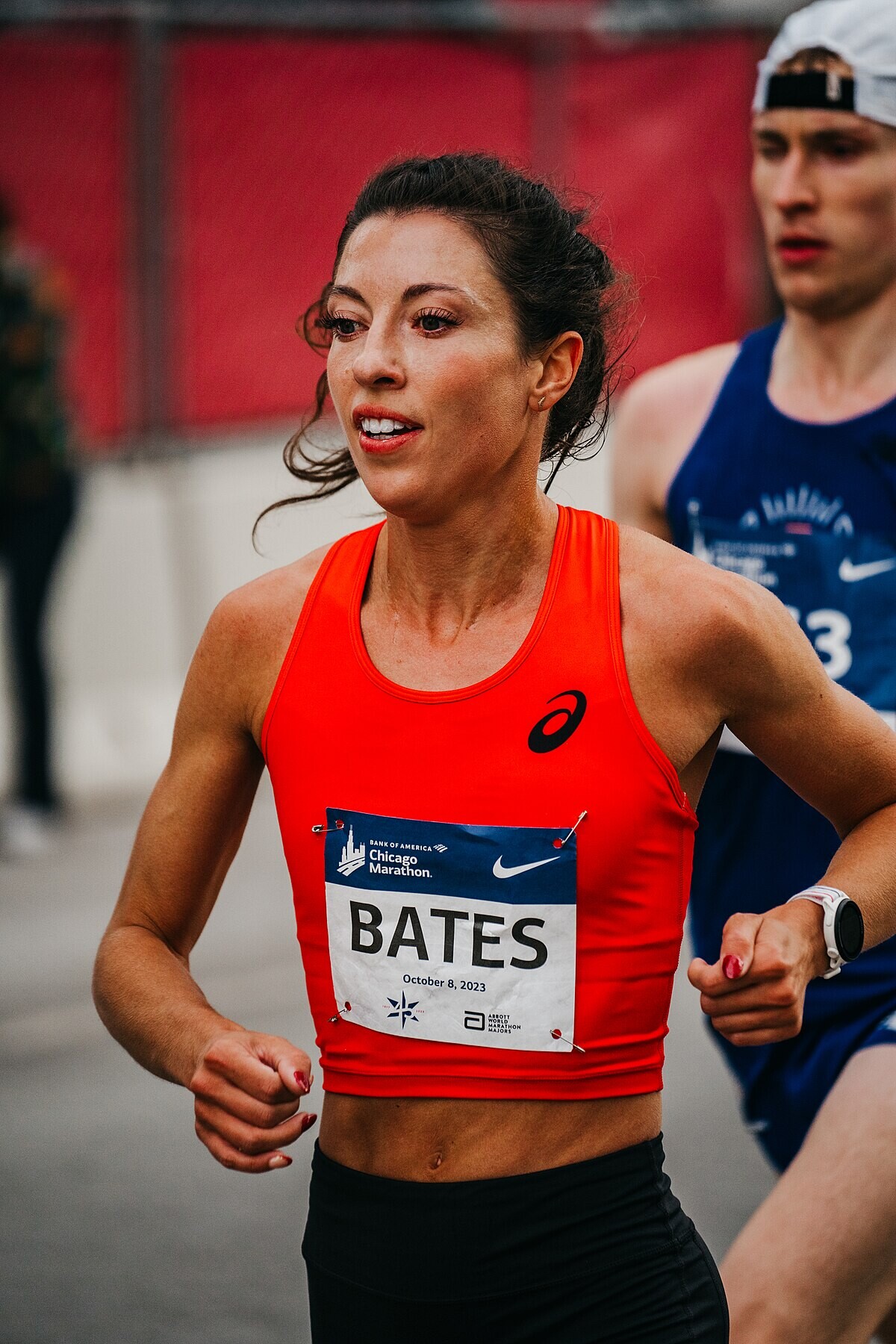
She headed into Chicago in the fall with high hopes—saying she was in shape to run 2:18 to 2:19 pace—but stepped in a pothole around mile 14. She finished 13th in 2:25:04 and left the finish line in a wheelchair. A week after the race, an MRI revealed a torn plantar fascia.
She put on a boot and began cross-training on the bike, knowing the buildup to the Trials wouldn’t be easy. With the new setback last month, she and coach Joe Bosshard decided it simply wouldn’t be possible.
Bates, a 2014 NCAA champion in the 10,000 meters at Boise State University, won her marathon debut and the USATF Marathon Championships with a 2:28:18 at the 2018 California International Marathon and has steadily improved since. In her second marathon, the 2019 Chicago Marathon, she finished fourth in 2:25:27.
Those performances made her a contender for the 2020 Olympic Marathon Trials, where she ran 2:29:35 to place seventh. But her next big breakthrough was around the corner. On a hot, humid day at the 2021 Chicago Marathon, she ran a personal-best 2:24:20 to place second.
And in 2022, she was part of a trio of Americans who produced top-10 finishes at the World Athletics Championships in Eugene, Oregon—she was seventh in 2:23:18, between Sara Hall (fifth in 2:22:10) and Keira D’Amato (eighth in 2:23:34).
Bates was clearly disappointed not to line up with the likes of Hall and D’Amato again in Orlando; “this one hurts a lot,” she wrote.
“It’s another four years to wait for another Olympic team,” she said in the accompanying video. “I’ll be OK. I’ll be OK.”
by Cindy Kuzma
Login to leave a comment
2028 US Olympic Trials Marathon
Most countries around the world use a selection committee to choose their Olympic Team Members, but not the USA. Prior to 1968, a series of races were used to select the USA Olympic Marathon team, but beginning in 1968 the format was changed to a single race on a single day with the top three finishers selected to be part...
more...Elite women's marathoner Hall to run Manchester Road Race
Sara Hall, who was fifth in the World Marathon Championships last year, has entered this year's Manchester Road Race. This will be her first appearance in the Thanksgiving Day run.
Hall, 40, finished in 2:22:10 in the world event in Eugene, Oregon, and was the runner-up at the 2020 London Marathon in 2:22:01. Her personal-best for the 26.2-mile run 2:20:32, and 1:07:15.
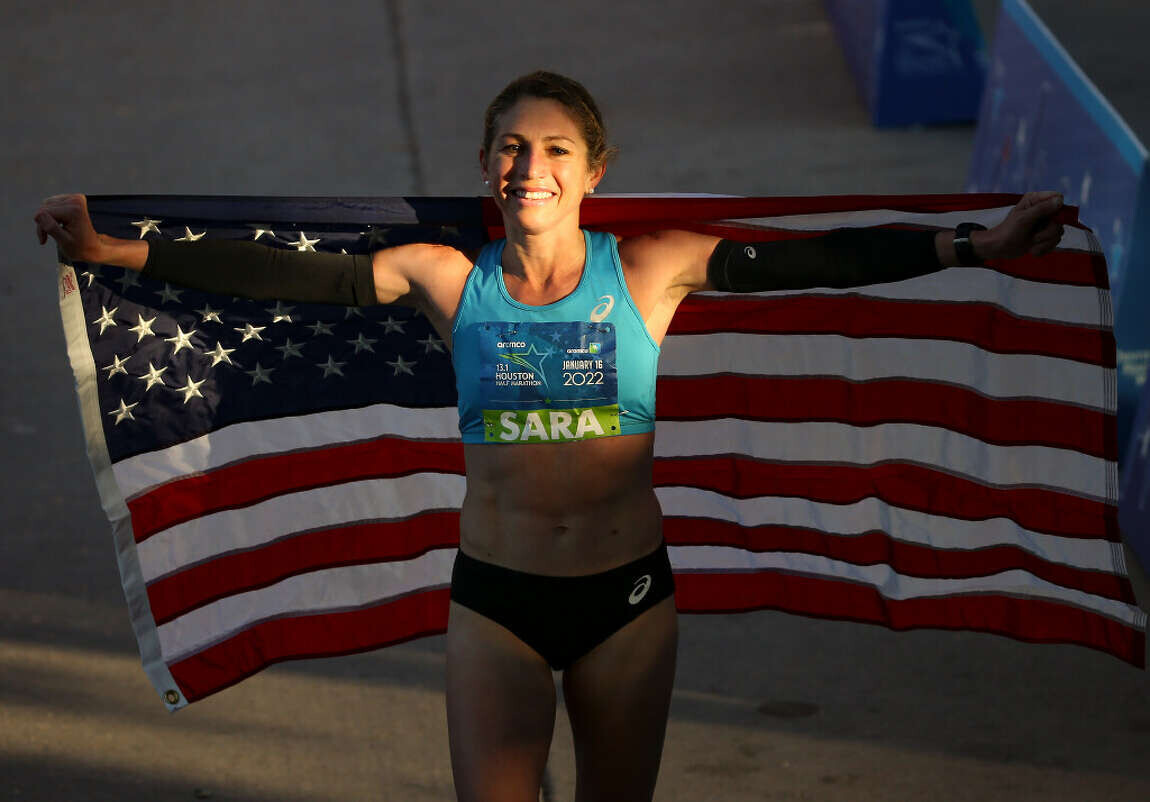
A seven-time All-American when she competed for Stanford, Hall ran the steeplechase before becoming a marathoner. She won the gold medal in the steeplechase at the 2011 Pan American Games in Mexico.
Hall is married to retired Olympic marathoner Ryan Hall. Ryan, who also competed for Stanford, set the United States records for the marathon and half marathon. In 2017, the couple adopted four young sisters from Ethiopia. The family resides in Flagstaff, Arizona.
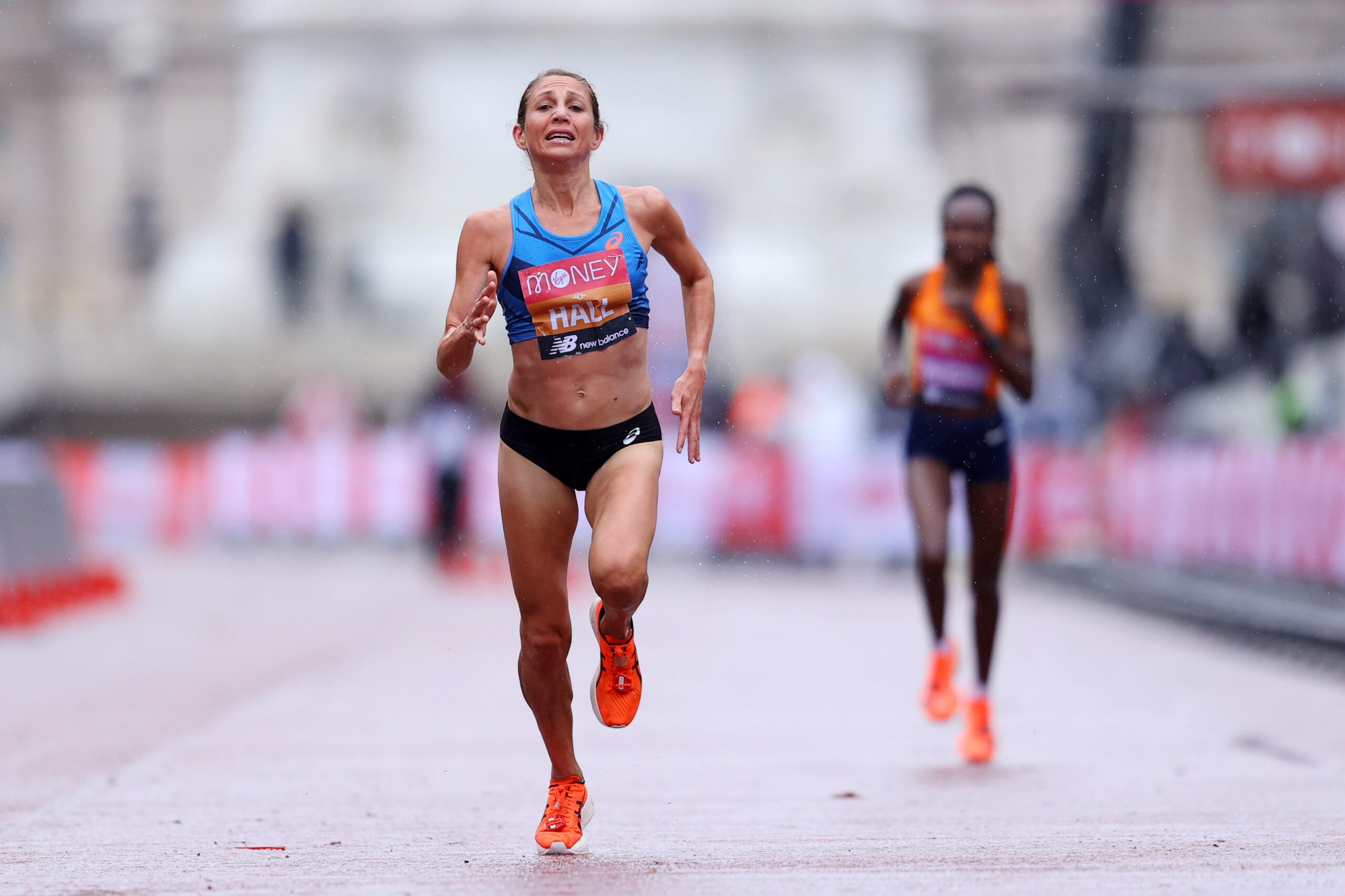
“Sara is a wonderful addition to this year’s race,” said Jim Harvey, the MRRs elite runner coordinator. “She is a very accomplished athlete and a great person.”
The 87th Manchester Road Race, which has been designated a World Athletics Label Event by World Athletics, starts at 10 a.m. on Thanksgiving Day Nov. 23. The 4.748-mile-long road race is run on a loop course through Manchester’s central district that starts and finishes on Main Street, in front of St. James Church.
Login to leave a comment
Manchester Road Race
The Manchester Road race is one of New England’s oldest and most popular road races. The 86th Manchester Road Race will be held on Thanksgiving Day. It starts and finishes on Main Street, in front of St. James Church. The Connecticut Sports Writers’ Alliance recently honored the Manchester Road Race. The CSWA, which is comprised of sports journalists and broadcasters...
more...Want to Qualify for the U.S. Olympic Trials? This Race Is Specifically Built for You.
For elite amateur marathoners, qualifying for the Olympic Trials is the ultimate life goal. Bakline’s McKirdy Micro Marathon removes the challenges of running a fast 26.2.
When it comes to trying to run a fast marathon, Zacch Widner knows that bottle service isn’t a luxury but a necessity. No, not tableside bottle service at a nightclub, but the ability for marathon runners to easily identify and grab their own hydration bottles off of a table every 5K or so on course while running at an extremely fast pace.
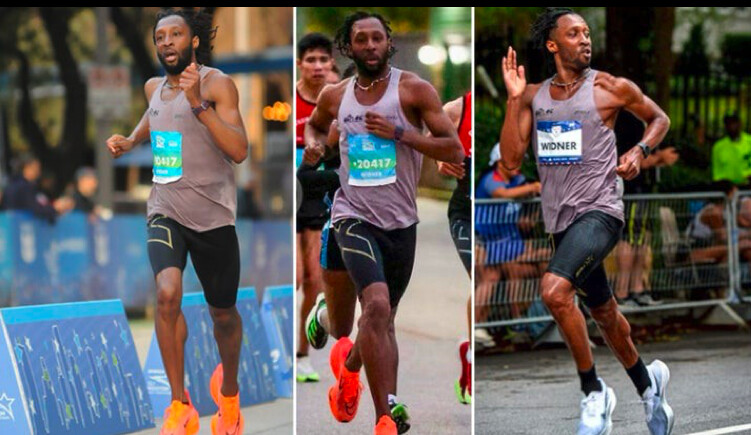
At the Berlin Marathon on September 23, the 32-year-old aspiring elite runner from Lansing, Michigan, was on the verge of running the race of his life. But because his bottles weren’t readily available at each aid station, he wound up grabbing only one of his eight bottles and suffered the consequences.
Although running the race without optimal calorie and hydration intake led to frequent cramping, he still finished in 2:20:02. That’s the second-best time of his career, but still two minutes short of his goal of breaking the U.S. Olympic Trials men’s qualifying standard of 2:18:00.
Widner is one of dozens of American runners—most of whom work nine-to-five jobs—still hoping to earn the standard (or 2:37:00 for women) by the December 5 deadline, in order to qualify for the U.S. Olympic Trials Marathon on February 3 in Orlando.
For Widner, it’s much more than a personal goal. It’s a commitment to a friend and former teammate. “It was a bummer,” says Widner, who works full-time as an IT analyst for the state of Michigan. “I know I’m capable of running faster. I didn’t capitalize on taking fluids, so when it came to running all out, I just couldn’t do it. I think the stress of it is actually what caused the cramps, because every time I missed a bottle, I just stressed out more…just mentally started destroying me.”
Three weeks later, Widner is ready to take another shot at the OTQ standard, this time at Bakline’s McKirdy Micro Marathon on October 14—a unique elite-only race that will be held about 30 miles north of New York City. Set on a nine-loop course at Rockland Lake State Park, the no-frills race will provide bottle service to each of the 180 entrants who met a stout qualifying standard (2:25 for men, 2:45 for women) to register.
“It’s got everything you need,” he says. “You have a lot of tough, fast runners. You have pacers and a flat course with a well-organized system for everyone’s fluids. I’m ready to go.”
In 2020, when running races were shut down because of COVID-19, athlete agent Josh Cox and Ben Rosario, founder and head coach of the Hoka NAZ Elite team, developed an elite-only marathon in Arizona that gave about 100 athletes from around the world the chance to run a highly competitive race on a USATF-certified course amid the still-pervasive coronavirus.
Known as The Marathon Project, the race was held in Chandler, Arizona, on December 20, 2020. Seven U.S. men ran faster than 2:10, while 12 American women finished under 2:30—the first time that’s ever happened. Martin Hehir, a fourth-year medical student who was coming off weeks treating COVID-19 patients, won the race in a personal best 2:08:59, while Sara Hall was the women’s winner in a personal best of 2:20:32, at the time the second-fastest marathon ever run by an American woman.
Several runners who trained under Flagstaff, Arizona coach James McKirdy and his online platform McKirdy Trained were in the race, and they performed well. He was so impressed by the concept that he quickly went about replicating it by hosting small regional marathons around the U.S. for a wider range of runners in early 2021.
At one of the McKirdy Micro Marathon races held at Rockland State Park, Denver-based runner Alex Burks won the race and lowered his personal best from 2:23:47 to 2:16:52. Dozens more earned personal bests and Boston qualifying (BQ) times.
“We really liked that idea and thought we could develop that concept for the masses, and they went off without a hitch,” McKirdy says. “The athletes had a great time and many runners—I think close to 150—earned a BQ from our races. So when the U.S. Olympic Trials qualifying standards were released two years ago, we felt we had the chops and experience to provide a marathon that would provide full on-course support for runners trying to qualify.”
Bakline’s McKirdy Micro Marathon will be held on a nine-lap, 26.2-mile course that will start with one 2.63-mile partial lap, followed by eight successive laps on a 2.945-mile circuit. Runners can have up to eight hydration bottles that will be set up on a series of well-marked, eight-foot tables 20 feet apart.
While the majority of runners will be aiming for the U.S. Olympic Trials qualifying standards, others are shooting for faster times. McKirdy and co-organizer Heather Knight Pech have enlisted pacers to guide runners to three different goal times for men (2:10:00, 2:11:30, and 2:18:00) and two for women (2:29:30 and 2:37:00).
The men’s field is headlined by Tsegay Tumay, an Eritrean runner with a 2:09:07 personal best who trains in Flagstaff under McKirdy. Tiidrek Nurme is an Estonian runner who is coming off a 31st-place, 2:15:42 at the World Athletics Championships on August 27, in Budapest. American runner Ben Blankenship, who finished eighth in the 2016 Olympic 1,500-meter finals in Rio de Janeiro, is making his marathon debut. Another OTQ hopeful is Hosava Kretzmann, a 29-year-old member of the Hopi Tribe from Flagstaff, Arizona, who finished sixth in his debut at the Los Angeles Marathon earlier this year in 2:19:58.
Among the runners who should be at the front of the women’s race is newly signed Nike athlete Calli Thackery, a British runner who just placed seventh in the half marathon at World Athletics Road Running Championships with a 1:08:56 personal best. American Makenna Myler has a 2:40:45 personal best, but is shooting for the U.S. Olympic Trials Marathon qualifying standard just seven months after giving birth to her son in mid-March. (In 2021, she placed 14th in 10,000 meters on the track in the U.S. Olympic Trials seven months after giving birth to her daughter.) She had originally registered and was onsite for the October 1 Twin Cities Marathon in Minneapolis, but that race was canceled because of extreme heat.
Other runners include Monica and Isabel Hebner, identical twins who most recently competed for the University of Texas, who will be making their marathon debuts with hopes of running in the 2:34-2:35 range, and Maura Lemon, a mother of three from Dayton, Ohio, who owns a 2:42:57 personal best but is aiming for the 2:37 OTQ standard.
Many U.S. runners on the cusp of the OTQ times ran the Chicago Marathon on October 8, while others are waiting until the California International (CIM) Marathon on December 5.
What the McKirdy Micro Marathon aims to do is eliminate the challenges that runners face at other races—difficult travel, congested race expos, crowded race courses, and, perhaps most importantly, a lack of bottle support on the course. Plus, it offers a spectator friendly circuit where family, friends, or coaches can cheer for runners on every loop.
“This gives them that chance to run fast,” Knight Pech says. “There’s still a lot of runners out there—a lot of women and a lot of men—who are sitting on the cusp of the qualifying standards. And they should have the opportunity to be able to swing large and take a moonshot. We believe this race gives them a real chance to get it done here in a way that I don’t think other races offer them.”
While the top three men’s and women’s finishers in the U.S. Olympic Trials Marathon will represent the U.S. at the Paris Olympics, just getting to the Olympic Trials is a lifetime goal for many runners. It’s the deepest and most competitive domestic marathon in the U.S., but it only happens every four years. While a tiny portion of the qualifiers are sponsored professional athletes, most of the runners have already moved on to full-time jobs.
For Widner, there is more at stake than just running a fast time. He’s forever running to honor Jeremiah Hargett, a former teammate at Oakland Community College in suburban Detroit who dealt with ongoing mental challenges. One day back in 2011, Hargett called Widner and told him how much he believed in him as a runner and as a friend, and how they’d both eventually make it to the U.S. Olympic Trials. Sadly, Hargett took his own life the very next day. Widner has more or less dedicated every race to Hargett since then.
Although his best time in the 1,500-meter run (3:53.90) fell well short of the Olympic Trials qualifying standard on the track, Widner hasn’t given up his pursuit for Hargett. Amid the rigors of working full-time for the past eight years, he’s continued to improve as a long-distance runner.
Despite what he calls a disastrous marathon debut at the CIM in 2018—where he went out way too fast and wound up struggling to finish in 2:45:39—he’s still chasing that goal. In 2022, he had a breakthrough race at Grandma’s Marathon in Duluth, Minnesota, lowering his personal best to 2:19:54. In January, he lowered his best time in the half marathon to 1:05:52 in January, but that was still nearly three minutes off the half-marathon OTQ of 1:03:00.
He’s continued to add mileage—he’s averaged about 94 miles per week this year—executed better workouts, and improved his fueling strategy, especially since McKirdy started coaching him in March. Now he’s on the cusp of reaching that magical qualifying mark once again.
But it’s as much for Hargett as it is for him.
“That’s the reason I keep running,” Widner says. “It’s the closest thing to my heart. Every time I run, I think about him and his family. When that happened, mentally, it changed me. After that, I bounced up and started running much better.”
“Running taught me how to be patient, and it is teaching me that life is the exact same way,” Widner adds. “It’s all about being patient, and when things go wrong or things seem to not go the way you were expecting, to just stay relaxed and understand that it could change for the better. I’ve been able to use that for everything in life—all my connections, and then have that thought in my mind to make the Olympic Trials, just like he agreed that we would do together.”
by Outside Online
Login to leave a comment
Annie Rodenfels Wins Boston 10k For Women
The 47th running of the Boston 10K for Women, presented by REI, returned to the Boston Common and the streets of Boston and Cambridge on Saturday.
Over 4,000 women participated in the autumn classic, which began at 8:50 a.m. for handcycle and wheelchair participants and at 9 a.m. for all runners.
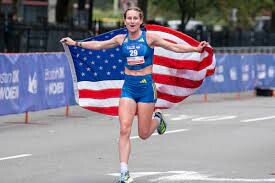
Formerly known as the Tufts Health Plan 10K for Women, the race is New England's largest all-women's sporting event.
The 6.2-mile course brings runs through Boston’s Back Bay and into Cambridge and finishes on Charles Street between the Public Garden and Boston Common.
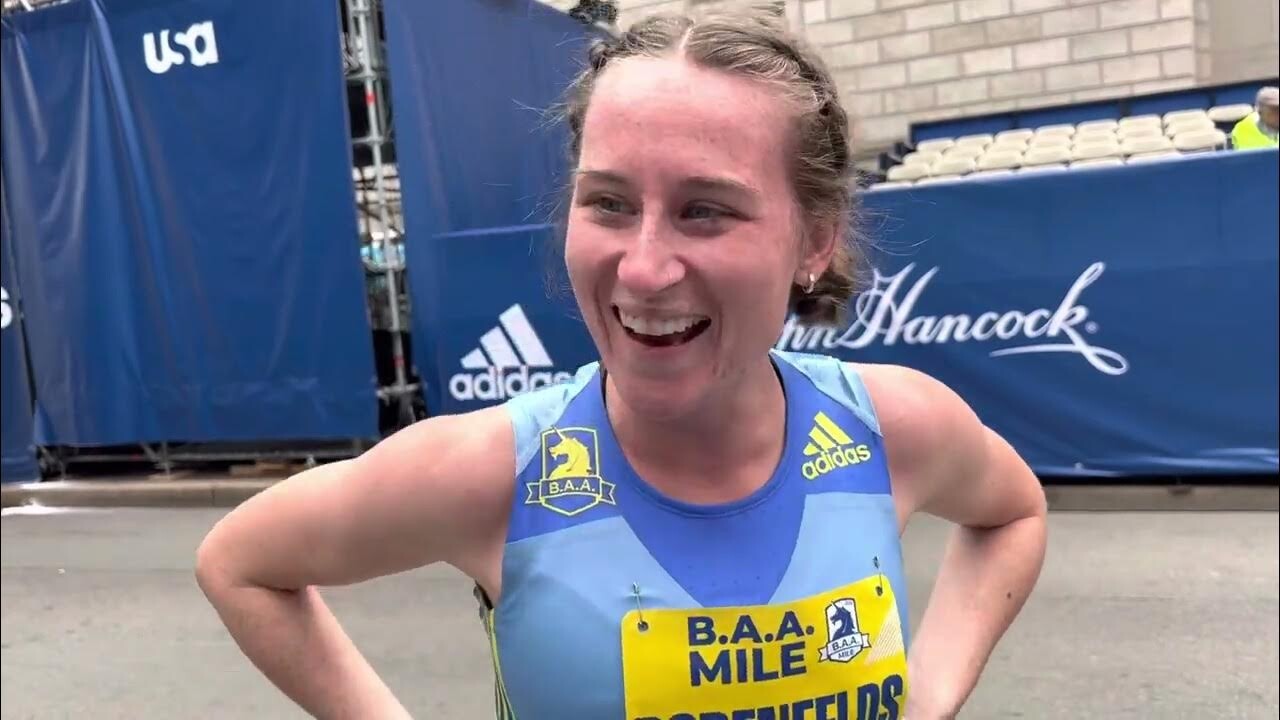
This year's race was won by Annie Rodenfels, who broke the tape in her 10K debut in a time of 32:08. She was followed by Emily Venters with a time of 32:31 and Jenny Simpson at 32:39.
A Boston resident, Rodenfels surged on the Massachusetts Avenue bridge and ran uncontested through the last mile until the Charles Street finish line.
“I thought I would sit back and wait and out-kick them at the end, like -- their mistake if they leave me until the end -- because besides maybe Jenny Simpson I think I’ve probably got the best kick in the field,” Rodenfels said afterward, with an American flag draped around her shoulders. “But I just felt too good, I figured I’d just go for it. What do I have to lose?”
For Rodenfels, who trains along the banks of the Charles River, the familiarity aided her approach in the new distance.
“I like the course a lot – I love running in Boston, I feel like I can have a mediocre year the rest of the year and then when I get a race in Boston, I knock it out of the park. I feel like I get more cheers because I am from around here,” said Rodenfels, who earned $9,000 with the victory.
Winning the Masters Division and finishing 11th overall was Sara Hall, who clocked a 33:19. Fourteen-year-old Madelyn Wilson won the wheelchair division in a time of 35:50, racing for the first time in a larger chair.
Login to leave a comment
Boston 10K for Women
The Boston 10K for Women, formerly known as the Tufts Health Plan 10K for Women and the Bonne Bell Mini Marathon, is a major 10K held annually in Boston, on Columbus Day, popular as both an elite world-class competition and a women's running event promoting health and fitness. Feel the empowerment as you unite with over 7,000 fellow runners...
more...The Road to the Paris Olympics and here is What You Need to Know.
American runners are about to begin training for the U.S. Olympic Trials Marathon
It’s early October, which means it’s the peak marathon season for many runners. But with an Olympic year on the horizon, it also means America’s top marathoners are about to hit the road to Paris.
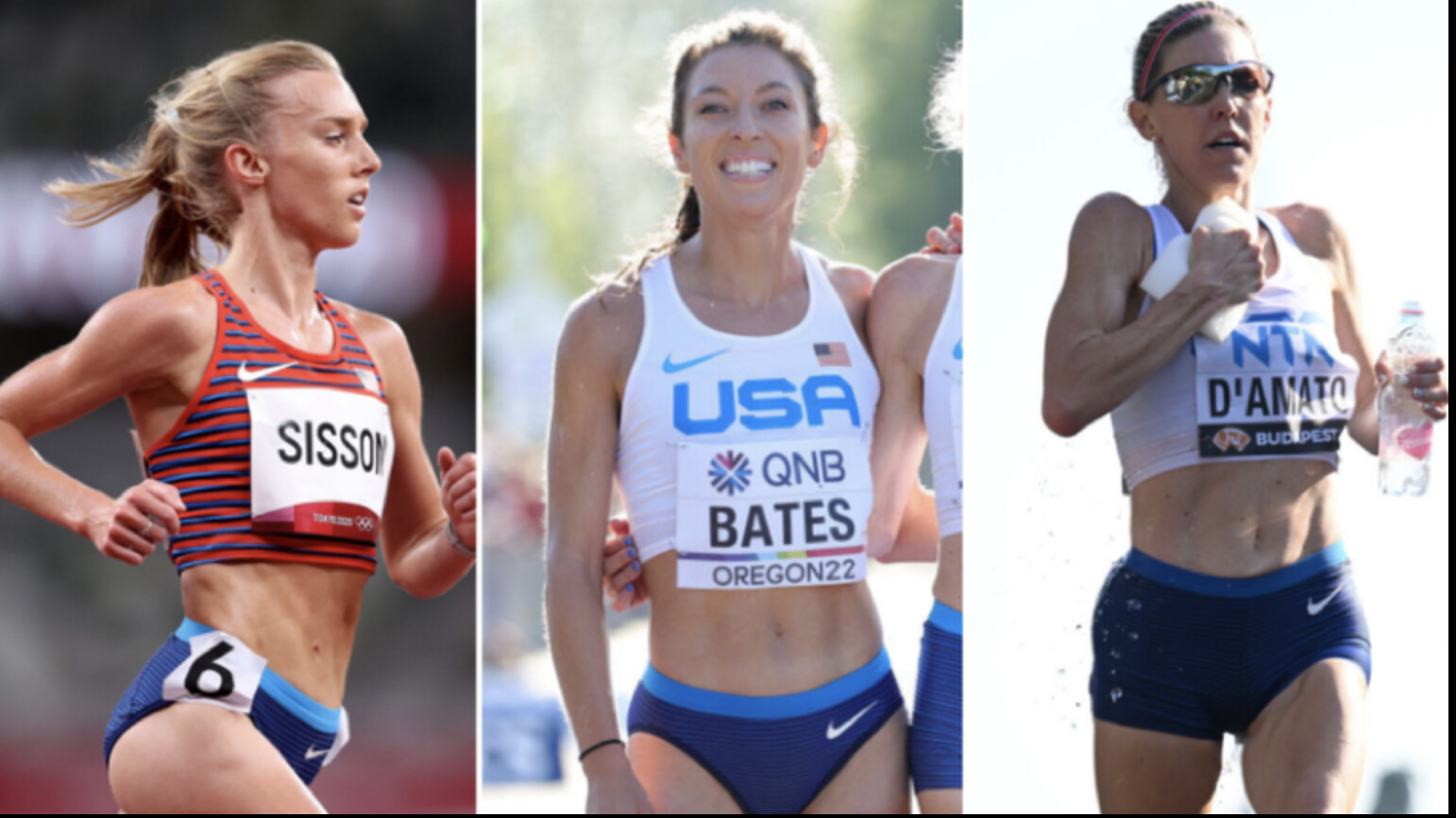
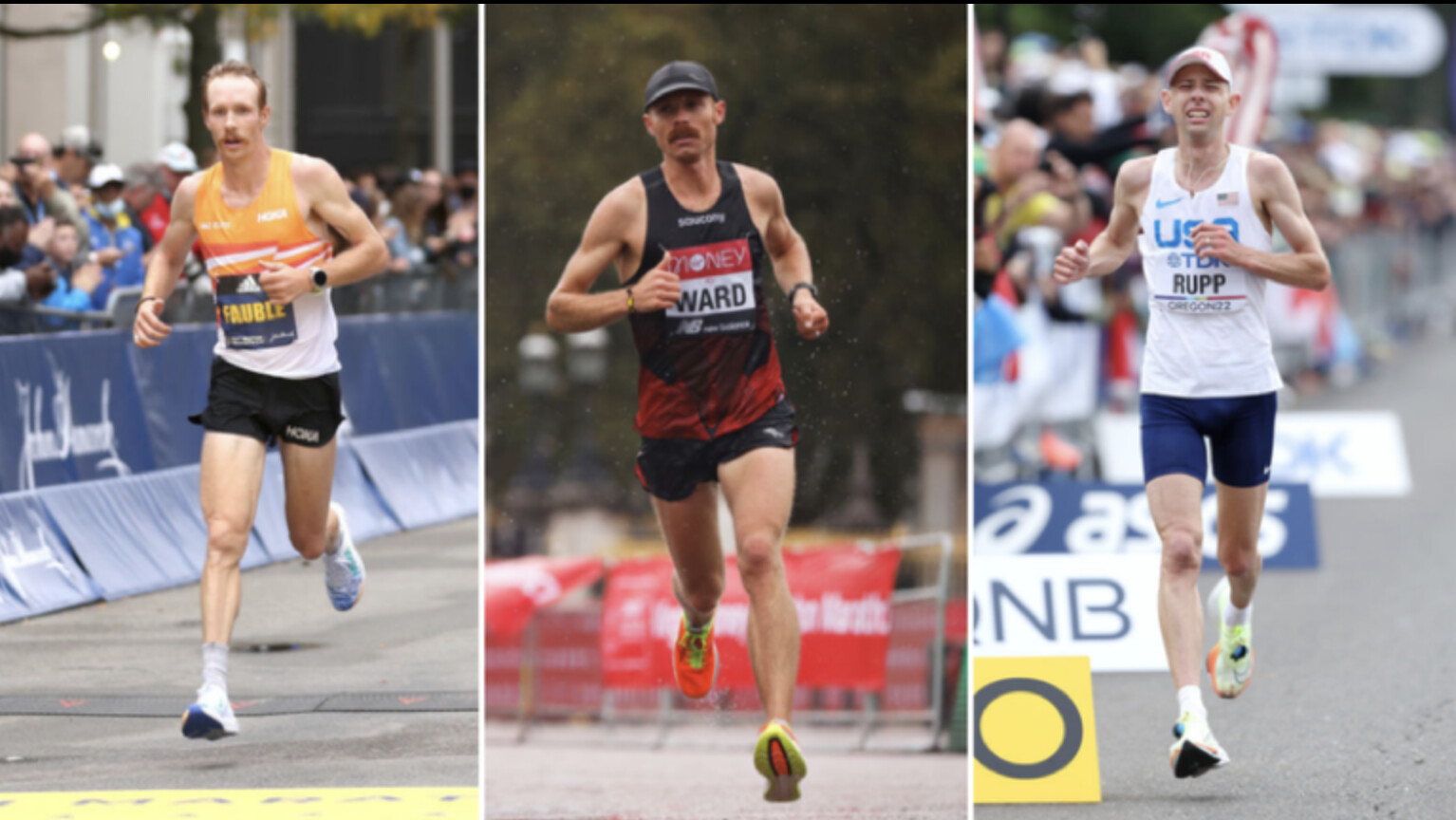
More specifically, the men’s and women’s 2024 U.S. Olympic Trials Marathon races—scheduled for February 3 in Orlando, Florida—are just four months away. And that means the top U.S. runners hoping to represent their country at next summer’s Olympics are about to begin preparing for the all-or-nothing qualifying race that decides which six runners will represent Team USA next summer on the streets of Paris.
Although several top American runners are racing the Chicago Marathon on October 8, even they have their eyes on a much bigger prize next February.
“There’s nothing in my mind that compares with being an Olympian and being in the Olympic Games,” says 26-year-old Utah-based Nike pro Conner Mantz, who returns to Chicago after finishing seventh last year in 2:08:16 in his debut at the distance. “So putting that first has been the plan for a long time. We’re just putting that first and we’re working backwards through the season with other races.”
Registration will open for the U.S. Olympic Trials Marathon in early November for runners who have surpassed the qualifying times in the marathon (2:18:00 for men, 2:37:00 for women) or half marathon (1:03:00 for men, 1:12:00 for women). The qualifying window extends through December 3—the race date of the last-chance California International Marathon, which for decades has been one of the most popular Olympic Trials qualifying races.
In 2020, a record 708 runners—465 women and 243 men—qualified for the U.S. Olympic Trials Marathon in Atlanta just before the onset of the Covid-19 pandemic. But USA Track & Field lowered the women’s qualifying standard by eight minutes from the more attainable 2:45:00 plateau, which means there will most likely be a much smaller women’s field this year.
But even so, amid the handful of runners who have a legitimate shot at making the Olympic team, there will also be dozens of dreamers, wannabes, and just-happy-to-be-there elite amateurs who have worked hard, put in the miles, and earned the chance to be on the start line of the deepest and most competitive U.S. distance-running races that only happen once every four years.
The men’s and women’s races will run simultaneously with the men beginning at 12:10 P.M. EST. and the women starting 10 minutes later. Runners have complained that a high noon start means they will be forced to race in hot, humid conditions. Over the past decade, the average temperature on February 3 in Orlando has been 69.6 degrees Fahrenheit at noon, rising to 73.3 at 4 PM. But actual temperatures have varied drastically, from 81 degrees Fahrenheit at 2 P.M. last year to 56 at the same time the year before. USATF officials have responded by saying that the start times are to accommodate live coverage on NBC and to match the expected conditions in Paris.
Here’s an update and overview of what’s next, who the top contenders are, the course, and what to expect in the next four months.
The 26.2-mile U.S. Olympic Trials course runs through downtown Orlando and consists of one 2.2-mile loop and three eight-mile loops. The marathon course will run through several neighborhoods, main streets, and business districts in Orlando, including Central Business District, City District, South Eola, Lake Eola Heights Historic District, Lake Cherokee Historic District, Lake Davis Greenwood, Lake Como, North Quarter, Lawsona/Fern Creek, SoDo District, and the Thornton Park neighborhood. It will then head east to and around The Milk District neighborhood and Main Street. (Notably, the course will come close to Disney World, which is about 15 miles to the southwest.)
Unlike the Olympic Marathon course in Paris, which will challenge runners with significant hills in the middle, the Orlando course is mostly flat. Each loop has a few minor variations in pitch, but only 38 feet separate the high and low points on the course. Ultimately, though, it’s a spectator-friendly route with chances for family, friends, and fans of runners to see the action several times.
The top women—based on personal best times and recent race results—are Emily Sisson, Emma Bates, Keira D’Amato, Betsy Saina, and Lindsay Flanagan. But the U.S. Olympic Trials races almost always produce surprises with a few great runners having off days and a few good runners having exceptional days, so there is reason to expect the unexpected.
Sisson lowered the American record to 2:18:29 last year when she finished second in the Chicago Marathon. She’s running Chicago again on October 8 along with Bates, who has said she’s hoping to break the American record. In January, Sisson, 31, chopped her own American record in the half marathon in Houston with a 1:06:52 effort, and most recently won the U.S. 20K Championships (1:06:09) on September 4 in New Haven, Connecticut. Bates, also 31, hasn’t raced at all since her sterling fifth-place effort at the Boston Marathon in April, when she slashed her personal best to 2:22:10.
While Chicago will be another good place to test themselves, both have unfinished business after Bates was seventh at the 2020 Trials and Sisson dropped out near the 21-mile mark.
The same goes for Flanagan, 32, who has been one of America’s best and most consistent marathoners for the past five years. She placed 12th at the trials in 2020. She had a breakthrough win (2:24:43) at the Gold Coast Marathon in 2022 followed by a strong, eighth-place finish (2:26:08) at the Tokyo Marathon earlier this year. In August, she ran perhaps the best race of her career, when she finished ninth (2:27:47) at the world championships in Budapest amid hot, humid conditions.
The 38-year-old D’Amato, meanwhile, just capped off another strong season with a 17th-place showing (2:31:35) at the World Athletics Championships in Budapest, a year after finishing eighth in the world championships and setting an American record 2:19:12 at the 2022 Houston Marathon. She was 15th at the Trials in 2020 in 2:34:24, just two years into her competitive return to the sport after having two kids and starting a career in real estate in her early 20s.
“It’s such a huge goal of mine to become an Olympian,” says D’Amato, who lowered Sisson’s U.S. record in the half marathon with a 1:06:39 effort at the Gold Coast Half Marathon on July 1 in Australia. “It’s really hard for me to put words into this because my whole life, wearing a Team USA jersey has been like a huge dream. And when I left the sport (temporarily), I felt like I said goodbye to that dream and I kind of mourned the loss of being able to represent my country. I feel like it’s the greatest honor in our sport to be able to wear our flag and race as hard as possible.”
Saina, a 35-year-old Kenya-born runner who ran collegiately for Iowa State University, became a U.S. citizen in late 2021. She placed fifth in the 10,000-meters at the 2016 Olympics in Rio de Janeiro while competing for Kenya. She’s spent the past several years splitting time between Kenya and Nashville, Tennessee, where she gave birth to a son, Kalya, in December 2021.
She’s returned with a strong fourth-place 1:11:40 result at the Tokyo Half Marathon last October and a fifth-place 2:21:40 showing at the Tokyo Marathon in February. In May, Saina won the U.S. 25K Championships in Michigan. Two weeks ago she broke the tape at the Blackmores Sydney Marathon in Australia in 2:26:47.
Other top contenders include but are not limited to Tokyo Olympics bronze medalist Molly Seidel (who’s personal best is 2:24:42), 2022 U.S. Olympic Trials champion Aliphine Tuliamuk (2:24:37, 11th in Boston this year), Susanna Sullivan (2:24:27 personal best, 10th in London this year), two-time Olympian and 2018 Boston Marathon winner Des Linden (2:22:38), and Sara Hall (2:20:32, fifth at last year’s world championships), plus Kellyn Taylor (2:24:29), Nell Rojas (2:24:51), Sarah Sellers (2:25:43), Lauren Paquette (2:25:56), Dakotah Lindwurm (2:25:01), Annie Frisbie (2:26:18), Sara Vaughn (2:26:23), Tristin Van Ord (2:27:07), and Jacqueline Gaughan (2:27:08).
The list of potential men’s top contenders isn’t as clear-cut, partially because there are so many sub-2:11 runners and several fast runners who are relatively new to the marathon. But all that suggests a wide-open men’s race where more than a dozen runners are legitimately in the mix for the three Olympic team spots. That said, the top runners on paper, based on both time and consistent results over the past few years, are Scott Fauble, Jared Ward, Galen Rupp, Conner Mantz, Leonard Korir, Matt McDonald, and C.J. Albertson.
The 31-year-old Fauble, who was 12th in the Olympic Trials in 2020 and owns a 2:08:52 personal best, has finished seventh in the Boston Marathon three times since 2019 and also finished seventh in the New York City Marathon in 2018. Ward is a 2016 U.S. Olympian and has three top-10 finishes at the New York City Marathon and a 2:09:25 personal best from Boston in 2019. He’s 35, but he just ran a 2:11:44 (27th place) at the Berlin Marathon in late September.
Rupp, who won the past two U.S. Olympic Trials Marathons and earned the bronze medal in the marathon at the 2016 Olympics, is nearing the end of his competitive career. He boasts a 2:06:07 personal best and has run under 2:10 more than any American in history, including when he finished 19th at the world championships (2:09:36) last year. He’s a bit of a wild card because he’s 37 and hasn’t raced since his lackluster 17th-place showing at the NYC Half Marathon (1:04:57) in March, but the world will get a glimpse of his fitness in Chicago this weekend.
Mantz followed up his solid debut in Chicago last fall with a good Boston Marathon in April (11th, 2:10:25) and solid racing on the track and roads all year, including his recent runner-up showings at the Beach to Beacon 10K in August and the U.S. 20K Championships in September.
McDonald, 30, who was 10th in the 2020 U.S. Olympic Trials, has quietly become one of the best marathoners in the U.S. while serving as a postdoctoral associate in chemical engineering at M.I.T. His last three races have clocked in at 2:10:35 (Boston 2022), 2:09:49 (Chicago 2022), and 2:10:17 (Boston 2023). The only other runner who rivals that kind of consistency is Albertson, 29, who has run 2:10:23 (Boston 2022), 2:10:52 (Grandma’s Marathon 2022) and 2:10:33 (Boston 2022) in his past three marathons and was seventh in the U.S. Olympic Trials in 2020 (2:11:49).
The men’s race will likely have a mix of veteran runners and newcomers who have run in the 2:09 to 2:10 range since 2022. Among those are 2020 U.S. Olympic Trials runner-up Jake Riley (2:10:02 personal best), who is returning from double Achilles surgery; 2016 U.S. 10,000-meter Olympian Leonard Korir (2:07:56), who ran a 2:09:31 in Paris in April; Zach Panning (2:09:28, plus 13th at the world championships in August); U.S. 25K record-holder Parker Stinson (2:10.53); Futsum Zienasellassie who won the California International Marathon last December in his debut (2:11:01) and then doubled-back with a new personal best (2:09:40) at the Rotterdam Marathon in the spring; Abbabiya Simbassa, who ran a solid debut marathon (2:10:34) in Prague this spring; and Eritrean-born Daniel Mesfun (2:10:06) and Ethiopian-born Teshome Mekonen (2:10:16), who both received U.S. citizenship within the past year; and solid veterans Nico Montanez (2:09:55), Elkanah Kibet (2:10:43) and Nathan Martin (2:10:45).
Additional sub-2:12 runners who will be in the mix are Andrew Colley (2:11:26), Clayton Young (2:11:51), Brendan Gregg (2:11:21), Josh Izewski (2:11:26), Jacob Thompson (2:11:40), and Kevin Salvano (2:11:49).
As noted previously, some top contenders will season their marathon legs one final time at the flat and fast Chicago Marathon on October 8. An even more select few will opt for the New York City Marathon on November 5. After that, nearly every American with eyes set on an Olympic berth will double-down over the holiday season for that one final, critical marathon training cycle. Expect to see a wide range in heat training, from sauna protocols, to warm weather training trips, to simply an adjusted race day strategy.
Of course, with the Olympic Marathon falling under the purview of World Athletics, qualifying for the U.S. Olympic Marathon team is not quite as simple as finishing on the podium in Orlando. Any American looking to have a breakout performance and finish within the top three at the U.S. Olympic Trials Marathon will need to have run under 2:11:30 for men and 2:29:30 for women within the qualification window, which spans from November 1, 2022 to April 30, 2024. Given the possibility of oppressively hot and humid temps on February 3 in Orlando, they’re best bet is to secure that time now.
These qualification standards are in accordance with a new rule from World Athletics, which allows national Olympic committees to circumvent the typical Olympic qualification process of running under 2:08:10 for men and 2:26:50 for women, or being ranked among the top 65 in the world on a filtered list of the top three athletes from each country. The catch, though, is that three other runners from said country must have met one of these two standards. If this sounds complicated, that’s because it is.
For the hundreds of elite amateurs on the cusp of hitting that coveted U.S. Olympic Trials qualifying time, it’s do or die mode. While a few made the cut at the Berlin Marathon on September 24, one of those opportunities was lost when the Twin Cities Marathon was canceled on October 1 because of excessive heat. Temperatures are shaping up for an auspicious day in Chicago this weekend, and many more will give it a final shot at the Columbus Marathon on October 15; Indianapolis Monumental Marathon on October 28; the Philadelphia Marathon on November 18; and the last-call California International Marathon, a point-to-point race ending in Sacramento, California on December 3.
Ultimately, only six American runners will likely continue on along the road to Paris and earn the chance to run in the men’s and women’s Olympic marathons next August 10-11. For a handful of younger runners, the 2024 U.S. Olympic Trials will be a motivation to reinvigorate the Olympic dream or keep a faint hope alive, at least until the 2028 U.S. Olympic Trials that will determine the team for the Los Angeles Olympics. But for many runners, the journey to the U.S. Olympic Trials in Orlando will lead to the end of their competitive road running careers as new jobs, young families, a switch to trail running, and other priorities will take hold.
“I think the Olympic Trials is an important part of American distance running,” says Kurt Roeser, 36, a two-time U.S. Olympic Trials Marathon qualifier who works full-time as a physical therapist in Boulder, Colorado. “I’m glad that they kept it the same event for this cycle and hopefully for future cycles because it gives people like me a reason to keep training. I’m older now and I’m not going to actually have a chance to make an Olympic team, but for somebody that’s fresh out out of college and maybe they just barely squeak in under the qualifying time, maybe that’s the catalyst they need to start training more seriously through the next cycle. And maybe four years from now, they are a serious factor for making the team.”
by Outside Online
Login to leave a comment
Who Will Run the World Championships Marathon for the U.S. This Summer?
The three men and three women are selected by a descending order time list. But not everyone accepts their spot. Over 9 days in August, the World Athletics Championships will take place in Budapest, Hungary. The women’s marathon is scheduled for August 26, and the men’s is August 27, the last day of competition.
USA Track and Field (USATF) uses different selection procedures for this event than it does for the Olympic Games. Instead of using a Trials race, as it does for the Olympics, USATF offers spots to athletes using a descending order time list for certain marathons run between December 1, 2021, and May 30, 2023, as long as those athletes have met the qualifying criteria set by World Athletics. (The rules are complicated. For instance, the Boston Marathon is not on the list of “World Athletics approved” courses, but USATF is allowing times run at Boston in 2022 and 2023 for the descending order list.)
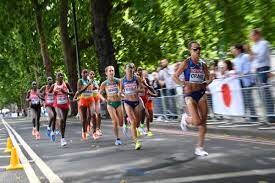
Not every American athlete will accept a spot, if offered. Some instead will choose to focus on a fall marathon, where they can earn substantial appearance fees and prize money that aren’t offered at worlds. Others won’t race at all this summer or fall, and instead they’ll train for the Olympic Marathon Trials in February 2024. How is it likely to shake out? Runner’s World reached out to the top seven men and women currently on the list or their coaches or agents to inquire about their plans. The window to run a qualifying time, however, remains open until the end of May. So a top performance in the next month could shake up the list.
Here’s what they said:
Women
Emily Sisson, 2:18:29, 2022 Chicago Marathon: Not likely, per her agent, Ray Flynn
Keira D’Amato, 2:19:12, 2022 Houston Marathon: Yes, if offered a spot
Betsy Saina, 2:21:40, 2023 Tokyo Marathon: No, she is focusing on a fall marathon
Sara Hall, 2:22:10, 2022 World Championships marathon: Has not yet decided
Emma Bates, 2:22:10, 2023 Boston Marathon: Not likely, per her agent, Ray Flynn
Susanna Sullivan, 2:24:27, 2023 London Marathon: Yes, if offered a spot
Aliphine Tuliamuk, 2:24:37, 2023 Boston Marathon: Will consider if offered a spot, per her agent, Hawi Keflezighi
Wild card: Will Molly Seidel run a May marathon?
Men
Conner Mantz, 2:08:16, 2022 Chicago Marathon: Not likely, per his agent, Ray Flynn
Scott Fauble, 2:08:52, 2022 Boston Marathon: No Elkanah Kibet, 2:09:07, 2022 Boston Marathon: Yes, currently deployed with the U.S. Army in Poland but will accept a spot if offered
Zachery Panning, 2:09:28, 2022 Chicago Marathon: Yes, per coach Kevin Hanson
Leonard Korir, 2:09:31, 2023 Paris Marathon: Did not immediately respond to a message from Runner’s World
Galen Rupp, 2:09:36, 2022 World Championships marathon: No, will run a fall marathon, per his agent, Ricky Simms
Futsum Zeinasellassie, 2:09:40, 2023 Rotterdam Marathon: Will consider if offered a spot, per his agent, Hawi Keflezighi
Wild card: Biya Simbassa runs the Prague Marathon, his debut, on May 7.
by Runner’s World
Login to leave a comment
Nikki Hiltz, Sam Prakel both become two-time winners at Usaft 1 mile road
The USATF Indoor 1,500-meter winners demonstrated they could also rule the roads Tuesday night at the USATF 1 Mile Championships.
Nearly 10 weeks after both winning USATF Indoor titles Feb. 18 in Albuquerque, N.M., adidas professional Sam Prakel and Lululemon athlete Nikki Hiltz each secured their second career national road championships as part of the annual Grand Blue Mile event.
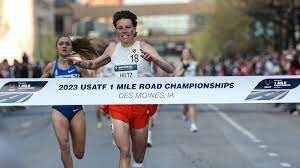
Hiltz produced the fastest performance in the history of the women’s race, which began in 2009, clocking 4 minutes, 27.97 seconds to edge reigning USATF Outdoor 1,500 champion Sinclaire Johnson of Nike’s Union Athletics Club in 4:28.70.
Hiltz, who prevailed in 2019 in Des Moines in 4:29.7, became the only athlete in event history to produce a pair of sub-4:30 efforts, benefitting from a 65-second opening quarter-mile and the pack reaching the midway point in 2:14.
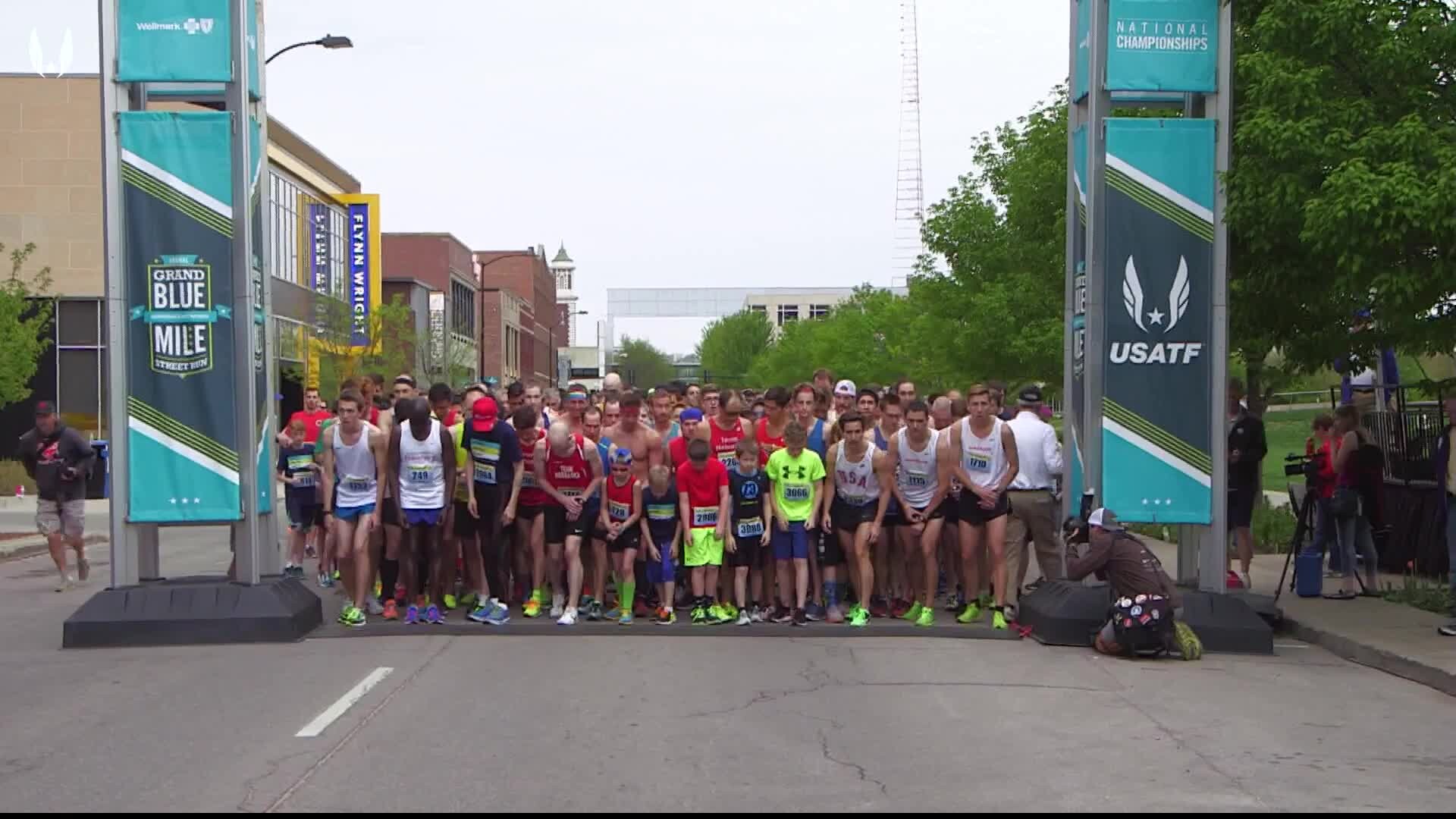
Emily Lipari, who had the previous all-time mark of 4:29.3 in 2020, and Johnson are the only other competitors to achieve a sub-4:30 performance in the race.
Hiltz, who ran a lifetime-best 1:59.03 in the 800 meters April 14 at the Bryan Clay Invitational at Azusa Pacific University, earned $5,000 for the victory and an additional $2,500 for the record bonus. Hiltz also joined Heather Kampf and Emily Lipari as the only three competitors to capture multiple women’s championships in event history.
Addy Wiley, a freshman at Huntington University in Indiana who secured five NAIA Indoor national titles March 2-4 in South Dakota, raced for the first time since that memorable showcase and took third in 4:30.94.
Wiley, 19, became the youngest top-three finisher in event history and achieved the No. 6 all-time performance in the nine years the competition has been held in Des Moines.
Wiley, who placed fourth in the 1,500 at the USATF Indoor Championships in February in Albuquerque, elevated to No. 7 in the history of the national road mile competition, including Sara Hall clocking 4:30.8 in Minnesota to secure the 2011 crown.
Colleen Quigley, representing Lululemon, finished fourth in 4:31.1 in her debut at the event, with Nike’s Shannon Osika and Alex Teubel also being credited with 4:31 performances to secure fifth and sixth.
Alli Cash (4:32), Jenn Randall (4:33), Micaela DeGenero (4:34) and Helen Schlachtenhaufen (4:37) completed the top 10 women’s competitors in the 23-athlete race.
Prakel prevailed in 4:01.21, remaining patient following an opening quarter mile of 61 seconds and a 2:05 split at the midway point, to take control in the final 500 meters and never relinquish his advantage.
Under Armour Mission Run Baltimore Distance athlete Casey Comber edged last year’s champion Vincent Ciattei by a 4:02.88 to 4:02.91 margin to grab second.
Prakel, who ran 13;22.78 in the 5,000 meters April 14 at Bryan Clay, also secured a $5,000 prize for the road mile title, becoming only the third male athlete in event history to capture multiple championships, joining David Torrence (2009-11) and Garrett Heath (2013 and 2015).
Prakel produced the fastest all-time mark in Des Moines with his 3:58.3 effort in 2020. Ben Blankenship holds the meet record with his title in 3:55.8 in 2016 in Minnesota.
Nick Randazzo, Kasey Knevelbaard and Jake Gillum were all credited with 4:04 performances to finish fourth, fifth and sixth, followed by Shane Streich and David Ribich both clocking 4:05 for seventh and eighth, Craig Nowak earning ninth in 4:06 and Colin Abert taking 10th in 4:08 in the 17-athlete race.
Login to leave a comment
Grand Blue Mile
The Grand Blue Mile was created by Wellmark Blue Cross and Blue Shield and the Drake Relays to encourage healthy habits and empower positive change. Held annually since 2010, the Grand Blue Mile has hosted more than 30,000 participants from 26 states, six countries, and four continents. The annual event brings friends and families together to celebrate wellness through a...
more...Sara Hall set a new American master record in Boston
Sara Hall just set a new American Record in the Marathon for the Masters division.
Hall now 40 years old finished the Boston Marathon in 17th place in 2:25:48.She of course won her division.Old American record was 2:27:47 by Deena Kastor in 2015.
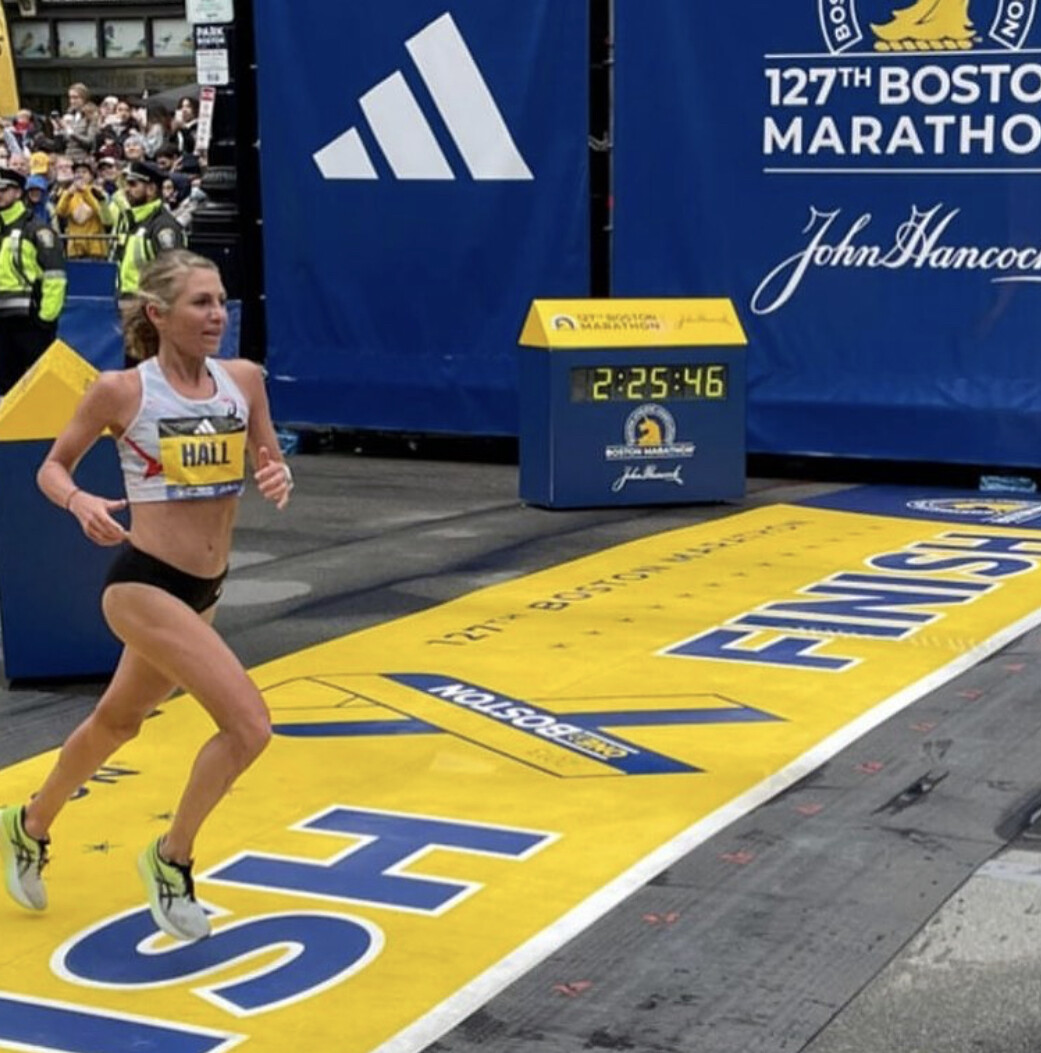
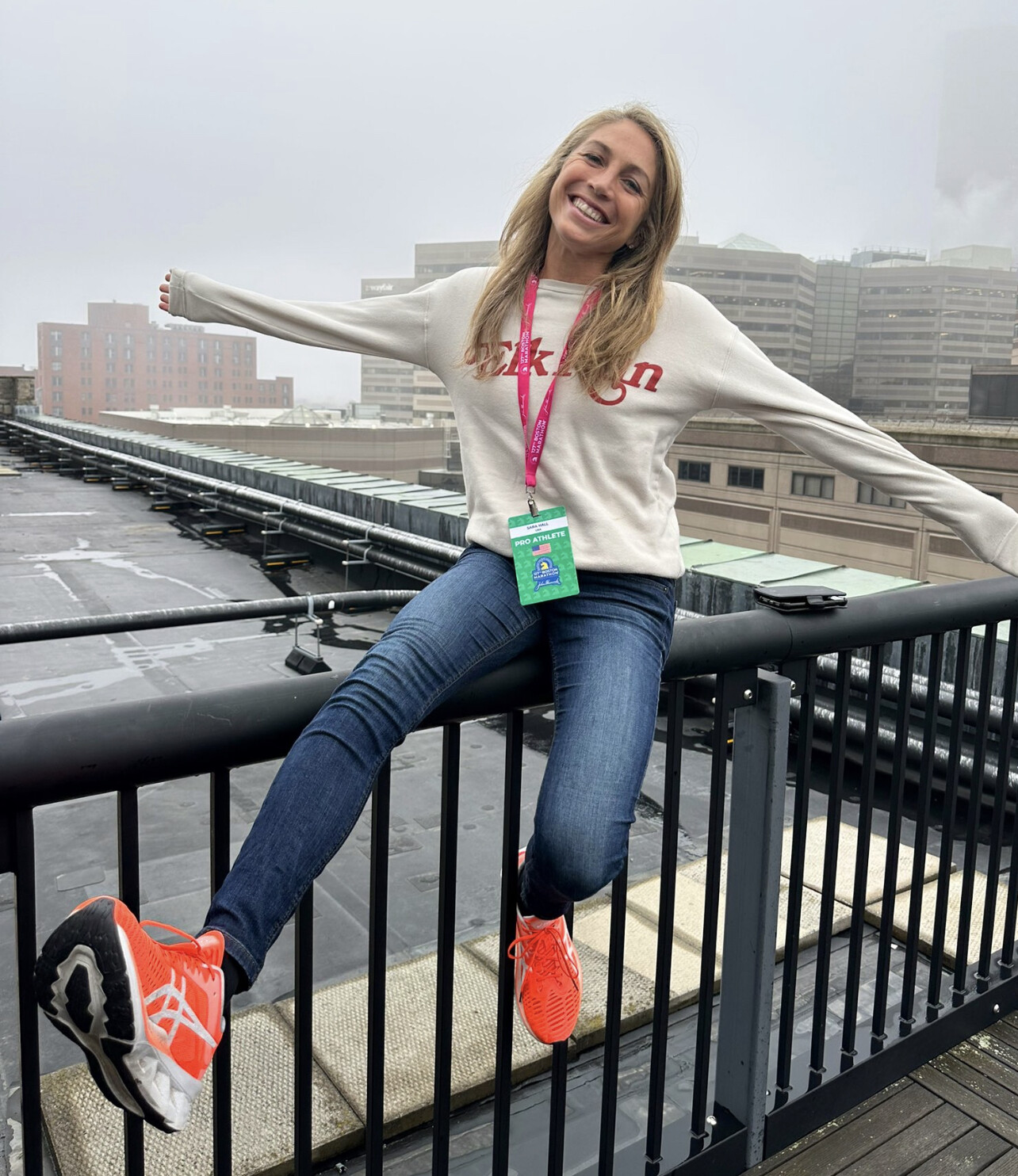
Login to leave a comment
Boston Marathon
Among the nation’s oldest athletic clubs, the B.A.A. was established in 1887, and, in 1896, more than half of the U.S. Olympic Team at the first modern games was composed of B.A.A. club members. The Olympic Games provided the inspiration for the first Boston Marathon, which culminated the B.A.A. Games on April 19, 1897. John J. McDermott emerged from a...
more...USA Record For Hillary Bor Yields $59,000 Payday At Cherry Blossom 10 Mile
The 50th edition of the Credit Union Cherry Blossom 10 Mile here this morning ended with a bang when Olympic steeplechaser Hillary Bor not only won the men’s division of the USATF 10 Mile Championships, but also claimed a $50,000 bonus for breaking Greg Meyer’s 40-year-old national record by just two seconds.
Bor, 33, who represents Hoka One One and wore bib 13, clocked 46:11, three seconds behind overall race champion Tsegay Kidanu of Ethiopia. Including his prize money, Bor collected a total of $59,000.
“I came here to break the record and the weather wasn’t going to stop me,” Bor told Race Results Weekly, referring to the unusually cold temperatures and strong winds. “It’s something I’ve been working for since October last year.”
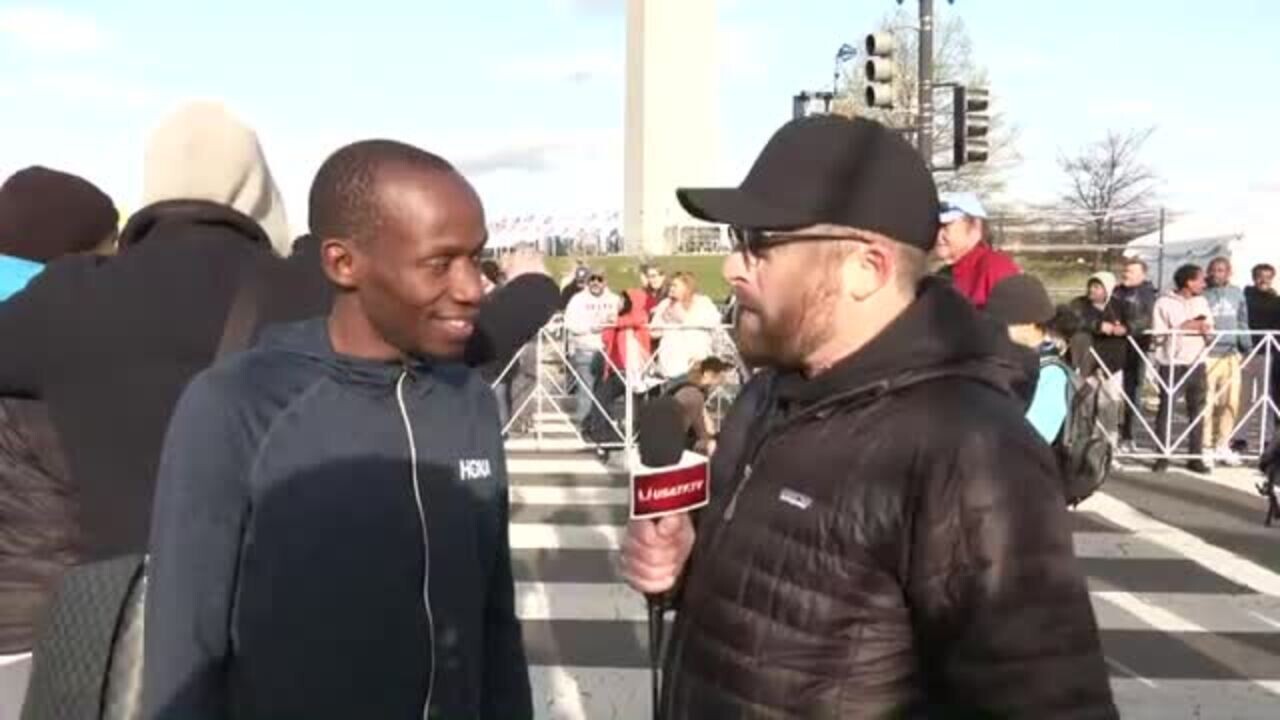
Last October Bor won the USATF 10 Mile Championships in St. Paul, Minn. He ran 46:06 in that race, a championships and course record, but that course was 31 meters downhill and not eligible for record setting. However, Bor and coach Scott Simmons realized that breaking Meyer’s mark was within his capabilities, especially because a faster time run by two-time Olympic medalist, Galen Rupp, was never ratified by USATF. Rupp ran a 10 mile split of 45:54 at the Row River Half-Marathon in Dorena, Ore., in October, 2020, but the paperwork for verifying that record was never completed or approved.
“My coach knew I was in really good shape to run 45 (minutes),” Bor said. “But, the weather’s not good today. The last two miles was just the wind on our face the whole time.”
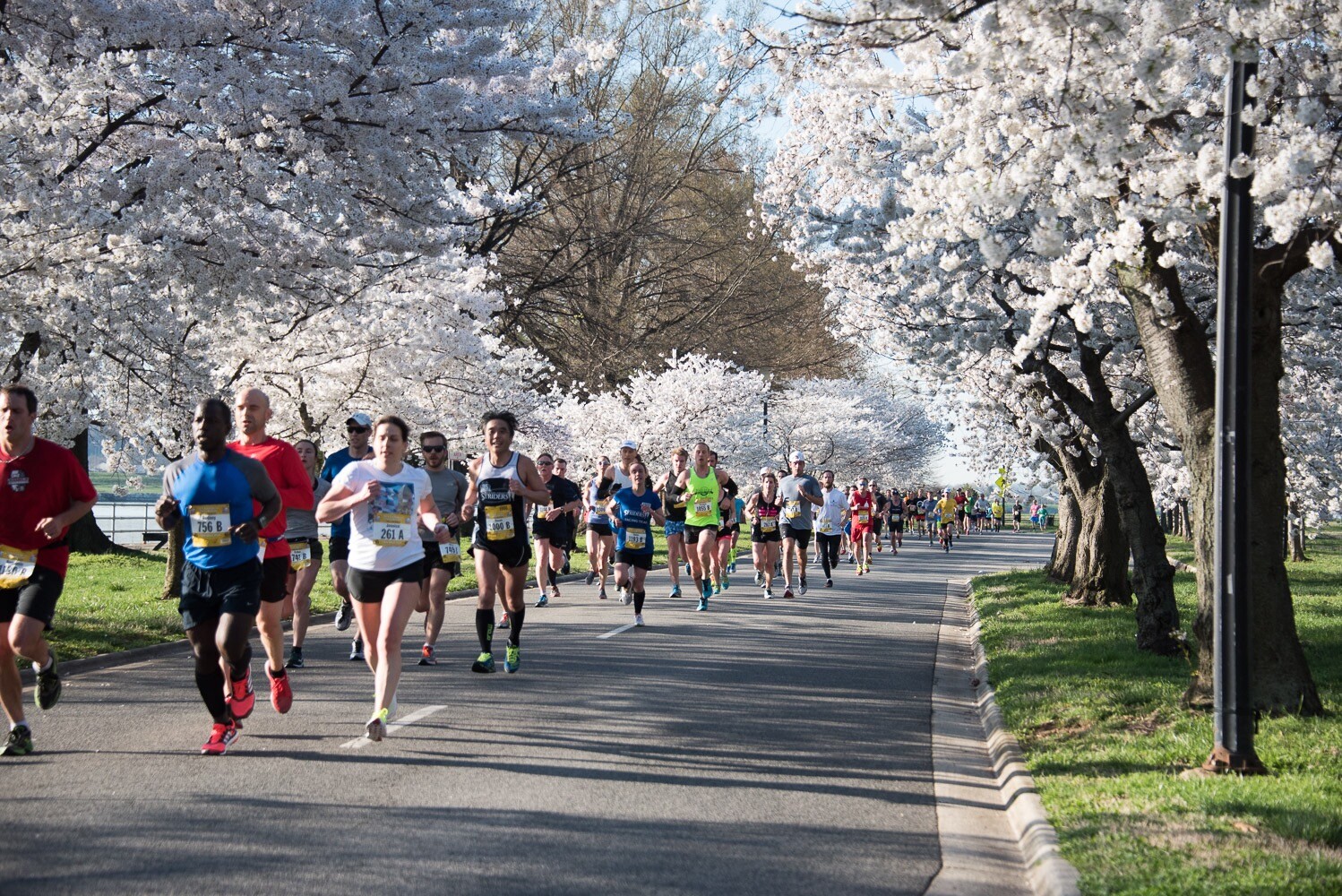
Indeed, it was in those last two miles that Bor and Kidanu did their best to push each other. Kidanu, who represents Asics, was just trying to keep up the pressure on Bor.
“The wind was very strong and it made it very tough,” Kidanu told Race Results Weekly through a translator. He continued: “At the beginning there were a lot of us, but later only a few of us. But the wind made it very difficult. Two of us were able to prevail and we battled one another. In the end, I was able to win.”
In the final sprint to the line, Bor wasn’t really sure where he stood against the clock. The wind was so strong that the 9-mile marker blew down, despite being weighted with sandbags. Also, Bor started the race without his watch.
“Today, I didn’t have my watch so that was not really good because I didn’t know the splits,” Bor said, looking slightly embarrassed. “When I saw the split at 8 miles I knew I needed to run 4:45, but the wind was too much. I just put my head down and just grind, and grind, and grind.”
Biya Simbassa (Under Armour) finished a distant third in 47:09 and finished second in the national championships division. Kenya’s Charles Langat (Asics) was fourth in 47:25, and Jacob Thomson (Under Armour) took fifth –and third in the national championships– in 47:27.
Bor, who will return to the steeplechase during the track season, said that today’s race was all about self-belief.
“It shows if you put something in your head you can accomplish it,” he said.
The women’s competition was a tale of two races.
In the overall competition, Uganda’s Sarah Chelangat (Nike) surged away from the field just before the five mile mark. Her six-mile split was a snappy 4:56, and that put her 22 seconds ahead at that point. Despite running directly into the wind (and alone) in the final miles, she was able to extend her lead to 30 seconds by the ninth mile, and 33 seconds by the finish. Her winning time of 52:04 was excellent given the conditions, but she fell well short of the 51:23 world best for an all-women’s race which would have given her a share of the race’s $50,000 bonus pool.
Behind Chelangat, there was a heated battle for both second place overall and the USATF title. In the ninth mile, Emma Grace Hurley (Atlanta Track Club Elite), Sara Hall (Asics), Nell Rojas (Nike), and Molly Grabill (Unattached) separated themselves from the rest of the pack, all of them trying for the national title. As they crested the final hill before the course turns slightly downhill to the finish line, Hall and Rojas were locked in a sprint for the win. Hall, who is running the Boston Marathon in 15 days, got the best of Rojas, 52:37 to 52:38.
Hall, who turns 40 on April 15, almost skipped today’s race. She just returned from a family trip to Ethiopia where her training didn’t go well because she got sick.
“Honestly, I feel so thankful for today because four days ago I wasn’t going to race,” Hall told Race Results Weekly. “I had COVID last week and training was just so rough. I had a fever. I had two different viruses back to back.”
But like Bor, Hall had the power of self-belief working for her today.
“I think my whole career I’ve just chosen to show up,” Hall said, wrapped in an American flag. “So, just today I decided to show up and I’m really glad I did, especially with Asics sponsoring this event.”
While the wind –which Rojas called “nasty”– was a challenge, Hall saw it as an opportunity to prepare mentally for Boston where conditions can be difficult, too. She thought about the 2018 race where temperatures were just above freezing and athletes had to run through a driving rain storm.
“I was thinking about Boston because, you know, 2018 with that headwind and the storm,” Hall said. “I have Boston in two weeks, so this is just a good time to practice.
Like Bor, Hall had thought about trying for a share in the record bonus pool, but discarded that idea when she felt the power of the wind.
“Normally, I would have wanted to go for the record out here, but with the significant wind I didn’t know if that was going to be in the cards, so I just chose to compete,” she said. “I think this was a great opportunity to do that with Boston coming up.”
With her win here today, Hall has won a total of 12 national titles, four at 10 miles (2017, 2018, 2019, and 2023).
Hurley finished fourth (third American) in 52:41, and Grabill got fifth (fourth American) in 52:42. Defending champion Susanna Sullivan, who led most of the first half of the race, finished seventh (sixth American) in 53:25. She’s running the TCS London Marathon in three weeks and has been doing heavy mileage.
“I’m ready to run a marathon,” she said, smiling, as she changed into warm clothes in the athlete recovery area.
Some 16,000 runners competed today after about 6,000 ran the companion 5-K yesterday (which took place in the rain). Several former race champions were on hand to celebrate the 50th edition, including Kathrine Switzer (1973), Greg Meyer (1983), Eleanor Simonsick (1982 and 1983), and Bill Rodgers (1978 through 1981). Race director Phil Stewart reflected on how the race had endured for so many years and through so many cultural and political changes.
“Through Watergate, gas crises, the fall of the Berlin Wall, the invention of the internet, the first and second Iraq Wars, the 2008 financial crisis, America’s first Black President, two impeachments, an insurrection and the War in Ukraine, runners have returned each spring for what is known as the ‘Runners Rite of Spring,'” Stewart said at last night’s pre-race dinner.
by David Monti
Login to leave a comment
Cherry Blossom Ten Mile Run
The Credit Union Cherry Blossom is known as "The Runner's Rite of Spring" in the Nation's Capital. The staging area for the event is on the Washington Monument Grounds, and the course passes in sight of all of the major Washington, DC Memorials. The event serves as a fundraiser for the Children's Miracle Network Hospitals, a consortium of 170 premier...
more...Defending Champions Return to Run 50th Anniversary Credit Union Cherry Blossom 10 Mile
Organizers of the 50th annual Credit Union Cherry Blossom 10 Mile (CUCB) announced today the first of two rounds of news about this year’s invited field; look for the second announcement to come out on Wednesday, March 29. Today’s announcement features past champions and top-5 finishers expected to toe the respective men’s and women’s starting lines on Sunday, April 2. (The elite women will start first, at 7:18 a.m., followed by the men and the masses at 7:30 a.m.)
Three past champions are part of the women’s elite field: Susanna Sullivan, last year’s women’s champion from Reston, VA; 2021 champion Nell Rojas from Boulder, CO; and 2013 champion Caroline Rotich, a Kenyan who lives in Colorado Springs, CO. As part of the 50th celebration two additional former champions are entered: Colleen De Reuck from Boulder, CO, who won the race in 1998 and still holds the women’s course record of 51:16; and 1973 winner Kathrine Switzer.
Other top women finishers from past 10 Miles include: Carrie Verdon from Boulder, CO, who placed second last year; Paige (Stoner) Wood, last year’s third place finisher from Flagstaff, AZ; Sara Hall, also from Flagstaff, who placed fourth in 2014; and Flagstaff’s Diane Nukuri, who was fifth in 2018.
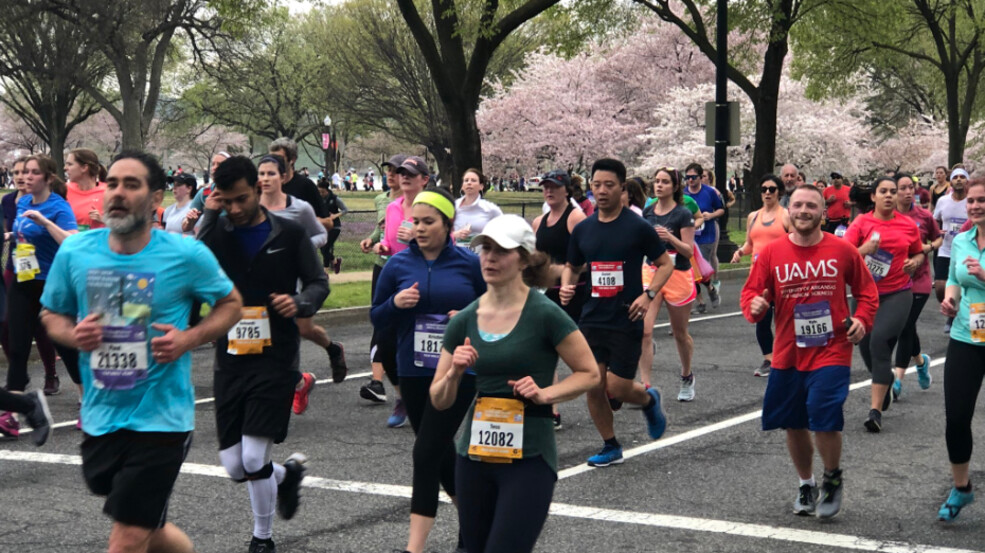
In the men’s race, the top-three finishers from 2022 return. All hailing from Kenya, they include champion Nicholas Kosimbei, second-place runner Wilfred Kimitei, and third-place finisher Shadrack Kimining. They’ll be joined on the starting line by second-place finisher in 2021 Abbabiya Simbassa from Flagstaff, AZ. Returning for the 50th running and starting a little bit farther back in the pack will be Bill Rodgers, from Boxborough, MA, who won the race four consecutive times between 1978 and 1981; placed second in 1982 and third in 1983; and has run CUCB a total of 22 times. Greg Meyer, whose American record of 46:13 still stands 40 years later, will be present for the 50th celebration, and will be holding the tape for the first American male finisher, who will be in hot pursuit of Greg’s mark — there’s a $50,000 shared bonus on the line for any American Records or World Bests set at the event.*
“It’s always a vote of confidence in the reputation of the event to see a large number of top finishers from previous years coming back. I am excited about this year’s set of repeaters, both past and present. This is another factor that will make our 50th anniversary special,” said Event Director Phil Stewart.
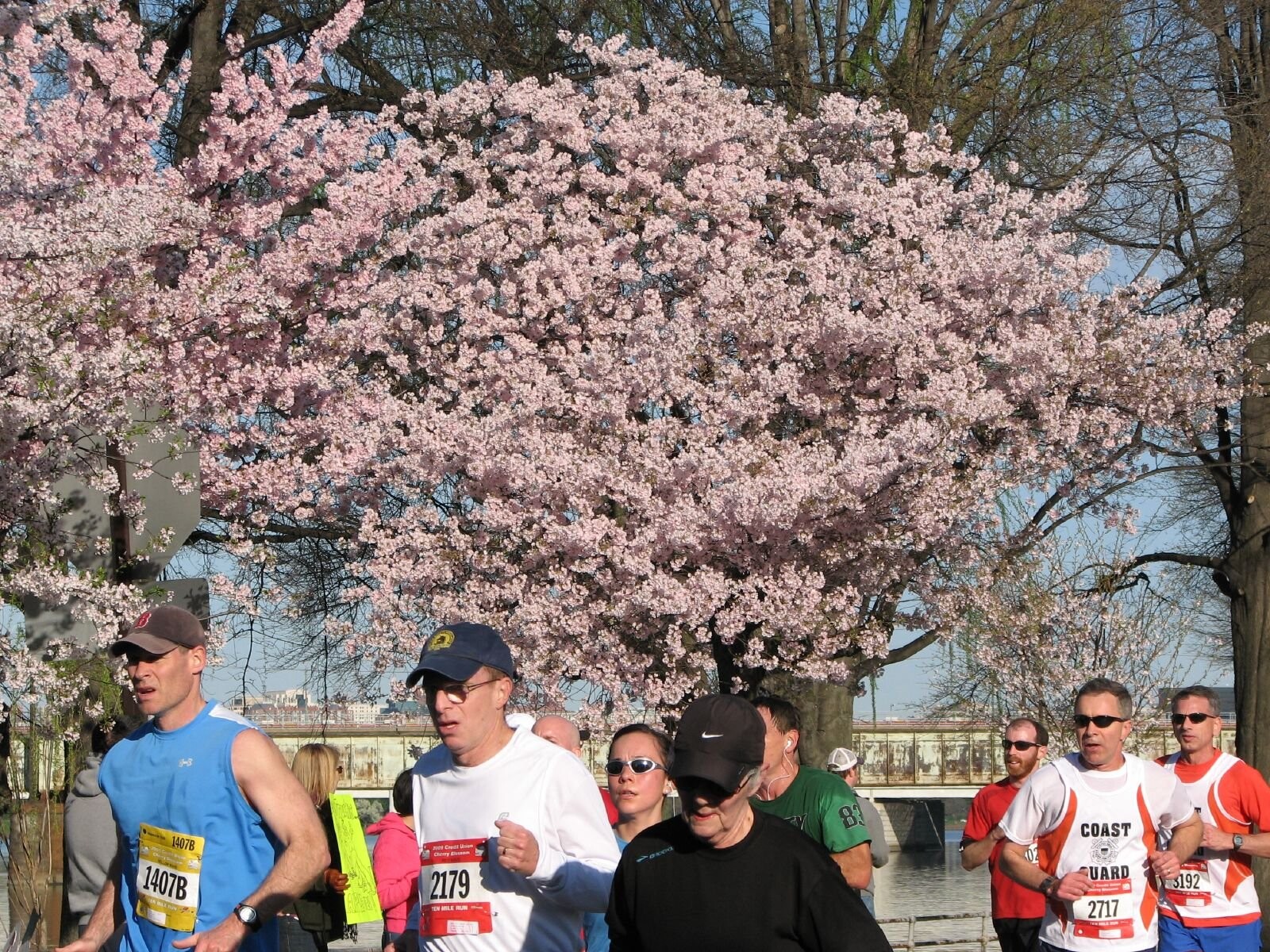
This year, international elite runners will be competing for $40,000 in prize money. The prize purse for Americans totals $25,000, and American runners placing in the top-10 overall are eligible to receive both open and American-only prize money. There is an additional $6,000 in RRCA RunPro Alumni Development Awards — runners eligible for the RRCA awards can also collect top-10 open and/or top-10 American payouts.
There is also a time-based set of bonus payments on offer for fast times:
• $50,000 to be shared by any runners setting a World Best or American Record*• Time incentives of $1,000 for the 1st male to run sub-46 minutes and 1st female to run sub-52 minutes, with an additional $750 on offer should a second male and/or female achieve those same sub-46 and sub-52 minute milestones.
The 10 Mile will serve as the USATF 10 Mile Championships, the RRCA National 10 Mile Championships, and the 2022-2023 Professional Road Racing Organization (PRRO) Circuit Championship.
Winners of the individual 2022-2023 PRRO Circuit events will be eligible for the $10,000 PRRO Super Bonus by winning the PRRO Championship (the bonus is split if an eligible male and female win the Championship). Susanna Sullivan and Nicholas Kosimbei are eligible for the PRRO Super Bonus. Any non-eligible winner of the PRRO Championship Super Bonus will earn $2500.
* If World Best times and American Records for men and women are set by the winners at the event (e.g. four records set), the $50,000 record bonus would be split into four $12,500 shares. If only one World or American record is set for either men or women, the athlete setting the record would get the full $50,000. If an American sets an American record and no other World or American records are set, he or she would receive the entire $50,000 as well. Currently, the times to beat are as follows:• Haile Gebreselassie’s (ETH) World Athletics Best of 44:24, run at the Tilburg 10 Mile in Tilburg, Netherlands, September 4, 2005;• Keira D’Amato’s World Athletics Best in a women’s only race of 51:23, run at the UpDawg 10 Mile in Washington, DC, November 24, 2020;• Greg Meyer’s American Record of 46:13, run at the Cherry Blossom 10 Mile in Washington, DC, March 27, 1983; and• Keira D’Amato’s previously mentioned World Best 51:23, which is also the American Record for a women’s only race.
For reference, the fastest CUCB time among the men’s field announced today is Kosimbei’s 45:15, which tied the event record set by Kenya’s Allan Kiprono in 2012. Among the elite women, Nell Rojas’s 52:13 from 2021 is the best CUCB finish time among this year’s elite entrants. Abbabiya Simbassa’s 46:18 from 2021 is the best CUCB mark among the American men, while Nell’s 52:13 is, of course, the leading mark among the American women.
The inaugural Cherry Blossom Ten Mile in 1973 was won by Sam Bair, in a time of 51:22; the women’s winner was Kathrine Switzer, in a time of 1:11:19; 127 men and 12 women ran that first race. Bill Rodgers holds the honor of most victories, with four consecutive wins between 1978 and 1981. Three women have each won the race three times: Julie Shea (1975-77), Lisa Weidenbach (1985, '89 and '90) and Lineth Chepkurui (2008-10). Ben Beach leads all Cherry Blossom finishers with an active streak of 49 years. A comprehensive media guide detailing a wide variety of statistics from the first 49 CUCB races is available here.
Thanks to Credit Union Miracle Day’s title sponsorship since 2002, the Credit Union Cherry Blossom Run has raised over $10.2 million for the Children’s Miracle Network Hospitals, including $323,000 in 2022.
About the Credit Union Cherry Blossom 10 Mile:
The Credit Union Cherry Blossom races, organized by Cherry Blossom, Inc., a 501c(3) chapter of the Road Runners Club of America, are known as “The Runner’s Rite of Spring®” in the Nation’s Capital. The staging area for Sunday’s 10 Mile is on the Washington Monument Grounds, and the course passes in sight of all of the major Washington, DC Memorials. In 2023, the reimagined Saturday 5K will stage on Freedom Plaza and traverse the route of Presidential Inaugurations down Pennsylvania Avenue before crossing the National Mall in the shadow of the Capitol Building and returning by the same route. The Kids Run is staged on the grounds of the National Building Museum. All events serve as a fundraiser for the Children’s Miracle Network Hospitals, a consortium of 170 premier children’s hospitals across North America. About one-third of the funds raised support Washington, DC’s own Children’s National (“Children’s Hospital”). The event also funds the Road Runners Club of America’s “Roads Scholar” program designed to support up-and-coming U.S. distance running talent.
Credit Union Miracle Day, Inc., a consortium of credit unions and credit union suppliers, is the title sponsor of the Credit Union Cherry Blossom 10 Mile, 5K, Kids Run and Virtual Run. Current presenting sponsors include ASICS, REI Co-op and Wegmans; supporting sponsors include CACI, Co-op Solutions, CUNA Mutual Group, FinisherPix, Gatorade Endurance, Guayaki, MedStar Health, PSCU, Potomac River Running, Suburban Solutions, The MO Apartments and UPS.
The 10 Mile is a proud member of the PRRO Circuit (PRRO.org), a series of this country’s classic non- marathon prize money road races with circuit stops in Washington, DC; Spokane, WA; and Utica, NY. The 2023 10 Mile will serve as the 2022-2023 PRRO Championship.
In addition to being sanctioned by USA Track & Field and the Road Runners Club of America, the Credit Union Cherry Blossom races have earned Gold Level Inspire Certification from the Council for Responsible Sport in recognition of its legacy of commitment to sustainability and thoughtful resource management.
To learn more, visit CherryBlossom.org and follow the event on social media @CUCB and #CUCB2023.
by David Monti
Login to leave a comment
Cherry Blossom Ten Mile Run
The Credit Union Cherry Blossom is known as "The Runner's Rite of Spring" in the Nation's Capital. The staging area for the event is on the Washington Monument Grounds, and the course passes in sight of all of the major Washington, DC Memorials. The event serves as a fundraiser for the Children's Miracle Network Hospitals, a consortium of 170 premier...
more...Emily Sisson sets a new half marathon American record in Houston
Emily Sisson shattered her own American record in the half marathon by finishing in 1:06:52. She is now the first American woman to break the 1:07 barrier after placing second behind race winner Hiwot Gebremaryam of Ethiopia, who ran 1:06:28.
Ethiopian Leul Gebresilase Aleme won the men’s half in a sprint finish. He ran 1:00:34—less than a second ahead of runner-up Wesley Kiptoo of Kenya.
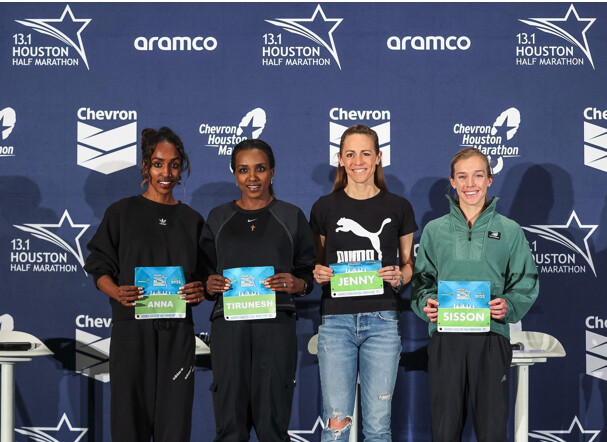
Emily Sisson Re-Breaks Her Own American Record
Sisson improved on her record the hard way by going out fast, slowing down slightly through the last sections, and kicking it in towards the finish. After Gebremaryam broke the race open in the first few miles—by 5K, she was already 17 seconds ahead of the chase pack—Sisson ran with Jessica Warner-Judd of Great Britain through 15K. The American record-holder averaged 5-minute mile pace through the first 5K but struggled in the latter half of the course, clocking 5:12 miles around 20K.
“I went out a little too fast the first 5K or so, so the last few miles I was definitely feeling it,” Sisson said on the ABC 13 broadcast.
But Sisson pushed through the discomfort as she neared the finish line to make history once again. “I’m really excited about it. I really wanted to break 67 minutes and I’m happy I did,” she said. “I actually think I could have run a little more evenly so I’m already hoping to run another half and even try to run faster.”
Sisson broke the American record for the first time in May 2022 at the USATF Half Marathon Road Championships in Indianapolis. The Providence College alum won the national title in 1:07:11, four seconds faster than the previous American record set by Sara Hall less than four months earlier at the 2022 Houston Half Marathon.
Prior to the U.S. championships, Sisson came extremely close to the mark on two occasions. When the record was 1:07:25 (held by her former training partner Molly Huddle), she ran 1:07:30 in 2019 and 1:07:26 in 2020.
Last year, the momentum continued in a big way for Sisson when she broke the American record in the marathon. In October, she demolished the time by running 2:18:29 in Chicago—lowering the previous record set by Keira D’Amato at the 2022 Houston Marathon by 43 seconds.
Close Finish in the Men’s Half Marathon
The men’s half marathon featured one of the most exciting finishes of the day. After pulling away from the chase pack together with a few miles remaining, Aleme and Kiptoo battled down to the wire. The East African competitors fought through the homestretch—where Kiptoo kept looking back to assess the distance between himself and his rival—until Aleme sprinted ahead at the last second to claim the victory.
Aleme’s performance follows a breakthrough season, which included a runner-up finish at the 2022 London Marathon in October.
Conner Mantz was the first American to finish after placing sixth in 1:01:12.
Past Greats Return to Racing, While Familiar Faces Make Debuts
In addition to Sisson’s record, there were several other notable performances in the Houston women’s half marathon, including Huddle in her postpartum return to competitive racing. The previous American record-holder finished fifth in 1:10:01 almost nine months after welcoming her daughter. In her 13.1 debut, former 1500-meter specialist and Olympic bronze medalist Jenny Simpson placed ninth in 1:10:35. Also making her debut, Vanessa Fraser finished 13th in 1:11:00. All three had room to spare in achieving the standard to compete at the 2024 U.S. Olympic Marathon Trials.
Three-time Olympic champion Tirunesh Dibaba also made her highly anticipated return. In the Ethiopian's first race in four years, she finished 16th in 1:11:35.
by Runners World
Login to leave a comment
Aramco Houston Half Marathon
The Chevron Houston Marathon provides runners with a one-of-a-kind experience in the vibrant and dynamic setting of America's fourth-largest city. Renowned for its fast, flat, and scenic single-loop course, the race has earned accolades as the "fastest winter marathon" and the "second fastest marathon overall," according to the Ultimate Guide to Marathons. It’s a perfect opportunity for both elite athletes...
more...Track legend Jenny Simpson puts her most challenging year behind her as she turns to the roads in 2023
After a year in which her world was turned upside down, the track legend has a new sponsor and new event as she makes her half marathon debut in Houston on Sunday.
As the Marshall Fire approached her house on December 30, 2021, there was a brief moment where Jenny Simpson thought to herself, I can’t believe I’m doing this. The house Simpson shares with her husband Jason was formerly a schoolhouse, built in 1900 and located in Marshall, Colo., 15 minutes southeast of Boulder. And on that day, it was under threat from what would eventually become the most destructive fire in state history.
The fire, spread by wind gusts of over 100 miles per hour, was moving quickly. As thick smoke enveloped their property, choking their lungs and blocking their vision, the Simpsons prepared for the worst. Trying to limit the burn, they watered down the yard with hoses, inadvertently soaking their clothes as the wind blew the spray everywhere. Then, as the flames moved in, Simpson took one last lap around the house, grabbing their laptops, their Jack Russell terrier Truman, and a bag containing her running medals and memorabilia — one she had assembled a month earlier while being interviewed for a documentary and fortunately had yet to unpack.
Simpson, like many of us, had previously had that conversation about the one thing you would grab if your house was burning down. She had always answered with her Bible, handed down to her from her great-grandmother Genevieve Schermerhorn (“Grandma Jenny”), for whom she was named. So, as she grabbed the Bible from her office and dashed out of the house, it hit her: I think I’m grabbing the thing that you get because we might lose everything.
By the time Simpson made it to her car, she no longer knew where Jason was or whether he would make it back to the car — the smoke was so dense, it was difficult to see. He eventually made it and they sped away from their house, not knowing when they would return — or if the house would still be there when they did.
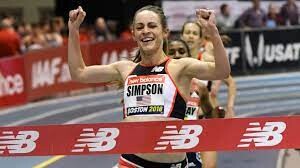
Over the course of two days, Marshall Fire would ultimately burn over 6,000 acres, destroy over 1,000 buildings, and cause over $500 million in property damage, making it the most destructive fire in Colorado history. It was a traumatic event for Simpson and her community.
Though the Simpsons’ home survived the fire, it sustained damage, forcing them to live elsewhere while it was repaired. They bounced around from a hotel to the spare bedroom of some friends from church to, eventually, a sparse apartment near the University of Colorado campus, living out of a backpack with the few things they had managed to grab from their home before the fire hit.
“It’s hard to describe how stressful that time was,” Simpson says.
On top of that, Simpson was working through a sports hernia and stress reaction in her right hip — the most significant injury of her career — and her professional future was less certain than ever. During the 2010s, few athletes were more consistent and dependable than Simpson. From 2007 through 2019, Simpson made all nine World/Olympic teams for the United States, piling up 11 national titles, three World Championship medals, and an Olympic bronze in 2016. That success led to a series of lucrative contracts from her sponsor, New Balance, and, as a highly-ranked athlete, health insurance from USOPC.
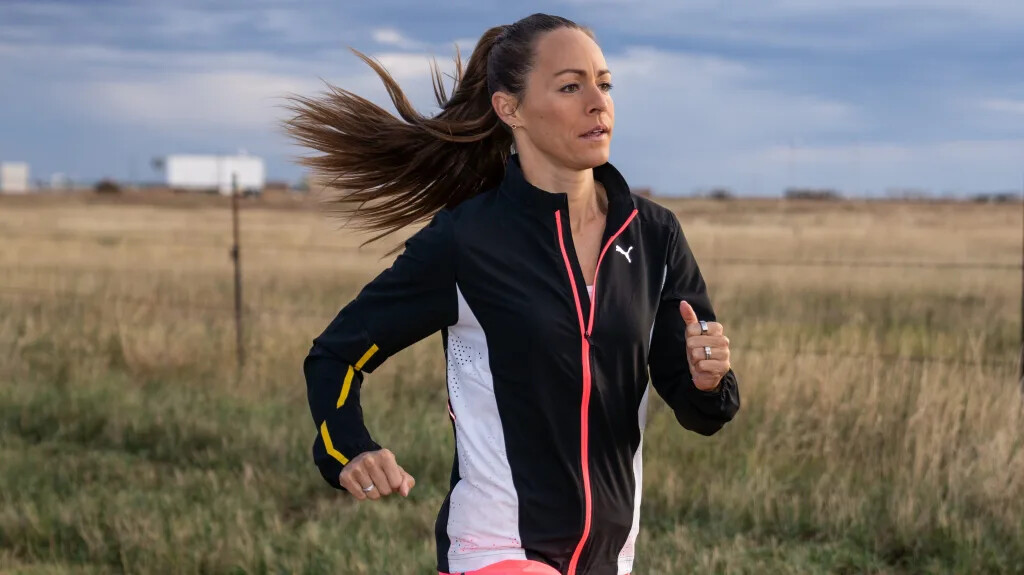
But Simpson’s New Balance contract expired at the end of 2021 — just two days after the fire that displaced her from her home. On January 1, she lost her health insurance coverage from USOPC (to qualify for coverage, an athlete had to have medalled at either the 2019 Worlds or 2021 Olympics, finished in the top 12 at the 2021 Olympics, or finished the season ranked in the top 15 in the world in their event; Simpson no longer met any of the criteria). As 2022 began, she still had Jason, and she still had the support of her longtime coaches, Mark Wetmore and Heather Burroughs. But the other constants in her life suddenly weren’t so constant.
“This last year, I felt more vulnerable than ever,” Simpson says. “The major safety nets in my life have been being a top-performing athlete and being in the tier system and in the USATF system, being a New Balance athlete and knowing I have a future there and my security at home. And my health. All of those things were really wobbly and testy and some of them fell apart in the last year.”
Rebuilding and replacing
One year has passed since the fire that upended Simpson’s world. Some elements of her life have been rebuilt, others replaced. The Simpsons moved back into their house in Marshall on April 1, and after months of work, she says it is 100% back to normal. Her body is also back to full health. That too required months of work.
Simpson had felt pain in her hip area during the fall of 2021 and though she didn’t give it much thought initially, it grew into something that significantly disrupted her training. Even as 2022 began, she remained in denial. After her streak of making teams ended at the 2021 Olympic Trials, Simpson knew she couldn’t afford to miss time if she was to return to her best.
“Pushing through cross training, pushing through the life challenges that we were going through, I definitely made my circumstances a lot worse,” Simpson says. “And I don’t think that’s unusual for runners. That’s kind of in our nature.”
Simpson was determined to avoid surgery, but realized such a path would require a more conservative approach. As winter turned to spring, Simpson, reluctantly, began to back off the intensity to allow her body to heal.
“The toughest thing about having a sports hernia injury and choosing to rehab and go that route and not jump straight into surgery is that it’s just slow,” Simpson says. “And none of us that are athletes, I think in particular runners, want to take anything slow.”
Simpson did not race at all last spring or summer, missing USAs for the first time since 2006 and missing the chance to represent the US at the first World Championships held on American soil. Simpson is now healthy again, but she’s still rebuilding the fitness she lost in 2022.
Another pillar of Simpson’s life — her New Balance contract — had to be replaced rather than rebuilt. Simpson did not want to go into specifics, but says that while New Balance verbally offered her a deal at a reduced level from her previous contract, the two sides ultimately could not reach an agreement. Eventually, Simpson, who had not used an agent since 2014, hired Hawi Keflezighi to negotiate a new deal and announced a sponsorship agreement with Puma in October.
Leaving New Balance behind was painful. Simpson signed with the company coming out of the University of Colorado in 2010, and after 12 years together had envisioned staying with the brand in some fashion for the rest of her life. Seconds after crossing the finish line in 10th in the 2021 Olympic Trials 1500, Simpson looked at the scoreboard and saw that Elle St. Pierre, Cory McGee, and Heather MacLean — all New Balance athletes — had gone 1-2-3 to make the team; Simpson was the first to congratulate them. She figured that, even once her racing days were over, there would still be some sort of role for her at New Balance.
“My whole future in sport and beyond was about how can I take what I’m learning in my career and make that in any possible way benefit the women’s team in the future,” Simpson says. “So seeing that [1-2-3 at the Trials] and knowing there was a strong middle distance future here and how can I continue to pour into that, that’s what I thought my future was.”
A move to the roads and a new beginning
For the first decade of her professional career, Simpson’s running life was fairly straightforward. She was consistently one of the best in the world in her event, meaning she could enter any race she wanted and was always in-demand from her sponsor (two of the reasons she went without an agent for so long). Every year since rejoining Wetmore and Burroughs in 2013 (she was coached by Juli Benson from 2010-12), she would sit down with them and figure out how to be at her best in the biggest race of the year, either the World Championship or Olympic final. More often than not, she succeeded.
But after failing to make the Olympic team in 2021, Simpson began to ponder her athletic mortality. She was nearing her 35th birthday and had a few options if she wanted to stay in the sport.
“The biggest consideration was, do I move up to the 5k, do I try to run a great 10k, or do we do something totally different?” Simpson says.
(LetsRun founder Robert Johnson will be devastated to learn Simpson did not mention the steeplechase, the event in which she won two US titles and set the American record in 2009).
Simpson dipped her toes into Option C by running the Cherry Blossom 10-Miler in September 2021 (she finished 2nd in 52:16). Midway through 2022, she had fully committed to the roads.
“It’s always been part of the plan that I would give the roads some good years of my career,” says Simpson. “And I think I just saw those really good years becoming fewer and fewer and I realistically wanted to make the transition before I was so, not just physically tired, but also just emotionally drained and psychologically drained from the intensity of it.”
The last few years, Simpson carved out a niche as a mentor to some of the up-and-coming athletes in the Colorado program. As a volunteer assistant at CU, Simpson was able to watch runners like Dani Jones and Sage Hurta at practice, then aid their transition to the professional ranks by traversing the circuit alongside them as a competitor/friend. With Simpson’s move to the roads, that period of her career is over.
“I think that’s what I’ll miss the most, is feeling like I get to be a little bit of a mother hen for the [Colorado] women that are doing really well and have a future as a pro in the sport,” Simpson says.
Now, Simpson is heading into the unknown. The training, obviously, is different. Though Simpson ran relatively high mileage for a 1500 runner — it was not uncommon for her to hit 80 miles in a week — she is now running 80+ regularly, doubling up to five times per week. During her track career, a long workout for Simpson would consist of 12 or 14 by 400m. Now she’s running 2k and 3k repeats on the track.
“That’s a long way to go for someone like me,” Simpson says. “…You go out on the first lap or two and you think, Are you kidding me? This is it? But it doesn’t stay easy for very long.”
Simpson has also had to educate herself about the road races themselves. When we first spoke for this story in November, Simpson admitted that, outside of the World Marathon Majors, she didn’t know many of the major road races and was still learning about how they stacked up against each other in terms of prestige.
Part of that is due to how the sport is structured. Track is simple: Worlds or the Olympics is the end goal and the rest of the season is built around that. The roads are different — people reach top fitness at different times. For marathoners, it’s fairly intuitive — pick one race to peak for in the spring and one in the fall. But Simpson isn’t a marathoner (yet). For road racers at shorter distances, it’s more choose-your-own-adventure.
Simpson’s plan: sit down with Wetmore and Burroughs, pick a race to gear that year’s training around, and attack it like they would a World Championship or Olympics.
“Even though it’s not to the world a big World Championships, it will be Mark and Heather and Jenny’s World Championships,” Simpson says.
As for the marathon, Simpson would not commit to running one eventually, but did not rule it out either. She watched Jason, after years of grinding, finally qualify for the Olympic Marathon Trials at CIM in 2018 and knows how difficult the event is. She has no desire to rush into one.
“It is really freaking hard,” Simpson says. “You don’t know for sure that your body is suited for it just because you’ve been a good runner…What it will take for me to run a marathon? If I have a great half and I feel like my body’s handling that workload really well, we’ll absolutely do a marathon. Because at that point, you’ve gotta find out, right?”
Next stop: Houston
The big question hanging over all this: will Jenny Simpson be any good on the roads? It’s no certainty that prime Simpson, the one who won a record eight Fifth Avenue Miles, would have been a force over 10k and beyond, much less the 36-year-old version coming off the most disruptive injury of her career.
Thirty-six is not necessarily old by distance standards, though. Last year, Keira D’Amato broke the American marathon record at 37 and Sara Hall broke the American half marathon record at 38. Like Simpson, both were for a time milers on the track before moving up — though it took each several years before their big breakthrough.
After down years in 2021 and 2022, logic says Simpson could have a tough go of things. The bar for success, certainly, will have to be recalibrated. At her best on the track, Simpson was one of the top three women in the world in her event. That level of accomplishment is virtually impossible for her on the roads, but could she become one of the best in the US in the 10k, half, or marathon?
Her road debut at Cherry Blossom in 2021 was auspicious (2nd place, 52:16), her appearance at last fall’s USATF 5K champs in New York less so (she was 17th in 16:07, 39 seconds behind winner Weini Kelati) — though Simpson wasn’t fully fit in New York and knew that going in.
2023 will be the real test of whether Simpson has anything left to give on the roads. And for Simpson, 2023 begins in Houston, where she will make her half marathon debut on Sunday. There is a lot riding on the outcome, which is how Simpson likes it. She has yet to pick that one race that she will plan her 2023 season around; Houston will help her make that decision.
“This will kind of chart my course of whether we stick with the half marathon, whether I start dreaming about a marathon, or whether I say maybe it’s better for me to get back on the track, spike up, and do some faster stuff over the next year,” Simpson says.
Simpson says that while her training has gone well, the adjustment to training for the half marathon has been more challenging than she expected.
“When I ran Cherry Blossom and I ran 5:14/mile pace the whole way, the idea of running 5:10’s for a half marathon (67:43 pace) seemed right around the corner,” Simpson says. “Now having gone through a year of injury and a lot of other life challenges, I’m having to adjust what I think my half marathon debut is going to look like.”
Simpson will have Jason with her as a pacer on Sunday and said they will plan to go out faster than her pace at the Army 10-Miler in October, a race she won in 54:16 (71:08 half marathon pace). She says she has a time goal in mind but elected not to share it. Her main hope is that she can finish the race well. During her track career, Simpson was famous for her strength in the final 100 meters, but in her last two road races, she felt as if she was holding on for dear life at the end.
Simpson will step to the line on Sunday with an uncertainty that did not exist during her track career. When Simpson started a 1500-meter race, she came armed with knowledge gleaned from years of experience. She knew exactly what sort of time she could expect her workouts to translate to and how to respond tactically to every race scenario. In the half marathon, she’s starting over.
“That’s one of the trepidations of going into the race in Houston is that I’m so used to having such a clear idea of what I am capable of,” Simpson says. “My race in Houston will be as much of a discovery as the training has been.”
Even Simpson admits she doesn’t know how many more years she’ll continue to race professionally. A few years ago, she had scripted out a storybook ending for herself: a fourth Olympic team in Tokyo and a home World Championships in front of friends and family in Eugene. Make those two teams, she thought, and she would have total freedom to do whatever she wanted afterwards, whether it was continuing to race on the roads, pursuing a coaching career, or starting a family.
That, of course, did not happen. In professional sports, endings rarely go according to plan. But Simpson is embracing the adventure that comes with her new path, wherever it leads.
“The idea I had in mind was kind of cool, but there are some things that we’re now looking forward to that I couldn’t have even imagined,” Simpson says. “And if it turns out that way, it will end even better.”
by Jonathan Gault
Login to leave a comment
Aramco Houston Half Marathon
The Chevron Houston Marathon provides runners with a one-of-a-kind experience in the vibrant and dynamic setting of America's fourth-largest city. Renowned for its fast, flat, and scenic single-loop course, the race has earned accolades as the "fastest winter marathon" and the "second fastest marathon overall," according to the Ultimate Guide to Marathons. It’s a perfect opportunity for both elite athletes...
more...B.A.A. announces women’s elite field for 127th Boston Marathon
The Boston Athletics Association (B.A.A.) has revealed the women’s elite field for the 127th Boston Marathon on Monday, April 17. The field features 16 women who have run under 2:21, including the 2022 world marathon champion Gotytom Gebreslase and two-time Boston champion Edna Kiplagat.
Three other notable athletes who are making their Boston debuts are 2022 world championship bronze medallist Lonah Salpeter of Israel, 2022 NYC Marathon champion Sharon Lokedi, and 2022 Valencia Marathon champion (and third fastest woman of all-time 2:14:58) Amane Beriso of Ethiopia.
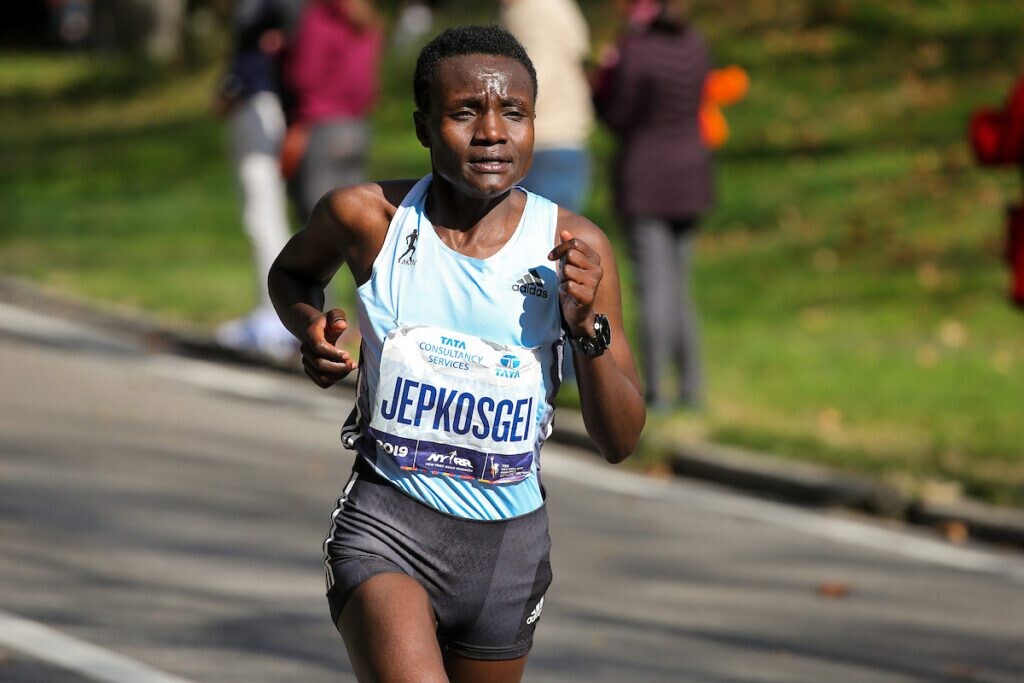
“I am very excited to run the B.A.A. Boston Marathon this year,” said Salpeter in a press release. “It has always been my dream to run on this course and to experience the incredible atmosphere.” Salpeter is coming off a second-place finish at the New York City Marathon in November and a bronze medal in the 10,000m at the European Championships in August.
Last year’s second and third-place finishers in Boston, Ababel Yeshaneh of Ethiopia and Mary Ngugi of Kenya, both return with hopes of claiming the top spot on the podium. Yeshaneh came within four seconds of victory, while Ngugi placed second and third in Boston in back-to-back years.
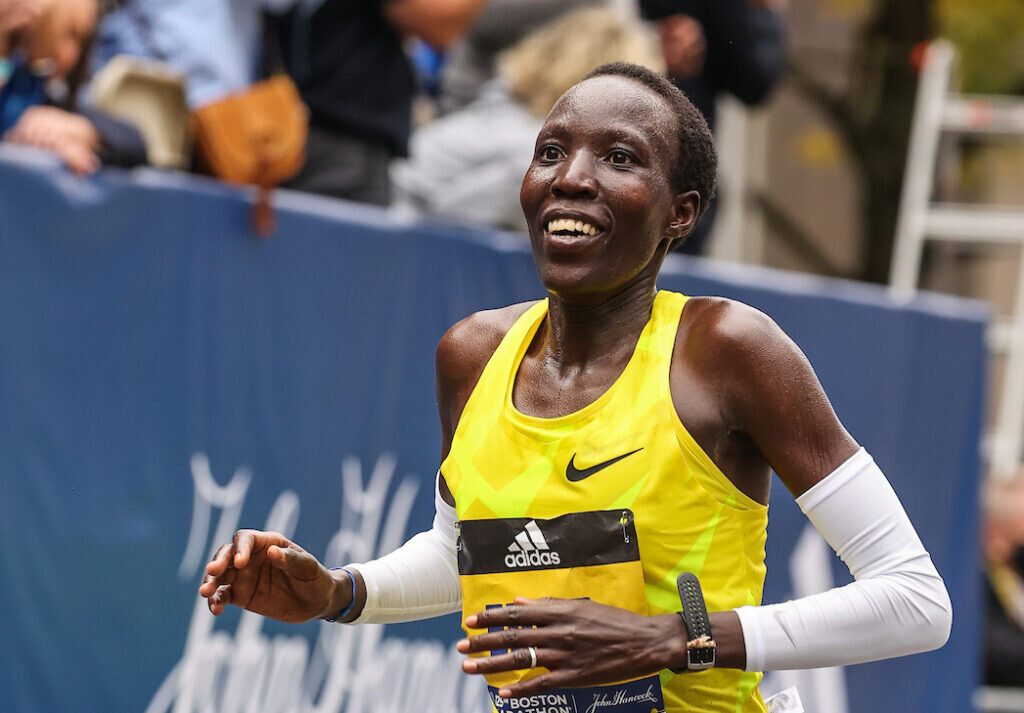
Also back is Joyciline Jepkosgei of Kenya, a past winner of the New York City and London Marathons. Jepkosgei fell shy of her expectations in her 2022 debut, with a seventh-place finish. She will look to better her time of 2:24:43 in 2023.
Among the American contingent are Sara Hall, Aliphine Tuliamuk, Emma Bates, Nell Rojas and 2018 champion Des Linden. Rojas has finished as the top American at Boston two years in a row (fifth in 2021 and 10th, 2:25:57 in April 2022), while Hall and Bates were fifth and seventh in the marathon at the 2022 World Athletics Championships in Eugene, Ore.
Canada will be well represented in Boston with three athletes on the elite list. Liza Howard, the top Canadian at the 2022 Chicago Marathon, will lead the way with the top qualifying mark of 2:35:29. Howard is an up-and-coming marathoner out of Toronto, who had a breakthrough 2022 with a 19th-place finish in Chicago and a 12th-place result at the Canadian 10K Championships in Ottawa last May.
Other Canadians on the elite list are 2004 1,500m Olympian and masters athlete Carmen Hussar, who has returned to racing recently, coming off a Boxing Day 10 Miler win in Hamilton, Ont., and Julie Lajeunesse of Montreal, with a personal best of 2:44:49 from the 2022 Chicago Marathon.
by Marley Dickinson
Login to leave a comment
Boston Marathon
Among the nation’s oldest athletic clubs, the B.A.A. was established in 1887, and, in 1896, more than half of the U.S. Olympic Team at the first modern games was composed of B.A.A. club members. The Olympic Games provided the inspiration for the first Boston Marathon, which culminated the B.A.A. Games on April 19, 1897. John J. McDermott emerged from a...
more...Emily Sisson, Conner Mantz, Jenny Simpson, Tirunesh Dibaba Headline 2023 Aramco Houston Half Marathon
The Houston Marathon Committee announced today the elite athletes who will chase the $10,000 first-place prize in this historically fast race. Elite fields for the Chevron Houston Marathon which is held simultaneously on Sunday, January 15, will be announced tomorrow.
American records in the half marathon and marathon were set in Houston last year, but by the end of 2022, Emily Sisson had broken them both. Houston will be Sisson’s first race since running 2:18:29 at the Bank of America Chicago Marathon in October, shattering Keira D’Amato’s record by 43 seconds. Earlier in the year, her 1:07:11 performance in Indianapolis shaved four seconds off Sara Hall’s half marathon record.
“I have really enjoyed racing here in the past and am excited to start my 2023 season in Houston,” said Sisson who finished fifth in the 2019 Aramco Houston Half Marathon. “I felt good coming out of Chicago and am really looking forward to another opportunity to race.”
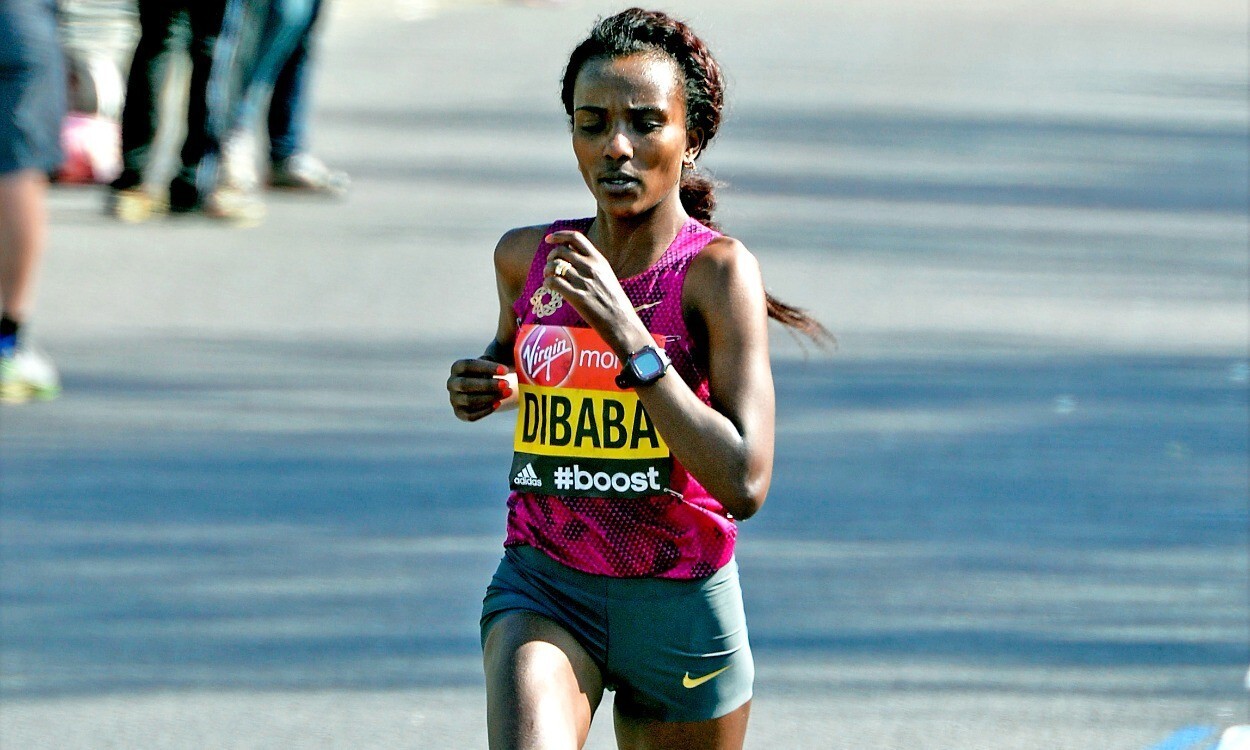
Sisson will have to contend with one of the greatest distance runners of all time as Tirunesh Dibaba of Ethiopia makes a return to competition after a more than four-year hiatus. The three-time Olympic gold medalist and five-time world champion has not raced since 2018 but says after giving birth to a second child in 2019 and then battling COVID-19, she is ready to add another chapter to her storied career.
“Houston is a famous race and my training has been going well,” said Dibaba, the 2017 Chicago Marathon Champion. “It seemed like the best way to test myself and see what could be next.”
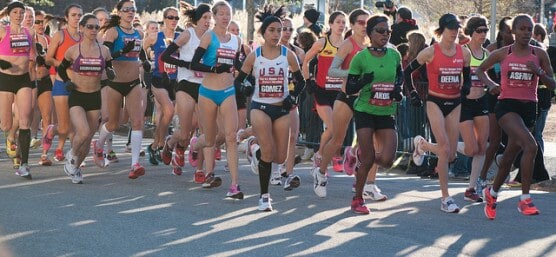
Other top contenders in the women’s half marathon elite field include 2021 Berlin Marathon runner-up Hiwot Gebrekidan of Ethiopia and 2022 World Championship Marathon fourth-place finisher Nazret Weldu of Eritrea. Dom Scott will attempt to break the South African half marathon record of 1:06:44, after a 3rd place finish in Houston last year. The top Americans include 28-time U.S. Champion Molly Huddle who set the then-American record here in 2018, as well as World Champion and Olympic Bronze Medalist Jenny Simpson who will make her half marathon debut.
“All of the racers I am learning from speak so highly of their experience with the Aramco Houston Half Marathon,” said Simpson. “It’s the perfect place for me to make my half marathon debut because the timing, course and organization are so well tested.”
In the men’s race, Edward Cheserek of Kenya, known to fans as “King Ches,” will look to trade in his crown for a king-sized belt buckle. Cheserek is coming off a 1:00:13 half marathon personal best in Valencia last month. “After Valencia this fall, I’ve trained harder and think sub-60 is possible,” said Cheserek, a 17-time NCAA Champion at the University of Oregon. “Houston is known for being a fast course and I want to have a chance at a personal best.”
Cheserek will face off against 2019 champion Shura Kitata of Ethiopia who lines up for his fourth Aramco Houston Half Marathon. With career marathon victories in London, Frankfurt and Rome, Kitata says he “feels home and comfortable in Houston.”
Other contenders to watch are Ethiopia’s Leul Gebresilase Aleme, runner up at last year’s London Marathon, and 2020 Olympian Mohamed El Aaraby of Morocco. The top American in the field is Conner Mantz of Utah. Mantz, the 2020 and 2021 NCAA Cross Country Champion at BYU, made his much-anticipated marathon debut in Chicago last October running 2:08:16, the fastest debut ever by an American-born runner.
Houston-native Frank Lara will return for a second consecutive year. Lara, a former Gatorade Texas High School Runner of the Year, was the top American finisher in the marathon last year. This year he competes in the half marathon.
The HMC is the only organizer to host two World Athletic Gold Label events simultaneously, which are Sunday’s Chevron Houston Marathon and Aramco Houston Half Marathon. These two races will have over 27,000 registrants, with an additional 6,000 registrants in the We Are Houston 5K presented by Aramco and Chevron, held on Saturday, January 14.
“Whether you are an elite athlete or a new runner, our committee is dedicated to hosting your individual pursuits with the utmost care and respect for the extraordinary efforts made to toe the start line with us,” said Wade Morehead, Executive Director of the Houston Marathon Committee.
The Aramco Houston Half Marathon and Chevron Houston Marathon will be broadcast on ABC13 from 7 a.m.-10 a.m., on Sunday, January 15 with a race day recap at 10:35 p.m. Joining ABC13’s Greg Bailey and Gina Gaston as expert commentator will be Des Linden, the 2018 Boston Marathon winner and 50K world-record holder. Linden made the first of her two U.S. Olympic Marathon teams in Houston in 2012. The trio will be joined by long-time analyst and Rice University cross country coach Jon Warren.
by Letsrun
Login to leave a comment
Aramco Houston Half Marathon
The Chevron Houston Marathon provides runners with a one-of-a-kind experience in the vibrant and dynamic setting of America's fourth-largest city. Renowned for its fast, flat, and scenic single-loop course, the race has earned accolades as the "fastest winter marathon" and the "second fastest marathon overall," according to the Ultimate Guide to Marathons. It’s a perfect opportunity for both elite athletes...
more...5 Reasons Why Athletes Can Embrace Aging
My grandfather lived until he was 94. By the time he died in 2009, he was the sole survivor of 13 siblings. His secret? For as long as I can remember he used to say, with a gusto I have yet to match, "You just have to keep moving!" And with every passing birthday he'd also remind me: "Getting older is better than the alternative."
Those two pearls of wisdom have continued to serve me well. But it has also occurred to me that since I became a masters runner (defined as 40 and older), I've focused primarily on the negative aspects of aging-albeit, mostly factors that my grandfather never had to experience. Women face a lot of challenges in mid-life that make it hard to maintain a cheery disposition, even as that simple advice to "keep moving!" holds true.
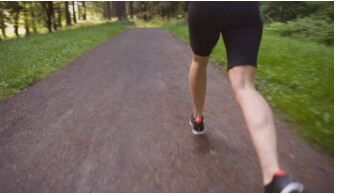
The decline of estrogen levels has an effect on just about everything, including mood, sleep, body composition, bone density, muscle mass, and more. It's a lot to navigate-especially for those of us who've been athletes for most of our lives. We have to adjust expectations and relearn how to properly train our bodies that have new needs and capabilities.
It's natural to fixate on what we're potentially losing as the years go by. But what if we explored the ways that aging serves us, instead? I'm not trying to pollyanna our way out of perimenopause, but taking a little time to reflect on the happier sides of getting older might entice some of us to relish this phase instead of fear it.
So I called Selene Yeager, host of the podcast Hit Play Not Pause and content manager for Feisty Menopause, a site that covers training, nutrition, and lifestyle advice to help women maximize performance during menopause and beyond. She shared some expertise and insight on how athletes can find hope and enjoyment during the second half of their active lives. Out of that conversation and many others over the years with runners who have experienced longevity in the sport, I came up with five reasons to embrace masters running.Perspective.
It is impossible to acknowledge or appreciate the bigger picture when you're younger. Every botched workout, every missed PR, every off-pace long run seems like a big deal. But then life expands in wild ways. Whether it's a spouse or children or career or aging parents, everybody seemingly needs something from you for quite a while.
The upside? Those important people who need you can also put performance into perspective. Before running the Berlin Marathon in September, Keira D'Amato, 37, who was trying to improve her American record during the race (2:19:12, which has since been broken by Emily Sisson at the Chicago Marathon in 2:18:29), remarked that while her goals are a priority, her results actually don't matter much in the grand scheme.
"At the end of the day, no matter what happens, I'm still going to come home to two kids who will ask me what's for dinner," D'Amato said during a pre-race interview.
Similarly, Yeager remembers when her daughter was younger, she felt a pivot in her outlook, too. "You're not sitting there ruminating about yourself anymore-it's a similar sort of transition phase in a woman's life that can bring that better head space."
The even better news is that eventually a lot of those people become less dependent as we enter midlife, leaving new-found time to focus more on your own endeavors.
"The shedding of those ovarian hormones that have you nurturing everybody but yourself gives you the brain space to look at what you need and want," Yeager says. "And that is a great thing. Not that nurturing is bad, but it's time for you."Liberation.
The older we get, the less we care. In a good way. In the best ways, really. As Yeager puts it, "You can say it however you want, but you get to this point where you don't actually give a f*ck and it's very liberating and empowering."
You don't care what people think when you try something new, like mountain racing. You don't care what your time is and realize that nobody else does either (spoiler alert: nobody ever did care what your personal bests or weekly mileage were). You start to realize that the performances and goals can be broader and more creative than ever before-your effort can go toward something besides qualifying for the Boston Marathon, for example.
Look no further than somebody like Deena Kastor, who won the Olympic marathon bronze medal in 2004. Now 49, she still trains at a high level, but has continually redefined what success means to her, whether it's going after age-group records or racing all the World Marathon Major events, a goal she just completed when she finished the Berlin Marathon a few weeks ago, in 2:45:12.
"There's lots of empowerment that comes with midlife, especially around 50," Yeager says. "It takes some time and it might take hormonal changes-I don't know; they're still doing their research-to really accept and embrace that you are the only one thinking about you as much as you're thinking about you."Community.
Not long ago I spoke with Kathryn Martin, who at 70 years old had just taken a five-year break from competing on the masters track scene. She has two dozen age-group American records and a dozen world records, but was feeling a little burned out from the high-intensity pursuits. During that break, she didn't stop running, but she did cease serious training. What brought her back? Aside from a renewed desire to tackle more records, she missed all the friends she made on the circuit.
"What I really missed was the camaraderie. Masters runners are so unique," Martin told me. "You can be warriors on the track, but prior to and immediately afterward, everybody's hugging. We're just so happy to see each other and be in each other's company."
While you don't have to grow older to appreciate the running community, Martin is right. The masters category hits a little different. Yeager sees it, too-and hears about it from plenty of women she interviews.
"Even if you're really competitive still, there's a genuine appreciation for your peers," Yeager says. "We've seen a lot of shit in our lives at this point and that creates a lot of camaraderie. You're also just more secure in your skin and not having all your self-worth wrapped up in beating another person."Technology and research.
Sara Hall, 39, is the poster woman for longevity. She started having the best races of her career in her mid-30s, now one of the fastest U.S. women at the marathon (2:20:32). Many factors have worked in Hall's favor, but one thing she's continually given credit to is the advancement in shoe technology-not just the way in which they've elevated everybody's performances, but also how they've reduced the pounding on her legs and allowed quicker recovery between big efforts.
The generation entering its 50s now is the first to grow up in a post-Title IX world, with increased access to sports for their entire lives. As Yeager says, we aren't in the "Golden Girls" era anymore. Women remain competitive and active for far longer than they ever have not only thanks to that critical piece of policy, but also because of the technology (think: gear, nutrition, recovery tools, etc.) that keeps us healthier, longer. The research on all phases of the female athlete lifecycle still has plenty of catching up to do, but as it advances and we know better how to care for our maturing bodies, the possibilities will only increase.
"Everything we thought we knew about women after they had babies or when they go through the menopause transition-really about women at any stage-is being rewritten and discovered," Yeager says. "It's a huge thing, when performance and fitness is exponentially different because we've started and built it all from the time we were adolescents, many not stopping during pregnancy, either. Are you kidding? We're just different human beings than the women back in the Golden Girl time."Reinvention.
Ever want to try different distances? Different terrain? Are you triathlon curious? Have you heeded the often repeated advice to start lifting weights (seriously, you need to lift weights)? After all is said and done, if you're still not convinced that growing older as a runner can become an equally enjoyable experience, then reinvent yourself. Try something new and see the comparisons to your former self disappear.
Yeager, for example, didn't start CrossFit until she was 48 years old, when "it was time to start 'lifting heavy sh*t' as they say.'" Desiree Linden, 39, winner of the 2018 Boston Marathon, has said she's looking forward to exploring trails and ultra-distance races after she retires from competitive road racing.
"If you are open to expanding your horizons, it makes all the difference in the world," Yeager says. "You have nowhere to go but up. You're learning new things and experiencing something for the joy of it again. That's enormously positive."
It looks like my grandfather had a point. All you have to do is keep moving
by Trail Runner Magazine
Login to leave a comment
Make the Most of Difficult Long Runs
IF YOU’VE EVER found yourself mid–long run debating whether you should cut it short, you’re not alone. Fatigue has a way of inducing an internal discussion about the fate of your miles.
Making the decision that’s right for you can be tricky. On the one hand, you’re already really tired, and you have several miles to go. Won’t mindlessly sticking it out put you in a hole and compromise your upcoming training and racing? On the other hand, isn’t one of the main points of long runs to get used to “keep on keeping on” when the desire to stop strikes?
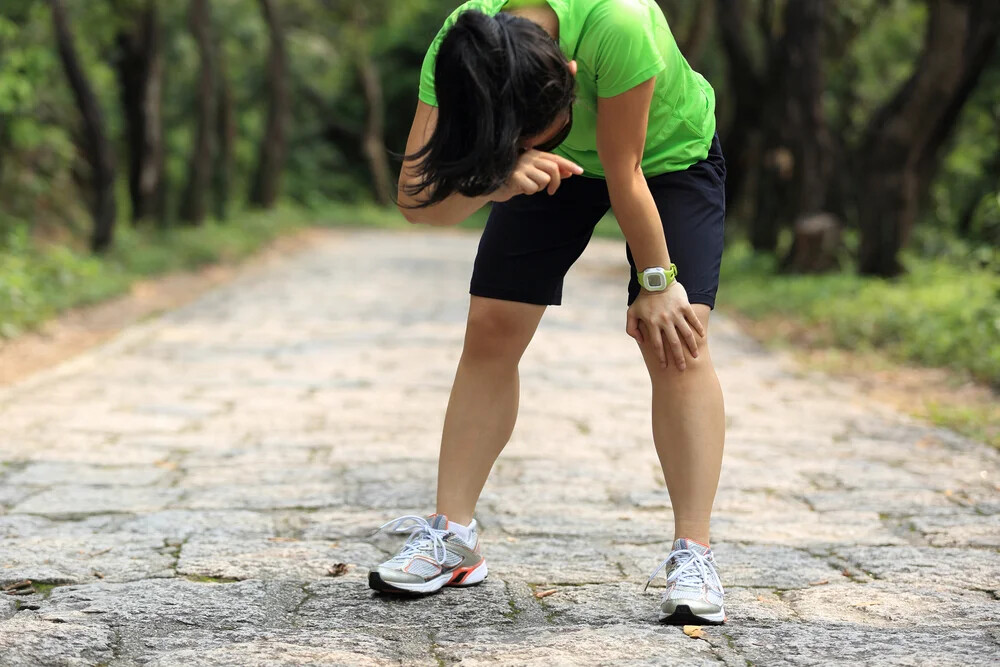
The best answer is “it depends.” Here are five things to consider to help you decide what to do.
• Do you have a specific bodily pain?
Discomfort—mild muscular fatigue or tightness, stomach distress, hot spots on your feet—is typical when you’re going long. These unpleasant sensations seldom merit changing your plan.
A specific bodily pain is another matter. Sara Hall, the second-fastest half-marathoner in U.S. history, says she cuts long runs short under only one condition—if she’s worried about an acute pain or tight spot becoming an injury.
A good rule of thumb: Assess whether your troublesome spot is making you alter your running form. If so, being disciplined in this instance means ending the run. Continuing with compromised form can lead to injury and cause problems elsewhere.
• Why do you want to stop?
Many runners consider stopping their long run because it’s a mental struggle or they’re just more tired than usual. We’re humans, not machines, after all, so this is common.
“People only have so much willpower,” says Mark Coogan, a member of the 1996 U.S. Olympic Marathon team who coaches the elite group New Balance Boston. Life circumstances are a part of training, so account for them, he says.
If your family or work life has been stressful lately, a long run can help you mentally reboot. But it can also seem like an obligation, and slogging away to hit an arbitrary mileage goal can further drain you psychologically. If the run isn’t crucial to your training, it’s probably not worth spending precious mental capital on it. So, cut the run short, and don’t beat yourself up for it.
If you feel okay mentally, but physically worn down from the start, you’re also probably best off cutting the run short, especially if you have an important race in the next week or two. If you don’t have a race soon, first try slowing your pace. If doing so doesn’t help—and the run isn’t super important—then go shorter.
• What is your long run goal?
Long runs for marathoners have two main goals: putting in time on your feet at an easy to moderate effort, and harder outings that incorporate stretches at goal marathon pace or a little faster. If you’re struggling on the first kind, see if backing off the pace helps. “I will adjust the pace if I’m not feeling like I should sustain the pace I’m at and prioritize hitting the distance,” Hall says. “In my mind, the point of a long run is to go the full distance or time, so I would rather finish the full duration and slow the pace down or cut the next day short if I need more recovery.”
Sara Slattery, retired elite runner, former college coach, and coauthor of How She Did It, says that seeing long runs through is an important part of marathon prep. “That run often gives athletes confidence,” she says. That’s especially true if covering the 26.2 miles of the marathon, without regard to pace, is the main challenge of the event. Knowing that you repeatedly stuck it out in training despite the urge to call it a day is a powerful psychological tool.
If you’re struggling on a long run that calls for segments at marathon race pace, consider doing a standard long run instead. Focus on hitting the distance, emphasize recovery, and try your race pace on the next long run instead.
• What are you training for?
Long runs have a place in all training programs. But prioritizing them depends on what you’re training to accomplish. If you’re getting ready for a marathon, they’re arguably the most important part of your buildup. If your focus is a 5K PR, not so much. Slattery and Coogan agree that if you’re not training for 13.1 or longer, the cut-it-short threshold is lower. Gutting out a two-hour run when you’re overly tired will likely detract from the harder sessions, like intervals, that specifically prepare you for shorter distances.
That’s not to say that marathoners should do all long runs as planned regardless of how they feel. “Almost all marathoners already know how to persevere,” Coogan points out. You don’t need to always prove to yourself you’re not a quitter.
• Is this bad run part of a pattern?
“If you are feeling that rundown and like you need to cut your runs short more than half the time, you may be overdoing it in training,” Slattery says. Adjust your distance or pace so you recover better and can train consistently.
Coogan suggests also looking outside your running. “Your takeaway is that you are overdoing it somewhere else in your life, and you don’t have the willpower right now,” he says. Figure out what’s making you mentally tired and what you can adjust.
WHAT TO DO IF YOU STOP YOUR LONG RUN SHORT
1. Maximize recovery.
Eat carbs and protein within an hour of finishing, hydrate, and do some gentle stretching or walking.
2. Take an additional easy day.
Even if it’s not on your training plan, doing a recovery run before your next challenging workout is smart.
3. Review your training.
Have you upped your mileage/intensity lately? Do you need more recovery time built into your plan? Are you not adjusting your training to meet the stressors of everyday life?
4. Make changes.
Your plan should be in pencil, and based on your answers to the questions laid out here, you might need to switch things up. Maybe you need three easy days before a tough session instead of one, an extra rest day per week, or long runs on more than one day a week. Every athlete is different, so your plan just might need a tweak to work for you.
Login to leave a comment
US record holder Keira d’Amato and Kenyan Nancy Jelagat Meto head Women’s Field At BMW Berlin Marathon Sept 25
The American record holder Keira d’Amato and Kenya’s Nancy Jelagat Meto lead a high quality women’s field for the 48th edition of the BMW BERLIN-MARATHON on Sunday, September 25. Keira d’Amato improved the US record to 2:19:12 which also gives her the accolade of the fastest in the women’s field, announced by the organisers today. Eight women will be on the start line with personal bests of under 2:21.
The return of Kenya’s double Olympic champion and world record holder Eliud Kipchoge had already been announced some weeks ago as well as the participation of the current BMW BERLIN-MARATHON champion Guye Adola of Ethiopia. Six men on the start lists have personal bests of under 2:06while the organisers SCC EVENTS expect more than 45,000 runners from around 150 countries for Germany’s top road race. The BMW BERLIN-MARATHON is an Abbott World Marathon Majors race and a Platinum Label Road Race, awarded by World Athletics, the international governing body of the sport.
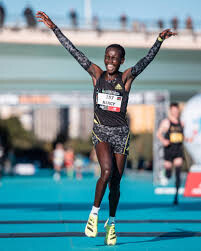
“After securing the presence of Eliud Kipchoge and Guye Adola, we are delighted also to have a very strong women’s field on the start line. With the right weather conditions there is certainly a good chance of very fast times,” said race director Mark Milde.
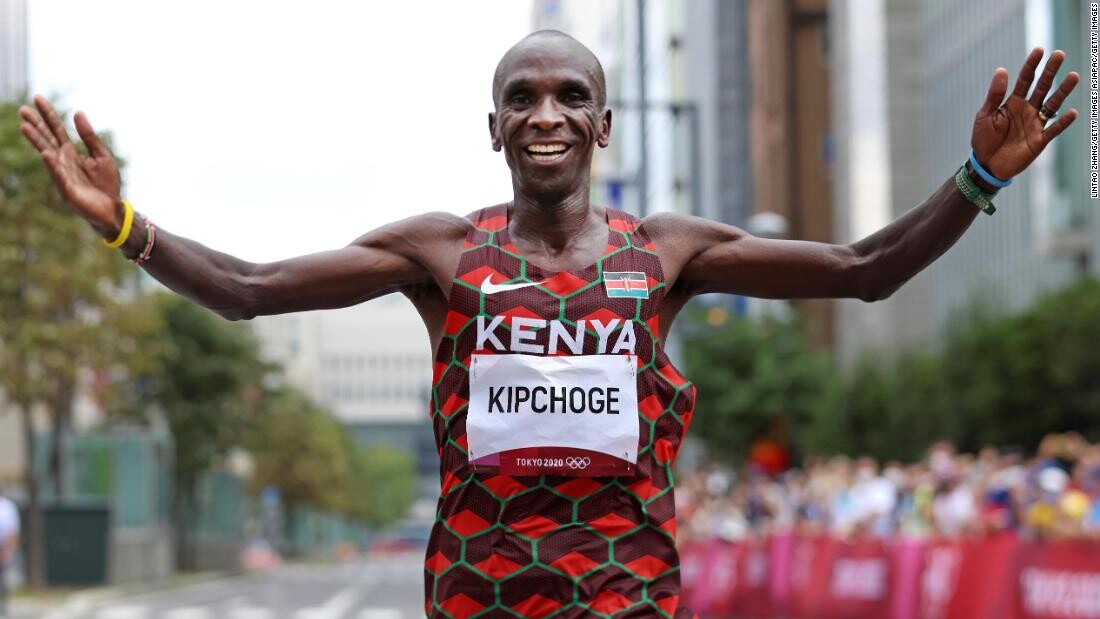
The presence of Keira d’Amato and Nancy Jelagat Meto brings to the event two women who have already run sub-2:20. At the age of 37, Keira d’Amato sprang a major surprise to break the American record with 2:19:12 in winning the Houston Marathon. That led to her late nomination for the World Championships in Eugene where she ran impressively to finish eighth. Sara Hall, who plans to run Berlin and then New York as well, went even better, finishing fifth.
Hall’s best time is 2:20:32. Nancy Jelagat Meto showed fine form in the past year, winning the prestigious Valencia title with a major improvement of 2:19:31. Four months previously she made a strong showing with second place in 65:21 at the GENERALI BERLIN HALF MARATHON.
Quite a few women runners will hope to put Berlin’s fast course, where Eliud Kipchoge set the current men’s world record of 2:01:39 in 2018, to good use in their bid to break 2:20: Gutemi Shone Imana has a best of 2:20:11 while Workenesh Edesa has run 2:20:24 and a third Ethiopian, Sisay Gola, has clocked 2:20:50. The Kenyans also have their contenders to break this landmark time in Maurine Chepkemoi, currently with a best of 2:20:18 and Vibian Chepkirui, who won the Vienna City Marathon in 2:20:59 in April.
Nor should marathon debutants be overlooked in the search for potential women winners, given that the Ethiopian Gotytom Gebreslase did just that to win last year’s BMW BERLIN-MARATHON title. Two possible contenders are Rosemary Wanjiru of Kenya and Ethiopia’s Nigisti Haftu. Both have strong performances at half marathon to their credit which could make them realistic challengers.
Login to leave a comment
BMW Berlin Marathon
The story of the BERLIN-MARATHON is a story of the development of road running. When the first BERLIN-MARATHON was started on 13th October 1974 on a minor road next to the stadium of the organisers‘ club SC Charlottenburg Berlin 286 athletes had entered. The first winners were runners from Berlin: Günter Hallas (2:44:53), who still runs the BERLIN-MARATHON today, and...
more...Kenya's Hellen Obiri to train in US for New York Marathon
World 10,000 meters silver medalist Hellen Obiri plans to travel to America ahead of time before making her debut in New York Marathon race on November 6.
In an interview with Nation Sport, the double 5,000m world champion said that she will be heading to Colorado, USA to acclimatize.
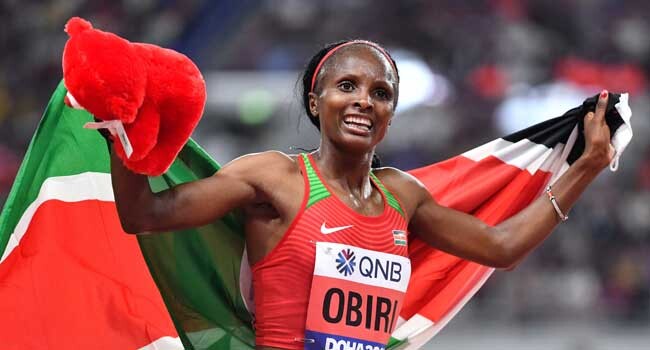
Obiri said that she will be depending on her new coach Dathan Ritzenhein, who heads On Athletics Club, for guidance.
Ritzenhein is a former athlete who has previously competed in the New York Marathon.
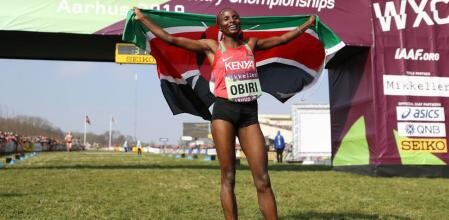
Obiri, who has plans to relocate to the US, said that she is not moving yet.
“There is still some paperwork that I’m working on before finalizing my move to the US. But, I will be going to Colorado for training because I want to acclimatize before the race. I look forward to a good race, but the most important thing for me is to learn,” she said.
The World Athletics Cross Country Championships title holder, who has been training in Ngong, Kajiado County, said that when she stepped up to marathon racing, it was not easy because the training is different.
“Marathon training is different from what I was used to while competing in track races. At fast it was tricky, but I persevered and I am now used to it,” she said.
The Olympic 5,000m silver medalist said that she was inspired to switch to marathon by two-time world marathon champion Edna Kiplagat.
“I was really inspired by Edna Kiplagat who has been doing well for long and is still competing. I have interacted with her, and when I learned that she was part of the elite field at New York Marathon, I felt encouraged that she will be racing with me,” said Obiri.
“Before the competition, I look forward to train with Edna in the US.”
The Istanbul Half Marathon champion said that she took a leap of faith to compete in full marathon after performing well in half marathon races.
Obiri clocked 64:38 to win this year’s Istanbul Half Marathon after having triumphed in the same race last year in 64:51.
The former 5,000m African champion has had a good season which climaxed in her winning a 10,000m silver medal at the World Athletics Championships in Oregon, USA on July 16.
In New York, Obiri will be up against defending champion and Olympic marathon champion Peres Jepchirchir, Edna, debutante Sharon Lokedi, Caroline Rotich and US-based Viola Lagat, who was second last year.
Other top names in the race are newly crowned world champion Ethiopian Gotytom Gebreslase and her compatriot Senbere Teferi, world bronze medalist Israel’s Lorna Chemtai Salpeter, USA’s Sara Hall and Aliphine Tuliamuk.
by Bernard Rotich
Login to leave a comment
TCS New York City Marathon
The first New York City Marathon, organized in 1970 by Fred Lebow and Vince Chiappetta, was held entirely in Central Park. Of 127 entrants, only 55 men finished; the sole female entrant dropped out due to illness. Winners were given inexpensive wristwatches and recycled baseball and bowling trophies. The entry fee was $1 and the total event budget...
more...World Championships Medalists Gotytom Gebreslase, Lonah Chemtai Salpeter, and Hellen Obiri to Join Women’s Field at 2022 TCS New York
Sara Hall, Emma Bates, Aliphine Tuliamuk, Des Linden, Nell Rojas, and Stephanie Bruce to anchor star-studded contingent of American women.
World Championships medalists Gotytom Gebreslase of Ethiopia, Lonah Chemtai Salpeter of Israel, and Hellen Obiri of Kenya will join previously announced New York City and Olympic champion Peres Jepchirchir in the women’s professional athlete division at this year’s TCS New York City Marathon on Sunday November 6. All three will make their TCS New York City Marathon debuts, with Obiri making her 26.2-mile debut across any course, and will line up against a star-studded contingent of American women that includes Sara Hall, Emma Bates, Aliphine Tuliamuk, Des Linden, Nell Rojas, and Stephanie Bruce. The 2022 TCS New York City Marathon women’s professional athlete field is presented by Mastercard®.
Women’s Open Division
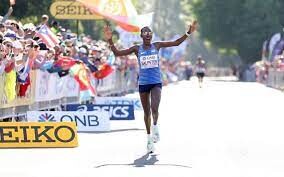
Fresh off her victory at the world championships marathon, where she finished the course in a championship-record time of 2:18:11, Gebreslase will make New York City her next stop. She will look to add a five-borough title to her resume, having previously won the 2021 Berlin Marathon and finished third at the 2022 Tokyo Marathon.
“Winning the World Championships was like a dream, and I am honored to run my next marathon in New York City,” Gebreslase said. “It’s home to the biggest marathon in the world, and many of the top athletes have run there. I understand it’s a challenging course, and I’m looking forward to seeing further success there.”
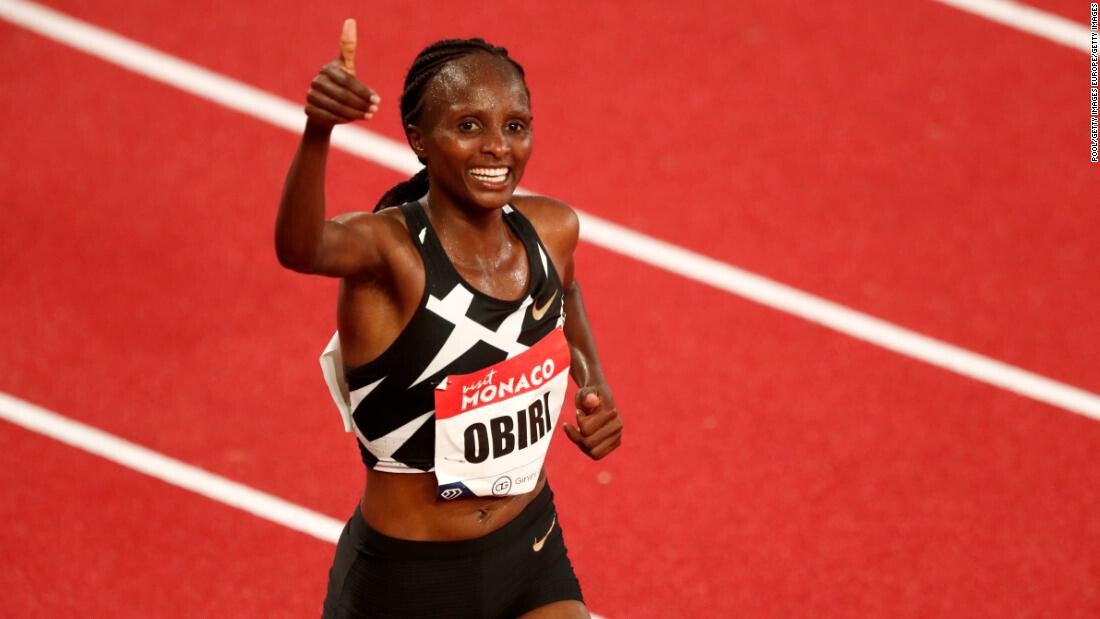
Two-time Olympian Salpeter, a Kenyan-born Israeli who won the bronze medal at the world championships marathon and was the 2020 Tokyo Marathon winner, will challenge Gebreslase once again. Obiri, a two-time Olympic medalist and seven-time individual world championships medalist, will make her highly anticipated marathon debut shortly after winning a world championships silver over 10,000 meters.
“I’m very excited to make my marathon debut at the TCS New York City Marathon,” Obiri said. “I have watched the race many times on TV and have seen my Kenyan colleagues compete there. I know New York is a tough course, but I hope my experience on track, road, and cross-country will help me navigate the ups and downs. I also plan to get advice and tips from coach Dathan Ritzenhein, who competed in the race several times in the past.”
In addition to Jepchirchir, the group will be racing against Ethiopia’s Senbere Teferi, who will look to become the first athlete to win the United Airlines NYC Half, Mastercard New York Mini 10K, and TCS New York City Marathon in one year. Three other Kenyans will also be strong contenders for podium places, including the 2010 New York City, 2014 London and 2017 Boston Marathon champion Edna Kiplagat, last year’s runner-up Viola Cheptoo, and newcomer Sharon Lokedi.
The American effort will be led by 10-time national champion Hall, who was the top world championships marathon finisher from the U.S. last month in Oregon, where she placed fifth. She is also the former half marathon national record holder, the runner-up from the 2020 London Marathon, and a two-time winner of the Mastercard New York Mini 10K. She will be joined at the Staten Island start line by Bates, who clocked a personal best to finish seventh at the world championships and was the runner-up at last year’s Chicago Marathon.
“From winning the Millrose mile to back-to-back Mini 10K wins, most of my favorite career moments have happened in NYC,” Hall said. “I’m all-in to add to that by having my best marathon yet at the TCS New York City Marathon. I can’t wait to be back racing my heart out in the five boroughs of my favorite city.”
Tokyo 2020 Olympian Aliphine Tuliamuk, and two-time Olympian and 2018 Boston Marathon champion Des Linden, will also return to New York, as will national champion Stephanie Bruce, who will race the five boroughs for the final time before retiring. The deep U.S. women’s group will additionally include Nell Rojas, the top American finisher from the last two Boston Marathons, Lindsay Flanagan, the top American finisher from the 2022 United Airlines NYC Half, Annie Frisbie, last year’s seventh-place finisher, and her training partner Dakotah Lindwurm, who won Grandma’s Marathon in June. Emily Durgin, the sixth-fastest U.S. half marathoner of all-time, will make her marathon debut.
by Running USA
Login to leave a comment
TCS New York City Marathon
The first New York City Marathon, organized in 1970 by Fred Lebow and Vince Chiappetta, was held entirely in Central Park. Of 127 entrants, only 55 men finished; the sole female entrant dropped out due to illness. Winners were given inexpensive wristwatches and recycled baseball and bowling trophies. The entry fee was $1 and the total event budget...
more...

